
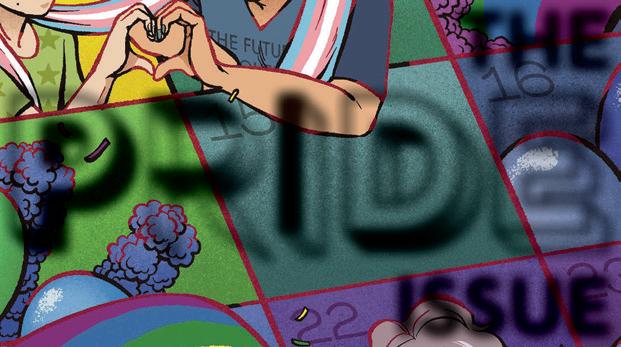








FREE AND FREAKY SINCE 1971 | JUNE 9, 2022
IDE WINDY CITY TIMES WINDY CITY TIMES THE PRIDE ISSUE OF THE PRIDE ISSUE OF SPECIAL QUARTERLY INSERT INSIDE! SPECIAL QUARTERLY INSERT INSIDE!
R
waiting room
28 Collo-Julin | Interview Drag queen Denali talks ice skating, Alaska, and Chicago.

Schoolmaster Games feels like wasted potential.
FILM
41 Movies of Note Hustle wins even if you don’t know a hoop dream from an embroidery hoop, Ms. Marvel spotlights a Muslim American superhero, and Donbass is a fake doc that’s far too real.
CITY LIFE
04 Street View In this year’s SAIC fashion show, categories were completely out of style.
FOOD & DRINK
06 Sula | Feature The Melanin Martha wants Black food to triumph over its trauma.
COMMENTARY
10 Isaacs | Culture The intersectional history of Bronzeville’s South Side Community Art Center
NEWS & POLITICS
12 False Alarms Ankle-monitor alerts garner phone calls and visits from sheriff ’s officers—but more than 80 percent are bogus.
16 Galil | Electronic Monitoring Jeremey “Mohawk” Johnson has chronicled nearly two years of pretrial house arrest.
PRIDE
22 People Chicago’s own Paulo Batista bares all on the new series GoGo for the Gold
24 Environments Has LGBTQ+ acceptance resulted in losing valuable community spaces?
26 Comic Building an opera in the
A NOTE FROM AN EDITOR
32 Musical Makeover Second City reboots its Queer Eye parody.

33 Next Generation About Face Youth Theatre creates in a climate of consent in Gayme Changers
34 DJing for Diversity
TRQPITECA offers an “oasis at the crossroads between paradise and the underground.”
THEATER
42 Plays of Note Hand to God is close to perfect, FleetwoodJourdain offers a gorgeous revival of Home, and Music Theater Works offers a swimmingly good take on The Little Mermaid
MUSIC & NIGHTLIFE
44 Chicago Blues Festival Free satellite concerts in Austin and Bronzeville hope to revitalize blues culture in the neighborhoods that nurtured it for so long.
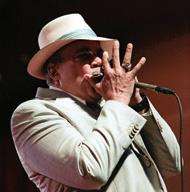
CHICAGO READER | JUNE 9, 2022 | VOLUME 51, NUMBER 18
52 Shows and Records of Note Previews of concerts including Aram Shelton, Ravyn Lenae, and Los Bitchos, plus reviews of releases by Angel Olsen, Klaus Schulze, Virgin Mother, and more 56 Early Warnings Rescheduled concerts and other updated listings 56 Gossip Wolf Bev Rage & the Drinks ring in Pride with a video of a kaiju-style rampage, jazz guitarist Dave Miller celebrates a new album of solo acoustic guitar at Constellation, and rapper-singer Rich Jones releases a mellow, jazzflecked collaboration with producer Iceberg Theory.
TO CONTACT ANY READER EMPLOYEE, E-MAIL: (FIRST INITIAL)(LAST NAME) @CHICAGOREADER.COM
PUBLISHER AND PRESIDENT TRACY BAIM
PUBLISHER AND EDITOR IN CHIEF KAREN HAWKINS
PRODUCTION MANAGER KIRK WILLIAMSON
SENIOR GRAPHIC DESIGNER AMBER HUFF
STORY EDITOR SUJAY KUMAR
CULTURE EDITOR SALEM COLLO-JULIN
NEWS EDITOR JIM DALEY
THEATER AND DANCE EDITOR KERRY REID
MUSIC EDITOR PHILIP MONTORO
ASSOCIATE EDITORS JAMIE LUDWIG, TARYN ALLEN
SENIOR WRITERS LEOR GALIL, DEANNA ISAACS, BEN JORAVSKY, MIKE SULA
STAFF WRITERS KATIE PROUT, KELLY GARCIA
AUDIENCE ENGAGEMENT MANAGER YASMIN ZACARIA MIKHAIEL
EDITORIAL ASSOCIATE JANAYA GREENE
LISTINGS COORDINATOR MICCO CAPORALE
VICE PRESIDENT OF OPERATIONS ANN SCHOLHAMER
DIRECTOR OF DIGITAL JOHN DUNLEVY
DIRECTOR OF DEVELOPMENT JT NEWMAN
DIRECTOR OF MARKETING VIVIAN GONZALEZ
SPECIAL PROJECTS ASSOCIATE SHAWNEE DAY MEDIA PARTNERSHIPS COORDINATOR YAZMIN DOMINGUEZ
CIMA MANAGER SAVANNAH HUGUELEY EXECUTIVE ASSISTANT SANDRA L. KLEIN
ADVERTISING
312-392-2970, ADS@CHICAGOREADER.COM CLASSIFIEDS: CLASSIFIED-ADS@CHICAGOREADER.COM
36 Inclusion Asian drag performers slay the way forward.
37 Performance “Huge, very loud, and with a lot of glitter,” Fly Honeys return live.
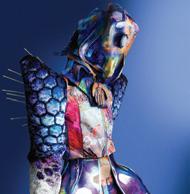
38 Caporale | Short Film Bros Before is stupid and horny—and wonderfully queer.
40 Allen | Review The
THE VIBRANT RAINBOW stripes on the Pride flag have come to be synonymous with more than just the LGBTQ+ community; in recent years, they’ve become almost as much a symbol of capitalism. A movement that began as a radical fight for liberation has been commodified and watered down. There are still benefits to seeing rainbows on horrendous Target merch, random food packaging, and the like— people who grew up feeling completely alone in their queerness can at least see visual representations of Pride while moving through the world. But in a moment in time when
46 Chicago Blues Festival As soul singer Ruby Andrews returns to the Chicago Blues Festival, she’s also running the label she put on the map with her 1960s hits.
48 Chicagoans of Note Samantha Jordan, aka Austin-based rapper and activist FURY
legislation is threatening bodily autonomy, prophesizing the revocation of existing rights for queer people, and endangering the mere existence of transgender people in the U.S., that doesn’t feel like enough.
I want the colors on the cover of this Pride Issue to represent more than just capitalism and generic inclusivity. In this issue, you’ll find stories about trans creatives, LGBTQ+ community spaces, and drag performers; but you’ll also find an investigation and an interview about electronic monitoring in policing. (Remember, the first Pride marches celebrat-
ON
ed the Stonewall riots, a response to a violent police raid.) I want the colors on the cover of this Pride Issue to inspire people as they move through this month of June and promote true liberation.
Whether you see yourself and your identities represented on this cover or not, know that it is for you. It’s for all LGBTQ+ identities and allies, for trans Black and Brown people, for our queer siblings facing incarceration, and for everyone who believes in a joyously queer future. TARYN ALLEN, ASSOCIATE EDITOR
VICE PRESIDENT OF SALES AND BUSINESS DEVELOPMENT AMBER NETTLES VICE PRESIDENT OF SALES AMY MATHENY SALES TEAM VANESSA FLEMING, LENI MANAA-HOPPENWORTH, TIM OGDEN, TED PIEKARZ, WILL ROGERS, LISA SOLOMON DIGITAL SALES ASSOCIATE AYANA ROLLING
NATIONAL ADVERTISING
VOICE MEDIA GROUP 1-888-278-9866 VMGADVERTISING.COM JOE LARKIN AND SUE BELAIR
DISTRIBUTION CONCERNS distributionissues@chicagoreader.com 312-392-2970
READER (ISSN 1096-6919) IS PUBLISHED BIWEEKLY BY THE READER INSTITUTE FOR COMMUNITY JOURNALISM 2930 S. MICHIGAN, SUITE 102 CHICAGO, IL 60616 312-392-2934, CHICAGOREADER.COM
COPYRIGHT © 2022 CHICAGO READER PERIODICAL POSTAGE PAID AT CHICAGO, IL
ALL RIGHTS RESERVED. CHICAGO READER, READER, AND REVERSED R: REGISTERED TRADEMARKS ®

2 CHICAGO READER - JUNE 9, 2022 ll
LOVE 58 Judgment
CLASSIFIEDS 60 Jobs 61 Apartments & Spaces 61 Matches
WEEK
SAVAGE
Day Dan Savage offers advice on why the logistics of a threesome matter.
THIS
THE COVER: ILLUSTRATION BY BETSY OCHOA. FOR MORE OF OCHOA’S WORK, GO TO BETSYOCHOA.COM.
IN THIS ISSUE

JUNE 9, 2022 - CHICAGO READER 3
Street View
Out of the box
In this year’s SAIC fashion show, categories were completely out of style.
By ISA GIALLORENZO
The long-awaited School of the Art Institute of Chicago fashion show was back in May after a two-year hiatus brought on by COVID-19. In the previous pandemic years students presented their work in beautiful highly-produced videos, but nothing substitutes the experience of seeing their garments IRL—especially so up close and personal. And this year’s show at the Chicago Athletic Association, with a particularly diverse slew of models, did not disappoint. Though each senior student presented their own collection—comprising eight head-to-toe looks—an overall theme of the show seemed to be “No Labels,” or better yet, “Labels? Who cares?” Many of the lines were blurred, which added to the impressive sophistication presented by the young designers.
According to SAIC associate professor Abigail Glaum-Lathbury, who co-taught this year’s fashion design seniors along with adjunct assistant professor Yoshiko Fredisdorf, most students “almost dispensed with categories altogether.” Glaum-Lathbury points out: “Historically, in some ways, fashion is simultaneously about rules and then breaking those rules and subverting them. You used to see collections of evening wear, and that had a certain definition to it. Evening wear was for women, and it was understood that women were cisgender, probably heterosexual. There were all of these di erent assumptions that I think were being made. Our students now are just not interested in these categories. It’s not even that they’re fi ghting against it, because to fi ght against something is to, in a way, accept the terms of the argument. All these other categories are like a dead language for a lot of students, which I think is beautiful.”
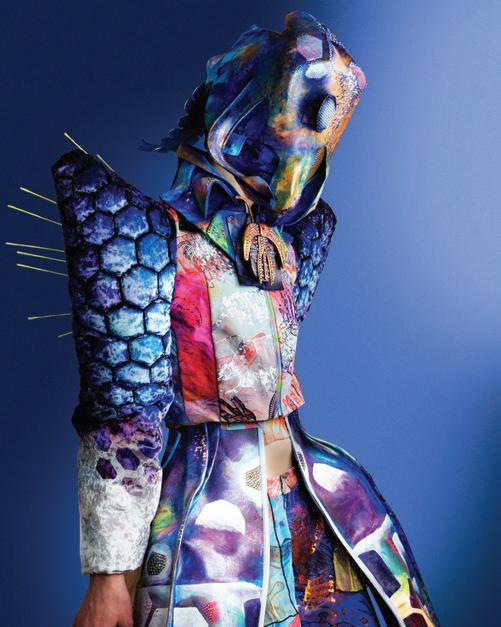

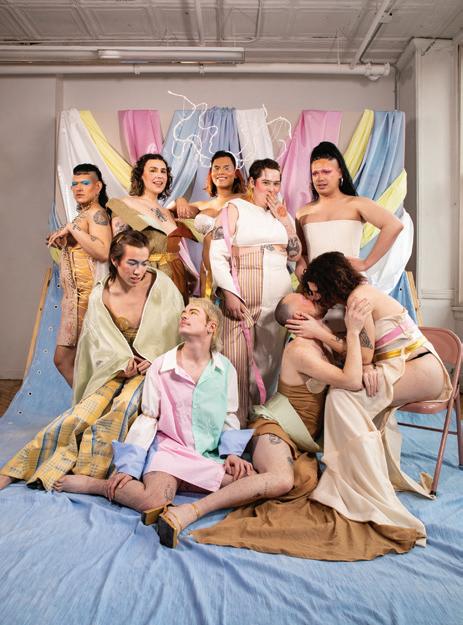
So instead of outdated classifications, seniors focused on themes they truly cared about. Casey Knepley, for example, based her “What We Have” collection on the 1970s novel The Faggots and Their Friends Between Revolutions by Larry Mitchell and Ned Asta. Knepley says that “the book speaks on queer
survival through collective resourcefulness, community, and love.” She adds that “the belief that beauty and glamour can be made simply using what I have to work with was core to this project, leading to every piece in this collection being created with a ordable, secondhand materials sourced around Chicago. Every look was made specifically for and in collaboration with each model, all members of the local queer community and arts scene that I met during my time in this city. Providing tailored clothes for each individual was like making love letters for each of them.”
Knepley’s collection was festive yet gentle, featuring earthy and pastel tones on a wide array of body types. Other highlights of the show were the designs presented by Iyomi Ho Ken and Andrew Bohlin. Ho Ken’s collection explored the development of her own emotional world, showcasing garments that change color over time in progressively revealing silhouettes. Alluding to a broader kind of evolution, Bohlin’s creations—inspired by the Ediacaran and Paleogene periods—tell the story of life on Earth, with fascinatingly complex shapes and prints. The fact that Bohlin does every single step of their work all by themself makes it even more
impressive.
“At SAIC a lot of the work that we make is really experimental,” says Glaum-Lathbury. “A lot of what we’re doing is teaching people how to think creatively, to have confidence in their own research and their own ideas. When you look at the collections and the runway show, each one couldn’t be more different than the next—there’s just not the accidental trend overlap. All of the collections really take radically different forms, which is not so much about distinguishing yourself amongst your peers, but about focusing on individual research and investment.
“The question is: how do you communicate ideas and what is it that you’re trying to communicate? It’s a very intense and complete process and I could not be more proud of this class,” she says. Not surprisingly, the pandemic made their arduous job even more challenging. “It was really hard for these students,” she adds. “This whole class spent the majority of their education in either online or some hybrid form of learning. And [fashion design] is a haptic skill—it is about touch and craft, which is hard to do online. So one more reason to give them credit.” v
4 CHICAGO READER - JUNE 9, 2022 ll
CITY LIFE
Fashion created by Iyomi Ho Ken, Casey Knepley, and Andrew Bohlin L-R: GRACIE HAMMOND & ABI TEODORI; SARAH GAGLIONE; ANDREW BOHLIN
@chicagolooks




JUNE 9, 2022 - CHICAGO READER 5 MALCOLM X COLLEGE This program will change lives. If you have lived experience in recovery for substance use and/or mental health challenges, consider becoming a Recovery Support Specialist—at no cost. Get started today! Paid for by a grant from IDHS. ccc.edu/crss Stipends available Employment opportunities available
THE MELANIN MARTHA
Themelaninmartha.com
@themelanin_martha
on Instagram
FOOD FEATURE
The Melanin Martha wants Black food to triumph over its trauma
Jordan Wimby finds liberation in home cooking.
By MIKE SULA
Jordan Wimby was the only Black kid on her Beverly block, and she ate like everyone else: Lunchables, Tyson chicken nuggets, TV dinners, and frozen potpies.
“Growing up I was surrounded by this conversation of racism, oppression, colonialism,” says Wimby, whose mother and grandparents were teachers (most of them CPS) who specialized in American and African American history, and Egyptology. “We talked about slavery. We talked about sharecropping. We talked about all these things I wasn’t learning in-depth in school. But at the same time we weren’t eating cultural foods, which was kind of confusing to me because my family was so embedded in Black history and Black culture.”
But back then, when Wimby was a latchkey kid in a single-parent home, her main priority was afterschool snacks, and the Food Network was there for her. “I always say Rachael Ray was my second mom. 30 Minute Meals was where it was at in sixth grade. My mom started seeing how passionate I was about food and cooking and she was like, ‘OK, I’ll buy the groceries if you wanna try some recipes. Just don’t burn the house down.’”
Today Wimby, who’s 27, is known as The Melanin Martha, a home cook exploring the intersection of food and Black identity, tapping into inspiration from the African diaspora and addressing issues of access, trauma, heritage, queerness, comfort, and self-care through cooking. She’s worked as a private chef, conducted cooking workshops for corporate
clients, run bake sales through her Instagram, and on June 20, she’s taking over the kitchen at the Kedzie Inn for a Juneteenth Monday Night Foodball, the Reader’s weekly chef pop-up.
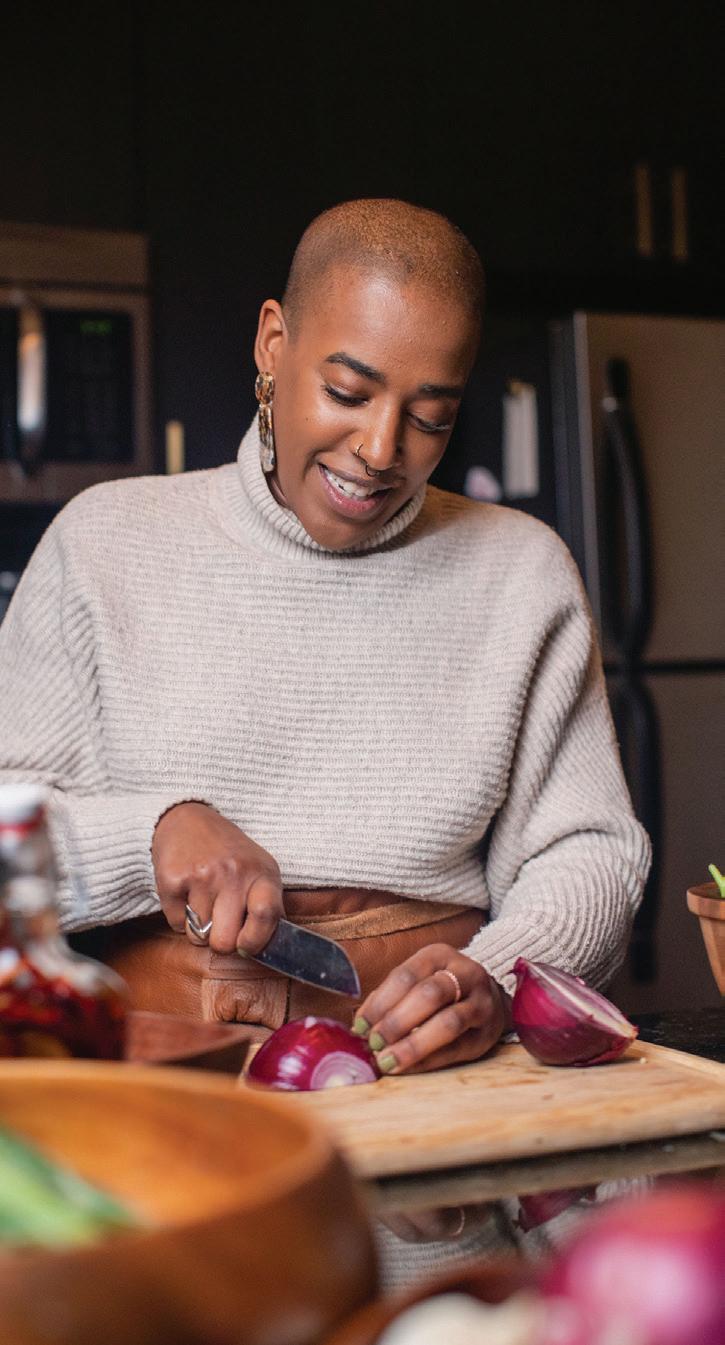
Wimby arrived at her particular focus circuitously—through Italy. Her family’s best friends in Beverly were an Italian family whose matriarch babysat her when her mother went back to school. “Everybody else was Irish, so we kind of gravitated toward each other.” Wimby’s Italian grandmother—she calls her Nonna—steeped her in Italian culture: the music, the language, the food, and after high school Nonna took her on a monthlong visit to Pieve Santo Stefano, her tiny home village in Tuscany.
“My family always talked about small towns being dangerous and not accepting,” says Wimby. “I was probably the only Black girl ever to be seen in this small town. I would get stared at, and there were lots of questions, but because I could communicate in Italian there was more room for understanding than just judgment. So after a month I was like, ‘I need to live here. This is not a question. I feel so at peace here. The food is delicious. People know who they are. People are kind. They’re racist in their own way, but it’s not systemic like it is in America.’ People were actually willing to learn and listen in ways I felt was not happening in the States.”
She came home for three months of waiting tables and babysitting until she had the funds and the visa to return. She spent a year and
6 CHICAGO READER - JUNE 9, 2022 ll FOOD & DRINK
COURTESY JORDAN WIMBY
Summer Starts Here
Chicago is a city of neighborhoods, and Andersonville is just one of the neighborhoods nestled on its north side. First established as a farming community in the 1850s, the retail district we know today began as an enclave of small businesses started by Swedish immigrants who moved north to escape the ravages of the Great Chicago Fire of 1871.
Today, Andersonville is notable for its quaint facades, its diverse population, and its preponderance of unique, locally owned businesses. Steeped in its Swedish roots and anchored by the Swedish American Museum, Andersonville has celebrated the traditional Swedish holiday of Midsommar in the form of Midsommarfest for more than 55 years. Midsommarfest is Andersonville’s signature festival, and one of the largest and oldest street fests in the city of Chicago.
This year Midsommarfest takes place June 10-12 on Clark from Foster to Catalpa. At a special ceremony at noon on Saturday, June 11 on the Swedish Stage (at Clark and Foster), crowns of summer flowers will don heads as celebrants dance and sing around the maypole.
Midsommarfest is a celebration of summer. It is also a celebration of community. Join us for five stages of music showcasing more than 50 artists, and shop among 100 vendors, including local merchants and artisans.
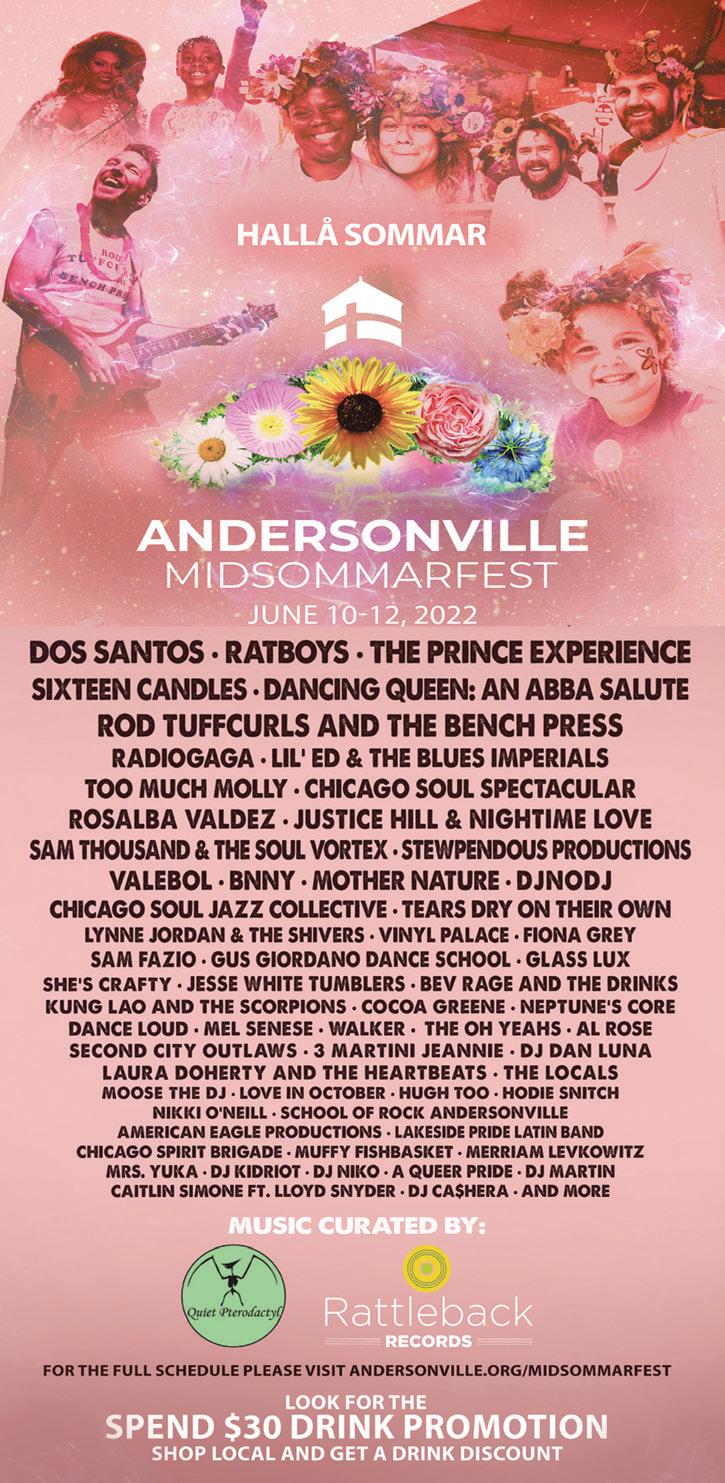
Donations are encouraged at the gates. Spend your weekend shopping and reaping the rewards of discounted beverages at our booths, and know that your dollars support Chamber programming throughout the year and more than 10 non-profit organizations.
New for Midsommarfest 2022 is our Flower Crown Portrait series featuring the unique and beautiful faces of Andersonville. As you take in each photo, you might be looking at a shopkeeper, an activist, a politician, a therapist, a woodworker, a professional, a bookseller, a comedian, a tavern owner, or an altruist who brings their unique identity and adds to the culture of Andersonville.
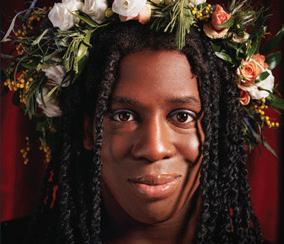
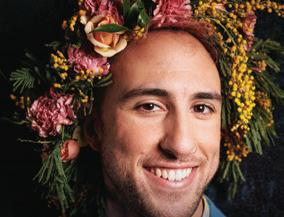
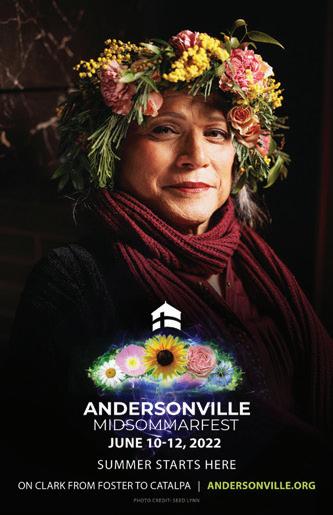
As we enter mid-June, we are excited to hear the buzz of Pride in the air throughout the community. It’s hard to not feel joy walking down Clark and noticing just how many LGBTQIA2+ businesses we have the honor of celebrating. Andersonville has been a safe haven for Chicago’s LGBTQIA2+ community since the early 90s, but while it’s easy to celebrate being one of the queerest areas of the city, we also want to acknowledge that not everyone feels safe in our neighborhood.
This Pride month (and every month), under the guidance of the Chamber’s DEI Committee, we continue the pursuit of becoming an organization that acknowledges our privilege and strives to be more equitable to our BIPOC partners and members. We strongly believe that Andersonville should be a place where everyone can feel proud of themselves, and a place where all can safely say “gay” every day.
This sponsored content is paid for by Andersonville Chamber of Commerce.
JUNE 9, 2022 - CHICAGO READER 7 Paid Sponsored Content
FOOD & DRINK
a half working at her Nonna’s family-owned winery before moving on to Florence, where she took cooking and wine classes until she ran out of money.
Back in Chicago she worked in the wine department at Eataly before embarking on a bleak, lonely year in San Diego, where her only solace was the farmers’ market. “The thing keeping me afloat was going to the market and finding a new item or ingredient, learning about it, and cooking with it.”
She returned to Chicago just before the pan-
talked about how they turned that trauma into something that is beautiful, and so that got the wheels turning, especially during COVID and George Floyd.”
Wimby studied Black chefs and food writers like Leah Chase, Edna Lewis, Mashama Bailey, and Michael Twitty, and took deep dives into plantation records and colonial cookbooks, seeking out the enslaved chefs who made extraordinary foods from ingredients that came over with them or had been rejected.
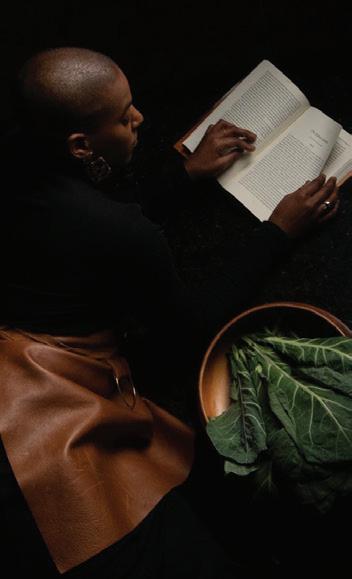
Why is kale held to a higher standard than collards? Why is quinoa a prized ingredient, but it’s somehow unhealthy to eat rice? She wanted to trace the origins of ingredients like okra and how they’ve maintained a connection to Black food despite the brutal history in which they became staples.
“A lot of the time we don’t have a safe space to talk about the foods that we love and enjoy,” she says. “A lot of the time people look at soul food and they say, ‘Oh, that’s just slave food.’ I link [okra] to my identity, not only because it’s a food that is indigenous to African culture but it’s an amazing vegetable. It’s gorgeous. It
grows in such interesting environments; people just don’t learn to appreciate it.”
Okra is on the menu June 20 at the Kedzie Inn, probably breaded and fried and served with a creamy, rich sauce. And Wimby is toying with the idea of a crème brûlée infused with hibiscus, the native West African flowers inseparable from Juneteenth celebrations. She’s still working on the rest of the menu, which she plans to drop this week. More on that later here, but follow her on Instagram for updates.
Be assured, each dish will have a story. “I think it’s important to tap into how certain food items got to America in the first place,” she says. “If I can create a space that is about teaching people who they are through where their food comes from and why they love certain flavors and certain dishes—why certain things make them feel like home and give them a sense of comfort and identity—I would feel very blessed. I want people to engage with my food and taste liberation in that way.” v
@MikeSula
W. CHICAGO AVE
Tender Presence
A traveling exhibition of queer artists who instill, exemplify, or resist the softer side of interactions. Through material research, this collective reflects a multitude of processes, objects, and ideas. The mark of each maker’s hand presents an individual interpretation of tenderness. Curated by Adam Atkinson & Everett Hoffman.
$ulo Bee

 Vivian Chiu Margo Csipo
Wyatt Nester-Pasicznyk
Vivian Chiu Margo Csipo
Wyatt Nester-Pasicznyk
Corey Pemberton
Kento Saisho
Taran Diamond Mattie Hinkley Andy Lowrie
J
Hansel Tai
Scott Vander Veen
Taylor Zarkades King
On view: May 24 — July 17
Reception: Friday, June 24, 4:00-8:00 PM
Pictured: Leaf Demon by Andy Lowrie (left)

Mound by Kento Saisho (right)

8 CHICAGO READER - JUNE 9, 2022 ll
continued
6 WWW.GALLERY2052.COM
from
2052
COURTESY JORDAN WIMBY


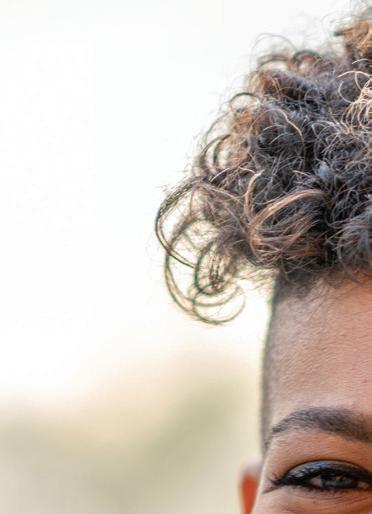

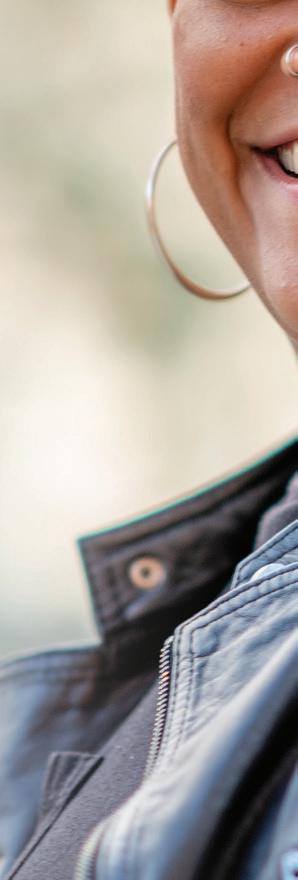















JUNE 9, 2022 - CHICAGO READER 9 WITH PURPOSE ™ PLAY Learn how every play helps at www.IllinoisLottery.com
ON
CULTURE
Out at the Center
“EMERGENCE:” the intersectional history of SSCAC
By DEANNA ISAACS
They were there.
No fuss, no ballyhoo, but queer artists have been a significant part of Bronzeville’s South Side Community Art Center since its founding in 1940.
You might or might not see it in the art.
That’s the main takeaway from “EMERGENCE: Intersections at the Center,” on exhibit at SSCAC through July 2.
In the early decades, while vice squads were policing relationships between consenting adults and exposure could mean ruin, artists (and just about everyone else) tended to be discreet about their personal lives.
But there was coded messaging. The exhibit includes a 1946 letter from painter Ellis Wilson, then based in New York, that asks the Center’s director to connect a visiting friend
“EMERGENCE:
INTERSECTIONS AT THE CENTER”
Through 7/2 : Tue-Sat, noon- 4 PM or by appointment; South Side Community Art Center, 3831 S. Michigan, 773 373 1026, sscartcenter.org, free
with “the kind [of people] he knows here—he has a lot of artist friends here.”
Read into it what you will.
Ditto for Wilson’s 1947 oil painting, Figure on Beach (on loan from Bates College Museum of Art). It presents a Black man reclining on sand, his blue pants, a basket of colorful fish, an aura of mystery.
In that persecuting environment, SSCAC and Bronzeville itself—which had a rich, multifaceted nightlife—were known as relatively welcoming spaces. The exhibition brochure notes that “well-known Black gay authors Langston Hughes, James Baldwin, Alain Locke, and Lorraine Hansberry all had substantial ties” to the Center.
“We tend to think of the south side as conservative,” cocurator (and SSCAC’s archives and collections manager) LaMar R. Gayles Jr. says, “but in actuality there was a lot of cultural diversity.” That said, Gayles adds, “I think, in most of the 20th century, artists felt like if they were known as gay and Black, they would have two hurdles to jump. And one hurdle could pit them against their own people.”
The show, cocurated with SSCAC programs and public engagement manager Zakkiyyah Najeebah Dumas-O’Neal, and organized by Northwestern University professor and SSCAC board member Rebecca Zorach, focuses mainly on the period from 1940 to the 1980s, and on the diverse work of 11 artists, most of it drawn from SSCAC’s own collection. It includes those who, today, would be comfortable identifying as LGBTQ+, along with a few known as allies and inspirations. Many of them came here to study at the Art Institute of Chicago, one of the few major art schools open to Black students in the earlier part of the 20th century.
The exhibit occupies the Center’s first and second floor galleries, and is broken into four thematic groups covering early years, nightlife, mixed media and still life, and the human figure. The work ranges from Bobbe Cotton’s
1946 costume design for SSCAC’s famous annual Artists and Models Ball to Ralph Arnold collages, Mikki Ferrill photos, and Berry Horton’s sophisticated midcentury modern semi-abstractions. Horton’s satirical and fantastical pen drawings—the most sexually explicit pieces in the show—are housed in an “adult content” vitrine.
A pair of sculpted heads, by artists working three-quarters of a century apart, bookend the whole thing: Richmond Barthé’s naturalistic 1938 Shoe Shine Boy , and Juarez Hawkins’s 2012 Headtrip II
“SSCAC was a venue when there weren’t many venues for Black artists,” Hawkins told me. “My generation had it easier in terms of access. There were more venues popping up, and it was a time where it was more comfortable being LGBTQ. You didn’t have to be underground so much. In the 40s, 50s, even into the 60s, in Black communities, it was there, but not there, in a way. You knew who may be queer in your community, but didn’t have these labels. Women who loved women didn’t necessarily call themselves lesbians. I don’t remember anyone calling themselves gay when I was coming up, and my mother had a number of queer friends. There was an underground, and if you were in the circle you knew who was who. But this was also a time when it was dangerous to be openly gay: you could lose your job, you could lose your family. So, an interesting tightrope.”
Seen from the front, the Hawkins piece is a straightforward woman’s face in the style of Barthé, whom she admires. It could be a well-behaved companion piece to his shoe shine boy. But from the back, it’s Barthé exploded—a cacophony of other heads and voices bursting from the skull in their own surprising emergence. v
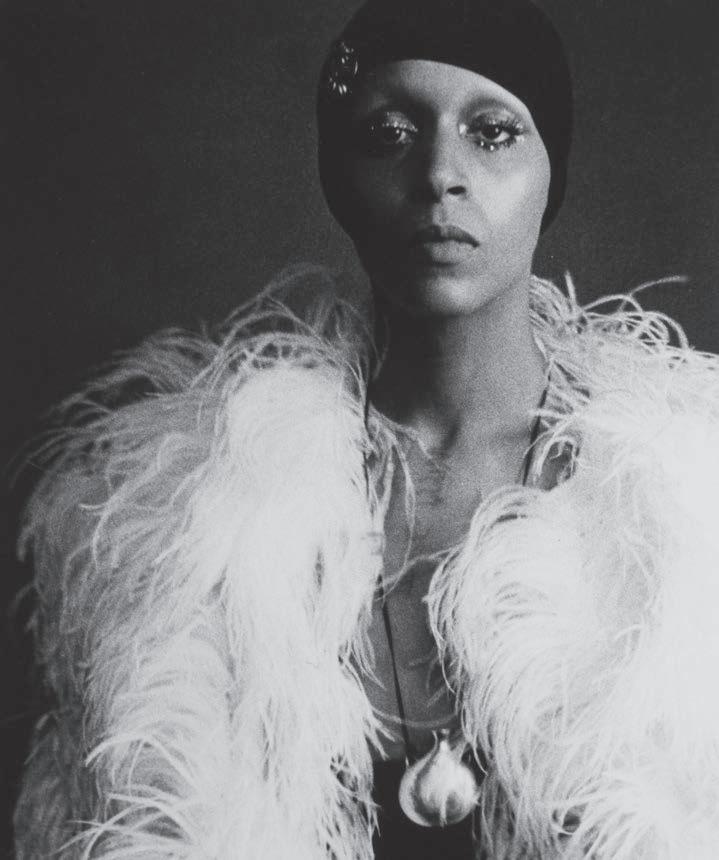
10 CHICAGO READER - JUNE 9, 2022 ll
COMMENTARY
@DeannaIsaacs
Untitled (Portrait of Terry Readus), a 1973 gelatin silver print by artist Mikki Ferrill MIKKI FERRILL

JUNE 9, 2022 - CHICAGO READER 11
ELECTRONIC MONITORING
False alarms
Ankle-monitor alerts garner phone calls and visits from sheriff ’s officers but more than 80 percent are bogus, according to a University of Chicago analysis.
BY MATT CHAPMAN, NATALIE FRAZIER, THE TRIIBE
East Side without approval. Within the fi rst week of being on EM, Ross said one of the CCSO o cers who came to his house tried to pressure him into saying he left his home to take out the garbage—which would have been admitting to violating the terms of EM, since his garbage can is located outside. When he refused, a second CCSO o cer advised Ross to record a video of himself in his room whenever he receives a false EM violation alarm.
During the year and a half that Ross was on house arrest, from February 2020 through September 2021, he says that CCSO officers showed up to his home more than 20 times.
for “essential functions” like getting groceries. Like many on EM, Ross was never granted movement outside his home even once, not even to buy food. His sister, a manager at Securitas, helped when she could, but work got in the way sometimes, he said.
“So some days I’ll go two days without eating,” Ross said. “Some days I go 24 hours with no food whatsoever.”
After more than 18 months of being confi ned to his home with an ankle bracelet, he was found not guilty of the gun charge in September 2021. He was discharged from house arrest soon after.
number of people on EM in Cook County declined in August of that year, but was still 31 percent higher than it was in March 2020. Seventy-eight percent of people in the program had been detained for at least three consecutive months.
On February 20, 2020, the Cook County Sheri ’s O ce (CCSO) shackled Shannon Ross’s leg with an electronic monitoring device that tethered him to the confines of his home. Although he lived in northern Indiana, Ross was forced to move to Chicago as one of the conditions of being on CCSO’s electronic monitoring (EM) program after he was arrested here in October 2019 on charges of theft of less than $500 and felony possession of a firearm. The move resulted in him losing his job as a forklift operator and losing his car after he was unable to make payments.
Ross, 32, said his electronic monitor sent false alarms daily, each one alleging that he’d left his home in the Chicago neighborhood of
On one visit, Ross said officers nearly arrested him despite the fact that he told them he had video evidence that he hadn’t left his home. “They almost didn’t want to see my proof,” he said. “I told them, like, ‘I have proof.’ And they really wasn’t caring until my girl came out with the proof and [was] like, ‘Look, he’s not lying.’ Some o cers are just like that—just don’t care.”
During several of the officers’ visits, Ross’s kids were home, and they saw him get handcu ed and questioned about his whereabouts. “They treat you like you’re a kid, like you’re a criminal,” he said. “Even when you ask for a supervisor or their name, they don’t give it to you—so if I wanted to fi le a dispute, I can’t. So I mean, they make it di cult.”
Ross had to get a judge’s approval for any movement outside his home because he was placed on EM before January 2021, when Governor J.B. Pritzker signed the Pretrial Fairness Act—which guaranteed movement
He says since getting o EM, life has been better: during those 18 months, he saved money to take a marketing course and now runs his own marketing agency. But the trauma of being on EM a ects him even today.
“I feel guilty every time I go outside,” he said. “I feel like I’m not supposed to be there. So I be in the house a lot.”
Today, there are 3,000 people on electronic monitoring in Cook County. According to CCSO, the program is a “community-based alternative incarceration concept” that allows those in pre-trial detention to remain at home rather than in jail.
The program has grown significantly since 2020 because courts were backlogged by the COVID-19 pandemic, preventing judges from hearing cases or approving pretrial movement for people on EM, and due to growing concerns over the spread of COVID-19 in jails.
According to a September 2021 report by Chicago Appleseed Fund for Justice, the
Consequently, hundreds of people still remain in ankle monitors today who still haven’t been convicted of any crime. Individuals on EM could also face penalties in the future completely unrelated to their original charges. In January, Illinois state representative Martin J. Moylan, whose district includes suburban Elk Grove Village and Des Plaines, introduced a bill that would make unknowingly tampering with, removing, or damaging electronic monitoring devices a Class 4 felony. In April, the bill was sent to the General Assembly’s rules committee.
When a person’s EM device sends an alert, employees at an out-of-state call center review the alert to determine whether it’s genuine. Transparency Chicago, a nonprofit whose research includes CCSO’s EM program, shared slides they obtained through FOIA that were presented to Cook County by University of Chicago’s research lab, Radical Innovation for Social Change (RISC), which provides software and analysis to CCSO about the EM program.
According to the slides, more than 80 percent of the alerts sent by CCSO’s EM vendor, Track Group, to CCSO and its call center are “false positive” alerts, each requiring manual review. RISC’s slides state that these false positives threaten to distract CCSO and call
12 CHICAGO READER - JUNE 9, 2022 ll
NEWS &
POLITICS
This story was co-produced in collaboration with The TRiiBE.
center sta from more serious alerts.
According to CCSO’s contractor, information on how often the ankle monitors trigger an alert that results in a phone call or blaring siren cannot be collected. A spokesperson for Protocol, the third-party contractor that handles call center operations, said the company is unable to distinguish calls made to an EM device used by CCSO from calls made to people on house arrest outside of Cook County. In practice, that means nobody, anywhere, has an accurate picture of how often people on EM are called about alerts, false or otherwise.
To understand how EM is impacting people placed in the program, we collected the experiences of those who were personally plagued with problems from CCSO’s EM program and attorneys who shared their clients’ experiences. Their experiences give insight into where the program’s faults are, raising questions of why these life-destroying problems persist for so long and why it takes so long for o cials to notice.

The CCSO’s call center is responsible for reviewing the many thousands of daily automated alerts that get triggered when their systems believe that a person violated the EM conditions—for example,
leaving their home. The call center has steps and procedures they follow, which range from noting the violation or calling the person on EM, to blaring a loud siren on their EM device or dispatching sheri s to their home.
Documents obtained by The TRiiBE from CCSO via a Freedom of Information Act (FOIA) request indicate that when the siren on a person’s EM device goes off, the contractor’s call center must check if the person on EM is in a courthouse. According to the Public Defender’s office, there have been at least three instances of a person’s monitor sounding an alarm while they’re standing in front of a judge in the courthouse, one of which reportedly happened in front of a jury. A spokesperson for CCSO said they notified the EM contractor about these incidents, and said the contractor “implemented a programming that it believes will reduce or eliminate these events.”
When a person on EM is found to have significant signal issues within their home, one option CCSO provides in rare cases is what’s commonly referred to as a “beacon.” Because environmental issues such as building material can cause signal loss with GPS, the beacons are designed to mitigate signal loss entirely by being inside the person’s home and only alerting if they move away from the
beacon.
About 13 percent of the 178 people who have had their monitor supplemented with a beacon have more than one beacon. According to emails between CCSO and the company that provides them, obtained by The TRiiBE through a FOIA request, a person on EM can have up to ten beacons.
Jeremey “Mohawk” Johnson, 27, has been on EM since August 2020. He is charged with hitting a helmeted police o cer with a skateboard during a protest after police charged into a crowd of nonviolent demonstrators. Johnson has posted more than 150 videos on YouTube documenting the false EM alarms and violations he’s received. On March 24, 2021, he received his fi rst EM beacon, and a second one on April 15, 2021, after he moved to the south side.
Yet Johnson’s double beacons, one of which he said was installed incorrectly by CCSO, have caused a plethora of signal issues and a slew of accusations from call center employees and the sheri .
In a video Johnson posted May 3, two CCSO o cers criticized fellow o cers for improper installation and spoke freely with Mohawk about the beacon’s shortcomings.
“When you hit a dead spot with your cell phone, it’s still shitty at the end of the day.
So that’s the same thing with this thing [the beacon],” one officer said on the video. “It sucks,” shrugged the other o cer as he uncu ed Johnson.
In February 2021, Johnson received a call from the electronic monitoring agency almost nightly between 12 AM and 5 AM, accusing him of being outside of his apartment when he was in bed. Most of the late-night calls Johnson receives from call center employees end in them chalking the false alarms up to an automatic message or system glitch.
“If it doesn’t work,” Johnson asked, “why are you still putting it on people?”
Another man we interviewed, Charles Bobock, shared his experiences with constant false EM violations and sheriff visitations. Most of these visitations begin with him being immediately handcu ed. Bobock says that during his time on EM, starting in July 2021, he was visited in his home by CCSO officers five or six times a month with accusations of leaving his home. Bobock says it wasn’t until early 2022 that he began getting cuffed without explanation as soon as the front door was opened.
One week in April 2022, he was visited and cuffed four times. On April 11, he tweeted, “LOL. Cuffed up behind my back again by
JUNE 9, 2022 - CHICAGO READER 13
THE TRIIBE NEWS & POLITICS
ROBIN CARNILIUS FOR
CCSO. This time they had me walk down the street with everyone watching, so they could ‘get a better signal’ on my ankle monitor. That’s twice in four days.”
In May, Bobock endured a tumultuous period in which he was cu ed five times in eight days.
“Every time they turn up, I panic, because as soon as those cuffs go on, I think these cu s might not come o this time,” Bobock said. “I’m useless for the rest of the day, because I’m shaking after they leave. It’s a real PTSD moment every time they put the cu s on. I really don’t know whether I’m leaving with them or not. It gets to be really, really traumatic every time this happens.”
We reached out to CCSO to ask why people on EM are handcu ed prior to questioning. In an emailed response, a spokesperson said it is to ensure the safety of investigators and others, and noted that CCSO policy states individuals should be restrained “only for as long as reasonably necessary” to ensure o cer safety.
According to Bobock, he has never been o ered a beacon to help alleviate these false EM violations.
Bobock said that on May 24, sheri ’s ocers came to his home to arrest him, claiming that his home was unfit for the EM program. He added that his neighbor, who witnessed and intervened in CCSO’s attempted arrest, invited Bobock to live in his home rather than be taken back to jail. After a discussion between the arriving officers and Bobock’s neighbor, CCSO approved his move.
After the attempted arrest, Bobock said he asked the o cers why he was never given a beacon in spite of the constant visits for false alarms, and the o cers responded that he hadn’t hit the threshold needed to get one. When asked, a CCSO spokesperson did not clarify what that threshold might be.
In an email to The TRiiBE, the spokesperson said “environmental interference” at Bobock’s home “made it extremely di cult to comply with the court order and monitor his compliance with program rules,” and that the “nature of the site” prevented installation of a beacon. Bobock said that the only thing he was told was that a garage is an unsuitable place to live.
Regardless of whether Bobock’s previous home was suitable or not for the EM program, with or without a beacon, one thing is clear—before Bobock was able to move into his home, the CCSO o cers who dropped him
were required to run an “Initial Residence Verification” process, which should include livability checks and confirmation that the EM device was “activated” with the EM vendor.
After living in his new home for over a week, Bobock says that things have been quiet, with the exception of one signal strength text, which was followed by a visit and handcu ng by the o cers, stating, “just checking up on you.” In spite of everything, Bobock says that he’s able to move around his neighborhood with no complaints from CCSO.
“I’ve been wandering around the block picking up trash, taking the dog to the dog park across the street each day, taking the garbage to the dumpster” Bobock said. “All things that would have got me into trouble before.”
In another case, a company changing its name led to one of its employees, who was on EM, being reincarcerated. Richard Bullock, a 40-year-old man facing first-degree murder charges, was sent back to jail after a CCSO investigator concluded that Bullock had forged pay stubs and proof of employment. The investigator apparently came to that conclusion while looking into Bullock’s scheduled work movement, and found via the Illinois Secretary of State’s website that the company he worked for, Upskel Housing INC, had dissolved in 2019. The investigator seems to have failed to notice that the company had simply reincorporated under a new name, Upskel LLC, which was also listed on the website. According to Bullock’s lawyer, the forgery allegations are unresolved, and the murder case is still pending.
Another man, who shared his experience with us on the condition of anonymity due to fear of impact to his ongoing criminal case, wound up wearing two ankle monitors at once. The sheri ’s o ce still hadn’t removed his ankle device and continued to visit him at his home despite a court order that had discharged him from the sheri ’s EM program a week earlier so that he could move to the more-lenient EM program managed by the chief judge. At the courthouse, a second EM device, meant to work with the chief judge’s EM systems, was attached to his other leg, and he would have to be scheduled for the removal of CCSO’s.
The night of his court appearance for his EM discharge, he received a 2 AM visit from the sheri alleging that he violated EM after leaving the courthouse. The officers who
went to his home were not aware that the discharge was fi led. When we spoke with him, he’d been wearing two devices for a week and was afraid to leave his home, from worries of another late-night visit or potential reincarceration.
Tracey Harkins, an attorney whose clients include many on EM, shared her experiences with prosecutors whom she characterized as aggressive and judges who she says have impossible standards and deep misunderstandings of GPS accuracy.
“It was common practice for judges to sco at any attorney suggesting that technology failure could be at issue for resolution,” Harkins said. In a case where CCSO admitted technology failure, she said the presiding judge responded in earnest, “GPS is the most reliable thing in the world.”
The Cook County State’s Attorney’s O ce (CCSAO) relies on progress reports that show when a person on EM allegedly leaves their home to determine whether to increase their bond or reincarcerate those on EM. Harkins said that in her experience, a vast majority of judges read the reports at face value with no verification, testimony, or additional information. She said that attorneys who requested hearings to challenge progress reports “were frequently sco ed at, or held to an impossible standard” where judges agree to a hearing on the spot and without any preparation.
“Being held to a hearing immediately was grossly unfair,” she said.
Harkins said that since last October, she has seen 30-40 people ordered back into custody based on these progress reports. When asked what can be done to improve CCSO’s EM program, Harkins said that the sheri ’s o ce needs to “properly and fully” investigate alleged violations before writing reports or taking actions.
“This requires that appropriate training be implemented—something that is currently lacking,” she said.
After WTTW published an article in March detailing the false alarms and prosecutorial action taken by CCSAO against Michael Matthews, one of Harkins’s clients, the state’s attorney’s office withdrew their petition against Matthews, saying that they did so in good faith after seeing video that proved he was home when they claimed he hadn’t been.
But Harkins said that CCSAO had already had that video in December.
“One of two things is true,” she said. “Ei-
ther they are utterly incompetent and didn’t connect the dots for three months, or they knew that there was a problem and ignored it and prosecuted Michael [Matthews] in bad faith—either option is unacceptable.”
Since the Pre-Trial Fairness Act went into e ect, Sheri Tom Dart has claimed that the law has resulted in dozens of people on EM who have been accused of violent offenses being automatically given time to move about freely and unmonitored—an assertion the Public Defender’s o ce disputed at the time.
“They rarely give the underlying data for those assertions, and so there’s no way to check their work—which is concerning, given that those numbers have been found to be suspect,” said Sarah Staudt, a senior policy analyst and sta attorney at Chicago Appleseed. “If Sheri Dart is going to make proclamations about people on EM, he needs to give the underlying numbers out too, so folks can decide for themselves whether they agree with his assertions.”
Cook County public defender Sharone Mitchell, who took o ce in April 2021, said he believes that Dart and Mayor Lori Lightfoot are intentionally misunderstanding the program to stoke fear and shift blame for violence in the city.
“We know that we’ve seen alerts when people are actually sitting at their home, abiding by the condition of their release,” Mitchell said. “We know that in some instances people are being thrown back into jail without a hearing; it’s just the notification of a violation that causes a person to be detained.”
Mitchell emphasized that those on EM have only been accused of a crime, and could have their case dismissed or be found not guilty at trial. “There are real consequences to both pretrial incarceration through jail, and pretrial incarceration through electronic monitoring,” he said. “And we know that both of those outcomes disrupt people’s jobs, their education, and their family obligations.”
Mitchell added that the impacts on individuals ripple out into communities when EM is concentrated in certain neighborhoods—as is the case in Chicago.
“So when you are talking about a large amount of people who live in the same neighborhoods, and you have that impact over and over and over again, now we’re really talking about the destruction of communities,” Mitchell said. “Now we’re talking about that cycle of incarceration and violence.” v
@foiachap @ @Lstblkgrl
14 CHICAGO READER - JUNE 9, 2022 ll
NEWS & POLITICS continued from 13
Eulogy for Go-Go Swang
long live The Star.
CFE, The Icon, and Le Pearl. twenny-one an up grown n’ sexy nights Uptown // twenny-one n’ below house functions ova LaDova, Riverdale, and Eastover. sponsored by sexy stemmes and studs with three stars and two stripes tatted someplace everyone sees. (2011 shit)

G-Stars, Gucci belt, G-SHOCK, the gaze, the gleam. goosebumps, butterflies —
back then has slipped out of easy reach. such moments exist only in memory of. cultural loss turned corrupted data, compilations, YouTube archives. we latch onto noisy .mp3s marked: unk yard BAND Live @ hhhhhhh on XX-XX-XXXX.
back then broke new ground, laid the foundation, built a big, Black house // we worked the walls, did Roll Call, fell out into Bounce Beat. back then was a two syllable, street corner concoction.
conjure work. jungle boogie, mini congas, swang from the blues, funk’s steady rock, and a flash of Spirit founded a fellowship. a sound many may never feel in full affect, again // if ever.
so this is a requiem. for Soul Searchers, Rare Essence, New Impressionz, Trouble Funk, and the many who have missed mention. a prayer for eternity.
for the city, it’s legacy // the gospel. carry it, keep The Go-Go Live in The District — long after last call.
By Anisa Olufemi
Poem
A biweekly series curated by the Chicago Reader and sponsored by the Poetry Foundation.








JUNE 9, 2022 - CHICAGO READER 15
Anisa Olufemi is a PG County bred, D.C. based writer, independent curator, and cultural worker of Black American and Afro-Trinidadian descent. Their work is driven by the research of cultural productions that have occurred within the ancestral and contemporary African Diaspora, particularly that of The South and the Caribbean — always in search of common threads between the two sisterlands.
curated by Jada-Amina. Jada-Amina is a South Side Chicago born and based, Black Indigenous American singer, writer, and cultural worker.
Free Summer Programming from the Poetry Foundation! Learn more at PoetryFoundation.org Hours Wednesday, Friday, and Saturday: 11:00 AM–4:00 PM Thursday: 11:00 AM–8:00 PM Planetaria Exhibition Celebration with Monica Ong (In Person) Visitors of all ages are invited to view and interact with Monica Ong’s visual poems and enjoy a reading by the artist. Thursday, June 16, 2022, 7:00 PM
22 months
By LEOR GALIL
Jeremey “Mohawk” Johnson has been on electronic monitoring since August 2020, after he was arrested for allegedly hitting a cop with a skateboard at an anti-ICE and defund CPD rally in the Loop. More than a year after the Reader profiled him in March 2021, his case remains in pretrial limbo. Johnson has worn an electronic- monitor (EM) ankle bracelet and been mostly confined to his home during that time. He has documented his struggles with near-incessant false EM alerts—which sometimes bring Cook County Sheriff’s Office (CCSO) investigators to his door—via his YouTube page, Monitored by Cook. The page includes dozens of videos documenting his problems with EM dating as far back as December 18, 2021.
The Reader interviewed Johnson on Thursday, May 5; his ankle bracelet had sent four false alerts the previous day. He has encountered more difficulty with the electronic monitoring system after moving on April 13. “There’s been major inconsistencies and communication issues with [the CCSO]—specifically about my beacons and my address change,” he says.
What follows are Johnson’s words, which have been edited and condensed for clarity.
The move
They gave me a new leg monitor in March. I asked the person at the desk who was doing
our forms what relocation would be like. That person just said, “When you get the lease, just send that to us in advance, that way we have the documentation. You should be good.”
I asked for relocation on March 21. We signed the lease online. I told County [CCSO], “I could send you the lease.” I sent it in March 21 at 11:39 AM. They gave me a confi rmation email at 11:39; I got it 30 seconds later.
I called them [a week later] and they said, “You still have to process the request.” They called me, like, “We need your landlord’s information.” This happened March 28. I re-sent them the email with my landlord’s information at 8:51 AM. I got the confi rmation at 8:52 AM.
They called me April 4 and said that they never got any of my relocation stu , and that it was never sent in. I told the woman on the phone, “I did send it.”

She’s like, “OK, you’re saying you have the confi rmation emails. You’re giving me dates and times. There’s only a few of us working— can you resend it?” So I sent screenshots of my lease, screenshots of the signature, and the PDF with the entire lease. I sent that April 4 at 2:24 PM, maybe ten minutes after I’d gotten o that call. I got the confi rmation email—at 2:25.
They said that they approved the movement, and that it was put on my schedule.
[One evening in April], two officers came to my house, and they had me sign a bunch of paperwork for the address that I was moving
from. [One o cer] said, “I don’t know what happened, ’cause I know you signed it, ’cause I was here when you relocated the last time.”
This is the guy that dropped me off when I fi rst got arrested and got put on house arrest. This is the o cer that came and installed my fi rst beacon. I know this guy. Never remember his name, but he’s always pretty pleasant.
He comes over and he’s like, “When you move next week, and you take your beacons with you, make sure you call them, and some-
body should come and set the beacons up immediately.” He said that to me on camera.
I signed out on April 13, in the morning, to move all of my stu . Put it all in the moving truck that my mom and my stepdad got to help me move. The sheriff’s officer told me that I have to move my beacons to my new place. They’re not coming to help me move, so nobody else can move them to the new place but me. And I was told by the Sheri ’s Department not to leave them.
16 CHICAGO READER - JUNE 9, 2022 ll
NEWS & POLITICS
Jeremey “Mohawk” Johnson at home COURTESY JEREMEY JOHNSON
Jeremey Johnson has chronicled nearly two years of pretrial house arrest.
I take the beacons with me. The beacons are like, “You’re tampering with the beacon, you’re moving outside of your zone.” And then they start calling my leg monitor, calling my phone—like, “Why are you moving the beacon? Why are you not where you’re supposed to be?”
I’m like, “Y’all, I’m relocating—look at the movement schedule.” They’re like, “Oh, yeah, you are relocating, you have movement till five.” And I’m like, “Check your own email before you bother me.”
The extension
I asked for a movement extension, ’cause I moved to the other side of the city. It was taking a long time for me to get to work—the Green Line’s messed up. There are massive delays on all the trains, the trains just aren’t running like they used to.
They don’t grant it for weeks. I already have the work movement approved, I’m just asking for more time. I call someone on the phone— he says, “Hey, it does make sense that you need a movement extension—the train’s bad, so you asking for more time to get to work should not be a problem. I need you to resubmit the schedule with whatever current pay stub you have and the new times you need.”
I did that, and I got a reply from the sheri saying, “We already granted this movement, just ask for an extension.” And I’m like, “No, you don’t understand, that’s what I’m doing. [My contact] said the system won’t let him add an extension without new paperwork or a new schedule.” Cook County was like, “We approved this already—just ask for an extension.” I’m like, “That’s what I’m doing.”
They approved my movement, and gave me my movement extension—they said, “If you leave at 11, you’ll get there by 12,” and I’m like, “Not from where I live. I need to leave at
10:30.” They send me my movement request the morning of—giving me permission to leave at 10:30—at 10:44 AM. They didn’t send it to me until I called them four times that morning.
Because of how the automated system works, if you leave your house late, they assume something happened and you’re not leaving at all; so if you do leave, they call. The system will automatically hit you with an alert if you leave 15 minutes after your leaving time. It’s supposed to be a 15-minute grace period, that’s what I was told by Investigator Collins, because I’ve had multiple phone conversations with Investigator Collins, and that’s how she said it works. I could not leave until 15 minutes late, because I did not get the movement approved until 15 minutes late.
They called me on my leg monitor in my Lyft, and asked me why I was outside. They called me for leaving late, after they approved my movement late.
The officers
On April 20—after getting beacon violation, after beacon violation, after beacon violation—at about 6:42 PM, officers come and start grilling me. They’re like, “So this is your new spot? Where’s the consent form?” I’m like, “I don’t have a consent form . . . nobody from the Sheri ’s Department came to install my beacon or give me a new consent form.” A resident consent form is the form you fill out that allows you to live where you live.
My name is on the lease, and the landlord knows I’m on house arrest. I’m allowed to live here, and by the letter of the law this is my place. I was told initially—by the person who said that they never got my paperwork—that because my name is on the lease I’m good. These o cers were not notified of that, they were not notified of anything.
They started asking me about my beacons. They’re like, “Why do you have two beacons?” I’m like, “Because County gave me two beacons.” They’re like, “OK, you’ve moved, why do you still have two beacons?” And I’m like, “Because y’all never came to get them— if you never came to get them, and they gave me two, what was I supposed to do with the other one? Eat it?”
They’re like, “Oh, your beacon is not registered to your new house.” And I’m like, “I put in this movement request last month. Y’all had from March 21 to April 4, and you got all that paperwork sent in—you got all this time to log the beacons at the new address the day that I moved.” No one did it, no o cers came to install them—because they’re supposed to be stuck on the wall. One of them’s just sitting in my windowsill, where it can be reached and tampered with.
There’s a cat here; cats touch anything they can when they can. At that point, the cat’s jumping on the beacon and knocking it down, jumping in the other window where the other one is, knocking it down. I’m getting these tampering violations—sometimes while I’m at work, since the cat’s playing with them.
Then [Investigator Reimer] asks me, “You’re not putting it in your pocket and then leaving the house with it, are you?”
That’s multiple charges: that’s tampering with a beacon, that’s unauthorized leave, that’s felony escape. That’s three different things, if I put it in my pocket and try to leave. That is the goofiest thing I can do, because not only is that more charges, but it’s, quite frankly, antithetical to getting away with anything. If I wanna sneak out, I’m not gonna take something that makes my signal stronger. Why would anybody do that?
He asked me that, and then he told me— after investigating and calling—like, “The language that the call center was using was confusing. It said you were leaving and that you were taking it out on the street, and then it was popping back in the system two minutes later and you were going all over with it. It’s sitting in your window, we see that now, the beacons are probably bouncing o of each other, and messing up the signal, and then because of where your bedroom is, you’re losing it.”
The beacons
[Reimer] and I were talking about it, and I asked him, “What do I do with the beacon?” They were like, “Do you want to tape it up
now?” We can’t find the tape. [Reimer] tells me, when I can, get some Command Strips, call the call center, tell them that I was told by the Sheri ’s Department to tape the beacon up in the windowsill myself, and then have them track the signal to make sure it works. He said this to me, right? He didn’t tell the call center that he told me to do that—or maybe he did tell them, and they lost it.
Again, nobody from County came to bring me my paperwork or to install my beacon. It took them seven days to get out to me, after I called them every day for a week saying, “Hey, my beacons aren’t on the wall. I keep getting zone violations, and whenever I call y’all, y’all bring up my old address. You should know that I don’t live there anymore.”
I keep getting, “The beacon is not registered to your current apartment. You’re getting beacon violations because your room might be too far away from the beacon. Something’s going on with your bedroom.” Stu like that.
I ordered some Command Strips. I call the call center: “I’m calling to put my beacon up, because I was told by the sheriff to put my beacon up.”
The person at the call center tells me, “You’re not allowed to touch that.” I’m like, “I understand that—I was told to call you to let you know that I’m putting the beacon up on the windowsill, and that you should check the signal to make sure that it’s working properly.”
The call center tells me, “It’s up to your discretion because you said that the officer told you to and that you got that on video. Our hands are tied—I just know, legally, you’re not supposed to do that. I’m gonna go ahead and put that in the data record.”
I’m like, “Well, I’m telling you that I’m not gonna do it, so there is nothing going on. Imma just leave that shit where it is.”
Homie records it anyway. I keep getting zone violations while I’m in my bedroom ’cause my beacon’s in the living room in the front of the house, and my bedroom is towards the back of the apartment. The range is not big enough, so it keeps losing me. Even in my own bedroom, it keeps losing me.
The system
This is what happens when you have an institution of people who outsource all of their work to di erent departments, and then don’t talk to each other. The call center is communicating with the sheri through, like, notes.
JUNE 9, 2022 - CHICAGO READER 17
NEWS & POLITICS
“No city that sends police officers to beat up and kettle people in public has any moral authority to put people on house arrest for public safety.”
—Jeremey “Mohawk ” Johnson
NEWS & POLITICS
The sheriff is calling protocol; protocol may have different standards than what every sheri has.
And then every sheri operates di erently. They have a general understanding of what the rules are, but I get di erent things from di erent sheri s depending on who comes to work that day. There’s zero consistency—and negative two communication—amongst branches and between o cers. On top of the fact that the technology isn’t working particularly well, it creates a mess.
None of what they were supposed to do on their end happened. I can’t control if they give me consent forms or not; they’re supposed to bring those to my house. I can’t control if they install the beacon or not; they’re supposed to come and install it. That did not happen when I moved, so my hands were tied. The only thing I could do was sit in my house, go to work when I was allowed to, and hope to God that they show up and do what they said they were going to so that I don’t get in more trouble. But that did not happen.
I can’t even get a straight answer on whether or not I’m allowed to answer the door. ’Cause one person, I’ve called him, he’s like, “If you don’t step outside, you can go to your door and [get] deliveries—you can open your door and grab your pizza, you can’t go outside. If you’re not on your porch or outside of your building, it’s fi ne. Use your own discretion.” Completely different person said, “I don’t know about that. I wouldn’t even chance it.” It really depends on who I talk to that day. So I just do nothing, I just have my roommates do everything for me, because it’s safer that way.
So the way the system works is, false accusation happens. False accusation gets put on fi le. Then they fi x it. It is accusation, potential punishment, then they fi x it.
Even though the system clears them, prosecutors can look at the record, bring up how many alerts you have—not violations, just alerts. Violations are not alerts. All I am getting is alerts saying, “We think you’re outside, we think you’re here, why did you leave late.”
Prosecutors can look at alerts and say, “He’s sneaking out.” Even if the system clears them—even if the sheriff comes to your house, says, “OK, we see video evidence you didn’t leave at this time”—which I have done before.
So even though you can have all of this evidence, a prosecutor can still bring this up
in court—you can have your bond revoked and be put back in jail, over these alerts, even when they’re not violations.
I started putting the cameras up and posting the videos. I’m like, “You not fi nna lie on me in court and get me locked up when I ain’t do nothing. Imma give you hard video, you not gonna play me.”
I have alerts. And oftentimes the alerts clear themselves before they call you. Sometimes they’ll call you and then an alert got cleared ten minutes ago, but whoever called didn’t see that the alert got cleared. So they can call you and bother you about something. It’s a mess over there. And that mess gets people convicted.
These alerts are still admissible in court. And that’s what bothers me. Not just for my situation. Regardless of what you feel about somebody’s relationship with the law, you should not be locking people up over faulty technology, especially when you know it’s faulty.
Especially with that new law they’re trying to pass that creates severe punishment for multiple violations, because the same County that is saying, “We know the monitors don’t work well, we know the GPS technology is faulty,” is also actively trying to implicate and punish people in legislature for these same signal failures. That just ain’t right.
The impact
I’d go to work; I catch two, three, four violations just trying to commute, and more violations means more chances for a prosecutor to lie on me in court. It’s safer for me to not work. It’s safer for me to be broke, it’s safer for me to ask my parents for money, than it is to risk catching a charge for trying to be productive.
I worked at Warby Parker. I can’t pick up a shift to make more money to pay rent without permission from County. If somebody’s like, “Hey, can you work this location today?” I can’t do it. I can’t trade shifts with coworkers. There’s a whole two-thirds of my job that I can’t participate in that could potentially humanize people—or show people that I’m not a fucking animal—that I just can’t do.
I’m not trying to go back to jail ’cause the train got delayed. I’m not trying to get locked up ’cause I missed the bus and I didn’t have $30, $40 for an Uber because it’s surging ’cause the weather’s bad. It is safer to not have a job. It is safer to call my parents and borrow money every month. Or to get on Twitter and Instagram and be like, “Hey, y’all, I’m struggling right now, I need help.” ’Cause I do need the help, ’cause I can’t work. Half the time I was working I had to leave early ’cause I’d get called while I’m at work. Or I get called three times before I go to work—I get called at two in the morning, get called at six in the morning, so my sleep’s interrupted.
My hairline is going, my beard is turning gray. I’m not even 28 yet, and I’m already looking like how my dad might have when he was in his 40s. I’m stressed, I have fl ashbacks about jail all the time. My leg monitor constantly triggers my fight or flight; my therapist was telling me that just being on this thing for as long as I have—and then having it go o all the time, and interrupting my

18 CHICAGO READER - JUNE 9, 2022 ll
COURTESY JEREMEY JOHNSON
continued from 17

JUNE 9, 2022 - CHICAGO READER 19
NEWS & POLITICS






REM cycle—is triggering my fi ght-or-fl ight. If a scale is “one, completely relaxed,” and “ten, thinking you’re about to die,” I wake up most days at a six to seven. Stu keeps happening with the leg monitor that brings me up to a ten. So it’s been deeply, emotionally taxing. I just don’t understand why they want to do this for this long. It’s so disproportionate. I allegedly got into it with an officer, right? I got beat up, I got knocked to the ground—stomped on and hit with sticks by multiple officers, a medic had to pick me up and drag me away. I got pepper-sprayed point-blank in the face multiple times. I got choked. After I got out of jail, I had a bad limp for two weeks ’cause of how bad I got beat up. Now, like, two years later they’re still trying to figure out if they’re gonna










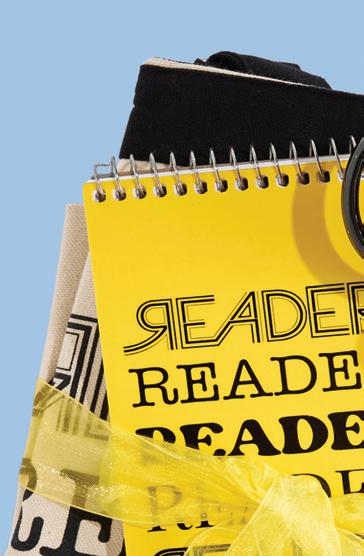
put me in prison. How much they want to do to a person over an alleged incident? If I ain’t did it, all of this is for nothing. And if you think I did do it, you done got your licks back before I got arrested, so you ain’t tired yet? You gonna take it this far, after you done already beat my ass? No matter how you cut it, this has been taken way too fuckin’ far.
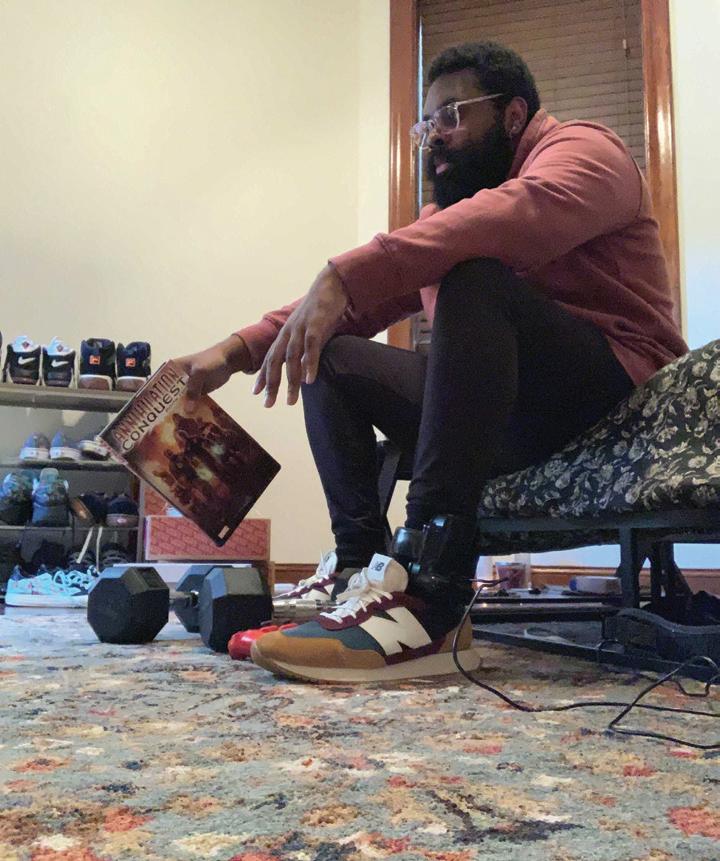
It’s making me think it was never about justice or public safety. No city that sends police o cers to beat up and kettle people in public has any moral authority to put people on house arrest for public safety, in my opinion, ’cause they put the public in danger. ’Cause they were dangerous to me, ’cause they were dangerous to those protestors. v



20 CHICAGO REA JUNE 9, 2022 ll
@imLeor
READER FOR EVERYONE! store.chicagoreader.com
COURTESY JEREMEY JOHNSON
continued from 18 SOMETHING
Cannabis, Comedy, and Mental Health

Cannabis and creativity are often associated with one another. Many people in the arts have claimed that using the plant helps open their mind and can be beneficial to divergent ways of thinking. We decided to explore the relationship between cannabis and comedy with comedian, writer, journalist, and dog mom Lauren Vino (pictured right). Nature’s Grace and Wellness Coordinator and Field Market Associate, Alia Reichert, Sparked the Conversation with Vino to learn more about how the pandemic has impacted the intersections between mental health, cannabis, and comedy over the past few years.
AR: Lauren, being a stand-up comedian and writer during the last few years must have been stressful. How has the pandemic impacted the comedy scene, your funny bone, and your mental health?
LV: I think at first there was a sense of relief from not having to “hustle,” and do two or three sets after a full day of writing at my day job. I have always identified as a writer and performer, so there was something nice about being able to focus on writing. But after a few months of that, I really missed having the creative outlet of getting on stage, and interacting with crowds and people in general.
AR: What made you decide to become a stand-up comedian?
LV: I never really made a conscious decision to become a comedian. It was very non-linear. It was just something I always wanted to try and never really had a reason to stop doing. I have taken breaks to focus on different writing projects, and I ebb and flow in terms of my creative focuses.
AR: Is comedy your go-to strategy or tool that helps you maintain your mental health?
LV: In my experience, performing in the comedy space has not been a way to maintain my mental health. I’ve seen how stand-up has a way of reinforcing unhealthy behaviors and justifying it as art, as in other creative communities as well. But that doesn’t mean comedy and mental health can’t co-exist. There is a huge link between creativity and mental health.
I often recommend that comedians work on their mental health as much as they can offstage. So that when you craft jokes about certain topics, like depression, you don’t destabilize yourself further. Otherwise, crowds can usually tell and are not comfortable. Bombing [a set] can destabilize a person further.
Read the rest of this interview online at chicagoreader.com/cannabis-and-comedy Lauren Vino performs at the Laugh Factory on June 10th at 7:30 and 9:30 pm, and at the Beat Kitchen on June 14th at 9:00 pm.

This sponsored content is paid for by Nature’s Grace and Wellness.

CHICAGOREADER.COM/NGWSPARK

JUNE 9, 2022 - CHICAGO READER 21 Paid Sponsored Content
Photo Credit: TJ Sopoci
THE PRIDE ISSUE

Go-going for it
Chicago’s own Paulo Batista bares all on the new series GoGo for the Gold
 By TONY PEREGRIN
By TONY PEREGRIN
GoGo for the Gold —think RuPaul’s Drag Race but for go-go boys—features a swoon-inducing roster of fuzzy bears, femme dancers in heels, and trans man Paulo Batista, all competing for a cash prize of $10,000 and the title of “American’s #1 Champion Gogo Superstar Star.”
“Not everyone is attracted to six-pack abs and big thighs,” says the 38-year-old Batista, a competitive bodybuilder and a building manager for Naval Station Great Lakes in North Chicago. “Some audiences want to see bears and dad-bods, others want to see performers that are just really great dancers. We’re all diverse. Even within the trans community, we all present ourselves differently. You’ve got nonbinary, you’ve got feminine, you’ve got hyper-masculine alpha; which is kind of like my vibe when you watch this show. It’s important to see that we’re all di erent and we all bring something major and incredible to the table.”
For the uninitiated, a go-go boy (or go-go girl, or person) is basically anyone with enough get-up-and-go to dance in skimpy or revealing attire on stage or on top of the bar in a nightclub or bar setting. A go-go boy is not technically a stripper as much as he or she is a bar-employed dancer whose job is to delight, amuse, and entertain the crowd—sometimes for cash tips.
A panel of judges fleshes out the winner based on four categories: fantasy, body, dance, and individuality, with one or more contestants eliminated each week. GoGo for the Gold is currently airing on LGBTQ+ streaming service OUTtv.
Batista’s fellow contestants were “super
supportive” when they discovered he is trans. “Some of them were actually surprised, because, I hate to say it—I have this passing privilege in the trans community. Ultimately, they were all just really excited to see that I could bring that representation to the show.”
Performing as a trans go-go dancer in the LGBTQ+ bar scene has its challenges. “Sometimes it’s hard to get work because the bar owners are afraid. Like, to be blunt—I don’t have bottom surgery. I wear a prosthetic phallus. So, if a mishap should occur while I’m performing on stage, how’s that going to a ect
the crowd? I’ve been turned down [for gigs] plenty of times, but other times . . . it’s not an issue. I mean, look at me: I made a reality TV show with the top 12 go-go dancers in the country!” Over the years, Batista has go-go danced at the Jackhammer and the Lucky Horseshoe Lounge—two popular Chicago LGBTQ+ bars featuring male dancers—without incident.
Batista says the Northalsted/Boystown area is generally welcoming to transgender individuals, although improvements to enhance diversity and inclusion are always necessary
no matter the neighborhood or space. “Wherever I’ve gone and shown my ID, I haven’t had any issues,” says Batista, who hasn’t legally changed his biological name. “All my legal paperwork, my credit cards, and IDs have my original birth name, Paula, but I have yet to come across a ‘wrong feel’ at all. There’s even a crosswalk for the transgender community in that area,” he said, referencing the pink, white, and blue crosswalk—the colors of the transgender flag—at Melrose and Halsted, one of 14 rainbow-hued crosswalks along Halsted in the neighborhood.
Batista transitioned more than 12 years ago. “I transitioned when transitioning wasn’t really even an option. But I’m a persistent, stubborn individual. I didn’t listen to people telling me what I could and couldn’t do, because I knew who I was. Over the years, I got my top surgery, I got my hormones, and I just followed my own path. My advice to others is
GOGO FOR THE GOLD
Series premiered May 13 and airs weekly on OUTtv. Viewable via Roku, Apple TV, and other streaming platforms; go to outtv.ca for more information.
to be persistent with your dreams. You’ll find a way. It might not be quick and instantaneous, but you’ve just got to be patient.”
GoGo for the Gold inspires viewers to think outside the (go-go) box by featuring contestants, like Batista, whose allure is ultimately rooted in their personal stories and how they connect to audiences, rather than standard perceptions of physical beauty.
“It’s also just a good, corny show. It’s all for fun and shouldn’t be taken too seriously,” adds Batista, before describing one of his favorite backstage moments. “I think the funniest shade was me back there with three di erent sizes of phallus prosthetic pieces just to give different looks, like a go-go dancer would. I asked them, ‘Which one should I wear today, guys?’ and they were so jealous! They were like, ‘We’re glad you get to choose!’”
While viewer response has been largely positive, Batista admits some of the comments on social media, particularly those criticizing someone’s looks or talent, have been disappointing, but not completely surprising. “I hate to say it, but I feel like there’s too much jealousy out there in the world. And it is especially hard to hear it from our own community. People sometimes just hate seeing others living a happy, true life!” v
22 CHICAGO READER - JUNE 9, 2022 ll
@tonycperegrin
Paulo Batista shines in a promotional photo created for the new series. HNS IMAGERY
PEOPLE


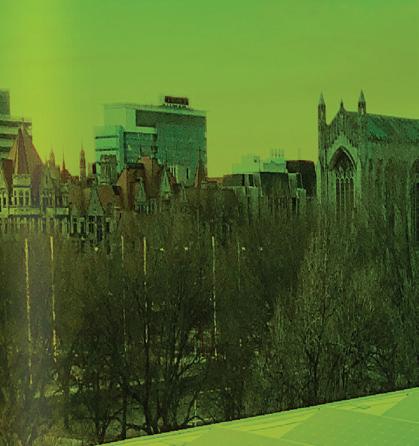




















JUNE 9, 2022 - CHICAGO READER 23 You can turn your life around, today If you are a young adult who started experimenting with alcohol or drugs and now find yourself unable to stop –feeling out of control, overwhelmed or hopeless – you never have to feel this way again. Discover is a life-changing addiction treatment program for young adults ages 18+, designed by the expert, clinical team at Recovery Centers of America. • Live with other young adults in semi-private rooms • Gender and age specific groups and workshops • Outdoor activity and gym time • Family therapy & support services AT ST . CHARLES Call Today: 331-422-4851 RECOVERYCENTERSOFAMERICA.COM/ST-CHARLES 24/7 Admissions • In-network with insurance • Family support services DRUG & ALCOHOL ADDICTION TREATMENT PROGRAM FOR YOUNG ADULTS 18+ To learn more about Blue Distinction, please visit www.bcbs.com or contact your Local Blue Plan.
Where the bars are
By JAMES DE LISE
THE PRIDE ISSUE

Are rainbow-festooned events full of glitter, sequins, and boas signs of progress? Strides made by LGBTQ+ people are increasingly under fire in the forms of violence, rhetoric, and quasi-legal attacks on the rights of the community. Has the LGBTQ+ community unwittingly played a role in this by seeking assimilation?
Some might say that the idea that LGBTQ+ people have achieved assimilation (or even acceptance) is up for debate. “I worry a lot less about being ‘assimilated’ than about the mental health and physical safety of queer teens in a country debating (again) whether it is OK for teachers to even acknowledge their existence,” says Dr. Lane Fenrich, distinguished senior lecturer in gender and sexuality studies at Northwestern University. “Heck, I worry about the mental health and physical safety of LGBT adults, especially trans adults of color.”

Dr. Amin Ghaziani, professor of sociology and Canada research chair in urban sexualities at the University of British Columbia, notes that queer spaces like gay bars are closely linked to the LGBTQ+ community’s sense of identity. “The history of gay bars is the history of trans people. We cannot think about one without the other,” he says.
Ghaziani continues, “If you consider the Stonewall riots as an example that has broad, even global recognition, then we know that members of the trans community were pivotal in the uprising, its motivational energy, and its effects in terms of affecting the American consciousness about sexuality, and the
LGBTQ consciousness about politicizing our identities.”
These struggles for the right to exist in safety over time have become less radical and more accepted. Contemporary Pride events are reminiscent of where we have been before with similarities to the drag balls Chicago has seen since the early 1920s. This is a history that has historically been remarkably inclusive in ways we haven’t seen in recent years.
The prohibition-era sociologist Myles Vollmer wrote about Chicago drag balls for his research in 1933: “Physically, all types are there. Homosexuals thin and wasted, others slender and with womanish curves, others overfed and lustfully fat. Most of the younger homosexuals have pallid complexions with rather thin hair, due, perhaps, to overindulgence. There is a preponderance of Jews and the Latin Nationalities, although homosexuality is no respecter of races. Many of the men are of Polish blood. Negros mingle freely with whites. There seemingly is no race distinction between them.”
This celebration flew in the face of the customs and laws of the society at the time, providing a safe place for all manner of queer people to come together and enjoy their right to exist. These temporary spaces, drag balls, were eventually replaced, following the repeal of Prohibition, with more permanence in the way of gay bars.
These bars were places of activism and community from the civil rights era through the AIDS crisis and the quest for equality in the 90s. Bars were a mecca of sorts for LGBTQ+
people from all over—a lighthouse of hope in the sea of a society that continued to denigrate and abuse queer people—and, mostly, accepted people as they were without regard to race, size, gender, and the like.
The bars were such an important support for the community that some people used to call bars on the telephone just to listen in on the “happy laughter of other gay people.” As interviewee and community member Myrna Kurland told writer Marie Cartier in Cartier’s 2013 book Baby, You Are My Religion: Women, Gay Bars, and Theology Before Stonewall, “I used to phone up all the gay bars, just to hear them answer the phone. Just to hear the noise. I would just hear the noise and the laughter in the background. I just wanted to be there.” These days, the movement of many in the LGBTQ+ community away from LGBTQ+-specific spaces has in part led to their rapid decline. Though there is limited data, existing research including a 2019 paper by Greggor Mattson at Oberlin College shows that the number of gay bars nationwide has dropped by more than half since the mid 1980s.
“We’re not going to really understand the full impact of the loss of these spaces for a number of years,” says K Anderson, a cultural anthropologist who created the Lost Spaces podcast with this very topic in mind. “There is an older generation of queers who are recognizing and mourning the loss. Over the coming years, I think we’ll start to see more innovation, reimagining both the community and the spaces that hold them. People’s priorities and need for queer spaces have changed, and the
scene needs to evolve to reflect that—hopefully, this means that there are spaces that aren’t exclusively centered around drinking and drugs, ones where people of all ages feel welcome. What that looks like exactly I don’t know, but we are a resilient and innovative community, so I’m excited to see what is to come.”
“Assimilation is a double-edged sword. We spent years trying to prove that gay folks are equal and just the same as straight people. Now that we’ve done that—marriage, military, kids, etcetera—we seem to have dumbed down our once gay culture,” St. Sukie de la Croix, a gay historian and inductee in the Chicago LGBT Hall of Fame, tells the Reader. “Gay bars, bookstores, and newspapers are disappearing. Is that good or bad? As a gay senior, I’m very conscious of the danger of clinging to the past and not accepting new things. However, it does seem a shame that what made us di erent and exciting is now being watered down.”
De la Croix isn’t the only one worried about this loss of culture. World Business Chicago’s vice president and director of marketing and communications Andrew Hayes agrees. “The Gay Pride Parade that began to help demonstrate the community’s collective power is today a traveling party, a drink fest. While the acceptance and assimilation have led the community to realize greater access to what others enjoy, it has also, in my humble opinion, given us less of point-of-distinction, too. Our once ‘rallying cry’ has been silenced. We are now happily blended—but thinking back to the days of ACT UP and the need to protest for
24 CHICAGO READER - JUNE 9, 2022 ll
ENVIRONMENTS
Has LGBTQ+ acceptance resulted in losing valuable community spaces?
BILL ROUNDY FOR CHICAGO READER
the rights denied us, but a orded others, united the community in ways we don’t see today.”
In preparation for June’s Pride Month, young sta ers in Hayes’s o ce passed around rainbow flags and other decorations. He says, “Watching this unfold stopped me in my tracks. While I appreciate and am genuinely touched by the outward demonstration of support this was intended to represent, I couldn’t help but think that all those who fought for our rights, and died from discrimination in all its forms, were reduced to desktop flags. At that moment, having known friends who were dying weekly from AIDS, and having seen regular protests and fights for our civil rights, I wished for those younger than me to see LGBTQ history as so much more than a desktop flag.”
These experiences di er based on circumstances. Dr. Ghaziani says, “Attitudes about homosexuality have liberalized at unprecedented rates, as we can see from the Gallup
THE PRIDE ISSUE

poll [Ghaziani is referring to his research based on a 2011 Gallup Poll asking respondents, “Do you think gay or lesbian relations between consenting adults should or should not be legal?”]. Sometimes, we falsely assume that aggregate statistics about public opinion apply to all LGBTQ people. This is not true, unfortunately. Cis white gay men and women have a set of experiences that are different from racialized and trans communities. As an example, we see that these groups are systematically more susceptible to anti-LGBTQ violence.”

“We receive the protection of popular culture, as the ways we look, and love, are synthesized by the mainstream. The benefit is we may become less threatening. We lose being viewed as radical. At the same time, we become diluted and divided as other ‘isms’ like sexism, classism, elitism, and racism rise to the surface,” says Dionne “Choc Tréi” Henderson, executive director of BIPOC and LGBTQ+
kink organization Paragon Cooperative and Club and a board member at Chicago’s Leather Archives and Museum. “In other words, we sacrifice the uniqueness that binds us together by mimicking heterogeneous customs.”
These “isms,” and others, sometimes make gay bars themselves less than inclusive. This leads to finding other venues—such as cruising places or, recently, apps. Dr. Ghaziani adds, “Cruising places have been foundational to the history and culture of gay men. In the 1960s and 1970s, political liberation was inextricable from sexual liberation. To have sex was a radical act, a liberatory act, an act in the service of pleasure as well as politics.”
Though cruising places still exist, one needs
only look at websites like Squirt to find out which neighborhood park or library restroom hosts men looking for sex with other men; other online platforms have taken the place of that risky activity. “While platforms such as Grindr and Scru make hooking up a virtual certainty for those looking to do so, they aren’t the wild ruptures in the sexual culture they’re often depicted as. Neither do they impede the formation of friendships or the development of communal ties,” Dr. Fenrich says. “Although I’ve sat through many a dinner party where such suspicions were aired as certainties.”
Depending on your perspective, there is much still radical about the LGBTQ+ scene in our city. Many LGBTQ+-owned gay bars and businesses serve the community as a space to congregate and a rm—just not as many or in the same ways as in their heyday. The danger exists in our allowing them to close without replacing them with something aspirational, welcoming, and distinctly our own.
Celebrate how far we’ve come and brace yourself for the work to be done by enjoying libations and liberation at some of these Chicago gems:
Berlin 954 W. Belmont; berlinchicago.com
Welcoming everyone since 1983, Berlin is an inclusive venue for dancing, drinking, and drag.
Big Chicks
5024 N. Sheridan; bigchicks.com
Visit Big Chicks for Sunday brunch and some mimosas to cure those Saturday night-induced hangovers, or drop by late at night for a raucous time.
Bobby Loves
3729 N. Halsted; bobbyloves.com
A longtime Boystown—ehrm, Northalsted— staple, this neighborhood watering hole never disappoints.
Cell Block
3702 N. Halsted; cellblockchi.com
A kinky, cruisy bar with no dress code—explore the back bar at your own risk.
Club Escape 1530 E. 75th; clubescape.com
Longtime South Shore staple for LGBTQ+ cocktail lounging and drag shows.
Hydrate 3458 N. Halsted; hydratechicago.com
The best DJs ply their trade for your dancing enjoyment late into the night.
Jackhammer (reopening summer 2022) 6406 N. Clark ; jackhammerchicago.com
Not for the faint of heart. Jackhammer bills itself accurately as Chicago’s leather and fetish lounge. Welcoming and friendly, Jackhammer is a quintessential leather bar at the heart of Chicago’s community. The Hole at Jackhammer is more than a little cruisy; this is a play place for Chicago’s kink scene.
Jeffery Pub 7041 S. Je ery; instagram.com/je erypub
A neighborhood institution in South Shore since the 1960s, this community-focused bar serves up drinks, community, viewing parties, and DJs in a convivial environment that welcomes multiple generations of LGBTQ+ Chicagoans.
Lips 2229 S. Michigan; lipschicago.com
Offering a prix fixe menu and a la carte drinks, Lips delivers on drag dining. Every meal is a party, and you cannot leave without your sides hurting from laughter.
Nobody’s Darling 1744 W. Balmoral; nobodysdarlingbar.com
Offering exquisite cocktails in a glamorous, sexy space, Nobody’s Darling is a treasured addition to the neighborhood.
North End 3733 N. Halsted; northendchicago.com
A mustn’t miss, friendly sports bar, serving the gayborhood since 1983.
Progress Bar 3359 N. Halsted; progressbarchicago.com
O ering a fun time and an incredible light sculpture, Progress Bar is a modern gay bar
fit for fl irting, fun, and more.
Second Story Bar 157 E. Ohio; 312-923-9536
An old-school, cash-only hideaway on the second floor above an Armenian restaurant that has served downtown patrons and friendly regulars since the 80s.
Sidetrack 3349 N. Halsted; sidetrackchicago.com
Spanning several buildings, it’s easy to get lost as you attempt to fi nd your groove— though the programming and $6 well drinks more than make up for the ever-growing bar.
Splash 3339 N. Halsted; thesplashchicago.com
Keep up on Drag Race at Splash Social on Friday night, featuring lots of fun and a $25 package for unlimited food and drink.
Touché 6412 N. Clark; touchechicago.com
Around since 1977, Touché has shared its living history as one of the country’s premier cruisy leather bars. v
JUNE 9, 2022 - CHICAGO READER 25
@JamesDeLiseJD
BILL ROUNDY FOR CHICAGO READER
THE PRIDE ISSUE
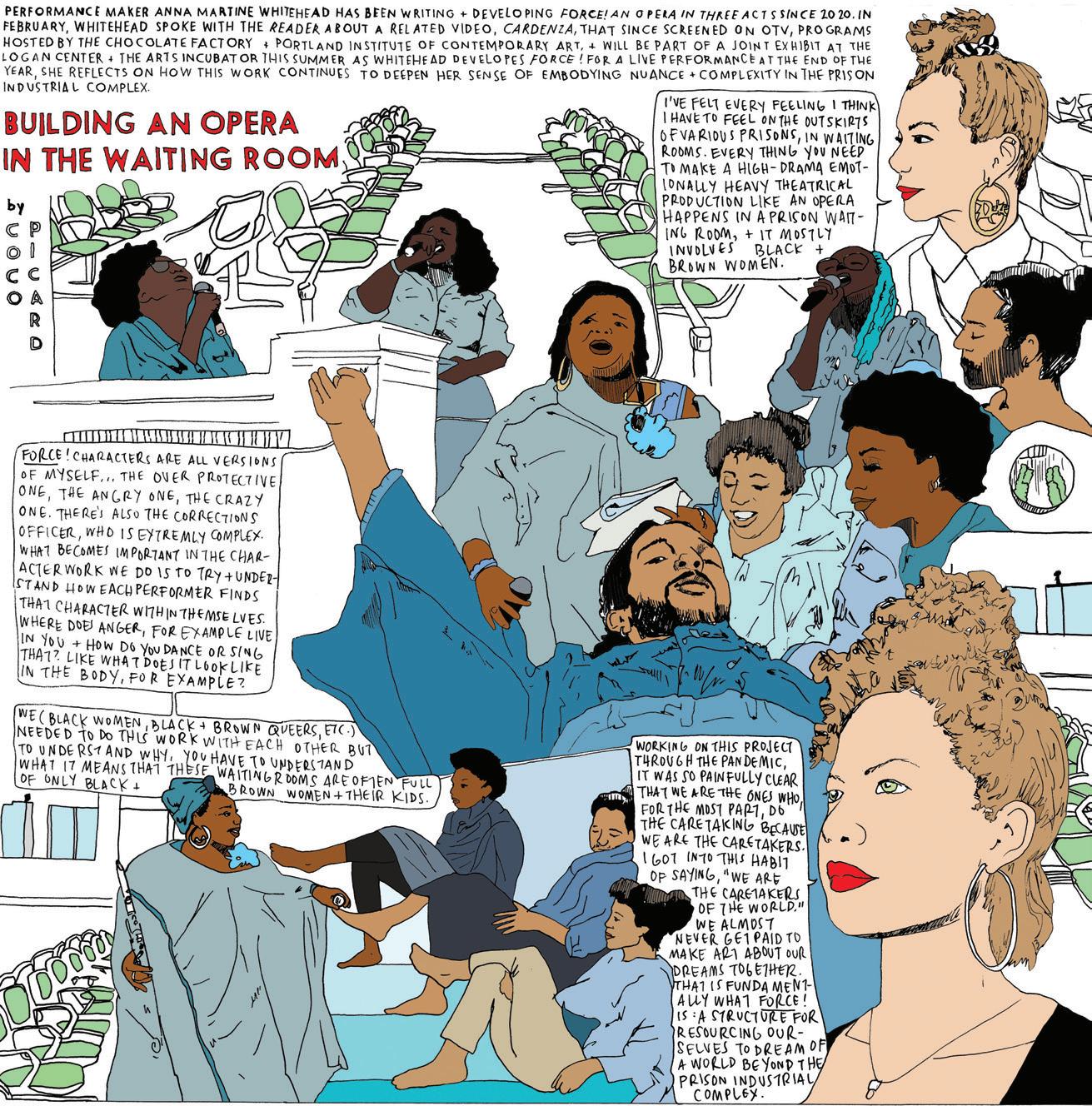

26 CHICAGO READER - JUNE 9, 2022 ll
Coco Picard spoke to Chicago artist and SAIC assistant professor Anna Martine Whitehead in early June. COCO PICARD
@cocolarolo COMICS JOURNALISM





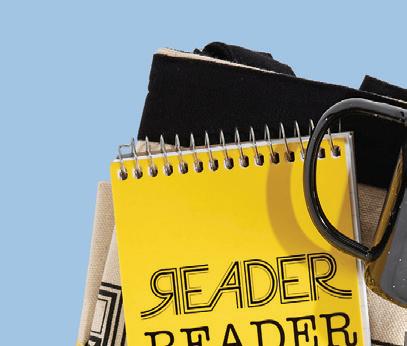

















GO READER 27 safe and fun space to explore your artistic side creativity flow Let the with 800 N Kedzie #208 Chicago native312.events YOU CAN ART TOO! Featuring Spray Paint n’ Sip events SOMETHING READER FOR EVERYONE! store.chicagoreader.com
THE PRIDE ISSUE

DRAG A bigger and more colorful world
By SALEM COLLO-JULIN
There’s an expectation for most contestants on the drag reality competition show RuPaul’s Drag Race that the gigs will come a’callin’—and for those who have been lucky enough to appear in the big money, Emmy-nominated seasons, this can mean constant and sometimes worldwide travel for a while after their TV appearance.
Denali is one such drag queen. The Chicagoan (via Alaska and Utah) competed in season 13 of RDR, which was filmed during the 2020 Summer of Pandemic and aired on VH1 from January to April of the next year. While Denali left in eighth place at the conclusion of episode ten, she solidified her reputation as a well-balanced performer with dancing and lip-syncing skills that kept her in the sights of her fellow competitors.

Denali spoke to the Reader before a recent hosting gig for the international Pride Bands Alliance (an evening of symphonic band performances at the Auditorium Theatre presented by Chicago’s Lakeside Pride Music Ensembles) about ice skating, drag, and her adopted hometown of Chicago.
Salem Collo-Julin: What brought you to Chicago originally?
28 CHICAGO READER - JUNE 9, 2022 ll
Denali in her entrance look for RuPaul’s Drag Race, season 13 COURTESY THE ARTIST
Drag queen Denali talks ice skating, Alaska, and Chicago.

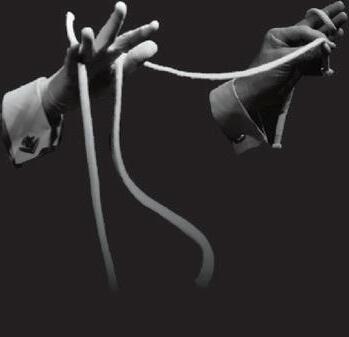

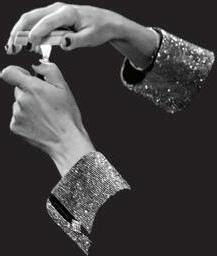






JUNE 9, 2022 - CHICAGO READER 29 5050 N CLARK STREET | 312•366•4500 | CHICAGOMAGICLOUNGE.COM THE SHOWCASE TUESDAY 7PM MUSIC & MAGIC MONDAY 7PM SHOW SCHEDULE ARTIST-IN-RESIDENCE 7PM WEDNESDAY THE SIGNATURE SHOW THURSDAY-SUNDAY 7PM & 10PM THE PERFORMANCE BAR OPENS EVERY NIGHT AT 5PM!
POTTERY TOUR





THE PRIDE ISSUE
Denali: It was a funny transitional period in my life where I was like, OK, I am tired of living on the road. I was doing figure skating tours from about ages 20 to 25, and I wanted to stop living out of a suitcase and to really find a city of my own.
And I knew I was a big city kind of girl. I always wanted to be in a big city, and New York just felt like too much to me. I think for a young kid, there’s that feeling of wanting that midwestern friendly kind of deal all the time, but obviously still wanting to be in a big city. And the only city that had both of those feelings was Chicago.
And had you been actively doing drag before you moved here?
No, I absolutely hadn’t. I moved here purely as Cordero [Denali’s name out of drag]. And then Denali was developed as I started in the club scenes here in Chicago.
I did some very bad bedroom drag and just played around with friends, but nothing serious. I wasn’t yet studying the craft. It wasn’t until I found Berlin nightclub and this really great group of friends that gave me a lot of advice—that’s where I really started to learn and grow.
Can you remember what turned your head to drag performance? Was there a performer you saw that made you think, “Oh, I want to do that”?
I lived and worked on cruise ships for a while, working as an ice skater and performer on the ships. And there’s a large queer community working on cruise ships, which was honestly the first time in my life that I’d ever been surrounded by a large group of LGBTQ+ people— which was really nice.
And we would all get together on Sundays and we would watch Drag Race . I believe it was season five that did it for me. Oh, Lord. I was in a trance. I was just like, “Oh, what is this? I’m obsessed. I love it.”
This came at a time in my life when I felt really constrained by a lot of the things around me. I lived on cruise ships. It’s just a super limiting kind of lifestyle. You feel like you’re bound to this massive tin can at sea. And as liberating as that might sound to some people, when you’re on the ship for two, three, four years at a time, it feels really restrictive. And I just felt like the world had to be bigger and more beautiful and more colorful.
What was your queer experience growing up in Alaska and going to Utah for college?

You know, I grew up in a Christian household in Fairbanks, Alaska. So in general, not only was it a small town, but because I grew up with those ideals, I was taught that my sexuality was taboo and that my sexuality was not to be spoken about.
I grew up ice skating. That’s all I did. All I did was ice skate because it made me happy. And so by the time I reached age 13, I was like, I have to do something with this. And I felt very limited by my hometown. There was no professional coaching available there. So I decided to take a leap. And I moved to train and professionally skate when I was 15, which was way too young (and my mom agrees with me).
So as surprising as it may be, Salt Lake City, Utah, was where I came into my queerness the most. I was 16 or 17, and that was where I was finally exposed to some other queer people. And they were in my ice skating, my high school, and my college. That’s where I really felt like I started to blossom and develop. I went to my first Pride there when I was 17.
There is something to that—those places where you wouldn’t expect to see the largest amount of queer people often have LGBTQ+ communities that are just so solid.
I think it’s because there’s so much restriction in those places that the people that have gotten out of that mindset are even more passionate and more intense about making sure that they are loud and proud and things like that, because they know that around them is a lot of bigotry and hate. So actually, I’ve met some of the queerest people in Utah.
Ice skating still seems like it’s a big part of your life and it sounds like it was something that you jumped into early on.
My sister was a beautiful ice dancer. And of course, being the young queer kid that I was, I emulated her, and I wanted to be her. She was so beautiful. She was just the most ethereal goddess in my life. And when you’re a young gay thing, you glamorize beauty.
I said something so dumb on [ RuPaul’s Drag Race] one episode. I was just like, “I love chandeliers,” when I was in costume as a chandelier. But the rest of my thoughts were edited out. While we were doing post-production voiceovers, I was able to add that as a young
queer kid trapped in Alaska, I was drawn to beautiful and ornate things. And I didn’t realize that my obsession with these lamps was just my expression of queerness as a kid.
Do you feel like there’s any difference in how you approach choreography for a drag performance versus something that you’re going to be doing on the ice?
Choreographing for the ice is a totally di erent mindset. You’re constantly moving [on the ice]. You take one push and you’re suddenly accelerating. Most skaters are going seven to ten miles an hour or something like that. There’s constant acceleration. It’s dancing, but you are flying at the same time.
And then for drag, [choreography is] not always all about being dynamic, but you’re trying to draw attention to yourself. You’re trying to feel the spotlight. A lot of people tell me that they thought I choreographed a lot of my lip syncs [on RDR], and some of them were, but some were just working out a few moves in my hotel room the night before.
You made a video in 2020 [Chicago Drag Excellence, featuring many Chicago drag performers] and released it online after the season premiered in January of last year.
We have been in quarantine for so long, and the year prior was so di cult for Chicago drag. Nobody was working. Nobody was happy. Nobody was really doing much with their drag besides creating digital drag videos.
The video was an opportunity for us to all gather safely, laugh again, and to just feel like we were being fabulous all together. There were around 40 performers in the video, and everyone had a two-hour block, and it was a lot. I’m really proud of Chicago doing that.
What would you tell a drag performer new to Chicago that they must do?
One thing that you should do if you come to Chicago or if you’re trying to get into the scene anywhere is find your people. You need people, you need your sense of community not only to share skills, share wigs, share costumes, all that stu , but it’s the whole point of drag, in my opinion. Find your tribe and find the people that you click with and grow with them. v @hollo
30 CHICAGO READER - JUNE 9, 2022 ll
Chicago Mind Clay Body 3729 N. Ravenswood #139 Villa Park | Aurora | Sandwich
June 11-12, 2022 | 10am - 4 pm Visit our other stops in the area! Details at: northernilpotterytour.com
continued from 28 u THE chicagoreader.com/donate We Couldn't Be Free Without You— Support Community Journalism chicagoreader.com/donate







JUNE 9, 2022 - CHICAGO READER 31 JUNE 10-11, 2022 McCORMICK PLACE LAKESIDE CENTER, 2301 S. LAKE SHORE DR. EXHIBIT HALL HOURS : Fri. 10am-5pm | Sat. 10am-4pm A FULL SPECTRUM CONVENTION For full information: necann.com/illinois SPEAKERS AND SESSIONS INCLUDE ... ... AND MUCH, MUCH MORE! I C C LLINOIS ANNABIS ONVENTION THE TWO FULL DAYS of B2B and consumer-facing programming DOZENS OF EXPERT SPEAKERS with practical knowledge and advice for attendees of all levels of experience and knowledge Advance purchase: $40/day, $70 weekend pass Cash only for tickets at the door. 18+ unless accompanied by an adult. Children under 18 with a parent/guardian do not need a ticket. OVER 100 EXHIBITORS BUSINESS • How To Create a Thriving Retail Environment that Delivers Consistent Satisfaction • R&D Tax Credits for the Cannabis Industry • Post-Application Crash Course: How to Execute Your Operational Plans for a Successful Launch • 4 Keys to Cannabis Tax Every CEO & Investor Should Understand • Cannabis Media: Successfully Landing Free Earned Media • FDA Enforcement: Adapt Your Marketing Strategy • Licensing Partnerships • Cybersecurity Priorities for the Cannabis Industry • License Strategy: Social Equity, Diversity, and Municipality Application • Patents and Trademarks in the Cannabis Industry CULTIVATION & PROCESSING • Living Soils: Incorporating Bene cial Biology • Fine Tuning Environmental Factors to Optimize Cannabis Crop Productivity • Breeding: Grandaddy Purple • Retailers Require Remarkable Reefer • Remediation Is For Losers • Tissue Culture • Upleveling Your Cannabis Processing Facility By Assessing the 8 Wastes of Lean • Di erentiation with Infused Products • Building a Compliant Facility • Happy, Healthy Indoor Cultivation INDUSTRY & INNOVATION • Cultivating a Career in Cannabis: Tips by Illinois Women in Cannabis • Building and Keeping Your Business Sustainable • Creating Space Through Collaboration In the Cannabis Ancillary Space • Sustainable Packaging • Cannabis Delivery: What Illinois Can Learn from MA, MI + CA • Supporting Social Equity Cannabusinesses • Beyond Diversity: Equity and Inclusion in Cannabis • Bringing Greater Social Equity to Illinois • Canna Tourism Is A Thing! Opportunities in a Booming Sector ADVOCACY & MEDICAL • Helping Families Navigate Alternative Medicine For Their Special Needs Children • Cannabis as Medicine • Discerning Best Practices for Working with Pediatric Medical Cannabis Patients • Fact or Fiction: Health Bene ts of Cannabis • Cannabis Access and Support for Veterans • Hey cannabis brands: Please stop using the words indica, sativa, and hybrid • How the Pandemic is Shaping the Cannabis Industry • Your Message: Designed By Demographic BOOTH SPACE AVAILABLE!
Musical makeover
By KIMZYN CAMPBELL
THE PRIDE ISSUE
If you spend any time breathing, you may have noticed polarities everywhere these days, most emanating from a belief gulf that is exponentially widening between conservatives and liberals with every Twitter post. One polarity being heightened not just in social media, but also in government chambers and around dinner tables, is the divide between LGBTQ+ people and the cisgender straights.
This divide is certainly not new—the original Queer Eye cast tried to bridge the gap between queers and straights back in 2003 by being “Out to make over the world. One straight guy at a time,” hence o ering up some skills to thrive on their reality TV show. The trope of gay men who really have their shit together (around grooming, decor, emotional regulation, and cookery) was played out as a fantasy that challenged historically cis-male obliviousness on a case-by-case basis. The idea was to gently hug and shoo away toxic masculinity in favor of a friendlier, rowdier, albeit more organized—and often more gentrified—life experience.

The even more popular reboot of the show (2018) was almost a parody of its former iteration, all while taking things further in a good way by modeling emotional intelligence, radical acceptance, and owning trans identities. The show embraced its mission with the same corny if joyous earnestness, and also added a layer of diversity (and made many of our hopes come true) by inviting in non-cis straight people for makeovers at last. Taken in correct doses (binged), the Fab Five can act as a balm against the relentless news cycle or any feelings one might catch about humanity as a whole sucking. That is why I have loved Queer Eye , uncritically accepting its absurd premise—the one where five visibly queer people
turn up in American towns, pop up in the life of their subject like a storm front, cheerfully ignore stunned locals, and joyously improve the confidence, setting, and curb appeal of an individual who may have voted for the limitation of their human rights.
Do I sound cynical? Let me assure you I am not. I have seen every episode of Queer Eye , in all iterations, from the somewhat directionless Queer Eye: We’re in Japan!, to Queer Eye: Germany (where all of the experts were swapped out with actual German people).
And so when I heard that Second City was mounting Queer Eye: The Musical Parody right here in my hometown, and in time for Pride Month, picture my joy. Unless you happen to know my opinion on musicals. With a few exceptions (Hair, Jesus Christ Superstar, and Grease), my avoidance of musicals is palpable for a theater critic. Yes, it is ironic that I accept the blithe Queer Eye story line, yet can’t suspend my disbelief during musicals long enough to imagine how folks might opt to express their feelings in song. Why not angrily journal or call a friend instead? So you see, this is why Queer Eye: The Musical Parody is the perfect conundrum for me.
One question I asked myself, and then, somewhat rudely, asked talented composer/ music director/lyricist/orchestrator Heidi Joosten was, “Can my love of the Fab Five (and their relentless shenanigans) override my fight-or-flight urge when that first actor belts out a tune?” Joosten politely described her faith in the show’s ability to win me over. “In the same way that we set out to honor the people that we are parodying, the music for this show is meant to honor lots of people’s di erent tastes. We make fun of many musical theater tropes, but the music does not feel like Rodgers and Hammerstein 2.0. . . . I would sug-
gest that anybody that’s comfortable turning on their radio is going to find something to like about the music in this show.”
But: “Can the pleasure of watching gay men crush the patriarchy one makeover at a time be enhanced with music?” I asked, clearly just unable to let this go.
“I believe in musical theater that you are obligated to tell an honest story. This particular show to me made a lot of sense to parody because there is no true human villain (in it),” Joosten explained. “The villain is societal expectations, and trying to just find the true person within that gets to shine. Everybody there is just trying to find the happiest version of themselves.”
The first run of Queer Eye: The Musical Parody played to sold-out audiences in a pre-pandemic 2019. I asked Joosten if the show has changed much since. “It honors the last show that we did and it is a completely different show. We have cut characters, we have added characters, we have expanded characters. It is now a full two-act musical when it was a oneact before. It’s been exciting to see the show grow from the playground version through the pandemic as we grew as people.”

Growth is good. But, I wondered, will parody be applied in a punch-up or punch-down direction? For example, in parodying a show that already is a parody, couldn’t things veer into satire territory? Evan Mills, co-director/ writer/creator, is certain that is not the case. “They are real people, and we’re parodying real lives . . . taking their qualities and just heightening it to a fun and playful level. When you start writing parodies, you immediately pick up on the things that maybe they get teased about, but then you take it and you’re able to flip it and to twist it and showcase everyone’s strengths in humor.”
Seasoned actor Evan Tyrone Martin, who plays culture expert Karamo, agrees, explaining how the Queer Eye series has captured his admiration. “It wasn’t something that I necessarily would’ve seen myself watching initially, but once I got into it, the relationships that these men built with each other, with the people that they were helping and even with families . . . these people truly care for each other and want to help each other. What Evan and Heidi put together is so smart and really funny, but also cares so much about these people and the message that they’re trying to convey. They did an excellent job of being funny without losing the heart that exists with the show.”
I wondered if the show would involve improvisation, since it was taking place at Second City. “While there could have been pockets for a scene that we could improvise, we didn’t want to take the risk of anything feeling out of place. And we wanted to really make this a musical and not an improvised musical,” Mills explained.
Fair enough—inviting audience commentary on LGBTQ+ identities in today’s climate (even in queer-friendly Chicago) could potentially get dicey. I picture well-meaning drunk audience members suggesting inappropriate things, like I dishearteningly once endured at a dog improv show not long ago. (Second City performer Peter Kim left the 2016 Second City e.t.c. show, A Red Line Runs Through It, in the wake of what he described in a Chicago magazine piece as “increasingly racist, homophobic, and misogynistic comments [hurled] at me and my castmates.)”
Mills explained, “It’s significantly important that we are opening that first weekend of June. We wanted this to be a Pride show, but we also didn’t want it to just be a Pride show.” The run is all summer long, giving the show the opportunity to showcase queer identities beyond the rainbow-bloated month of June.
Martin added, “So many of the messages around Pride itself are about inclusion and acceptance and just celebrating the person that you are. And this show is all of those things.” v
@kimzyn
32 CHICAGO READER - JUNE 9, 2022 ll
Queer Eye: The Musical Parody runs through August 28 at Second City’s UP Comedy Club. TIMOTHY R. SCHMIDT
COMEDY
Second City reboots its Queer Eye parody.
THE PRIDE ISSUE
relationships.’”
The idea of a reality show encompassed all of the participants’ ideas.
They began to discuss the challenges nonprofits and activist organizations face and the hoops they have to jump through. They then set out to portray how foolish those things are through the game show/reality TV framework.
Two teams compete in the season finale of the reality show, Gayme Changers : Team H2Aid, an environmental justice organization, and 4 the Kidz, a mutual aid group. The mutual aid group centers getting trans-a rming clothing and other supplies to those who need it and helping people legally change their names.
anxiety, I’m not going,’ or, ‘OK, I’m going to brace myself because the actors may ask me to do something’—keep in mind, they don’t have to. It’s not required. . . . At most, we’re asking people to talk. And we have community agreements that will be set up and will say, ‘This is a safe space to be wrong. This is a place where we center queer people and people of the global majority. So don’t come in here with your racist-ness or your transphobic whatevers—keep that to yourself.’”
They also note that audience participation includes just coming and watching.
NEXT GENERATION
All in the Gayme
About Face Youth Theatre creates in a climate of consent.
By BRIDGETTE M. REDMAN
This June, queer youth are challenging audiences on what it means to be active in environmental justice and to participate in mutual aid activism.
About Face Youth Theatre, founded in 1999, o ers annual workshop sessions where LGBTQ+ youth and their allies ages 13 to 24 can participate in activist theater that supports learning in safe and nurturing environments.


This month, from June 18-24, AFYT will perform an ensemble-devised piece written by Kirsten Baity called Gayme Changers Directed by Vic Wynter, the show’s premise is that it’s the final season of a hit reality television show where teams compete for a $4 million prize and the title of America’s next Social Justice Superstars. It’s an immersive comedy about climate change activism that functions as a call to action.
The inspiration came from discussions Baity had with another producer about what they thought was important to be talking about with the current cohort of youth, and what they wanted to leave the young artists with as they finish the program.
“As much as this program is about creating a show at the end, we also want to create good
humans who are taking care of each other,” Baity says. “What we decided was not only something we wanted to teach people, but was also in our wheelhouses, which was discussing environmental justice as well as mutual aid.”
The path to the show started last fall when the ensemble created an audio drama of a turf war between Chicago rats, pigeons, and fairies. They wanted to keep that sort of magic and foolishness without having to come up with costumes that would look kitschy.
“We needed the people to be people,” Baity says. “But we wanted to keep the drama.”
As an exercise to explore social justice, they had sessions where they played Monopoly, except the rules reflected the real world. Not everyone started with $200. Some started with $1,000 and some with $40. Some people were not allowed to buy certain properties as a re-creation of redlining. It began introducing ideas of capitalism and mutual aid.
Then they invited the youth to brainstorm.
“We talked about some things that we want to see in this play and they were like, ‘We want something that’s very queer—that’s a given,’” Baity said. “‘We want something with a lot of fun, a lot of drama. We want to see friendships. We want to see di erent kinds of
“The reason we created that team was because we wanted to talk about how it can be really easy to be defeatist and feel like there’s nothing we can do because we aren’t legislators, and phone banking and petitions only do so much,” Baity says. “But even when we can’t stop the Greg Abbotts of the world, we can definitely say, ‘You can have that haircut that you want, you can have your name legally changed, and you can get your gender marker changed. So even if the country is not with you, we are with you.’”
About Face Youth Theatre operates under a consent-based model where no one is touched without permission and the ensemble abides by community agreements they develop. The consent-based model extends to the audience, an important factor as immersive theater relies on audience participation. They will not, Baity says, be like the circus where someone comes up and starts touching you or messing with your hair.
Gayme Changers will have, Baity says, very specific containers of how they want the audience to participate. They will ask specific questions related to the theme of the show. The audience will be invited to brainstorm with those around them.
GAYME CHANGERS
Sat 6/ 18, 7: 30 PM, Sun 6/ 19, 3 PM, Wed 6/22 , 7: 30 PM, and Fri 6/24, 7: 30 PM; Den Theatre, 1331 N. Milwaukee, aboutfacetheatre.com, $ 5 -$ 35.
They also want to make sure the audience knows they are in a space where consent matters.
“One thing that was a big deal was letting the audience know that there was going to be participation,” Baity notes. “So, if you’re like, ‘That’s going to give me way too much
While the ensembles start with a baseline of community agreements, each one is customized to the group. Their very first workshop with each new ensemble is spent talking about what participants need to feel safe, to feel a rmed, and to be able to do their best work.
For example, artists are told that their boundaries are perfect where they are and they don’t have to explain them. If they say, “Don’t touch my elbows,” they don’t have to give a reason why. They also teach that artists can say no—to anyone, regardless of whether they are a fellow cast member, a director, a group leader, or the artistic director.
“Everybody is like, ‘We’re down for a no and for letting the no be as celebrated as the yes,’” Baity says. “It’s important to be like, ‘Thank you for telling me, thank you for setting that boundary.’”
They engage artists about their boundaries and whether they are comfortable with an alternative or whether they have an option within their boundaries that will help tell the story.
Baity says About Face Youth Theatre works hard to get youth in the room and help them to launch careers in theater if that is what they want—to provide them with a place of support and the network of connections that they need.
As for this production, they want the audience to know that it is very campy and designed to have a fun time without preaching.
“As much as we love the messiness of being human, of reality television, at the end of the day, we still care for each other,” Baity says. “Even when everything is a mess, we can still do something. We’re not pushing green capitalism; we’re not pushing this idea that you have to donate all your money to various organizations. We’re saying that even if all you’ve got is groceries for one person, that is doing the work.” v
JUNE 9, 2022 - CHICAGO READER 33
@BridgetteRedman
About Face Youth Theatre in rehearsal KIRSTEN BAITY
THE PRIDE ISSUE
Bringing the Pride party to the people
TRQPITECA offers an “oasis at the crossroads between paradise and the underground.”
By MATT SIMONETTE
For LGBTQ+ audiences and their allies who may not want to spend all of their Pride weekend on the north side, the arts collective TRQPITECA offers an alternative.
TRQPITECA, formed in 2015, consists of Chicago DJs and producers Natalie Murillo, aka La Spacer, and Jacquelyn Carmen Guerrero, aka CQQCHIFRUIT. Murillo and Guerrero curate nightlife and festival performances that bring together installation art, videos, dance music, and live performances. On June 26, they will host the second Queer Pride celebration at Ping Tom Park, 300 West 19th.
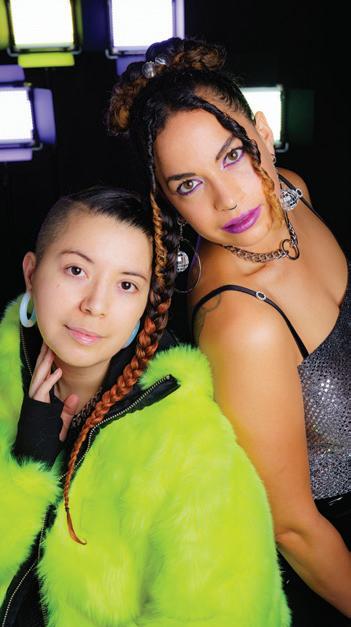
“We want to have two stages,” Murillo says.
“We’ll be having a better sound system—not that we had a bad sound system the last time, but [worrying about sound] is my curse— there will be more queer artists performing and DJing.”
The first Queer Pride celebration at Ping Tom Park took place in 2019, when a storm closed down the Pride Parade on the north side. Pride celebrations across the city were canceled because of the COVID-19 pandemic in both 2020 and 2021.
“In 2019, the rain started at about 3:30 or 4 o’clock,” Murillo recalls. “It did go away within 45 minutes, but a lot of people didn’t end up going because of the rain. I’m expecting a bigger turnout, unless there’s some rain.”
Guerrero and Murillo conceived of TRQPITECA as a way to join their disparate musical backgrounds. Murillo, a Chicago native who grew up in Little Village, was steeped in the city’s house culture. Guerrero, who is from Miami, had a repertoire with origins in Cuban and tropical sounds. Their tagline is “the oasis at the crossroads between paradise and the underground.”
They met each other in the worlds “of art and dance,” Guerrero says, at an event where Murillo was doing the music and Guerrero was dancing.
“We DJed at a fundraiser event together and decided that we should do something regularly,” Guerrero says. “We did try something on the north side too, at Logan Square, and it was horrible. We decided that we needed to go where more of our people are.”
They now take pride in bringing diverse sounds to diverse audiences, and don’t want to fall back on current hits or dance staples.
“We are part of underground artists and communities,” Guerrero says. “But I think it’s important for us to uplift what’s going on through emerging artists and a variety of voices, not just what you hear on the radio or gets lots of the airtime.”
Guerrero credits Murillo with conceiving
TRQPITECA’s name. They first combined “tropical” and “discoteca,” with the “-teca” su x conveniently also evoking techno music. But Guerrero suggested, “Let’s throw a q in it to make it queer.”
Guerrero started as a DJ because, “I love to dance. I really want to share what moves me with other people and play around. I was part of the Chances Dances collective for years, and they taught me how to DJ.”
where queer audiences at the time needed more regular entertainment gatherings, while the warmth evoked by Guerrero’s tropical-inflected sounds provided a welcome respite from the harsh Chicago winter.
Murillo recalls asking themself: “‘Why do I have to go north every weekend? What if I want to do something in this neighborhood?’ I knew that there were other creative queers in this area.”
The founders think of TRQPITECA as “a space where queer artists, and women and nonbinary artists could come together” in ways that have been eschewed by more mainstream LGBTQ+ communities, Guerrero says. Those communities “had not always felt like welcoming places.”
Murillo recalls the city’s house scene as being a boys’ club: “At first it was like a joke: ‘You’re trying to be a DJ? You’re trying to be an artist? You’re a girl. You can’t do that.’ I would also get the compliment: ‘You’re good for a girl.’”
TRQPITECA QUEER PRIDE 2022
Sun 6/26, 3-10 PM, Ping Tom Park, 300 W. 19 th (near pagoda and playground), chicagoparkdistrict.com, free.
Guerrero had numerous inspirations for their repertoire. Initially they were committed to putting forth music by women and queer artists. But as they evolved as a DJ, they noticed a throughline of “diaspora, connecting communities, and connecting music of di erent geographic regions . . . making relationships between genres and artists through the mixes and the music.”
Murillo collected music on CDs, and says they could flourish as a DJ thanks to the iPod, which allowed their collection to become portable. When a DJ friend gave them an iPod mixer as a high school graduation present they were subsequently invited to play house parties—and on a float for the 2008 Pride Parade.
“They knew the music wasn’t going to skip” on the float, they say.
Like Guerrero, Murillo focuses on music that has long “brought me lots of joy—house music, dance music, techno, and everything in between. As I kept growing and learning, I realized that music was a universal language. I could play this, connect, and bring some type of joy and release.”
TRQPITECA had two selling points when it originated in January 2015, Murillo says. An early show was in Pilsen, a neighborhood
Even their DJing with an iPod seemingly sparked the bullying. “Older DJs would say, ‘That’s not real DJing. You’re DJing with an iPod. This was all pre-laptop [for DJing], so, looking back on it now, I was really pioneering playing with MP3s and being portable.”
But the bullying inspired Murillo to develop “a hard shell,” they say, noting that they had experienced that misogyny since they began playing music as a child.
“Even being in school band and orchestra, I dealt with that misogyny from boys. They’d say: ‘You’re a percussionist. That’s for boys. You should go play the flute or the violin.’”
Guerrero adds, “I got that a lot as well, even before I started DJing. I started to check out more queer parties, like Chances Dances and things like that. I got o the Boystown strip and decided, I’m not going to subject myself to this.”
They look forward to connecting at Queer Pride with what is likely to be an even broader audience.

“We do work in nightlife and a lot of the events we do are at night,” Murillo says. “We have met a lot of young people who are under 21, or are people who have children [who want to attend a performance]. . . . We thought that, if this was a free event, and we could compensate all the artists and it would be for all ages, it was definitely something we wanted to do.”
“I want to allow people the space to dance and be themselves,” Guerrero adds. v
34 CHICAGO READER - JUNE 9, 2022 ll
@Chicago_Reader
TRQPITECA (Natalie Murillo and Jacquelyn Carmen Guerrero) COLECTIVO MULTIPOLAR
FOR DIVERSITY
DJING









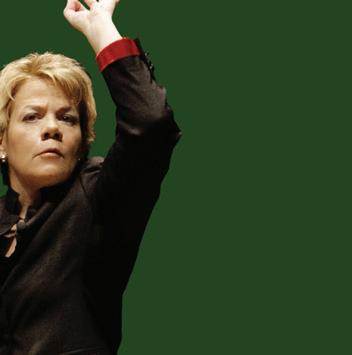
















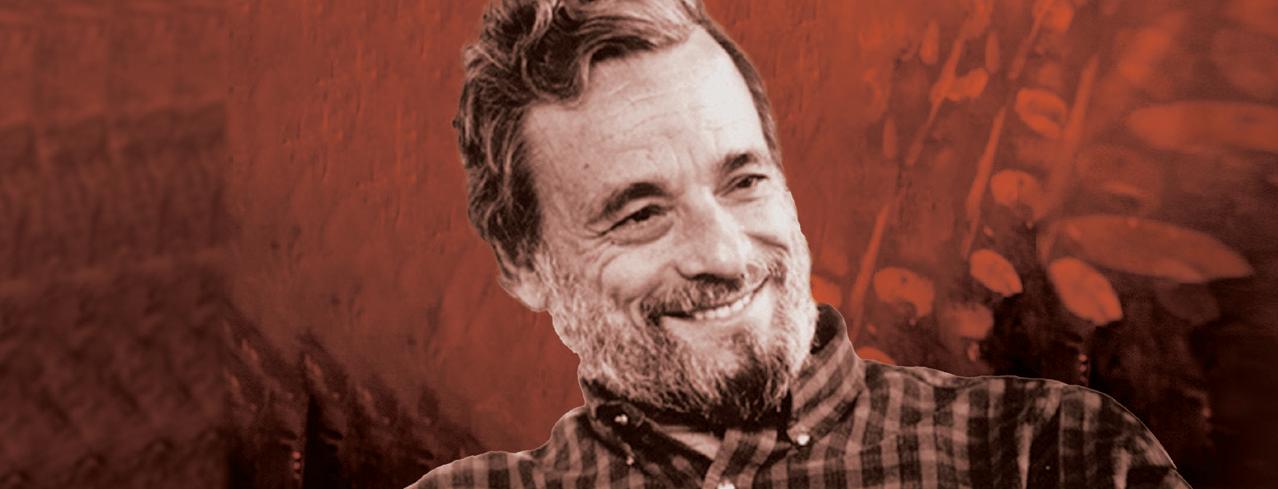
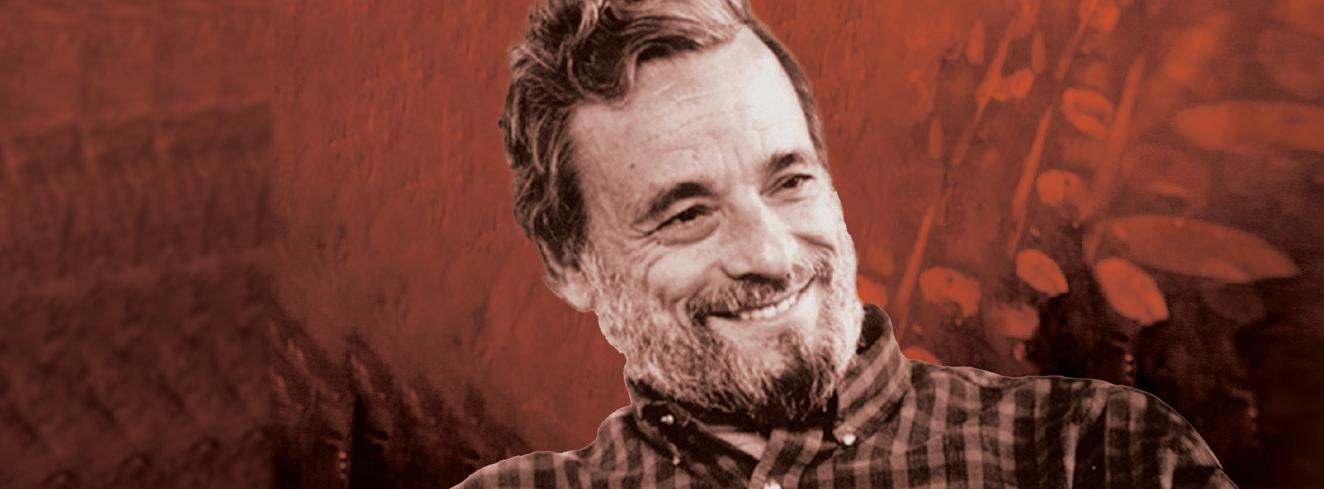

















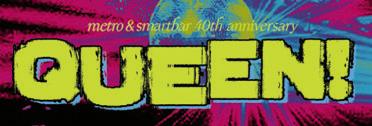

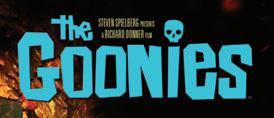


JUNE 9, 2022 - CHICAGO READER 35 100+ EVENTS JUNE 15–SEPTEMBER 18 TICKETS ON SALE NOW AT RAVINIA.ORG INTRODUCING breakingbarriers.ravinia.org Dinah Jacobs Castle; The Lion King Consortium; The Ravinia Women’s Board; In Honor of Sandra K. Crown | FRI IN CONCERT LIVE TO FILM JUN 29 | WED JUN 26 | SUN JUL 1 | FRI JUL 6 | WED AUG 7 | SUN AUG 19 | FRI CHICAGO PHILHARMONIC PLAYS THE SCORE WHILE THE COMPLETE FILM IS SHOWN COMPLETE FILM SHOWN ON PAVILION AND LAWN VIDEO SCREENS © 2022 WBEI Trombone Shorty’s Voodoo Threauxdown Yours, Stephen Sondheim SEP 2 | FRI SEP 4 | SUN SEP 8 | THU SEP 10 | SAT SEP 16 | FRI SEP 17 | SAT HUBBARD STREET DANCE CHICAGO Diana Ross Emmylou Harris Mary Chapin Carpenter Alan Menken’s Broadway Once Upon a Time Celebrating his letters, mentorship, and music
THE PRIDE ISSUE
they could come up and touch my boobs without asking permission,” Luv Ami says.
Many bars and nightclubs also underpay their performers, says Chicago-born Filipino American drag king Mac K. Roni. For a two-number show, he says he gets paid between $100-$175, excluding tips, which aren’t always guaranteed.
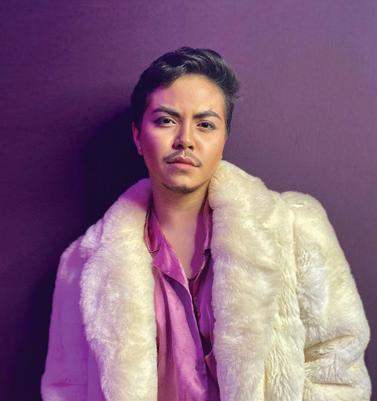
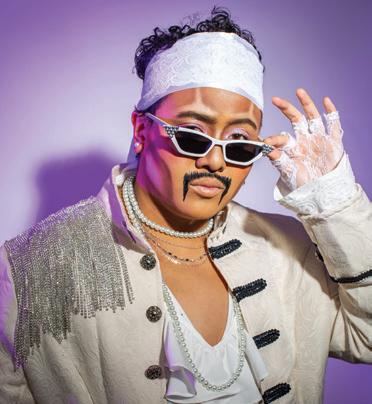
PERFORMANCE POLITICS
Asian drag performers slay the way forward
Now they’re seeking inclusion and support.
By BOUTAYNA CHOKRANE
Despite its experimental environment, Chicago’s drag world entered the pandemic with a lack of labor protections. COVID-19 exacerbated economic hardships, especially for queer performers of color who have dealt with the discriminatory practices of club culture. With Asian drag performers often left out of conversations about representation, forming a labor union may improve the city’s drag scene.
“I feel like Asian Americans aren’t really desired,” says Markiki Jones, a rising Filipino American queen from Skokie.
To establish a stable career in the city, Jones says she’s trying to book as many shows as she can. But she says she feels Asian performers “don’t fit the beauty standard within the gay community.”
Some performers are pointing to the lack of Asian American queer spaces. “I need people to blatantly know what they’re not doing,” says Laotian American queen Lo•ti•on (LOH ty-awn).
Lo•ti•on was born in Wisconsin, lived in Humboldt Park for seven years, and moved to Austin, Texas, two weeks ago. She started performing nearly ten years ago. But she says she still struggles to book consistent shows because “there’s no union.” She questions
whether show producers are only booking their friends, rather than providing more opportunities for diverse faces.
Since the Asian drag community is growing, Lo•ti•on says, “I need something for us to network more and get to know each other and support each other.”
Abhijeet is a Chicago-based queen from Mumbai who hosts Dim Sum & Drag brunches at Uptown’s Furama Restaurant to elevate Asian performers. She started this monthly event after noticing a need to celebrate Asian diversity in the drag world.
Many issues manifest in microaggressions, Abhijeet says. Drag show hosts “would often be like, ‘You should rethink your song choices,’ if you’re performing music in a di erent language.”
Abhijeet sees merit in a union because “it’s much easier to advocate for workplace mistreatment or inequality if you are represented by a group.” But with drag shows expanding to hotels and restaurants, she says conversations about workers’ rights should be had with the venues. “How does having a drag union translate to places that aren’t even familiar with drag?” Abhijeet says.
Issues like pay inequity and marginalization impact all queens and kings of color. Because
of the gig-to-gig work style, performers are left without health insurance or paid sick leave.
“What do you do when you hurt your foot and then you can’t perform? There goes your income, but then you also can’t go to the doctor,” says Luv Ami, a drag king from Lakeview who is Black and Vietnamese American.
According to a 2020 report by the Economic Policy Institute, 94 percent of union workers have access to job-related health coverage; only 68 percent of nonunion workers have access to similar health care benefits. Considering union contracts also prevent employers from dismissing workers for reasons unrelated to performance, they can help reduce racial disparities.
Union workers also earn $191 more per week than nonunion workers, according to the American Federation of Labor.
Some performers have noticed di erences in tips. “Drag queens get tipped a lot more than kings,” Luv Ami says.
When performing at clubs, “a lot of people don’t know etiquette when it comes to being at a drag show, especially when it comes to consent and touching,” Luv Ami says. Before getting top surgery, they sometimes performed in a bra and a pair of pants. “People just felt like
“If you’re doing full-time drag, you should absolutely be able to access health insurance, you should have all these benefits,” Mac K. Roni says. “You should be able to have regular bookings instead of fighting for a spot.”
But despite unstable wages, Mac K. Roni says he is noticing a positive progression towards diverse representation. He attributes the increase in opportunities for performers of color to the departure of T Rex, a former drag host who was dropped by Berlin Nightclub and Roscoe’s Tavern in 2020 after several Black performers accused her of discriminatory abuse, pay inequity, and unfair hiring, as reported by the Reader.
Her dismissal was prompted by a virtual town hall meeting organized by the Chicago Black Drag Council (CBDC), where performers recounted experiences that revealed a lingering, anti-Blackness culture in Northhalsted’s drag scene.
CBDC is a Black, LGBTQ+ community organization “motivated by fostering a sense of togetherness, as well as identifying and completing actionable steps towards restorative justice,” according to their mission statement.

Though CBDC supports all community members, its focus is on Black performers.
Asian performers don’t have a drag council geared toward their specific needs.

The Black Drag Council is on hiatus while they determine what the drag scene now looks like after bars and nightclubs reopened last summer, says Luv Ami, who is a cofounder of CBDC.
Luv Ami says the council has talked about a possible labor union, but “it is a lot of work to do, especially a lot of unpaid labor.” v
36 CHICAGO READER - JUNE 9, 2022 ll
@Boutaynaaa
From le : Luv Ami, Mac K. Roni, Abhijeet SECRET QUEEN/COURTESY THE ARTIST/GRACIE MEIER
THE PRIDE ISSUE

‘Huge, very loud, and with a lot of glitter’
Fly Honeys return live.
By IRENE HSAIO
For the first time since a pandemic hiatus, The Fly Honey Show is live for three days only (June 23-25) of sparkle, sweat, and shimmy. Begun in 2010 with about 30 performers in the living room of the DIY venue The Inconvenience, The Fly Honey Show has since manifested through the bodies of hundreds of dancers, musicians, spoken word artists, and more, migrating from warehouse to nightclub to theater as the hunger for the Honeys and the collective buzz of the Hive has grown ever hotter. Now in its 12th year, the Fly Honeys appear for the first time at Thalia Hall, with music by Chicago artists Glitter Moneyyy, Maggie Kubley, Jana Rush, and Shannon Matesky.
“I fundamentally believe in the value of dance as a tool for physical liberation and healing and storytelling,” says founder and director Erin Kilmurray. “This is that idea exploded out to the universe—huge, very loud, and with a lot of glitter. Fly Honey is a project, where every time you come back to it, you as a person and artist can evolve and grow and re-identify inside of it. My relationship to my body, just like everyone’s, changes minute by minute and day by day. Every time I come back to this project I’m a year older. The ways in which I want to express and be seen have evolved. And in the best way possible, the people who watch and the people inside tell us what it is every year. Over the years, people inside the project started taking ownership over what they loved. It has created its own culture.”
“I’ll never forget my first show,” says multimedia performance artist Kubley, who has sung every year since its inception and serves as vocal director this year. “I was su-
percharged by this burlesque atmosphere that had this punk flare to it. These kids lived in a communal living situation in a loft. The show was a bunch of girls taking their tops o . It was like, ‘You want to sexualize me? Fuck you, I’m going to sexualize myself. You can’t stop me.’

I was hooked. I have stayed with the show because, as feminism changes, as people become smarter and more responsible and double down on inclusion, equality, and diversity, it not only teaches me but energizes me to become a better person and light that fire in me that I want when I make art. It’s hot, sweaty, sexy fun but it’s so much more than that.”
“The mission was always about body positivity and women’s empowerment,” says Matesky, poet and founding Fly Honey artist. “It empowers all bods, no matter what your bod, using movement as a catalyst for change in your own life. The first year we had negative responses about us being scantily clad. We are reminding people, I don’t lose value because of what I wear. It’s been beautiful to see how much the community responds to the show—not just audience but participants. We sometimes think maybe we’re getting too old for this; maybe we should slow down or stop. But there’s a need for the fellowship that the Hive brings and the opportunity to harness our liberation.”
“Every time a person is allowed to express themselves fully is resistance work,” says comedian Melissa DuPrey, who is cohosting the show this year. “It is combatting all the ways the patriarchy and porn, which is so male-centered, has oppressed our thinking of what pleasure is. I consider myself a pleasure activist.”
“One of our favorite memories was hearing
the band play a mashup of our songs ‘Hoe’ and ‘Clit’ and having all the Fly Honeys screaming ‘CLIT CLIT CLIT CLIT’ back at us while we twerked,” says hip-hop duo Glitter Moneyyy. “Fly Honey has inspired us since day one to let it all hang out.”
“Forms of self-expression are acts of defiance against a world that wants us all to conform, homogenize, assimilate,” says drag artist Irregular Girl, a Fly Honey performer since 2017. “Dance, and in particular, dancing in your own light, celebrating your own spirit, is a gift that performance and nightlife give us. There is freedom in it. As a trans girl, it’s impossible for me to feel safe and secure in myself 100 percent of the time. The world has
THE FLY HONEY SHOW
Thu-Sat 6/23 -6/25, doors 8: 30 PM, show 9: 30 PM (midnight toast and afterparty); Thalia Hall, 1807 S. Allport, theflyhoneyshow.com, $ 40 -$175
shown me that it’s a scary place for a lot of us. But I know that when I am performing, when I’m dancing, I am at peace.”
“I’ve been in Fly Honey since I was 22,” says singer/songwriter and longtime performer Quinn Tsan, who is coproducing the show this year. “It shaped my entrance into adulthood. I came out of an abusive relationship a little bit after I started the show. It made me feel more interested in the issues the show champions and interested in championing those issues with a larger organism of people and material and art-making. It was really fucking fun, and it pushed us to be more active and louder in the political and cultural space.”
“Seeing, and now performing with, so many
beautiful and talented artists of all colors, genders, shapes, and sizes, really makes me feel seen and right at home,” says first-time Fly Honey performer Diamond Gant. “Dance is a big part of my life and as a Black, plus-size, female artist, this world and industry can definitely be narrow in how talent and beauty is seen in someone who looks like me. Despite the challenges that come, I’ve always pushed forward because I know that dancing and performing is one thing I was put on this earth to do, and the impact that I want to make through it is much bigger than myself. Joining the Fly Honeys on the stage feels like a moment to celebrate all of us being unapologetically ourselves and doing what we love despite how this world may feel about us!”
“I had no idea that this enigma of an experience had been happening for years. Then having my mind blown witnessing the Fly Honeys for the first time. I remember thinking about how badly I want to be a part of this community, not just a spectator,” says associate producer Vic Wynter, who has performed with the ensemble. (Wynter is also directing About Face Youth Theatre’s Gayme Changers; see story on page 33.) “There has been an open invitation to assist in how the show is getting shaped, shared, and structured, and I’ve appreciated the space I’ve been given to speak and be heard. I have felt genuinely valued from the moment I saw my first show, to being on stage, and now working behind the scenes.”
“The project at the end of the day is, we want to feel fly,” says Kilmurray. “We want to, and we want the people who are watching to see us that way, and we want the people watching to feel that way themselves. It’s hard to be in your body and feel good about it. When do you not want to feel that way? There’s a need to be in some kind of fellowship around feeling yourself—there’s pretty much never enough of that. People are continuing to do the project, people are experiencing their bodies change, people voluntarily change, people go through transitions in their bodies. To come back into this space and be seen as an updated version of yourself is pretty amazing.” v
JUNE 9, 2022 - CHICAGO READER 37
@IreneCHsiao
The Fly Honeys in performance ERIC STROM/ GLITTERGUTS
PERFORMANCE
THE PRIDE ISSUE
I would come up with this funny logic as to why things I was doing weren’t gay and blah blah blah. But after a while, I realized that it was negatively affecting me. I became so committed to the bit that it sort of fucked with my mind, like I couldn’t actually express being attracted to other men anymore. It’s so ironic. Like, how come I can be visibly trans and medically transitioning and in this totally queer world where everyone I know is gay and trans, and yet I still have this weird hang-up about, like, being gay? That’s so funny and weird. So I wanted to write about that.
SHORT FILM
Bros Before is stupid and horny— and wonderfully queer
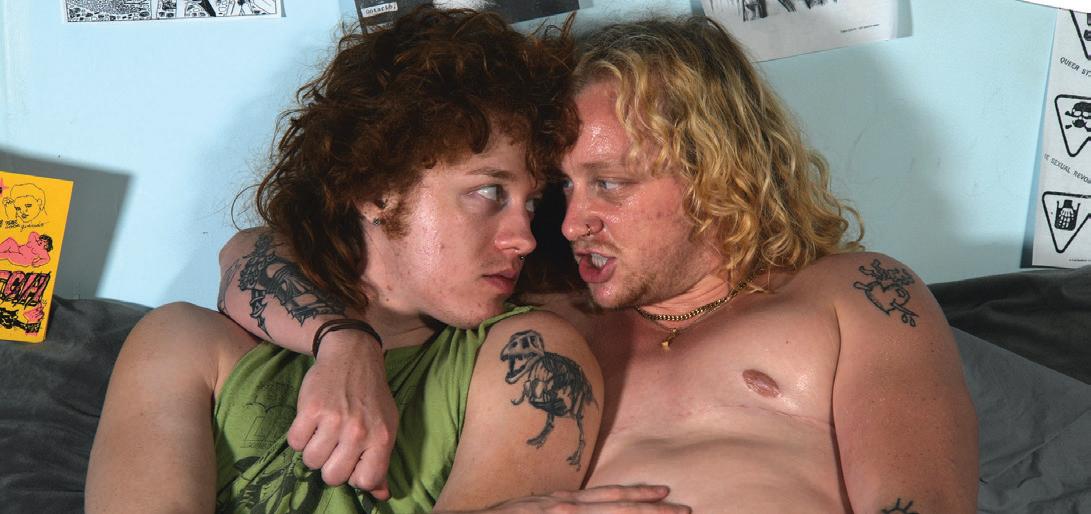 By MICCO CAPORALE
By MICCO CAPORALE
It’s only gay if the swords touch—and Henry Hanson’s short film Bros Before is a whole arsenal of blades. In it, Billy (Radcliffe Adler) and Elijah (Marten Katze) are two trans men who happen to enjoy jerking off together— but, like, no homo. When Billy begins dating Grace (Meadow Meyer), Elijah finds himself wrestling with what their secret ritual means. The title plays off the idea of “bros before hoes,” adding a subtle wink to the time-honored queer tradition of “experimenting” with a same-gender friend only to learn one person is experiencing their desires in a way the other isn’t—or rather, isn’t going to acknowledge after orgasm. Over the course of 19 jam-packed minutes, Hanson plays with the storytelling
conventions of rom-coms, reality dating shows, and pornography to tell a comedically rock ’n’ roll story about unrequited love and some of queer culture’s unspoken taboos.
Hanson came to Chicago five years ago. His childhood was divided between New York and LA, but upon graduating with a cinema studies degree from Oberlin in 2017, he felt called to the Windy City after several friends moved here for the queer community and relative lower cost of living. At 27, this is his debut as a writer and director. Bros Before has been making the festival rounds at places such as Wicked Queer in Boston, Translations in Seattle, and Inside Out in Toronto. Next month, the film will make its o cial hometown debut at Facets as part of a partnership with Full
Spectrum Features that will include a curated selection of similar shorts.
Micco Caporale: Tell me a little bit about the germination of the Bros Before story.
Henry Hanson: I really wanted to make something that was inspired by Gregg Araki. For years, I had all these di erent visuals just waiting for the right story, like displaying prominent text that gives more meaning to the scene or bright colors. The story itself actually came out of a very personal experience where my friends and I had this inside joke that went on for years where they would say that I was gay. I would deny it in these really funny ways that showed that I was obviously gay—like
I’ve also always loved dumb rom-coms and boy humor that’s, like, so stupid. I think a bromance is such a funny concept, and I don’t think queer stories fit into straight narrative structures. There’s something about the actual narrative structure of rom-coms that I think is built for a certain type of relationship, so that was part of my motivation: expanding the idea of what a happy ending could be, o ering a structure that could be a little bit di erent. I would love there to be more content that’s made for queer and especially trans people.
Why is it important that Billy and Elijah are both trans?
I’ve seen a lot of movies in recent years made by trans people or about trans issues that feel like they are edutainment for straight people—like begging them to care about us. Not only do I think that’s ine ective propaganda, it’s bad art. Like, what are you even doing? I don’t know, I just wanted to make something that I would want to watch and assumes a trans audience. I think there’s a universality in specificity, but that makes people uncomfortable. I think it’s part of why Americans don’t watch foreign films. They assume they can’t relate, but once you actually watch one, you realize you don’t need to know every single piece of cultural information to think about the story. You can actually learn more about this culture just by being thrown in and gradually having stu explained to you. I haven’t gotten any play in any venues that weren’t explicitly for queer people, though, and I guess I hope that [Bros Before is] not seen as something that can only appeal to queer people.

38 CHICAGO READER - JUNE 9, 2022 ll
Marten Katze as Elijah and Radcliffe Adler as Billy in Bros Before HENRY HANSON
“I just wanted to make something that I would want to watch and assumes a trans audience.”
Where did you find your actors?
I put my casting call on typical casting call sites like Backstage Post, but there were basically no trans people. I had to use Lex, Instagram, and Twitter—just working my personal networks. I didn’t care if people had previous experience. I just wanted people who were like the characters, and I think that approach worked.

Why do you think it took you so long to write and direct your first film project?

I was holding myself back for a lot of reasons. Obviously, I wouldn’t have been able to make this movie before my transition because it’s so much about being trans. But I also produce a lot of other people’s work. I felt like I was being selfish pursuing my own project. I couldn’t admit to myself what I really wanted to do because I was embarrassed by my taste or what I had to say or that I wanted to make stu that was stupid and horny. I went through a certain amount of transitioning before I was able to be OK with all that stu about myself.
I love how specific Elijah’s room got, from the chaotic sharps container to the artwork. It felt so much like it could be any number of my friends’ rooms. Tell me a bit about the production design.
Well, I definitely have to give major props to my production designer, Jade Wong. The Chicago artists we used were Jade’s ideas, like Chloë Perkis and Money Kaos. I think those two’s work totally encapsulates the aesthetics of the film. And there are a few other pieces in there. Martin, who plays Elijah, is primarily a visual artist. So we put one of his prints in there, as well as a few other of my trans friends’. And then there were a lot of printouts from J.D.s, which is an 80s zine from Toronto by G.B. Jones and Bruce LaBruce, who is one of my favorite filmmakers. J.D.s helped start the queercore movement, which is another big inspiration to me.
Then we had a few other posters that were trying to show that Elijah had evolved from a very specific sort of lesbian culture. That was also Martin’s idea: using specific bands, like, “Oh, Elijah would have a Team Dresch poster.”

I think I was trying to give a bit of context as to why he might be struggling with being gay. In the past, his lesbian identity was, like, really important to him. And a lot of times, lesbians
can feel like it’s a point of pride to not be with men.
Yeah, I think so much of lesbian identity gets defined in opposition to maleness or masculinity in a way that can be hard to come to terms with later.
Totally. I think a lot of trans men coming out of, like, queer feminist spaces feel very conflicted about becoming “the bad gender.”
And to not only be attracted to the bad gender. It’s like you love the bad gender so much, you want to be it while fucking it.
Exactly. Just double whammy.
Like, “You must really hate women.”
Exactly. And I think that what I wanted to explore in the story was like . . . even though I’m sympathetic to that perspective, I think it’s a bit silly and reductive, and I think it can lead to this sort of weird neutering of trans men and masculinity. Like, “Oh, we’re not men like those men. We’re di erent!” Or better, or whatever. I kind of wanted to make something where trans guys were those men: disgusting and horny and idiotic and obsessed with their dicks. And I wanted to say, like, that’s also fine. They’re still sympathetic and human. They’re not monsters.
I must admit—and maybe this is my revealing my own biases—the promo of the movie made me think there would be a lot more sex. I was kind of pleasantly surprised there wasn’t. The sex that was there was really sexy, but I also liked how coy it was. Tell me about that balance.
I asked myself, “What do I want to see that would excite me and be sexy but also use sex as part of the story to express something?” John Cameron Mitchell talks about this with Shortbus . For so long, because of the Hays Code [a set of industry guidelines imposed between 1934 and 1968 that aggressively regulated swearing, nudity, and depictions of sexual expression or violence], sex could only be shown through visual metaphor. And now that we can actually show sex, what if we use it to say something else?
On a similar note, I definitely want to shout out my intimacy choreographer, Kayla Menz. Intimacy coordination is more than a safety practice; it’s an art form. Kayla helped stylize
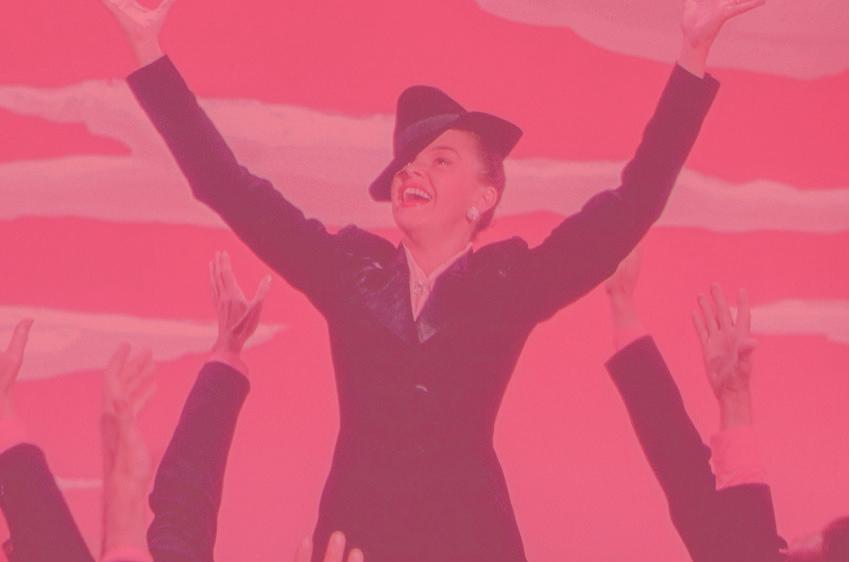
JUNE 9, 2022 - CHICAGO READER 39
JUDY Summer Centennial Retrospective ASTARISBORN•THECLOCK•EASTERPARADE•INTHE GOODOLDSUMMERTIME•JUDGEMENTATNUREMBERG •THEPIRATE•SUMMERSTOCK•THEWIZARDOFOZ June1July30 SISKELFILMCENTER.ORG/JUDY 164NStateStreet Chicago,IL60601 Moston35mm! THE PRIDE ISSUE and choreograph the sex scenes, but she also found moments where intimacy could be added to the script, like a fake-out kiss on Billy and Grace’s first date. She coached all three actors on subtle things that never would have occurred to me and really helped the movie work while keeping everyone comfortable. v
@JuggaloReporter
By TARYN ALLEN
Based on a book called Magisterlekarna by Kristofer Folkhammar, The Schoolmaster Games takes inspiration from high school dramas and gay porn. St. Sebastian Academy is an all-male “queer utopia” school where homosexuality is the norm. As a group of friends prepares for a (never-fully-explained) prestigious holiday singing procession, jealousy and romance cause strife
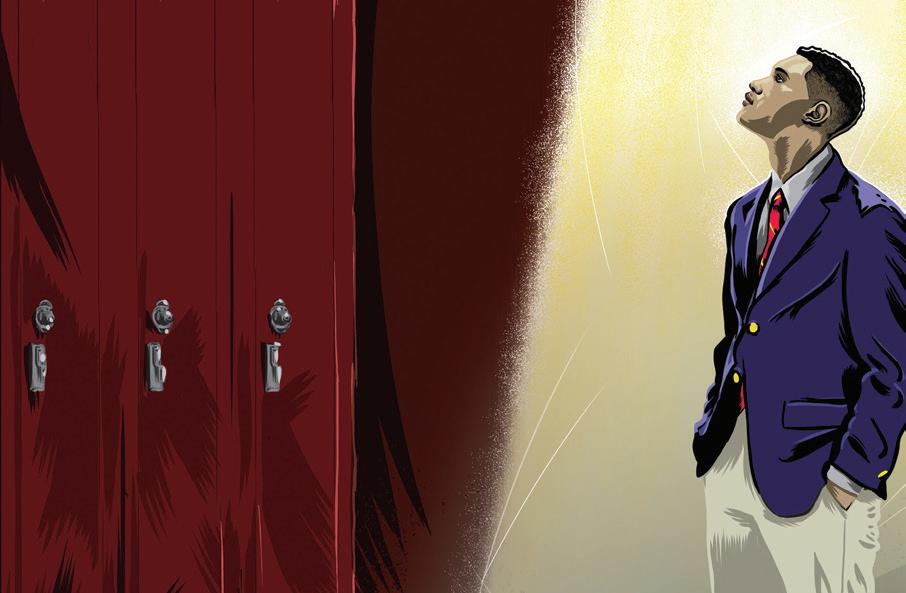
among them, all under the watchful eye of the pathetically horny schoolmaster (Johan Ehn). Although he’s engaged in an a air with a young swimmer named Charles (Christian Arnold), the schoolmaster can’t stop fantasizing about all of his students, and all the while he’s haunted by the homophobia and violence of his past.
Maybe my expectations were too high coming into this film; the last time I reviewed a gay Swedish movie, I unknowingly stepped into Levan Akin’s And Then We Danced (2019), one of the most beautiful films I’ve ever seen. But Ylva Forner’s new drama does not compare, outside of language and genre. An hour into this slow-moving 82-minute film, I was over the confusing relationship dynamics and watching the schoolmaster jerk o under his desk. A mix of flashbacks, dreamy visions, and even one random fourth-wall break cause the film to feel disjointed, with many questions left unanswered. Characters are mostly surface-level—relying on prop cues like a football or headphones to elicit personality—but they’re played well, notably the four main students: the young Ryan Gosling look-alike
Johan Charles as Paul, Nino Forss as Noak, Joel Valois as Fred, and Simon Kling as Tim.
Just as I was questioning if the movie had much of a purpose, it was directly handed to me through dialogue. Frank (Jani Blom), a teacher at St. Sebastian, professes his love for the schoolmaster, begging him to stop lusting after the young students and be with someone his own age who understands him.
“Do you really believe you will be free like them?” Frank asks the schoolmaster, rec-


ognizing with both jealousy and resentment the experimentation and freedom of the young gay men at their school. “They just shrug at everything we struggled for. We thought we were building a sanctuary . . . but we’ve created a hell.”
It’s a slightly heavy-handed “aha” moment, but it highlights the intergenerational aspects of the story, possibly allowing the film to contribute to a very real conversation in the queer community about entitlement, history, and freedom.
Despite this message, grounding moments of music and queer love, and a genuinely surprising climax, The Schoolmaster Games feels scattered and unfinished, like a waste of potential. If you’re looking for something to watch this Pride Month, there are better queer movies—and probably better gay porn—than can be found here. v

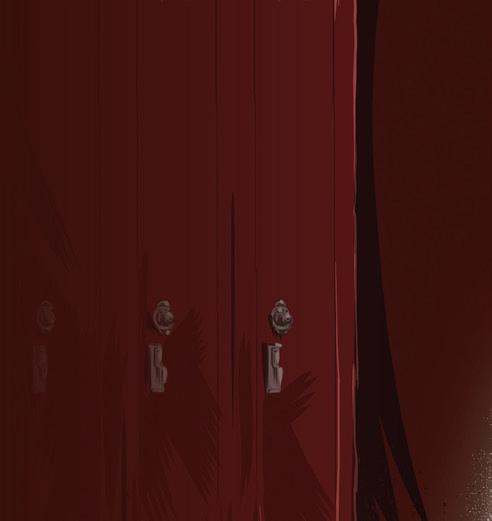 @itstarynallen
By ensemble member Tarell Alvin McCraney Directed by Kent Gash
@itstarynallen
By ensemble member Tarell Alvin McCraney Directed by Kent Gash
40 CHICAGO READER - JUNE 9, 2022 ll
LEVELK
Johan Ehn as the schoolmaster lost in a fantasy about his students
REVIEW The Schoolmaster Games feels like wasted potential There are better LGBTQ+ films to enjoy this month.
2021/22 GRAND BENEFACTORS 2021/22 BENEFACTORS GRAND PRODUCTION SPONSORS CHOIR BOY JUNE 16 - JULY 24
THE PRIDE ISSUE
Threaded throughout with soul-stirring a cappella gospel hymns, Choir Boy is the story of a young gay Black man and his battle between identity and community. Tickets, show and discount info at steppenwolf.org | 312-335-1650 “For playwright Tarell Alvin McCraney, art isn’t just for amusement, escapism, or cultural critique. It’s necessary” - Entertainment Weekly
NOMINATED FOR BEST PLAY
TONY
THE SCHOOLMASTER GAMES s Stream via PrideArts Summer Film Fest
NOW PLAYING
R Donbass
Set around 2014 in unnamed or lightly fictionalized locales in eastern Ukraine, Sergei Loznitsa’s 2018 knives-out satire serves as a grim foretelling of Russia’s current tragic misadventure in the region. Presented as a series of vignettes, we witness how all strata of society are impacted by the sudden incursion of Ukraine’s domineering neighbor onto its land. An early sequence of a local governmental meeting devolving into chaos as the chairman is drenched by a bucket of feces from the hands of a disgruntled citizen would feel absurd if it didn’t recall so many comparable scenes from the era a er the fall of the Soviet Union. Nascent democracies taking their first steps and falling on their faces. But unlike that time, there’s little but cynical opportunism in the air. In another memorable scene, a citizen shows up to claim his stolen vehicle only to learn that the new government has chosen to “expropriate” it for the cause. The man is also strongly encouraged to contribute monetarily to their cause. As his situation sinks in, the man doffs his cap and sighs. His powerlessness is like ours as we watch the news.
Known best for masterfully edited documentaries that o en use archival footage to present events from the past in a visceral, immediate way, Loznitsa blurs the lines between fact, fiction, propaganda, documentary, and drama in unsettling ways. I had to do a little research to make sure the Dixie-like flag of the People’s Republic of Novorossiya was made up. In a time when the most banal information is up for debate, this fake documentary reads as much too real. In English, Russian, and Ukrainian with subtitles. —DMITRY SAMAROV 122 min.
Streaming through Gene Siskel Film Center
R Hustle
Had anyone asked me back in Adam Sandler’s SNL days whether he could score as a viable dramatic
lead, I would have snort-laughed my Sunny D back up right through my nose. A er seeing Hustle, I do believe I may have misjudged Sandler’s ability to project anything requiring more emotional he than, say, The Waterboy
The first time Sandler appears in director Jeremiah Zagar’s basketball-centric redemption drama, he looks plum wore out. As we watch him hauling suitcases through a montage of airports and countries, he’s exhausted, disheveled, and moves with the unmistakable bearing and countenance of a middle-aged dude starting to seriously question what he’s doing with his life. So goes the life of Sandler’s Stanley Sugarman, a onetime NCAA basketball player who was taken out by a grisly injury and has been drudging for decades as a scout for the Philadelphia 76ers.
As we follow the deeply empathetic and underdog-heroic Sugarman, Hustle spins a familiar plot (see also Rocky, Seabiscuit, Hoosiers, Moneyball, Bruised, ad infinitum) into a story that’ll keep you invested even if you don’t know a hoop dream from an embroidery hoop.
Moreover, Hustle becomes a pulse-racing thriller every time the action moves to a basketball court or the streets of Philadelphia, which becomes the training ground for Sugarman’s troubled protege, Bo Cruz (Juancho Hernangómez, who plays for the Utah Jazz). It’s not hyperbole to say Hustle could do for Philadelphia’s Manayunk Hill what Rocky did for those 72 stone steps leading to the Philadelphia Art Museum.
The tension of the scrimmages comes in part from the host of professional players featured throughout and in part from Dan Deacon’s percussive, propulsive, masterful soundtrack, which somehow manages to insistently ratchet up the stakes with every beat without once pulling focus from the gameplay.
Add in Queen Latifah making the most of an underwritten supportive wife role and Robert Duvall as the 76ers owner and you’ve got, yes, a winning movie.
—CATEY SULLIVAN R, 117 min. Limited release in theaters and streaming on Netflix
R Ms. Marvel
The MCU puts a Muslim American superhero onstage in the brand-new Ms. Marvel. Pakistani Canadian actor Iman Vellani debuts as a wonderful Kamala Khan, a bubbly, rebellious girl lost in daydreams of saving the world like her fave, Captain Marvel. A er quite a bit of backstory, hijinks eventually ensue, which lead Kamala to discover her own cosmic powers (both inside and out, naturally). Matt Lintz plays Bruno Cavelli, Kamala’s sidekick, and together they form an enjoyable pair of pluck and gumption.

Marvel does a great job of spotlighting facets of American culture that o en go underrepresented (including a nice nod to Moon Knight’s Jewish heritage) and Ms. Marvel’s spotlight of Islam is incredibly well done. It felt refreshing and frankly groundbreaking to see a scene of prayer that wasn’t coupled with terrorism, and Muslim parents who weren’t stereotypes of oppression. And as a person who grew up in a family of Black Muslim converts, I was genuinely shocked to see that identity appear onscreen, portrayed by Travina Springer.
The Marvel framework of a six-episode miniseries means that every story gets the same amount of runtime—whether it needs it or not. The first two episodes drag a bit, and one wonders if the story would have been better served by a 30-minute episode instead. However, the story is fun overall, emphasized by beautifully rendered animation and phone text conversations artistically structured into the scenery in a manner that makes you wonder what’s coming next, and whets the appetite for the next Spiderverse flick. —SHERI FLANDERS Six-episode miniseries. Stream new episodes weekly on Disney+
RThe Phantom of the Open
Maurice Flitcro (Mark Rylance) is no ace—he’s an over-the-hill shipyard worker who has failed to make good on his promises to his wife Jean (Sally Hawkins) of champagne, caviar, and diamonds. In a fugue and disenchanted with life, Flitcro is flipping through television channels when he stumbles upon a golf tournament and discovers a passion and fascination that sets him on a momentous—and highly absurd—journey to make a name for himself. And he does, when, by sheer determination, the middle-aged father snags a spot in the British Open Championship and plays a record-breaking game . . . golfing the worst score in the tournament’s history.
Director Craig Roberts (yes, the lead from the indie-classic, coming-of-age film Submarine) composes a playful retelling of one of the most ludicrous stories in sports history. The Phantom of the Open chronicles the unbelievable resolve of a man trying to prove that you can achieve anything. Roberts’s lighthearted film is a surreal comedy that pokes fun at one of the most serious sporting traditions and underscores the hypocrisy
of golfing elitism. Shamed by the golf world and banned by many major clubs in the UK, Flitcro refuses to concede. Rylance delivers an inspiring performance that makes shiny and new one of the most beloved cinematic tropes—that of the ultimate underdog.
The Phantom of the Open is a biopic of a refreshingly under-told story of an amateur player that let nothing stop him from etching his name into golf history. Despite overwhelming failure and lifetime bans, Flitcro reenters the tournament multiple times with pseudonyms and disguises, gate-crashing the highest echelons of the golf world regardless of its numerous attempts to permanently oust him. Roberts’s The Phantom of the Open is a sincere yet deeply amusing and outrageously comical story of an unanticipated role model. —MAXWELL RABB PG-13, 106 min. Limited release in theaters
R Top Gun: Maverick
Top Gun: Maverick is the supersonic joyride that every action franchise aspires to produce, but most cannot stick the landing. Returning to the screen as if Top Gun premiered this decade and not 1986, Tom Cruise is back to remind us that he is America’s everlasting beacon of youth. Despite some (justified) reservations about a Top Gun reboot, this movie is undeniably thrilling, flying high above its predecessor. Director Joseph Kosinski achieved the impossible by cra ing an action movie sequel with a gripping story that reminisces without feeling contrived.
Nearly 40 years later, Cruise returns to reprise his role as Pete “Maverick” Mitchell—an impulsive, speed-loving fighter pilot with a knack for disobeying orders. The movie opens with Cruise telling an admiral to shove it, flying his experimental jet over its Mach 10 speed limit and falling to Earth in a fiery plane crash. Of course, Maverick survives and limps into a diner to have a glass of water. The opening sequence sets the tone for the rest of the movie. Top Gun: Maverick is fast, pushing things to a breaking point and giving the sense that Cruise might not be indestructible.
Top Gun: Maverick is also shockingly tender, filled with warmhearted and tense moments between Maverick and his old partner “Goose’s” orphaned son “Rooster” (Miles Teller). Even though this movie falls a little too far into military propaganda, Kosinski manages to carefully cra a relatable story about overcoming grief. You will be lucky to leave without getting teary-eyed, especially during a remarkably touching dialogue between Val Kilmer’s “Iceman” and Cruise’s “Maverick” that feels like an authentic behind-the-scenes peek.
How can the sequel so clearly outfly its predecessor? Somehow Cruise’s foray back into the danger zone will be remembered more than the original, setting a new standard in the era of reboots. —MAXWELL RABB PG-13, 130 min. Wide release in theaters v
JUNE 9, 2022 - CHICAGO READER 41 FILM
new film reviews every week at chicagoreader.com/movies
Ms. Marvel MARVEL STUDIOS
Find
OPENING
Ghost bride
Blithe Spirit gets a workmanlike revival.
Noel Coward’s 1941 comedy about a socialite writer who finds himself haunted by his vivacious (if annoying) dead wife—while his living wife first questions his sanity, then finds herself in competition with the ghost—has inspired a host of revivals and homages. Consider Robyn Hitchcock’s 1985 song “My Wife and My Dead Wife,” and the criminally hard-to-find 1990 film Truly, Madly, Deeply, starring Alan Rickman and Juliet Stevenson as a dead cellist and his grieving partner.
Eclectic Full Contact’s revival of Blithe Spirit at the Skokie Theatre, directed by Michael Woods, is amusing enough, but it shies away from exploring the underlying acid in Coward’s premise: Is marriage itself a kind of living death? It’s not entirely the production’s fault. Coward himself said of his comedy, “There’s no heart in the play. If there was a heart, it would be a sad story.” So in place of heart, we get hijinks, and these are about two-thirds successful. Andrew Pond as haunted Charles Considine, Jessica Lauren Fisher as mischievous dead Elvira, and Jan Slavin as Madame Arcati, the eccentric medium who brings Elvira back into Charles’s life, are all suitably larger than life. But Maiko Terazawa’s Ruth, the even-tempered wife thrown into a tizzy by her dead predecessor’s return, takes a while to find her way into the Cowardian rhythms. Only when she too (spoiler alert!) becomes spectral does Ruth feel like a worthy opponent to Elvira. —KERRY REID BLITHE SPIRIT
Through 6/26: Fri-Sat 7:30 PM, Sun 2 PM; Skokie Theatre, 7924 Lincoln, Skokie, eclectic-theatre.com, $38 ($34 students/seniors).
R Puppet revelations
Hand to God is close to perfect.
Puppets are cool, but they are also creepy. Very creepy. Even the cute ones, like Kermit the Frog or Ollie the Dragon. There is just something deeply unnerving about how puppets seem like autonomous beings, even when their puppeteers are right there on stage with them. I think there is something deep and primal in us—something perhaps connected to the magical thinking of childhood—that wants us to believe the puppet is alive, and the puppeteer is just a servant to the puppet.
This creepy power is at the center of Robert Askins’s well-written Hand to God, about a mother and teenage son dealing—rather badly—with the recent death of the son’s father. The traumatized son is morbidly obsessed with the puppet he is creating for his church youth group (led by his mother). And his mother is clearly unhinged, at times too repressed and controlling, and at other times out of control and self-destructive.
I don’t want to go into more detail; I don’t want to spoil Askins’s tale. I will just say that, at a certain point, the son’s puppet starts voicing all the dark thoughts the son has been repressing, and then all hell breaks loose.
Directed by Trent Stork, the production is as close to perfect as you want live theater to be (part of the charm of live theater is its imperfection, in the hint of the chaos and possibility for disaster in real time that always hovers in the shadows). The story unfolds gracefully, building over the course of the evening, until the show’s dramatic ending.
It helps that the casting is terrific. August Forman is particularly strong as the troubled son. Likewise, Felicia Oduh does a star turn as Forman’s best friend. Jonathan Berg-Einhorn’s set design is inspired.
The show’s press materials compared the play to Avenue Q (which is funnier) and to Little Shop of Horrors (which has better music), but the comparison is misleading and unfair. This play is sui generis, a thing in itself: moving and powerful. And in the end, a revelation.
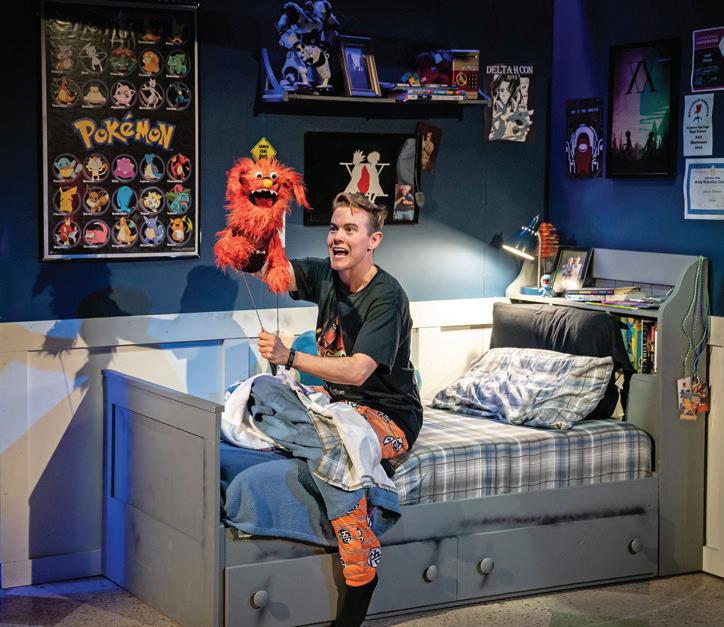
—JACK HELBIG HAND TO GOD Through 7/10: Wed 1:30 and 7 PM, Thu 7 PM, Fri 8 PM, Sat 2 and 8 PM, Sun 1 and 5:30 PM; Copley Theatre, 8 E. Galena, Aurora, 630-896-6666, paramountaurora.com, $67$74.
RHome is where the heart is Fleetwood-Jourdain offers a gorgeous revival of a contemporary classic.
Samm-Art Williams’s Home, first produced in 1979 with the seminal Negro Ensemble Company and then in a Tony-nominated run on Broadway in 1980, is considered a contemporary American classic, but it doesn’t get revived as much as it probably should. This feels especially self-evident when viewing Tim Rhoze’s stellar production for Fleetwood-Jourdain Theatre. Staged simply around a series of three platforms with some shadowy projections on the rear wall, Rhoze and his three-member cast unfold the beating heart of Williams’s story with precision and warmth.
Cephus Miles (Lewon Johnson), a young Black man in 1960s rural North Carolina, finds himself caught up in a series of upheavals (the death of his grandfather and uncle, the loss of the love of his life, imprisonment for defying his dra notice) that drive him north. “Get on the next thing smoking and move to the concrete,” he’s advised.
But what’s fascinating in Williams’s story is that it turns the Great Migration narrative inside out. There isn’t much warmth in the urban sun for Cephus, and his record as an ex-con (no matter how noble the reasons
for his resistance) haunts him. (Williams was once a sparring partner for famous conscientious objector Muhammad Ali.) Johnson does a beautiful job embodying the growing anguish of Cephus, as well as his joy and pride in being a good farmer, like his ancestors, and his sheer delight in sharing anecdotes about the folks back home. Rachel Blakes and Tuesdai B. Perry skillfully play a variety of other characters, and Rhoze’s adept staging brings a dreamlike choreopoem feel to several interludes. It’s absolutely absorbing, thought-provoking, and moving throughout. —KERRY REID HOME Through 6/19: Sat 7 PM, Sun 3 PM; Noyes Cultural Arts Center, 927 Noyes, Evanston, fjtheatre.com, $25.
R Sea legs
Music Theater Works offers a swimmingly good take on The Little Mermaid
Hans Christian Andersen’s fairy tale, “The Little Mermaid,” is a load of hooey. Consider: The titular mermaid throws herself on a dagger in the end, because she can’t bear to go on a er some dude she first encountered days earlier marries someone else. Also, she gives up her voice in exchange for legs so she can pursue the guy in the first place. So it goes in so-called “princess culture,” which pervades everything from Happy Meals to socks.
As for Disney’s The Little Mermaid, the House of Mouse was smart enough to know the original would not have legs as a splashy, feel-good musical. Instead, we get an inevitable happily-ever-a er from Alan Menken (music), Doug Wright (book), and Howard Ashman and Glenn Slater (lyrics). But in the charming Music Theater Works production co-directed by Stacey Flaster (who also shares choreography duties with Matthew Weidenbener) and Joshua Castille, that happy ending comes with a lightly conveyed but emphatic message children
and adults would do well to consider.
In the pastel, underwater wonderland (nice work by set designer Shane Cinal), the plot unfurls with more oceanic puns than a school of krill. But in addition to having a shamelessly stupid sense of humor, The Little Mermaid delves into the losses that incur when ignorance leads to vilification. The plot is simple: Princess Ariel (a luminous Joselle Reyes, who truly has the voice of a siren) falls for Prince Eric (Nathan Karnik, boasting a soaring tenor and raven locks as shiny and flowy as seagrass) a er rescuing him from a shipwreck. Ariel’s father King Triton (Thomas E. Squires, whose galvanic bass sounds rooted in the depths of the Mariana Trench) forbids fraternizing with the human enemies. Meanwhile, Triton’s sister Ursula the Sea Witch (Caroline Lyell, channeling Mae West via Mrs.-Lovett-meets-Mr.Limpet), spreads her witchery across the waters to comically dire effect.
The ensemble does swimmingly throughout, but watch especially for Meredith Aleigha Wells. She uses a wheelchair, and from that chair, brings Flaster’s choreography to life with grace, verve, and enough energy and spark to power eels. —CATEY SULLIVAN THE LITTLE MERMAID Through 6/26: Wed 1 PM, Thu 7:30 PM, Fri 8 PM, Sat 2 and 8 PM, Sun 2 and 6 PM (Sun 6/26, 2 PM only); North Shore Center for the Performing Arts, 9501 Skokie Blvd., Skokie, 847-673-6300, musictheaterworks.com, $39-$106.
Just skating by
A new roller-rink musical moves in shallow circles.
The year is 1994, and rock star Jacqueline Miller (Diana DeGarmo) is zigzagging the country on a tour. Her dishonest manager has absconded with her earnings, her deadbeat saxophonist boyfriend (Ace Young) is either cheating or has forgotten her birthday, and she’s going on Oprah tomorrow but just lost the cover of Rolling Stone to Beavis and Butt-Head. What’s a girl to do but reminisce about a roller rink and her equally disappointing adolescence? Skates, a new musical with book and lyrics by Christine Rea, music and lyrics by Rick Briskin, directed by Brenda Didier with choreography by Christopher Chase Carter, brings Jacqueline face-to-face with her 12-year-old self, Jackie (Emma Lord)—pigtails, red overalls, and all.
The year is 1977, and Jackie is firmly in the shadow of her thinner, blonder best friend Meghan (Kelly Felthous) as they navigate the complex social scene and hair-raising drama of the roller rink: Will Jackie get creamed by local bully Russ Reiner (also played by Young)? Will she get a date with “Scotty the hottie” (Adam Fane)? Will her brother Brad (Zach Sorrow) get with Russ’s girlfriend Tonya (Adia Bell), and is this advisable? And what’s better—blue slushies or red? Tootsie Rolls make a cameo, an aptly emblematic confection of cheap and contrived affection.
The cast is high-caliber but the content sitcom-ish and suburban. There are no real skates in this production—unfortunately no real stakes, either. —IRENE HSIAO SKATES Through 8/28: Tue 7:30 PM, Wed 1:30 and 7:30 PM, Fri 8 PM, Sat 2 and 8 PM, Sun 1:30 and 7:30 PM; Studebaker Theater, 410 S. Michigan, 312-7533210, skatesthemusical.com, $46-$105. v
42 CHICAGO READER - JUNE 9, 2022 ll
THEATER
Hand to God LIZ LAUREN


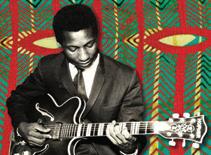

JUNE 9, 2022 - CHICAGO READER 43 6~21 TUE MUNICIPAL WASTE INTEGRITY, BEWITCHER 7~1 FRI TY SEGALL & FREEDOM BAND ~ BILL MACKAY 6~22 WED BONNY LIGHT HORSEMAN VV LIGHTBODY 7~2 SAT LETTERS LIVE! WITH PEPPERMINT 7~7 THU BOB MOULD BAND MELKBELLY 7~23 SAT STEPHEN MARLEY BABYLON BY BUS TOUR 7~21 THU FUCKED UP PERFORMING DAVID COMES TO LIFE ~ PONY 6~23 6~24 6~25 THE FLY HONEYS SPECIAL GUESTS EVERY NIGHT PRESHOW ~ TOAST ~ AFTERPARTY 8~1 MON EIVØR EMILY JANE WHITE 8~2 TUE BOY PABLO MAZIE 7~8 FRI DANIEL VILLARREAL, ANTELOPER, JEREMIAH CHIU & SOFIA HONER 8~4 THU 8~13 8~14 WAVVES KING OF THE BEACH TOUR ~ BOYO, SMUTT MURDER BY DEATH, AMIGO THE DEVIL TOUR FROM THE CRYPT ~ SAMANTHA CRAIN THU 8~11 ARTDONTSLEEP PRESENTS EBO TAYLOR TUE 7~5 CORINNE BAILEY RAE MALIA WED 8~3 CAT POWER ARSUN COMING SOON TO THALIA HALL SIGN UP FOR OUR WEEKLY NEWSLETTER AT THALIAHALLCHICAGO.COM
CHICAGO BLUES FESTIVAL
Bringing the blues back home
The Chicago Blues Festival’s free satellite concerts in Austin and Bronzeville hope to revitalize blues culture in the neighborhoods that nurtured it for so long.
 By DAVID WHITEIS
By DAVID WHITEIS
This year, the Chicago Blues Festival will again include shows on the west and south sides as well as in Millennium Park. The agendas of these neighborhood shows are more ambitious, though, than just getting a collection of locally rooted musicians onto the same stage. Both are presented in coordination with larger projects intended to spur economic and cultural revitalization of their communities.
Saturday’s Soul City Blues event (part of the Taste of Chicago preview Taste of Austin) is linked to the Soul City Corridor project. Under the auspices of Mayor Lightfoot’s INVEST South/West program, the Soul City Corridor initiative will spend $21 million on improvements to the stretch of Chicago Avenue from Austin to Cicero, intended to create a greener,
safer, more beautiful, and more pedestrianfriendly street.
Bronzeville Blues is produced by the Department of Cultural Affairs and Special Events (DCASE) and the Bronzeville Blues Collaborative, a collective of nonprofits whose mission is to celebrate and revitalize the community’s blues heritage. A major participant in the collaborative is the Mojo Museum project, led by Muddy Waters’s great-granddaughter Chandra Cooper—it’s working to rehabilitate Waters’s old home at 4339 S. Lake Park and turn it into a blues museum.
In an acknowledgment that the contemporary blues scene actually consists of several di erent fan bases that don’t necessarily overlap, the Blues Festival planning committee has crafted lineups drawn from various “schools,”



so to speak, and included some artists who make it a point to defy genre expectations entirely and go their own way.
At the Soul City event, 86-year-old Mary Lane, whose Chicago career extends back to the late 1950s, represents the traditionalist camp. (She’ll also be honored at Pritzker Pavilion on Sunday afternoon with a tribute during the Women in Blues showcase.) Lil’ Ed & the Blues Imperials, despite their well-earned “houserockin’” reputation, are in their own way almost as rootsy as Lane: Ed Williams learned his searing slide-guitar style from his uncle, J.B. Hutto, himself a disciple of the legendary Elmore James. Demetria Taylor, daughter of guitar master Eddie Taylor, sticks close to the shuffle-oriented postwar sound he helped codify, but like most of her gener-
ation she gooses it with more contemporary soul and R&B. James “Tail Dragger” Jones is a gutbucket-raw Howlin’ Wolf stylist known for his witty, aphoristic lyrics and sometimes provocative stage shows. All four artists have deep roots in the community, but only Dragger has remained a steady presence on the neighborhood circuit.
The Soul City acts who’ll probably be most familiar to west siders are Joe Pratt & the Source One Band (who’ve backed such soul and soul-blues stalwarts as Artie “Blues Boy” White, Tyrone Davis, and Otis Clay) and vocalist Mzz Reese, a disciple of the late Denise LaSalle who works at west- and south-side neighborhood venues when she’s not doing more widely publicized shows at clubs like Buddy Guy’s Legends.
Lil’ Ed Williams grew up around Lake and Paulina and got his start in clubs like Big Duke’s Blue Flame at Roosevelt and Washtenaw and the Riviera at Lake and Kedzie (formerly Silvio’s, a Howlin’ Wolf stronghold). He’s looking forward to the Soul City gig, but he’s hardly sentimental about his west-side roots.
“I haven’t played on the west side [for] 30 years,” Williams says. “It’s a whole di erent world now. I go where I used to live, I don’t know nobody. It’s gone. This is a whole new generation. But in some ways, I’m thinking, well, maybe this is something they need. [With] the pandemic, and the way things are happening, I’m sure a lot of people over there’s got the blues!”
Williams also has little nostalgia for the “good old days” of the west side as a rootsblues stronghold. “It was always hard for the blues on the west side,” he explains. “Years ago, it took my uncle to come in the clubs and actually get on the people to clap for us, you know? And that was back then! The two main cats were Bobby Bland and B.B. King. And if you wasn’t doing that back then, you wasn’t
44 CHICAGO READER - JUNE 9, 2022 ll
MUSIC
Melody Angel and Billy Branch (top le , top center) perform at Bronzeville Blues on Sunday; Mzz Reese and Lil’ Ed & the Blues Imperials (top right, bottom) play as part of Soul City Blues at Taste of Austin on Saturday. MELODY ANGEL AND MZZ
REESE BY PETER HURLEY; BILLY BRANCH BY JANET MAMI TAKAYAMA; LIL’ ED BY PAUL NATKIN
BRONZEVILLE BLUES
Part of the Chicago Blues Festival, which runs from Thu 6/9 through Sun 6/12. In order of performance, the day’s lineup is Michael Damani, Melody Angel, Freddie Dixon’s Chicago Blues Allstars, Vance Kelly & the Backstreet Blues Band, Big James Montgomery, and Mud Morganfield. Morganfield will be backed by Bob Stroger, Harmonica Hinds, Kenny “Beedy Eyes” Smith, Rick Kreher, and Sumito “Ariyo” Ariyoshi; his set will include guest appearances from Billy Branch, Freddie Dixon, Big James Montgomery, Vance Kelly, and Melody Angel. Sun 6/12, noon-8 PM, Lillian Hardin Armstrong Park, 4433 S. St. Lawrence, free, all ages
TASTE OF AUSTIN FEATURING SOUL CITY BLUES
This event is one of the city’s series of Taste of Chicago previews as well as part of the Chicago Blues Festival, which runs from Thu 6/9 through Sun 6/12. In order of performance, the day’s lineup is Mzz Reese, Joe Pratt & the Source One Band, Mary Lane & the No Static Blues Band, Tail Dragger, Demetria Taylor, and Lil’ Ed & the Blues Imperials. Sat 6/11, noon-8 PM, 5720 W. Chicago, free, all ages
probably hittin’ on too much.”
That’s not to say he’s worried about the reception he’ll get at the Soul City show. He’s used to winning over crowds with his highoctane showmanship and fretboard prowess. “There will be people out there that really want to get into the music,” he says. “There is always a few Blacks who come in, like, Rosa’s or the Kingston Mines and go, ‘Ed, you’re the greatest.’ And I’m getting a lot of youngsters walking up, goin’, ‘Wow, that’s a great sound you got. That’s a good thing you’re doing with that slide, I’m loving it.’ So we got a variety of di erent music going, and I think everybody’s just trying to get in the groove. I think it’s going to be really nice. We can do it!”

Mzz Reese moved to Chicago from Jackson, Mississippi, when she was a teenager, and for her this gig is literally a homecoming. “I will be exactly one block over from where I grew up at,” she says. “So it’s really, really ‘back home’ for me. The very lot they’re setting the stage up at is where we once had the neighborhood carnivals, where we played softball against the other blocks, where I had several fights and also got my first boyfriend.”
She remembers the area in those days as a vital community with a thriving social and cultural life. “They’re going to set the stage up right across the street from Mt. Olive Church,” she says. “Mt. Olive used to be the old Chateau, before Pastor [James] Bass bought the place and Mt. Olive moved in there. And it was so many nice clubs up and down that avenue. You had Chicken George, you had Club Eloise, the Chateau before it became Mt. Olive, Godfather and Shorty’s club was up the street, and further down to Cicero towards Lake Street, you had Shaw’s Corner—nothing but clubs all through there.”
It’s not like that anymore, of course, but the west side still has a healthy contingent of working musicians. And Reese is convinced that the clubs can come back, if revitalization projects such as the Soul City Corridor come to fruition and the right entrepreneurs negotiate the expensive bureaucracy required to get the necessary clearances (“It’s hard, for some reason, for African Americans to get a title or license to keep venues going on the west side”). The resulting combination of community support and hipster cred, which once supported venues like Eddie Shaw’s 1815 Club on Roosevelt, could make the west side a blues nexus not just for the city but also for the country or even the world.
The Bronzeville Blues event promises to be even more varied than Soul City. Bassist Freddie Dixon and his Chicago Blues Allstars invoke the spirits of Dixon’s father (the late Willie Dixon) and of Muddy Waters, who recorded many of the elder Dixon’s best-known compositions (“I’m Your Hoochie Coochie Man,” “I’m Ready”). Twentyeight-year-old Michael Damani, a veteran of Dixon’s Allstars, modernizes that sound with a high-energy guitar style that recalls Otis Rush and Magic Sam; trombonist Big James Montgomery and his Chicago Playboys update the tradition with propulsive post-James Brown funk; guitarist Vance Kelly and his Backstreet Blues Band are one of the most eclectic acts on the Chicago scene, with a repertoire that includes postwar blues chestnuts, contemporary soul-blues hits, 60s and 70s teen dance classics, and funk, soul, rock, and pop standards (“Purple Rain” is a perennial showstopper).
Guitarist Melody Angel is probably the most aggressively forward-looking artist on the bill: she updates the blues and old-school rock ’n’ roll with the ferocity of modern hard rock, and also incorporates generous helpings of R&B, hip-hop, and ballad-heavy neosoul. The day culminates with a tribute to Muddy Waters led by Waters’s son Mud Morganfield and harmonica ace Billy Branch, backed by some of Chicago’s best-regarded roots-blues stylists.
The homecoming theme that Mzz Reese mentions also resonates for Branch, who was mentored in the 1970s by the likes of Junior Wells and James Cotton in such fabled Bronzeville clubs as Theresa’s and the original Checkerboard Lounge. In his case, though, the gig is more a continuation than a return. “Throughout my career,” he says, “I always maintained a presence on the south side. Even though they weren’t [all] located in what you’d consider Bronzeville proper, I was always consciously trying to maintain a presence of the blues on the south side.”
Like Ed Williams, Branch recognizes that the kind of blues he plays has fallen out of favor among mainstream Black audiences, but he’s never let that deter him. “I like to say we baptized our own people!” he says. “Sometimes we tricked ’em into liking blues, because word would get around that there’s these hot young cats playing blues. And music, if it’s good, you can’t deny it. It doesn’t matter what genre; good music is good music. So ultimately what we did, in some instances, the people at first weren’t very warm to the idea of the blues, but we would convert them. Because we
were good.”
Branch hopes that events such as Bronzeville Blues can accomplish such conversions on a larger scale. “I think it’s really important to have this showcase in Bronzeville, where the blues used to flourish and now it’s virtually nonexistent,” he says. “It’s very important that the Black community starts to really embrace this great, dynamic, vibrant living cultural legacy. Having the Bronzeville festival, the Mojo project restoring Muddy’s house into a museum—those are baby steps that are long overdue. The city needs to actively, fervently get engaged in preserving and promoting the blues culture.”
For Melody Angel, who lives in Bronzeville, this event—like the blues itself—is more about looking forward than looking back. “I just think this is good for the future, to show that it’s a big part of our future as a generation, and that it’s still very relevant,” she says. “I think it’s pretty great that we have older people performing and younger people, to prove that the blues hasn’t gone anywhere. People really get confused about the blues, like it’s ever been one sound. And it’s never been one sound. It’s just a continuation of people using their own style to perform.”
Angel sees a lot of potential in the ancestral links between the blues and hip-hop. “A lot of hip-hop artists today use live bands,” she points out, “and they all use, like, blues and funk and jazz to create amazing live shows. So it would have been nice to correlate that. We’ll have opportunities, I’m sure, to get that going.”
Angel released her new album, Foxy, earlier this week. She links her music to her social justice work, which includes founding and serving as president of the Black Revolutionary Collective, which combines activism with education and human services in an echo of the agenda Fred Hampton pursued with the Black Panthers in the 1960s. She embraces the blues’ hard-won celebration of life (as poet Toi Derricotte puts it, “Joy is an act of resistance”) and the commitment to social change exemplified by the likes of Gil Scott-Heron and Nina Simone. “I have to be true to myself,” she says. “I’m not going to pretend to be something I’m not.”
Muddy Waters and Howlin’ Wolf were iconoclasts in their time. Seen in that light, Angel’s words embody the blues tradition as authentically as any of the music being played at the 2022 Chicago Blues Festival. v
Square Roots 2022
Fretboard Summit 2022
JUNE 9, 2022 - CHICAGO READER 45
@Chicago_Reader
MUSIC 6/15 Ras Kwame & One Africa 6/22 La Paula Herrera WORLD MUSIC WEDNESDAY SERIES FREE WEEKLY CONCERTS, LINCOLN SQUARE OLDTOWNSCHOOL.ORG 4544 N LINCOLN AVENUE, CHICAGO IL OLDTOWNSCHOOL.ORG • 773.728.6000
JUNE 10 8PM
In Szold Hall
JUNE 11 8PM Max Allard with special guest Jonas Friddle & Andrew Wilkins • In Szold Hall
JUNE 17 8PM Brian Blade &
In Maurer Hall
JUNE 22 8PM
FRIDAY,
Grant-Lee Phillips
SATURDAY,
FRIDAY,
The Fellowship Band
WEDNESDAY,
An Intimate, All Request Performance In Szold Hall SUNDAY, JUNE 26 7PM John Doe Folk Trio In Maurer Hall FRIDAY - SUNDAY, JULY 8 - 10
Peter Himmelman
Lincoln Square's Favorite Street Festival! featuring musical performances by Bob Mould, Guided by Voices, Hayes Carll , and many more!
JULY 16 8PM Laura Veirs In Szold Hall
JULY 23 8PM Joan
with James Elkington, Spencer Tweedy, Nick Macri, and Nathan Salsburg • In Maurer Hall THURSDAY, AUGUST 4 8PM Nick Lowe In Maurer Hall SATURDAY, AUGUST 13 8PM Téada In Maurer Hall THURSDAY - SATURDAY, AUGUST 25 - 27
SATURDAY,
SATURDAY,
Shelley
with performances by Milk Carton Kids, Molly Tuttle with Courtney Hartman, Julian Lage, Fareed Haque & Bobby Broom, and more! UPCOMING CONCERTS AT MORE NEW SHOWS ANNOUNCED • ON SALE NOW 6/19 Juneteenth Celebration 8/4 Nick Lowe
MUSIC
Part of the Chicago Blues Festival, which runs from Thu 6/9 through Sun 6/12. This tribute to Gene Barge, Cicero Blake, and Willie Henderson features Willie Henderson’s Big Bad Blues Band with special guests Ruby Andrews, Samota Acklin, Theresa Davis, Joe Barr, and Willie White. Sat 6/11, 2:55 PM till 4:10 PM, Jay Pritzker Pavilion, Millennium Park, Michigan and Columbus, free, all ages
including Samota Acklin, Theresa Davis, Joe Barr, and Willie White.
Headlining that lineup is soul singer Ruby Andrews, best known for the 1967 R&B smash “Casonova (Your Playing Days Are Over).” Released by Ric Williams’s Zodiac Records, that seductive platter poured her irresistible vocals over a majestic violin-enriched backdrop. Andrews recorded it in Detroit, rather than in her hometown, as she did several of her subsequent hits. None of Zodiac’s other signees ever approached her success, and she emerged as the label’s flagship artist.
Andrews has starred at the Blues Festival several times, and she and Henderson have often shared stages. “Willie and I go back— well, I ain’t gonna tell you how long ago,” she says, laughing. “Way, way back. He’s a good man. In fact, he’s the one that called me for the show.”
Born Ruby Stackhouse in 1947, Andrews began singing in her native Hollandale, Mississippi, when she was barely old enough to toddle. “I think I might have been maybe three years old,” she says. “Being from Mississippi, you went to church. I don’t care how young or how old you were. Either you’re going to sit in the audience and be bored, or you’re going to get in the choir.”
Andrews came to Chicago at age five. “The only thing I remember is the train ride,” she says.
In 1964, Andrews sang with the Vondells, then riding the local hit “Lenora.” In 1965, still using her birth name, she cut her debut single, “Wishing,” for Leon Singleton’s fledgling Kellmac label. “I was 17 going on 18,” she says. “I just went in there and did it.” At the end of that year, she also sang on Kellmac’s only major hit, “Michael” by the C.O.D.’s.
“That was me in the background with the high note back there,” Andrews says. “We all grew up in the same area, 47th and Drexel. We were on Drexel, and we used to play in the park all the time. They found the song ‘Michael (The Lover),’ and so we all went in the studio. It was like a big happy family back then.”
Andrews’s big break came not long after that. Her manager, Bob Morris, introduced her to another new label owner—and this one would help put her on the national map. “He said, ‘This is Ric Williams, and Ric Williams is looking for an artist. And I was telling him about you.’” Williams was about to launch Zodiac Records.
Prior to her first Zodiac release, Andrews had decided that “Stackhouse” wasn’t a name destined for stardom. “I got tired of them ribbing me,” she says. “I changed it to one of my best movie actresses. Her name is Julie Andrews.” The newly christened singer’s sizzling “Let’s Get a Groove Going On” launched Zodiac in 1967.
Soul singer Ruby Andrews makes a career change

As she returns to the Chicago Blues Festival, she’s also running the label she put on the map with her 1960s hits.
By BILL DAHL
In its nearly 40-year history, the Chicago Blues Festival has frequently saluted the city’s vibrant soul-music legacy with allstar sets underscoring the connection between soul and blues. This year is no exception.
On Saturday, June 11, at Pritzker Pavilion,
what’s billed as a Chicago Soul Tribute pays homage to three local legends: saxophonistproducer Gene “Daddy G” Barge, soul-blues singer Cicero Blake, and baritone sax man Willie Henderson. The latter’s Big Bad Blues Band will provide backing for a lineup of vocalists,
Growing up in Hyde Park, Andrews became friends with another golden-voiced teenager. “I went to Hyde Park High School, and Minnie Riperton and I were in the same music class,” she says. When school let out for the day, the two friends would occasionally scope out the nightlife around the Sutherland Hotel at 47th and Drexel. “Minnie and I would sneak into Cadillac Bob’s joint in front of the hotel,” she says. “I met Walter Jackson. I guess he adopted me as his little sister. Curtis Mayfield and everybody used to hang up in there.
“At Hyde Park, I don’t know whether any other high schools did this, but we had a senior variety show,” she says. “I signed up one time. Then I had a band. I don’t know where they came from. But we rehearsed and we rehearsed. I did [Ted Taylor’s] ‘Be Ever Wonderful.’ And I did all the notes like he did, and they gave me a standing ovation. And while they were doing that, I said, ‘This is what I want to do!’”
Andre Williams produced Andrews’s Zodiac encore, “I Just Can’t Get Enough,” a fine record spoiled by a mix that buried her voice so badly it was almost inaudible. “He said, ‘I’ve got these songs I want you to sing,’ so we went in and did them,” she says. “But they weren’t exactly what Ric was looking for.”
Andrews’s next release would be recorded in Detroit. Joshie Jo Armstead, a successful songwriter who’d worked with Nickolas Ashford and Valerie Simpson before moving to Chicago from New York, supplied what would become Andrews’s eternal signature theme.
Andrews remembers the conversation Williams had with Armstead about coming up with a tune for her: “He said, ‘Let’s write a song about a player.’ So she said, ‘OK—Don Juan?’ He said, ‘No, that don’t work.’ She said a couple more names, and then she says, ‘How about Casanova?’ And he said, ‘Yeah! That’s the one!’ And she sat there, in five minutes she wrote that song, and the next week we were in Detroit recording it.”
46 CHICAGO READER - JUNE 9, 2022 ll
Ruby Andrews in the early 1990s COURTESY THE ARTIST
CHICAGO BLUES FESTIVAL
CHICAGO SOUL TRIBUTE
Produced by Mike Terry (formerly of Motown’s house band, where he supplied the distinctive baritone sax solos on the Supremes’ early hits) and George McGregor, “Casonova” featured a cast of session musicians that included several rhythm players from the Funk Brothers, who were forbidden to moonlight but frequently did.

“When we were in the studio, Berry [Gordy] would send his point man around to see what [the musicians working for Motown] were doing,” says Andrews. “We knew they were coming, so we’d turn out the lights, and everybody would hide behind their instruments until the engineer said, ‘Well, he’s gone now!’ Then we’d turn on the lights and crank it up again. That was so fun!”
“Casonova” soared to number nine on Billboard’s R&B charts in late summer 1967, typo and all. The song made Andrews a star and sent her on tour—she performed at Harlem’s Apollo Theater several times.
Andrews’s 1968 Zodiac single “You Can Run (But You Can’t Hide)” wasn’t a hit, but it was significant for another reason: it was the first to pair her with the Detroit production and songwriting triumvirate of Fred Bridges, Robert Eaton, and Richard Knight, collectively known as the Brothers of Soul. (They also recorded under that name, scoring a hit the same year with “I Guess That Don’t Make Me a Loser” on the Boo label.)
Bridges, Eaton, and Knight also wrote Andrews’s 1969 R&B hit “You Made a Believer (Out of Me),” cut after a long night of partying at Detroit’s 20 Grand entertainment complex.
“They came knocking on the door at six o’clock: ‘You got to come out of there, and we got to go to the studio!’” Andrews says. “We got to the studio, I guess about nine or ten o’clock in the morning, and I was mad, and that’s why the song sounds like that. It’s just forceful.” The name of the song was the product of an unlikely inspiration: “Remember the commercial that said, ‘Palmolive, you made a believer out of me?’” asks Andrews. “Robert took the title from the commercial!”
Andrews and Williams had developed a romantic relationship, and as the Brothers of Soul witnessed the personal and professional dynamic between the two of them, they based the songs they wrote for Andrews on her own life. “I would complain about him, and then while I’m complaining, Robert is over there on
the piano. Before I knew it, he put a whole song together,” Andrews says. “They were writing about my love life with him.”
One exception to that formula was a ferocious, funk-permeated ’71 rendition of “Hound
Dog,” cut in Chicago. This one was Williams’s idea. “He heard Big Mama Thornton sing that song,” says Andrews. “I said, ‘Well, OK, but no more songs like this, because it’s tearing my throat out!’ She used to sing really, really hard. And I got it down. I said, ‘No more! No more!’”

After Zodiac folded in the early 70s, Andrews eventually signed with the major label ABC. By then ABC no longer had a presence in Chicago, so that meant a return to Detroit to work with producers Ron Dunbar and George McGregor on the 1977 album Genuine Ruby . McGregor convinced her to record his song “Queen of the Disco,” in keeping with the times. “Disco came in, so he wanted to do a disco album,” she says. “I said, ‘I’m not a disco singer!’”
Since then, Andrews has made a handful of
additional albums. Her 1993 Goldwax CD Ruby features a ribald version of “Footprints on the Ceiling” that showed she could masterfully belt a swaggering blues shu e. In the past two decades, she’s done little if any recording and not much gigging, at least not in clubs.
After Williams’s passing, though, Andrews secured the rights to Zodiac’s catalog, so now she can reissue her classic recordings however she sees fit. She also plans to use the label to release new music by younger artists. Happily, entering the business side of the industry hasn’t stopped her from singing.
“I decided I’m going to incorporate the two,” Andrews says, “because I can’t leave one and stay away from the other.” v
JUNE 9, 2022 - CHICAGO READER 47
@Chicago_Reader
MUSIC
Ruby Andrews in the late 1960s
COURTESY THE ARTIST
MUSIC
Chicago native and Austin resident Samantha Jordan, 33, has been rapping as FURY since 2015, with a sound that emphasizes live-band instrumentation and politically conscious lyrics. Her community activism focuses on housing justice, and until recently she worked in rental assistance for Oak Park Regional Housing. In January 2022, her proposal for renovations to Columbus Park in Austin won a $1.5 million city grant as part of the Chicago Works Community Challenge.

FURY and south-side rapper-producer BOLY Blaise run the open mike Lyrics & Libations every Wednesday at Hairpin Arts Center. On Friday, June 24, she performs upstairs at Subterranean to celebrate the release that day of the EP FURY REVOLUTION, her first new music since the 2018 EP Black Magic
In 2020, when everything stopped, I couldn’t do music. Thankfully, unemployment went through. I didn’t work for like a year and a half, from the end of March until last August. So I had nothing but time. So I was like, “What is going on out here?” When everything shut down, often all I had was my neighborhood to go to, and I was very upset because there was nothing to do.
Everything was just closed, and there wasn’t a lot of walkable areas that I felt safe being in, and they were just closing grocery stores left and right. And you just saw disparity after disparity, and they didn’t care. I’ve just seen everything I grew up with closed, shut down, abandoned.
So this grant came out in May of last year. And I loved the fact that it was a grant that
a resident could fill out—you didn’t have to be with any organization. Because I found it di cult to connect with organizations. They kind of just wanted you to pay your dues, and I straight-up had people who were like, well, you just find somewhere to align with for ten years, and then you can do something.
I did get the idea from—she was a Chamber of Commerce president for Austin at the time, Tina Augustus. She suggested Columbus Park, because I’m just like, should I do it on a vacant lot? It could’ve been a vacant lot, a cityowned park, or a library that you can use this grant—up to $1.5 million—to renovate, to do upgrades.
And I found out in late October that I was a semifinalist. Then I gave a presentation against two other finalists.
Columbus Park is huge. It’s historic, it’s on the National Registry for parks, which is very rare for a city park. And so I just went for it. And I found out in January that we won, and I have been over the moon ever since. We’re using it to upgrade the park. So new tennis court, basketball court. And an amphitheater. Because one of the things I said is we need events here; we don’t have any event spaces. There’s really no bars in Austin—there’s nothing but churches and abandoned buildings. We needed something to where we can have businesses come and see there’s money out here to be made. A lot of times we’re forced to go to Oak Park or neighboring communities like Belmont Cragin or Cicero just to find fun, food, entertainment. There’s not a lot of options in Austin.
48 CHICAGO READER - JUNE 9, 2022 ll
Samantha Jordan in Columbus Park. Her proposal to upgrade the century-old Austin park, designed by landscape architect Jens Jensen, won a $1.5 million Chicago Works Community Challenge grant. GONZALO GUZMAN FOR CHICAGO READER
Samantha Jordan, aka Austin-based rapper
activist FURY “When everything shut down, o en all I had was my neighborhood to go to, and I was very upset because there was nothing to do.” As told to PHILIP MONTORO
CHICAGOANS OF NOTE
and
VIOLET CRIME, DA$HTONE, BARRY & THE FOUNTAINS, FURY Fri 6/24, 8 PM, Subterranean, 2011 W. North, $15, 17+
There’s a huge field [in Columbus Park], it’s called the bowling green, which is what they used back in the day—the park is over 100 years old. And they used to use it to bowl on the grass. So there’s like a little hump in the middle of it, but it’s almost the size of a football field. And it’s right by the lagoon, where the water is. So it’s a beautiful location. And I want to have music events, I want to have festivals, I want to have Taste of Austin, I want to make it a place where we can come have pop-ups.
I’m thinking a nice stage with a covering, some shade in the field, just so we can have events all through the summer and have businesses come and see, “Hey, maybe I should open up here because every time my food truck is here, I sell out.” And that’s the goal, is just development.
Development—but through music, through something that’s more organic and less trauma- based. People are always like, we got to come together. But if we’re just always talking about how we’re hurt, poor, broke, that’s not what we want. As a younger generation, we don’t want to focus on—we know we’re messed up. What helps us is going to a show, having some drinks, you know, dancing, blowing off that steam. And when you go to events like that, that’s where you meet people, and people can just start forming groups organically rather than like, hey, let’s all just come here and meet and just assume that we’re all going to be on the same page—that has not worked for Black people in general, just because we’re di erent.
So I want to focus on having events where we can learn each other, talk to each other. You know, like each other. I lived in Austin five years and didn’t know the people I was around. Only time I heard from my neighbors was when they were fighting, and I’m not gonna be like, “Hi, I’m Samantha. I just heard you cussing out your man. Are you fighting?”
And green spaces—another part is, hopefully we can add an exercise park where they just have machines that are stationary, and they’re there year-round. So people can come do circuit training and, you know, walk around, and just promote health and wellness and getting back outside.
They’re already starting on the basketball courts. And then the tennis courts should be late summer, early fall—because these are gonna be major renovations. So they may be in phases, but most of it should be done by the end of this year. We still have to design the performance area. So that may be finished
early next year, early summer. We definitely want some art, some murals. But the goal for this project is something with a quick turnaround, not a long drawn-out five years.
me they saw your show. Oh, I couldn’t believe it! Please let me know the next one.” So my daughter really thinks I’m a superstar now. I can’t go back.
would love to do a summer series to celebrate the new performance area, so I’m hoping it all lines up.
My new project, FURY REVOLUTION , is gonna be an EP. It absolutely is about just me coming back into contact with music, with my community. I really had to have a reckoning—2020, it broke me. There’s no pretty way to put it. Because I lost everything.

In 2020 I had my song “I Won’t,” which is one of my favorite singles, it was put in a Netflix original series called Gentefied . And they put it in two episodes. So I’m like, 2020 is gonna be my year. Like, I got shows booked, my band, all that. And then everything stopped. So this was me asking, Who are you when the music stops? And why do you have this super-conscious music, but you don’t know anybody in your neighborhood? There’s just no connection.
Igot a little 11-year-old. She don’t want me to call her “baby” anymore. She’s still my baby, though! She had virtual class, so it was important for us to get out and walk and not be cooped up in the house 24-7. And that’s when I was like, man, why aren’t there more parks? Why, in the park that is here, is there nothing but open space?
So I definitely had her in mind. Her school was like two blocks from Columbus Park. Even when I was applying, I was just telling her, “Hey, I’m gonna get this grant.” And she’s like, “OK, ma.” You know kids, they don’t believe nothing. They just think all adults are full of crap. But I was like, “Camille, you guys are gonna be able to do stu at Columbus Park.” And she’s a believer now. That’s all I gotta say.
And to get an 11-year-old to believe you—oh, now she loves me. Now we got in the newsletter at her school, so she’s just like, “My mom’s a celebrity! She just won $1.5 million!” Like, it’s real.
I was performing at one of those Sofar Sounds shows, and someone was talking to me afterwards. And they were like, “Oh yeah, I have a friend. She teaches in Austin at Circle Rock.” And it turns out their friend was my daughter’s teacher. “My friend told
After the shutdown, when things started opening back up, I was totally back at the beginning. To help myself get back out there as an artist, as a creative, I hit up my guy BOLY Blaise. And we brought back this open mike that I used to do—this is where I got my start. It’s called Lyrics & Libations. I had a venue that was willing to let me throw something. Hairpin Arts Center, that’s over on Milwaukee and Diversey. And we’ve been throwing this open mike since September.
We have beer and wine, but it’s open mike— so everything from comedy, poetry, monologues, rap, R&B, country, just everything. And people have come out consistently. I know one week we had Hannibal Buress just drop in randomly. Which was so cool, because he was just, “I saw this on Eventbrite, so I just came to check it out.”
But that’s how Chicago is—if you build it, they will come. And that’s what I’m excited to do—throw festivals. I know music, and I know food. So I’ve already gone out for another grant. Hopefully I get it next year. The Neighborhood Access Program grant. And that’s kind of the same thing: come up with an idea, something you want to do in your neighborhood, and we’ll see about funding you. I
I just really had to ask myself why. And when I didn’t have any answers, I had to go find them. And that’s kind of what the revolution is—being your own light out of the darkness. Because really, you’re all you have in these situations. I think a lot of us felt hung out to dry when all this happened. So I’m just like, either I can just sit, go crazy, just keep smoking, you know, just lose my mind into this abyss. Or I can talk to people. And that’s what I did. It was me saying “Hi, I’m FURY.” You know, I’m just introducing myself. Some people were like, “Who the hell are you?” Some people like, “Oh hey, what’s up!” And it was focusing on who I could build with.
And that’s what revolution is to me. Sunup, sundown, a lot of situations happen to me over and over again. But I feel like I’m di erent each time. I have people come in and out of my life, like clockwork at this point. All you can do is control your reaction to it every time it comes back around.
Who are you going to be? Are you still going to be easily triggered, easy to bait, easy to get upset? Or are you gonna be calmer ’cause you know who you are, you know what you want in your life? Revolution is just knowing, if I don’t change something, I’ll be back here next year. A lot of us are kind of in this endless loop, this vicious cycle, and we want to break free. But it has to start with you. You have to know who you are.
I even changed the meaning of my name from “Fury,” just the word, to an acronym for Finally Understanding the Real You. That’s what came out of 2020: Who are you? I don’t want to just be a rapper. Yeah, I know I can rap hard and fast, and I’m kind of scary on the
JUNE 9, 2022 - CHICAGO READER 49
MUSIC
Cover art for the EP FURY REVOLUTION , which drops on Friday, June 24
MUSIC
mike. But I want to be more than that. I want to be a leader, a protector, I want to be a listener, I want to be the voice for people who aren’t confident enough to get up there. I want to help give you that courage to do an open mike, even if you haven’t touched a mike in two years. So that’s just me, coming to terms with who I am as a person, as an artist, as a mother, as a friend. And I wasn’t happy where I was at. I got back into school, I started hosting the open mike, and all this happened at the same time. And to look back now, it was a lot to take on at once. But I’m glad I did. I just could not keep doing nothing, seeing nothing. Don’t let people tell you to wait ten years. If they’re saying that, find another way. Find another way to get where you need to go. So you can keep your sanity.
When I say I really found out where I lived, I even changed my daughter’s school. I put her in a school that had programming. This is where I found these connections—now I can’t go somewhere without knowing someone who knows someone. We’re kind of separated out west, but we’re also connected. The community input [on the Columbus Park project] kind of came naturally. It was just from me talking to people.
What was crazy is, I reached out to probably ten people, ten or 15 people, and the only one that responded was Tina Augustus from the Chamber of Commerce. But that one idea, that was it. Once I had a place, I’m just like, “Well, what do I want here?” A lot of it will just mean walking through Oak Park or going up north to all the different parks, and then walking through Columbus—like, Why don’t we have this? Why don’t we have these kiosks so we can know events going on? Because not everybody has Internet. Why don’t we have performance areas or places for food trucks?
Columbus is so big—it goes from the expressway all the way up past Jackson, and from Central to Austin. It’s huge. It has a golf course, nine holes. So it’s like, why don’t we know this? Why aren’t there golfing classes, or tennis, if we have all these things? Why aren’t we closer as a community?
And I think this is just a good way to start that conversation and see, well, we need that space and opportunity. Once we get these things here, we could have people who want to be in the park more—’cause I think right now they just use it for like, you know, family reunions, barbecues. But we want something more intentional and consistent.
We’re seeing what we can fit—you know, $1.5 million sounds like a lot. But let me tell you about this thing called concrete that will laugh at your budget! It will chew it up and spit it out. So I don’t want to say we’re gonna add a bunch of stu and then we can’t. We also want message boards, just so people can put up paper or flyers for things going on in Austin. There’s so much happening—we want to make sure we make the most of it.
Ijust graduated the first year of the Odyssey Project, through Illinois Humanities. It’s for college credits. It’s for people on the west side, low-income people. That’s what I did for the last nine months. I’ll go back in January to resume.
This was another part of revolution. I’m like, “Why didn’t you go to school?” I went to high school, I did trade school, but I never went to college college, because I was just scared, didn’t really have any guidance. So I was like, forget it, I’ll just work. Getting unemployment, you didn’t have to worry about work. And I could just learn, and I had the capacity to take stu in.
I notice when I’m working all the time and burned out, I don’t want to meet new people, I don’t want to do anything, really, I just want to recover so I can do it all again tomorrow. And that is what I’m definitely trying to avoid this time around. I don’t want to face that burnout. Because it takes so much away from community work.
Currently I’m just doing music full-time and doing gig work—just trying to free myself up, because the summer’s coming, it’s festival season. I couldn’t do full-time work and then still be able to get back to being FURY.
I want to be available to curate events or at least find funding—that’s something in itself, getting money to do these things. School really helped me, and it’s humanities, so we were doing things like world history, art history, things I’d never thought I would be into. I probably wouldn’t have been able to do this had it not been for the virtual revolution—everything’s online now, so we have so much access to these programs. I’m excited to go back. Once I started school, now I don’t want to stop.
I was working with Oak Park Regional Housing, and I was doing a bunch of stu : helping people with emergency rental assistance, HUD services. So for people trying to buy a home, you have to take credit counseling. It was just me learning the housing industry. For what we spend on rent, a lot of us could a ord our own home, because most of us spend like
$1,200, $1,400 a month, and your mortgage will be like $900 for a three-bedroom house or something. And we’re all crammed into these one-bedroom apartments. And it just shows you—it’s been made like this for a reason, to make other people rich o you renting.
I think we’re about 52 percent renters [in Austin], 48 percent homeowners. Not a lot of people own their homes, so you have a lot of people wondering, will I be here in the next year or so? Or is the building gonna get sold? I definitely want more of the people who live in Austin to work in Austin. They have this quality-of-life plan, and it just has a bunch of data that I scraped so hard—I had nothing but time to just go through the numbers. And you know, Austin is about 100,000 people. And it used to be like 95 percent African American. I think now we’re down to 89 percent, or maybe 85 percent Black and then 13 percent Hispanic. So it’s a lot of changes happening right now. [ Editor’s note: According to the Austin quality-of-life plan released in 2018, in 2016 the neighborhood was 81.7 percent Black and 12.6 percent Latino or Hispanic.]
This is my first time moving to Chicago—I was always on the outskirts, Melrose Park, Stone Park, Oak Park. But this is my first time really living on the west side, and I could feel everything that I ran from all these years. It’s like you get there and you don’t exist anymore. You just disappear. There’s nothing but anger or frustration, because you can yell all you want, it feels like nobody’s gonna hear you. It just feels like, “You’re here—pay your bills and mind your damn business.”
I want to see us not being worked to death to fight for a little piece of this pie. I want us to be invested in and educated.
A lot of the people that work in Austin, they’re going downtown, they’re going to the north side, they’re going to the Gold Coast to work. So that’s probably the areas that they respect. “That’s where I am. That’s where I make my money.” And it kind of makes you feel like Austin is just out to get you. It’s somewhere you have to survive. And that’s what I would like to see change. I don’t want it to be like, you know, we take pride out here because we survived the west side, we survived the gun violence, we survived the poverty, the food deserts. Like, I’m not proud of surviving. And that’s another part of revolution, is asking, So what do I need to thrive?
When it’s time to say, OK, what do we want? What’s the ask? If it comes down to it, people get super quiet. Because number one, we don’t really think they’re gonna do anything for us.
And people are not used to being asked, What do you need? Everybody’s just kind of like, every man for himself.
That’s what I would love to see change first, and I feel like it’s very realistic. But you got to give people the space to do it. Like, it’s not going to happen if you make them go to church and try to speak up and talk—that shit is terrifying! It needs to be a place where it feels safe and open, fresh and green. And that’s what I’m hoping Columbus Park could be. It can lead to us having these event spaces and venues and concert halls—all these things that we need.
There’s so much money going around, especially with these R3 grants [Restore, Reinvest, Renew] and all this marijuana money. That’s where it should be going to—the west side is hit hard by the war on drugs.
I hate that these kids have to see trash everywhere on their way to school, and needles, and condoms. That really messes with you. And that’s what really hurt me living on the west side, is seeing the trash and nobody picking it up. People litter all over the city, but they clean it up downtown. They clean it up on the north side.
There’s SSAs [Special Service Areas], that was a big awakening too—there’s special corridors, and taxes can be raised to keep a street clean. I need to figure out how to get consistent funding, so we can have these cleaning crews and beautification. Because Austin is gorgeous—these homes are just like Oak Park homes, they just haven’t been invested in. They’ve been allowed to dilapidate, to crumble. But it’s the same. You got the same architects, you know, architects that would teach a Frank Lloyd Wright something.
We have everything we need. We got the Green Line, we got the Blue Line, we have a great infrastructure. And every meeting I go to where they’re talking about rebuilding, they say we have all the bones here to have a great, vibrant community. All that’s missing is the funding. But you can’t squeeze it out of us; we’re all poor. You can’t just keep taxing us.
Funding is out there. But it’s just not getting to us. I want to be able to better trace this money, because people have been throwing money out here on the west side for decades. But it is not reaching its intended target.
At the end of the day, we need jobs, we need training. I want the people in Austin to not have to go way up north or downtown. I want to have jobs here that keep Austin beautiful and growing. v
50 CHICAGO READER - JUNE 9, 2022 ll
@pmontoro
continued from 49
Chicago Community Events Calendar






















JUNE 9, 2022 - CHICAGO READER 51
CALENDER
A performing arts visual arts and other arts categories EVENT
Comprehensive event listings from a wide variety of event organizers—including Reader readers. Click “Promote your event” below to submit event listings.
PICK OF THE WEEK
CONCERT PREVIEWS THURSDAY9
R.A.P. Ferreira Open Mike Eagle, Blax, Udababy, and DJ Taye open. 7:30 PM, Epiphany Center for the Arts, 201 S. Ashland, $27, $25 in advance. 21+
EARLY EXPERIENCES COUNT FOR A LOT
After reedist Aram Shelton moved to Chicago in 1999, fresh out of college, he became an integral part of an interdependent community of jazz musicians who were ready to realize one another’s concepts. Shelton left town in 2005, but he’s continued his practice of embedding himself in a scene, spending years in Oakland, Copenhagen, and Budapest. He’s always made it a point to return to Chicago, though. Since pulling up stakes in Hungary last year, he’s visited the eastern seaboard and Mexico City, but he’s also spent substantial time here, making new connections and rekindling old ones.
The Aram Shelton Quartet, which includes bassist Anton Hatwich, drummer Tim Daisy, and tenor saxophonist Keefe Jackson, showcases his intricate writing and his adroit responsiveness to other musicians’ improvisations. The quartet has made two strong albums, 2011’s These Times and 2012’s Everything for Somebody, but prior to a reunion gig in March of this year they hadn’t performed for a decade. During that time, Shelton’s sound on the alto saxophone—his most enduring choice of horn—has grown deeper and more probing, and he’s also changed his compositional approach. In a recent email, he explained that the new material he’s writing for the group “will serve as destination points for improvisations, rather than head/improv/ head structures.” —BILL MEYER

ARAM SHELTON QUARTET
Sat 6/11, 8:30 PM, Constellation, 3111 N. Western, $15. 18+
In the 2010s, Rory Allen Phillip Ferreira became a national force in underground hip-hop rapping as Milo. He retired that name in 2018 and now performs as R.A.P. Ferreira, but the whimsical, introspective spirit of his work as Milo remains intact. Ferreira builds his raps like Rube Goldberg machines, so that his tongue-twisting lines move like a chain of mechanical doodads executing flamboyant flourishes. This helps him cast simple mundanities in an unfamiliar light, as he does on “Laundry,” from the 2020 double LP Purple Moonlight Pages . He won’t make laundry feel like less of a chore, but you may reconsider what running the dryer means to your life: “You know the devil is a liar, silk pants don’t go in the dryer / Hang ’em on the back of boppa’s recliner,” he raps. “I feel inspired by the shuffle of my fold / Cut a jib, born of my rib / We should have four or five hundred kids / I wonder how many loads of laundry that is.” Ferreira is a Chicago native, but he’s led an itinerant life for the past decade or so: he lived in Los Angeles, Milwaukee, and Maine before settling in Nashville a few years back. He’s built a collective of like-minded rappers and producers called Ruby Yacht, and the collective’s label operation released two R.A.P. Ferreira albums in 2021: January’s Bob’s Son and November’s The Light Emitting Diamond Cutter Scriptures . On both full-lengths, Ferreira drops verses that move like Slinkys as they walk the line between diaristic and impressionistic; many of the songs have a dreamlike quality, thanks to their gauzy instrumentals and his understated performances. Ferreira packs his music with arcane and obscure references but also keeps it grounded in daily life—sometimes daily life in Chicago. The only mention of jibaritos in “Humboldt Park Jibaritos” is the title, but he raps like he lives here and can tell you the best out-of-the-way spot to order one.
—LEOR GALIL
FRIDAY10
Lucy Liyou 8:30 PM, Constellation, 3111 N. Western, $15. 18+
It’s a rare delight to stumble upon a musician’s debut album and instantly recognize that they have a style all their own. This was the immediate reaction I had in 2020 to Welfare (Ijn Inc.), the first fulllength by Philadelphia-based artist Lucy Liyou. It is, as with many other experimental records by emerging artists today, a confessional and curiosity-driven work. Inspired by the commanding storytelling of traditional Korean p’ansori, Liyou employs electroacoustic sound collages to meditate on psychotherapy, gender identity, and intergenerational family dynamics. The breadth of the topics that Liyou covers in these fearless compositions is matched only
52 CHICAGO READER - JUNE 9, 2022 ll
for the week of June 9 MUSIC
Saxophonist and former Chicagoan Aram Shelton is back in town and playing better than ever
Recommended and notable shows and releases with critics’ insights
b ALL AGES F
PETER GANNUSHKIN
by the audaciousness of their sonic palette.
The overarching spirit of Welfare, consequently, is of deliberate searching, of using art to dive into murky territory and thoughtful reflection. The end result, one hopes, is some semblance of clarity. In the ten-minute, multipart “I’m Going to Therapy,” Liyou considers past experiences and present longings, and the radio-play-like structure viscerally captures the generational differences in displays of love and awareness of mental health among the Korean diaspora in the States. Though “Unnie” is shorter, it’s just as potent, allowing simple piano chords to buoy the desires and concessions they proclaim regarding gendered honorifics. The album uses Liyou’s regular voice and text-to-speech throughout, and the latter acts to distance Liyou as well as the listener from the personal experiences they share, even as it adds further textural dimension. The result is whiplash between the impressively tender and the aggressively abstract.
On their sophomore album, 2021’s Practice (Full Spectrum), Liyou makes greater use of their classical piano training and crafts ambient pieces that dive deeper into family matters. Written in a two-week period during COVID, the album documents the feelings and thoughts they had while their mother traveled to Korea to tend to their sick grandmother. The electronic detritus of “Patron” embodies the frustrations of a conversation Liyou had with their mom, while the metallic drone of “Hail Mary” addresses the uneasy aftermath, with Liyou confessing, “I think I’m just a little overwhelmed right now.” On album closer “September 5,” Liyou uses the most hushed tones as they reflect on memories with their grandmother—eating strawberries, watching Korean dramas, and practicing piano as a way to show how much they love her. This sense of honesty courses through much of Liyou’s music, depicting life in a way that highlights its complexities and confusions and its immense emotional spectrum. Chicago-based American Dreams
Records is reissuing these two albums together. At this album release Liyou will collaborate with producer and musician Nick Zanca. They are set to perform new tracks too, and one can expect them to be in line with the themes of their previous work—an intimate and ongoing exploration of knotty relationships. —JOSHUA MINSOO KIM


SATURDAY11
Aram Shelton Quartet See Pick of the Week at le . 8:30 PM, Constellation, 3111 N. Western, $15. 18+
THURSDAY16
THese Arms are Snakes Young Widows open. 8 PM, Lincoln Hall, 2424 N. Lincoln, $25. 18+
Formed in Seattle by former members of technical hardcore powerhouse Botch and mathy indie-rock outfit Kill Sadie, These Arms Are Snakes defined an era and a movement of thinking person’s heavy music during their initial run from 2002 to 2009. Injecting the knotty complexity of their previous bands with a swing and throb befitting the most propulsive noise-rock acts of Touch and Go’s early90s heyday, the music of These Arms Are Snakes became the platonic ideal of early-aughts posthardcore: tough yet fun, sassy and provocative, challenging but catchy. A er delivering three albums of aggressive, genre-bending songs rife with fuzzedout bass, alien synths, confrontational vocals, and lush walls of guitar, the band split and its members all went on to other projects; drummer Chris Common works as a record producer, and bassist Brian Cook has continued to build one of the most pro-
lific resumés in heavy music, holding down the low end in Russian Circles and Sumac, contributing session work to Mammifer and Mouth of the Architect, and maintaining the solo project Torment & Glory. Last August, These Arms Are Snakes came together for a weekend of hometown reunion shows, and this April they released Duct Tape & Shivering Crows via Suicide Squeeze. A compilation of non-album tracks and early demo recordings, the record sheds light on their humble beginnings and proves they still had gas in the tank when they parted ways. When the full-blown These Arms Are Snakes reunion tour hits Lincoln Hall (with Louisville trio Young Widows opening), you can see how the years have treated their angular sounds—and the unhinged, self-destructive performances of vocalist Steve Snere.
—LUCA CIMARUSTI
SUNDAY19
I Am Kiéla Adira, Dia.L, and Fess Grandiose open. Seano DJs and Sonny Daze hosts. 8 PM, Sleeping Village, $20, $15 in advance. 21+
Saxophonist Isaiah Collier and his celebrated quartet, the Chosen Few, are among our city’s mightiest conduits of spiritual jazz. So when Collier and Chosen Few percussionist Michael Shekwoaga Ode shared a wildfire studio improvisation while recording last year’s Cosmic Transitions, they knew immediately they wanted to keep that heat blazing. Thus their duo project, I AM, was born, and with it their debut record, this month’s Beyond (Division 81). Collier and Ode’s reunion is so dense and driving it can rival the full-band sound on Cosmic Transitions with only half as many musicians. Just as on that record, however, you don’t even hear Collier’s saxophone until a few minutes into the proceedings. Beyond begins with a sparse sonic meditation
led by poet Jimmy Chan, aurally cleansing the palate for the full blasts to come. It’s as though Beyond needs to take a great, lung-expanding breath before speaking, singing, and screaming this elemental music. It blazes with sheer, unbridled supernova brilliance—if there were such a thing as eclipse headphones, I would highly recommend them. For their release celebration at Sleeping Village, I AM play through Beyond , preceded by homegrown talents Kiéla Adira, Dia.L, and Fess Grandiose. Los Angeles-based radio host and DJ Seano performs between sets; Division 81 label honcho Sonny Daze, who produced Beyond and Cosmic Transitions , emcees.
—HANNAH EDGAR
WEDNESDAY22
Ravyn Lenae 7:30 PM, Metro, 3730 N. Clark, $30, $25 in advance. 5+
In 2015, when Chicago R&B wunderkind Ravyn Lenae was just 16, she self-released a sophisticated, vigorous EP called Moon Shoes, singing about romance and longing with the grace and lucidity of an artist who understood herself. Now 23, Lenae has grown considerably from that already auspicious start. On her new debut full-length, Hypnos (Atlantic), her razor-sharp voice glides through songs smoothly enough to make everyone who ever bought a hoverboard jealous. Lenae can stir up complicated emotions with a tiny gesture—a brief trill, a simmering coo—and she also knows how to make big statements. On “Where I’m From,” she evokes bittersweet longing and hopeful wonder as she sings of her African diasporic roots, which were severed by America’s ugly history but remade in her imagination; with a controlled whisper, she coaxes warmth from the song’s plucked acoustic guitar and unembellished reggaeton beat. Hypnos runs close
JUNE 9, 2022 - CHICAGO READER 53
MUSIC
Lucy Liyou BIANCA CHUN
Isaiah Collier and Michael Shekwoaga Ode of I AM TIFFANY SMITH
MUSIC
her parents’ deaths, she’d come out to them at age 34, a er struggling to work through past traumas to accept her queerness. Big Time is marked by transformation in all its highs and lows, a gorgeous mix of songs that takes an honest look at the complexities of love and loss and the breadth of emotions and experience in between. With its waltzing rhythms, the title track (cowritten by Olsen’s partner, Beau Thibodeaux) is as bright, tender, and catchy as anything you’ll hear this year, in contrast with the following tune, “Dream Time,” a somber ballad that touches on broken connections and irreconcilable relationships. Olsen deepens the album’s shifting moods with a variety of textures and arrangements, as well as with her pliable vocals: “All the Flowers” dips into the haunting melancholy of her early recordings, while “Right Now” starts out sparse and straightforward before building into a showstopping glam-country stomper. Among the album’s highest points is “Through the Fire,” a sepia-tone torch song that feels like it could’ve been written at any time in the past century.
genres as diverse as porn and science fiction. More recently, Schulze teamed up with Hans Zimmer on “Grains of Sand,” the end-titles theme for Zimmer’s Oscar-winning soundtrack to the 2021 film of Dune Schulze was so inspired by the 1965 Frank Herbert novel (which also provided the source material for David Lynch’s 1984 Dune) that in 1979 he released an album of Dune -inspired music. His work with Zimmer awakened that old itch, and Schulze returned to Dune for his final opus, the mammoth new triple LP Deus Arrakis
Find more music listings at chicagoreader.com/musicreviews continued from 53
to an hour, and it has a few lulls where you might notice its length, but the album peaks so high and so often that you’ll forget all about those by the end. When a restrained chorus blossoms atop the shuffling beat of “Satellites,” it’s like a cool summer breeze blowing into the song’s late-evening heat— an ecstatic release of tension that many pop songs promise but few deliver.
—LEOR GALIL
Los Bitchos Rudy de Anda opens. 8:30 PM, Empty Bottle, 1035 N. Western, $20. 21+
Los Bitchos are an LSD-laced sugar cube melting in your mouth. The London-based four-piece make tripped-out 70s-inspired cumbia that sounds like it belongs in the 1966 Czech film Daisies —Věra Chytilová’s new-wave masterpiece, banned in part for a scene where two teenage girls have a food fight. “Wasting food,” the authorities said, which was really a sideways justification for censoring a libertine response to a corrupt culture that glorified worker productivity while creating an economy of scarcity. What’s the point of proving you’re good in a world that’s just plain bad?
That Daisies attitude seems to inspire Los Bitchos’ visual aesthetic too. On the cover of their 2022 debut, Let the Festivities Begin (City Slang), the bandmates wear party hats and mod minidresses and toast over cocktails from behind a buffet of treats. The pointed frivolity of the image feels like the cheekiest hello: “The party bitches are here!” In their music videos, Los Bitchos leans heavy on grindhouse chic, introducing each member as a character a la Charlie’s Angels , but they skirt sexploitation in favor of feminine camp and camaraderie. The video for their biggest single, “Las Panteras,” which has the emotional push-pull of a Loo-

ney Tunes chase sequence, most directly references the Angels franchise; the women track down and face off with a criminal named Pantera who can shape-shi between a house cat and a panther. In their follow-up video for the relatively mellow surfrock tune “Good to Go!,” Los Bitchos transform into jailbirds on a game show where they compete against Pantera for their freedom. The audio and visuals combine in a nod to the relationship that cumbia and psych rock have to low-budget genre films (which all the cool kids know is where subversive themes thrive), but of course they’re also partaking in the rich history of rock ’n’ rollers presenting themselves as larger-than-life characters on absurdist adventures to which fans can feel proximity through their art. And that’s the appeal of Los Bitchos—they’re seriously good musicians who don’t care to be serious.
—MICCO CAPORALE
ALBUM REVIEWS
angelolsen.bandcamp.com/album/big-time
An incredible thing about humans is our ability to shoulder and navigate trauma while opening ourselves up to new possibilities. The journey may be rocky, but with luck we can come out the other side with new strength or knowledge. That’s a fitting starting point for Angel Olsen’s new sixth record, Big Time . She wrote these country-flecked songs a er losing both her parents within weeks of each other, so you might expect them to be drenched in grief and despair. But that dark period was also a time of self-discovery and acceptance for the Asheville- based singer-songwriter: shortly before
The day before the album’s release in early June, Olsen premiered a short film (also called Big Time) directed by Kimberly Stuckwisch and hosted by Amazon Music. The film consists of a string of music videos held together by a loose story line based on one of Olsen’s dreams (as well as the experiences and mindset that informed the songs). It delves into the sometimes hallucinatory feelings and anxieties that can come with compounding traumas and lack of sleep, when it seems like you’re trapped in a time warp where past, present, and future feel impossible to parse. It’s sensitive and beautiful, and it provides more context for the album as it underscores its triumphs. —JAMIE LUDWIG
Klaus Schulze, Deus Arrakis SPV klausschulze.lnk.to/deusarrakis
Given the myriad horrors American society faces, desensitization can be a survival mechanism as well as part of the problem. Numbness can easily turn to apathy when we’re bombarded unrelentingly with mass shootings, climate-change-induced natural disasters, stealthy new COVID-19 variants (plus monkeypox), a 24-7 news cycle broadcasting the horrors of the invasion of Ukraine, and increasing threats to our right to bodily autonomy. This stress on our collective psyche makes it easy to overlook (or just not care about) the deaths of beloved artistic heroes. German electronic-music overlord Klaus Schulze passed away in May (within days of his Greek counterpart Vangelis), but his death was barely mentioned in the mainstream U.S. press. Schulze was a singular artist who remained true to his darkly ethereal vision throughout decades of constant sonic innovation. He began his career in 1969 as a drummer in freak ’n’ roll bands such as Tangerine Dream and Ash Ra Tempel (which he joined in 1970). As Tangerine Dream morphed from space rockers into a synthesizer crew making electronic soundscapes, Schulze went through a similar transformation as a solo artist. He eventually recorded more than 50 albums under his own name, including forward-thinking classics such as 1972’s Irrlicht and 1973’s Cyborg; collaborated with fellow outsider artists, including Arthur Brown, Michael Shrieve, and Lisa Gerrard; and worked on tons of film scores in
The fact that Schulze was still reaching new audiences in 2022 makes his death even more tragic—he sounds newly energized on Deus Arrakis, and it’s a shame we won’t hear more of that. Schulze’s previous studio releases, 2018’s Silhouettes and 2019’s reconstructed soundtrack for the 1982 horror film Next of Kin , use modern-sounding vocal samples and beats as well as live or sampled string instruments, but Deus Arrakis peers back into his puresynth space daze. “Osiris,” the first of several long pieces, incorporates phased waves of sound as a backdrop for layers of divine cosmic-keyboard melodies. Schulze is at his most experimental on “Seth,” which runs an epic 32 minutes: it begins with an intro that sounds like being stuck in a sandstorm (and perhaps dreading that a giant worm might emerge to swallow you), then settles into a ceremonial stream of ambient cascades that gives way to rhythmic synth patches (recalling classic Schulze albums such as 1975’s Timewind). The final piece, “Der Hauch des Lebens,” nearly half an hour long, is as fitting an epitaph as an artist has ever laid down. The title means “The Breath of Life,” and it feels like Schulze acknowledging his mortality: he’d been suffering from renal disease for years, and it seems unlikely that death caught him entirely by surprise. To appreciate the slowly unfolding sonic colors of this visionary, atmospheric piece, you need patience, but your effort is well rewarded. Like any journey, whether in sci-fi or in life, it moves between realms of pure bliss and darker terrain. Schulze’s sound may have provided a foundation for the icy, emotionless coldwave genre, but his music has always elicited an impassioned response from me— and his last album is no exception. Rest in psychedelic power, maestro.
—STEVE KRAKOW
Temple of Void, Summoning the Slayer Relapse
templeofvoid.bandcamp.com/album/summoningthe-slayer
Death metal gets stereotyped as a one-trick pony, but plenty of bands in the genre are thoughtfully breaking the mold. In the midwest, they include Michigan death-doom outfit Temple of Void. Formed in 2013 by veterans of Detroit’s metal and hardcore scenes, the five-piece have earned accolades for their gritty, genre-bending albums—in 2020, The World That Was landed them the number-three spot on Kerrang’s list of the “50 greatest death metal bands right now.” But with their new fourth album, Summoning the Slayer (their debut for Relapse), they’ve blown even their own previous best clear out of the water. On the tails of diabolical opener “Behind the Eye,” “Deathtouch” delivers some of the most compelling gothic doom I’ve heard from any band that isn’t named Paradise Lost, making it one of my favorite songs in any genre so
54 CHICAGO READER - JUNE 9, 2022 ll
Angel Olsen, Big Time Jagjaguwar
Los Bitchos COURTESY THE ARTIST
far this year. It’s the longest track on the album at a bit more than eight minutes, but its majestic atmospheres, provocative twists and turns, and melodic flourishes will have you replaying it over and over like a bite-size radio jam. “Engulfed” provides a searing follow-up; its ghoulish plod drags its prey kicking and screaming into a hellish abyss, but then the song changes directions, eventually setting sail on an epic voyage across a starlit sky and into the great beyond. On the second half of the record, “Hex, Curse, & Conjuration” bursts with deathmetal filth, while “The Transcending Horror” borrows cues from celestial posthardcore and alternative rock. And lest you think the band have played every card in their hand, Summoning the Slayer ends with “Dissolution,” a dreamy, acoustic-guitardriven about-face that’s more likely to summon fairies and elves than demons. With such masterful musical shape-shi ers at the helm, no territory is off the map.
 —JAMIE LUDWIG
—JAMIE LUDWIG


launched the project on his own before transforming it into a full-on band, but that’s where the similarities end. Virgin Mother is an experimentalleaning beast whose glitchy maelstrom swaps Meth’s calculated sensibilities for punch-drunk ecstasy.



Chicago group Meth are known for their big and burly scorched-earth mash-up of mathcore, noise rock, and ambient music, which they execute with surgical precision. At the center of their dissonant sprawl is vocalist and multi-instrumentalist Seb Alvarez, who started Meth as a solo project before developing the current six-piece iteration. The band put out a compilation of old B sides and demos two years ago, but they haven’t released an album of new material since 2019’s Mother of Red Light Since 2020, Alvarez has turned his focus toward a new vision: Virgin Mother. As he did with Meth, he
That anything-goes mindset is at the heart of the three EPs Alvarez plans to self-release this year. The first, last month’s Marrow, is a breakneck slice of buzz-saw hardcore that recalls east-coast peers Full of Hell; it features Alvarez on guitar in a lineup that includes members of Frail Body and the Number 12 Looks Like You. The second and latest, Dialect , which Alvarez describes to me over email as a “complete step out of my comfort zone,” stays true to Virgin Mother’s MO of experimenting with new genres. Its four songs transport you to a whole other plane of brutal sound, a warped mind-meld built on propulsive programmed beats, miscellaneous junkyard samples, and a gnarly array of textures, tones, and patterns designed for eardrumbursting effect. For Dialect , Alvarez leaves the speak-scream vocalizations to friends from Knoll, Retirement Party, and Sender/Receiver while he wrangles knob-twiddling din and synth splatter. The aural horror of “Sunder” (with its nails-onchalkboard squeal) and “The Thing About the Quiet Man” recalls the harrowing clatter and shriek of early Wolf Eyes; on the beats-driven “Prominent Person(s) Dead in Plane Crash’’ and “Melt,” Alvarez and company channel the thumping technodamaged doom-and-gloom grind of the Body. With the third EP, Woe , slated for August release and a full-length, Mourning Ritual, set for late September, Virgin Mother are becoming a force to be reckoned with in the noise and metal communities—and they’re doing it at a furiously prolific clip.

 —BRAD COHAN v
—BRAD COHAN v



JUNE 9, 2022 - CHICAGO READER 55
Virgin Mother, Dialect Self sebalvarez.bandcamp.com
MUSIC (847) 673-6300 WWW.MUSICTHEATERWORKS.COM JUNE 2, 2022JUNE 26, 2022
Temple of Void BRIAN SHEEHAN
EARLY WARNINGS
Sasha Alex Sloan, Jessie Murph 7/22, 8 PM, House of Blues, 17+ Sidepiece 7/30, 10 PM, Concord Music Hall, 18+ Skip Church, Glyders, Cel Ray 6/24, 10 PM, Empty Bottle Slenderbodies, Mokita 6/26, 8:30 PM, Lincoln Hall, 18+ E. Songbird 6/25, noon, the Promontory b Spirit of the Bear 7/15, 9:30 PM, Hideout Stars 9/11, 8 PM, Lincoln Hall Colin Stetson with Elori Saxl 11/1, 8:30 PM, Constellation Tove Lo, Buzz 7/27, 9 PM, the Vic, 18+
Violet Crime, Dashtone, Barry & the Fountains, FURY 6/24, 8 PM, Subterranean, 17+ Vista Kicks 9/16, 9 PM, Lincoln Hall, 18+
Wallows, Pom Pom Squad 7/29, 11 PM, Park West, 18+ Wand 9/23, 10 PM, Empty Bottle
b ALL AGES F
Never miss a show again. Sign up for the newsletter at chicagoreader. com/early
Theatre b
Def Leppard, Mötley Crüe, Poison, Joan Jett & the Blackhearts 7/8, 4 PM, Wrigley Field b
Deicide, Kataklysm, Inhuman Condition 8/26, 8:30 PM, Bottom Lounge, 17+
Dirty Heads, Soja, Tribal Seeds, Elovaters 8/12, 6 PM, Radius Chicago b
DJ Snake, Nitti Gritti 6/24, 10 PM, Radius Chicago, 18+ Failure 7/1, 8 PM, Bottom Lounge, 17+
NEW
Amygdala, Sarin, Greed Worm, Hostages, Bird Law 6/23, 8 PM, Beat Kitchen, 17+
Arlie, Caroline Kingsbury, Fleshed Out 7/1, 8 PM, Beat Kitchen, 17+ Ata Kak 9/27, 8:30 PM, Empty Bottle
ATLiens, Habstrakt 7/31, 10 PM, Concord Music Hall, 18+ Austin Giorgio 6/27, 7:30 PM, Schubas b Banks 7/30, 11 PM, House of Blues, 17+
William Basinski, Faten Kanaan 10/5, 9:30 PM, Empty Bottle
Adrian Belew 7/18-7/19, 7:30 PM, City Winery b Besnard Lakes, Blessed 6/23, 9:30 PM, Hideout
Black Lips 11/16-11/17, 8:30 PM, Empty Bottle
Blxst, Genesis Owusu 7/29, 11 PM, Park West, 18+
Bonnie “Prince” Billy & Jon Langford present Song for Song (for Real) 11/5, 8 PM, FitzGerald’s, Berwyn Cactus Blossoms 7/8, 8:30 PM, FitzGerald’s, Berwyn Caroline 10/8, 8:30 PM, Constellation
Chris & Heather’s 16mm Film Festival featuring Scott Ligon & Sharon Rutledge 7/7, 8:30 PM, FitzGerald’s, Berwyn Chubby & the Gang 7/15, 11 PM, Empty Bottle

Roger Clyne & the Peacemakers, Dalton Domino 6/24, 8 PM, Lincoln Hall
Cobra Man 7/23-7/24, 8:30 PM, Empty Bottle
Comeback Kid, Misery Signals, End [U.S.] 7/8, 7:30 PM, Bottom Lounge, 17+ Cordae, Gata 7/28, 11 PM, Park West, 18+
Dead Licks, Moe’s ’n’ Co,
Cheap Monarchy 7/9, 8 PM, Subterranean, 17+
Drama on the High Seas featuring Drama (DJ set), DJ Mark Grant, DJ Greg Corner 6/24, 7 PM, Anita Dee Yacht
The 502s 8/3-8/4, 9 PM, Lincoln Hall, 18+
FKJ 11/7, 7 PM, Radius Chicago
Flat Five 7/17, 5 PM, Hideout
Mary Gauthier, Jaimee Harris 9/18, 7 PM, City Winery b
Gecpalooza featuring 100 Gecs, Glaive, Underscores, Erica, Midwxst, Tony Velour 7/27, 7 PM, Radius Chicago b
Golden Child 7/4, 6:30 PM, Concord Music Hall b
James Hersey 9/11, 7:30 PM, Schubas, 18+
High Priest, Dead Register, Cortege, Stomach 7/3, 8 PM, Beat Kitchen, 17+
Hoodie Allen 8/6, 9 PM, Subterranean, 17+ IDKhow, Joywave 8/25, 7 PM, Riviera Theatre b
J. Holiday 7/27, 8 PM, City Winery b
Joe Pug 12/2, 9:30 PM; 12/3, 8 PM, Hideout
John Summit 7/31, 10 PM, Cermak Hall at Radius Chicago, 18+
Syleena Johnson 7/30-7/31, 8 PM, City Winery b
Salif Keita 9/2, 7 and 10 PM, City Winery b
Kendrick Lamar, Baby Keem, Tanna Leone 8/19, 7:30 PM, United Center b
King Princess, Binki 7/28, 11 PM, House of Blues, 17+ Lady Wray, Brainstory 7/1, 10 PM, Empty Bottle
Lamb of God, Killswitch Engage, Baroness, Suicide Silence 9/24, 6 PM, Huntington Bank Pavilion b Light the Torch, Otep 7/15, 7:30 PM, Bottom Lounge, 17+ Liquid Stranger 7/29, 10 PM,
Concord Music Hall, 18+
Loona 8/11, 7:30 PM, Radius Chicago b
L’Rain 7/17, 10:30 PM, Hideout Lucky Cloud, Toadvine, Buck & Burt 6/29, 9:30 PM, Hideout Manchester Orchestra, Sincere Engineer 7/29, 11 PM, House of Blues, 17+
Mathcore Index Fest night one featuring Black Matter Device, Space Blood, Gif From God, Fallfi yfeet, Snooze, Under the Pier, Old Pets 7/9, 6 PM, Beat Kitchen, 17+
Mathcore Index Fest night two featuring Frail Body, Dischordia, Sunless, Cadence Fox, God Awful Truth, Sound That Ends Creation, Lower Automation 7/10, 6 PM, Beat Kitchen, 17+
Meltt 8/7, 7:30 PM, Schubas b Mountain Heart 7/1, 8 PM, SPACE, Evanston b
Mutant League Records anniversary show featuring With the Punches, Settle Your Scores, Chief State, Wilmette 7/2, 7 PM, Subterranean, 17+
Nouvelle Vague, Strange as Angels 8/23, 10 PM, Empty Bottle
Ocean Alley, Le Shiv 6/23, 8 PM, Lincoln Hall, 18+
Old Joy, Thompson Springs, Kiwicha, Iris Marlowe 6/29, 7:30 PM, Schubas, 18+
Panic! at the Disco, Marina, Jake Wesley Rogers 9/17, 7 PM, United Center b
Public Memory 7/5, 8:30 PM, Empty Bottle
Rett Madison 7/6, 7:30 PM, Schubas, 18+
Role Model, Mills 7/27, 7 PM, Bottom Lounge b Royal Blood 7/28, 11 PM, the Vic, 18+
Sa-Roc 6/26, 8 PM, City Winery b
West Fest 2022 featuring Protomartyr, Choir Boy, Shiner, Deerhoof, Lala Lala, Haiku Hands, Friko, DJ John Simmons, DJ T. Mixwell, DJ Jevon Jackson, and more 7/87/10, Chicago at Damen b Western Elstons 6/24, 9 PM, FitzGerald’s, Berwyn Remi Wolf 7/27, 9 PM, Park West, 18+ Wombats 7/26, 8 PM, House of Blues, 17+
Young Man in a Hurry, Neptune’s Core 6/24, 9:30 PM, Hideout
UPDATED
(G)I-DLE 8/3, 7 PM, Radius Chicago, date and start time changed b
UPCOMING
Aaron West & the Roaring Twenties 6/26, 6 PM, Bottom Lounge b Backstreet Boys 7/29, 7:30 PM, Hollywood Casino Amphitheatre, Tinley Park b Beach House, Mary Lattimore 7/13, 7:30 PM, Radius Chicago, 18+
Brandi Carlile, Ani DiFranco 8/6, 6:30 PM, Huntington Bank Pavilion b Kenny Chesney, Dan & Shay, Old Dominion, Carly Pearce 6/25, 5 PM, Soldier Field b Coheed & Cambria, Dance Gavin Dance, Mothica 8/6, 6:30 PM, SeatGeek Stadium, Bridgeview b
Dear Hunter, The World Is a Beautiful Place and I Am No Longer Afraid to Die, Tanner Merritt 8/21, 7:30 PM, Metro, 18+
Decemberists, Brigid Mae Power 8/16, 7:30 PM, Chicago
5 Seconds of Summer 7/16, 7 PM, Huntington Bank Pavilion b
Foxing, Greet Death, Home Is Where 7/26, 7:30 PM, Bottom Lounge, 17+
Frank Turner & the Sleeping Souls, Bronx, Pet Needs 7/10, 6 PM, Concord Music Hall, 17+ Franz Ferdinand 8/19, 8 PM, Riviera Theatre b David Gray 7/18, 8 PM, Huntington Bank Pavilion b Sammy Hagar & the Circle, George Thorogood 8/27, 7:30 PM, Hollywood Casino Amphitheatre, Tinley Park b Halsey, Marías, Abby Roberts 7/3, 7 PM, Hollywood Casino Amphitheatre, Tinley Park b Peter Hook & the Light 8/198/20, 8 PM, Metro, 18+ Greg Howe, Bodhi 8/27, 7 PM, Reggies Rock Club, 17+ Modern English 7/2, 8 PM, SPACE, Evanston b Mandy Moore 7/11, 7:30 PM, The Vic, 18+
Maren Morris, Natalie Hemby 8/10, 8 PM, Huntington Bank Pavilion b
My Morning Jacket, Indigo De Souza 7/2, 7 PM, Huntington Bank Pavilion b
Out of Space presents Buddy Guy, Todd Park Mohr 8/7, 6 PM, Canal Shores Golf Course, Evanston, 18+
Out of Space presents Elvis Costello & the Imposters, Nick Lowe & Los Straitjackets 8/5, 7 PM, Canal Shores Golf Course, Evanston, 18+
Out of Space presents Jenny Lewis, Trampled by Turtles 8/4, 6:30 PM, Canal Shores
Golf Course, Evanston, 18+
Out of Space presents Lucinda Williams, Waxahatchee, Liam Kazar 8/6, 6 PM, Canal Shores Golf Course, Evanston, 18+
Psychedelic Furs, X 7/23, 8 PM, Aragon Ballroom, 17+ v
GOSSIP WOLF
A furry ear to the ground of the local music scene
QUEER GARAGE-POP band Bev Rage & the Drinks have become one of the city’s most entertaining acts since coming together in 2015. Mixing hilariously forthright lyrics, spitfire riffs, and the secondto-none showmanship of lead singer and guitarist Beverly Rage—a seven-foot drag queen, counting hair and heels—they put on a show that’s not to be missed! Over the past few months, the band (Rage, guitarist Dan Jarvis, bassist Sam Westerling, and drummer Mary Rose Gonzales) have been rolling out a series of eye-catching videos for their second full-length, Exes & Hexes , due in August on their label What’s for Breakfast? Records
On Friday, June 10, they debut the third video, “Perfect Guy,” in which our heroine discovers a bizarrely powerful drink in a spooky abandoned warehouse and goes on a kaiju-style rampage. Bev Rage & the Drinks perform at Andersonville Midsommarfest on Saturday, June 11, and at Chicago Pride Fest on Saturday, June 18.
Ever since jazz guitarist Dave Miller moved back to town in 2016, Gossip Wolf has been following his work—he seems to bring a completely revamped approach to every new album. Last week Miller dropped Daughter of Experience on Tompkins Square Records, which replaces the lush, honeyed soul of his 2020 selftitled LP with spine-tingling performances recorded solo on a 1960s Stella parlor guitar. The tracks have the dense but unfussy feel of John Fahey’s famous work. On Friday, June 24, Miller celebrates with a release show at Constellation; local bassist and composer Matt Ulery opens.
On Wednesday, June 15, Chicago rapper, singer, and mensch Rich Jones drops Smoke Detector , a full-length collaboration with producer Iceberg Theory. Jones clicks with its throwback jazz vibe and luxuriant pace—the light funk of “Dream Life,” for example, highlights his feathery singing. Smoke Detector comes out via the Filthy Broke label, which Jones now co-owns. —J.R. NELSON AND LEOR GALIL
Got a tip? Tweet @Gossip_Wolf or e-mail gossipwolf@chicagoreader.com.

56 CHICAGO READER - JUNE 9, 2022 ll
Tove Lo COURTESY THE ARTIST
CHICAGO SHOWS YOU SHOULD KNOW ABOUT IN THE WEEKS TO COME
WOLF BY KEITH HERZIK
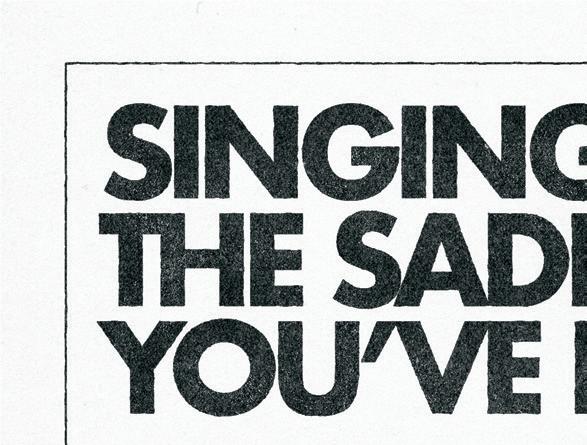





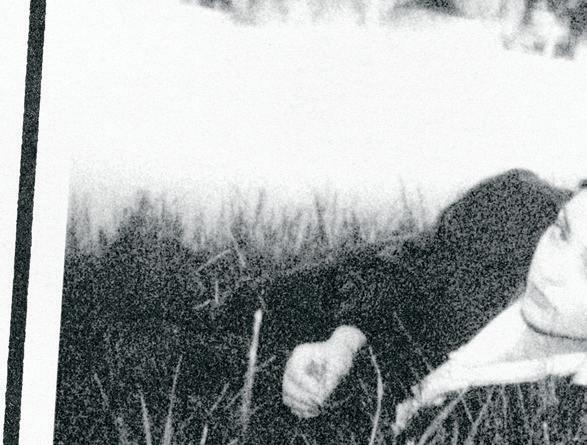
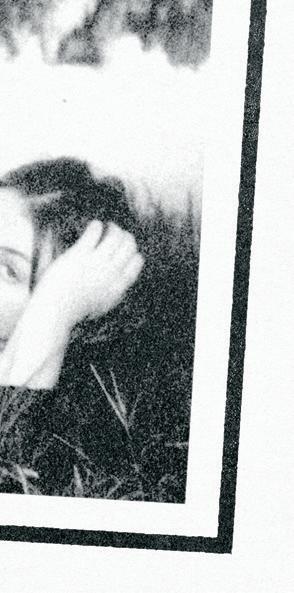

JUNE 9, 2022 - CHICAGO READER 57
SAVAGE LOVE
Still, there’s shitty, and then there’s spectacularly shitty. There are also shitty patterns. If you keep picking the same basic kind of shitty person and/or making the same basic kinds of shitty mistakes—such as ignoring red flags, committing too soon, or “working on it” too long—then you need to make changes.
sex once or twice a week and mostly for my husband. He prefers sex at night, but I am generally exhausted and disinterested by that point. However, in the mornings I am o en horny. Problem is my husband has a medical condition that makes morning sex uncomfortable for him. I occasionally masturbate in the mornings, but I’d rather be screwing him. Do you have any suggestions for how I can teach myself to be horny at the end of the day?
—SEXUAL TIME ZONES
SAVAGE LOVE
Listen to your friends and therapist
Plus, why the logistics of a threesome matter
By DAN SAVAGE
Q : I’m trying to date again a er back-to-back negative relationship experiences. Experiences that have made me question my own judgment and ability to set good boundaries. My friends and therapist all pointed out the red flags, but I was apparently blind to them. I love what you’ve said about how there is no “The One” out there for us, only .72s and .83s, and that we have to “round someone up to The One.” But it seems like I’ve been “rounding up” some numbers that were too low. As things stand now, I’ve never felt so mistrustful of people, and I’ve never
doubted my own choices so strongly. Basically, my walls have gone up. But I love being in a relationship and I want to be in one again. What should I be mindful of as I venture back into that world? What’s a good way to be deliberate without moving at a glacial pace? What should I be asking myself as I begin to form new attachments, especially a er showing such bad judgment in the recent past?
—UNDERSTANDABLY NERVOUS SINCE UPSETTING RELATIONSHIPS EXPIRED
A : First, let’s put things in perspective: you had two
shitty relationships in a row. While that was no doubt unpleasant, UNSURE, and while it’s understandable you might hesitate to put yourself back out there, two shitties in row isn’t evidence your judgment is flawed. Very few of us can say we haven’t had two shitty relationships in a row, if not more. A shitty person is o en the common denominator in a string of shitty relationships, but sometimes shitty relationships happen to good people—and sometimes they happen with good people, i.e., a shitty relationship can happen without a shitty person being involved.

And the single most important change you can make—the thing you can do differently as you head back into the dating world—seems obvious to me, my readers, your friends, and your therapist: listen to your friends and your therapist! They saw the red flags, UNSURE, and pointed them out. The problem wasn’t that you couldn’t see those red flags—you’re not blind—but that you looked away and/or attempted to explain them away. (I’m not blind to the fact that using “blind” to mean “can’t understand or comprehend” is ableist, and I promise not to use it like this again.)
Anyway, UNSURE, the lesson to learn from these two shitty relationships isn’t, “No more relationships for me! I can’t trust my own judgment!”, but instead, “The next time everyone in my life tells me that the person I’m with is shitty or that we’re shitty for each other, I’ll end it.” To be clear: I’m not telling you to substitute the judgment of your friends and therapist for your own, UNSURE, but to supplement your judgment with theirs—unless you wanna empower your friends and your therapist to make an arranged marriage for you, in which case you can substitute their judgment for your own.
Q : I don’t have a super high sex drive, so I generally have
A : Disco nap—get some sleep early in the evening, STZ, fuck your husband when he comes to bed, watch some television until you’re ready for bed, then enjoy a bonus wank in the AM a er he gets up and leaves.
Q : Over the years I have participated in a few threesomes with a friend. We’re not really attracted to each other, so we have mostly focused on our guest stars. We have kissed and groped each other during these sex sessions, though, but otherwise we’ve been pretty hands-off with each other. Here’s the dispute: I say we’ve had sex and I am justified in adding him to my Body Count, he says just being naked in the same room doesn’t count. What do you think? —MANSPLAIN
ARITHMETIC TO HOMOS
A : Won’t mansplain, will dansplain: Let’s say you were naked at a warehouse sex party and your friend was naked at that same warehouse sex party, MATH, and you were fucking one guy at one end of that warehouse and your friend was fucking some other guy at the other end of that same warehouse. That wouldn’t count, MATH, since even if you were naked in the same room, you weren’t having sex with each other. But if you
were fucking some dude’s ass while your friend fucked that same dude’s throat—in a warehouse or a bedroom or an RV at Burning Man—then it would count. Threesomes are sex, MATH, and if you and your friend have had threesomes together, then you and your friend have had sex with each other. (While I don’t like to police the language people use when they talk about sex—I support abolishing the language police—I’ve never liked the expression “Body Count.” While using “My Number” to mean your total number of sex partners is boringly literal, reading about literal body counts in the news every day makes me want to keep “Body Counts” out of my sex column.)
Q : I’m a gay man in his late 20s living with my boyfriend. We are monogamous but I have a hard time being faithful. I’m in love with my boyfriend, he is caring and sweet, and the sex is good. But sometimes I feel this hunger inside of me. I desire other men. I look around at work or at the gym or when I’m out shopping, and all these other men turn me on. I cheated on my boyfriend once when we were on holiday together. I did it in a clumsy, selfish, and inconsiderate way, and my boyfriend saw me. I felt bad about it and apologized. I want our relationship to work because I love him, and we are such a good team. Please give me some advice on how to control myself, because right now I feel it is almost inevitable that I am going to cheat again and wind up losing the man I love over nothing. —IS NEEDING LOVE OVER VARIETY ENDURABLE?
A : If your boyfriend can forgive you and you can learn to lust a er other men without touching them, INLOVE, you can make this monogamy thing
58 CHICAGO READER - JUNE 9, 2022 ll
JOE NEWTON
SAVAGE LOVE



































work. But don’t kid yourself: however much you love your boyfriend, you’re always gonna wanna fuck other men. And unless your boyfriend is a toaster with a dildo duct-taped to it, he’s always gonna wanna fuck other men too. So, maybe instead of having to pretend you don’t find other men attractive— instead of having to lie to each other—you can give each other a little space, i.e., a little erotic autonomy. Be monogamous, yes, but go ahead and flirt with other guys, check hot guys out together, watch and share porn that turns you both on, and then plow all that sexual energy back into your relationship and into each other.

But if you wind up cheating again . . . there are two ways to look at the cheating you’ve already done and



























the cheating you might do in the future: you’re a terrible person who can’t honor a monogamous commitment, INLOVE, or you’re a good person who shouldn’t be making monogamous commitments. It took me a while to realize that I wasn’t failing at monogamy, INLOVE, but rather monogamy was failing me. When I stopped making monogamous commitments I couldn’t keep, my committed relationship(s) began to thrive. If being in a closed relationship leaves you feeling frustrated and generates conflict—internal and relational—and your boyfriend doesn’t want to be in an open relationship, then you two might not be right for each other. Two people who aren’t on the same page where monogamy is concerned and can’t negotiate their way onto the same page,














































INLOVE, won’t and shouldn’t be together for long. You can still love each other, but as exes and friends, not boyfriends.

Q : Can you recommend a good lube, Dan? You see, this Joe Biden guy has been fucking us all in the ass for the last 16 months and it’s starting to hurt. Thank you in advance. —FUCK JOE BIDEN

A : Just for you, FJB, I’m gonna share my home brew MAGA lube recipe: two parts ground glass, two parts Bengay, two parts pumicite, two parts Icy Hot, and all the “go fuck yourself” you have in the house. Enjoy. v


Send letters to mail@ savagelove.net. Download the Savage Lovecast at savagelovecast.com. @fakedansavage




JUNE 9, 2022 - CHICAGO READER 59
10 DAYS FREE FUN FOR EVERY NEW GUY 331661_4.75_x_4.75.indd 1 2/23/22 12:37 PM
Come Over to Squirt.org and Join the Action. Hosting. We’re
JOBS
Northwestern Memorial Healthcare seeks Resource Coordinators Pathology for Chicago, IL. Bachelor’s in Medical Tech/Lab Sci/Clinical Lab Sci/Chem/Bio/ Allied Health qualifying applicant for ASCP certification +3yrs exp req’d. Req’d skills: 3yrs exp in molecular lab, including RNA & DNA extractions, PCR testing. 1 yr exp: Troubleshooting lab analyzers; hospital & molecular lab IT systems. ASCP MLS req’d. Drug & Background check req’d. Must be willing to work 2nd & 3rd shift. Apply online: http://jobseeker. nm.org/ Requisition ID: REF35927O
Northwestern Memorial Healthcare seeks Data Engineers for Chicago, IL to deliver data warehouse & analytic solutions. Bachelors in Comp Sci/ Eng or related field +5yrs exp req’d. Req’d skills: 5yrs w/ data modeling/ architecture; data warehousing models & design fundamentals (kimball & Inmom); OLAP/Tabular cube sw; SQL for data extraction, manipulation, & reporting. Exp must incl: Agile environment; complex SQL queries & stored procedures; Tableau; SSRS; SSIS; SSAS; developing & maintaining ETL/data pipeline. May work remotely at various locations in the Chicago area with ability to commute to HQ Chicago office as needed. Background check & drug test req’d. Apply online: http://jobseeker. nm.org/ Requisition ID: REF36462O
Northwestern Memorial Healthcare seeks Medical Laboratory Scientists for Chicago, IL. Bachelor’s in Medical Tech/Lab Science/Clinical Lab Science/Chemistry/Biology/ Allied Health qualifying applicant for ASCP certification exam req’d. General MLS or MT ASCP or Categorical H ASCP Certification required. Drug & background check req’d. Apply online: http:// jobseeker.nm.org/ Requisition ID: REF35626Q
Assemblers, Inc. seeks Food Safety & Quality Assurance Manager in Chicago, IL to ovrsee dvlpmnt & implmntatn of SQF systm & procdr to ensr prod of qlty prdcts. Reqs BS in Fd Prcsing Eng or clsly rltd fld + 2 yrs rltd ocptn + 24 mnths exp in: GFSI; HACCP; LnSx Sgma + 18 mnths exp in: Fd San & Pst Ctrl; Mcrblgcl Environ mntrng; Lab Mng & analy mthds. Mail resumes to Paul Siefert 2850 W Columbus Ave, Chicago, IL 60652.
Stewardess for boat based in Lincoln Park needed for the summer and fall season. Position requires stocking and serving food and beverage on the boat for family and friends for outings on the lake two to three days a week. $200 per day. Please email your qualifications to wfinlay lucky60010@gmail.com
Looking for a position that allows flexibility in your schedule with the ability to help others?
Home assistance – Provide light housekeeping, run errands or provide transportation if needed. Accompany my Mother to appointments and assist with medications. I am looking for a caring & compassionate person to Care for my Mother. Work Schedule is 5 days a week and 5 hours per day. Salary is $25/hr. Forward your email to William (yolielloyq@gmail. com) for more details.
BUSINESS HYDY, Inc. is accepting resumes for Senior Business Intelligence Engineer in Chicago, Il. Design, develop, analyze and automate largescale, high-performance data processing systems (batch and/or streaming) to drive business growth and improve the product experience. Telecommuting permitted. Mail resume to HYDY, Inc., Tiffany Cross, 444 W. Lake Street, Suite 1700; Chicago, Il 60606. Must reference Ref. SBIE-JBA.
Project Engineer (job site: S&C Electric Co. in Chicago, IL); mail resume to Jennifer Bermudez, S&C Electric Company, 1001 Marina Village Parkway, Suite 400, Alameda, CA 94501.
(Chicago, IL)
1WorldSync, Inc seeks Software Quality Assurance Engineer w/ Bach or for deg equiv in Mech Eng or rltd fld & 5 yrs exp in job offered or autom exp using JBehave, and Selenium to autom various apps that use UI, Batch and API. Must have 5 yrs exp working w/Prod Mgmt and Operations teams to understand bus and tech reqts to dev autom roadmaps; understand the autom reqts w/ROI; GS1 Global Standards and GDSN message choreography; wrkng w/ XML and JSON docs w/ abil to parse, validate, edit, transform and troubleshoot. Apply online https://1worldsync.com/ es/careers/ or to HR, 300 S Riverside Plaza #1400, Chicago, IL 60606.
Sr. Technical Lead (Master’s w/ 3 yrs exp or Bachelor’s w/ 5 yrs exp; Major: Info. & Communications Tech (Concentration: S/W Design & Programming), CS, or equiv.) – Chicago, IL. Job entails working w/ & reqs exp incl: Selenium, Java, Python, JavaScript, Groovy, JUnit, TestNG, Docker, Jenkins, TeamCity, Eclipse, IntelliJ, Git, Bit-Bucket, SharePoint, Putty, Mind Term, Cucumber, Spira, Jira, Agile, WaterFall, Confluence, Appium, Android SDK, AccelQ, X-Code, AWS, Fiddler, Postman, ReadyAPI, JQuery, Oracle, SQL Developer, XML, HTML, JSON, Protractor, Tosca, Apache Tomcat, Anaconda Navigator, PyCharm & NumPy. Must have exp in analyzing & developing applications. Relocation & travel to unanticipated locations within USA possible. Send resumes to WindyCity Technologies Inc., Attn: HR, 3601 W. Devon Ave, Ste. 306, Chicago, IL 60659.

TransUnion, LLC seeks Consultants for Chicago, IL location to understand business requirements for the design of software production execution and delivery.
Master’s in Comp Sci/ related field +2yrs exp OR Bachelor’s in Comp Sci/related field +5yrs exp req’d. Req’d Skills: Ab-Initio; ETL tools (Transform, Partition, Departition, Dataset); EME; Unix/Linux, scripting (Unix, Korn, Bourne); Autosys; Control M; DB2 SQL Databases; SQL Server Queries; FTP; SFTP; Salesforce; Buildforge; Data Gateway; Agile; Clarity, Express>It, DB2/Oracle databases, Process Automation, AWS; Project Mgmnt/Coordination (establishing timelines, deliverables, reporting); program workflow design; solution blueprint dev. 20% telecommuting permitted. Send resume to: Marvin Carter, REF: MH, 555 W Adams St, Chicago, IL 60661.
Baxter Healthcare Corporation is seeking a Sr. IT Manager – Global Enterprise Analytics in Deerfield, Illinois to engage and communicate effectively with business leaders and business subject matter experts to define and align on constructive and tangible data strategies; be a key contributor to establish an effective business engagement & service delivery model that can be leveraged across Enterprise Data work streams. Qualified applicants can apply directly to the Baxter Website at: www.Baxter.com. Please search “Keyword” using job #JR-070831. EOE
Sr. Recruiter position w/ MCKINSEY & COMPANY, INC. US (Chicago, IL). Oversee full cycle of exp hiring process. In charge of end to end recruiting process, candidate orchestration & stakeholder’s mgmt. Lead the full cycle of recruiting process for specialized roles in the North America Social Sector, Healthcare & Public Sector Practice at McKinsey. In charge of designing recruiting strategy, advertising job opportunities, running specialized candidate searches, interviewing process, prep & cultivation post offer. Min of a Bachelor’s degree or foreign degree equiv. Min 2 yrs of recruitment exp in cross-functional recruiting, w/ exposure to both consulting & tech roles. Exp must incl: driving recruitment efforts, strategy & events; direct sourcing & Boolean search using: LinkedIn Recruiter & Google analytics; conducting candidate resume screening & assessments; & reviewing data & market research & consulting w/ stakeholders to recommend & implement hiring plans that address both tech demands & talent availability. Domestic travel typically required. Destination & frequency impossible to predict. Email your resume to CO@mckinsey.com & refer to Job # 5019245 No phone calls please. An EOE
The Office of Planning, Sustainability, & Project Management, at the University of IL Chicago (UIC), located in a large metropolitan area, is seeking a full-time Associate Director for Engineering and Commissioning to assist the department with the following responsibilities: Under direction and supervision, manage the technical design review program and implementation for engineering and commissioning projects; provide technical review of design and construction documents prepared by external architects, engineers, and other professional services consultants; provide full project management services for selected projects, especially those in areas of specialized expertise; collaborate with requesting departments in identifying project requirements and develop scopes of work; oversee development of plans, estimates, specifications, and construction documents; develop Total Building Commissioning (TBC) and retro-commissioning programs, including mechanical, electrical, plumbing, fire protection,
exterior enclosure, and other building systems; oversee commissioning of building systems for major projects; other responsibilities as assigned, including administrative responsibilities. Additionally, this position will supervise one (1) Assistant Director for Engineering and Commissioning. Travel will be required in order to periodically commute to branch campuses. This position minimally r equires a Bachelor’s degree or its foreign equivalent in Mechanical Engineering or related engineering field of study. For fullest consideration, please submit CV, cover letter, and three professional references by 6/29/2022 to Deborah A. Brooks, Office of Planning, Sustainability, & Project Management, University of IL Chicago, 1140 S. Paulina Street, 210 PSB, M/C 892, Chicago, IL 60612 or via email to dbrooks@uic. edu. The University of Illinois at Chicago is an affirmative action, equal opportunity employer. All qualified applicants will receive consideration for employment without regard to race, color, religion, sex, gender identity, sexual orientation, national origin, protected veteran status, or status as an individual with a disability. Offers of employment by the University of Illinois may be subject to approval by the University’s Board of Trustees. The University of Illinois will conduct background checks and other pre-employment assessments on all job candidates upon acceptance of a contingent offer of employment. Background checks will be performed in compliance with state and federal law. As a qualifying federal contractor, the University of Illinois System uses E-Verify to verify employment eligibility. The University of Illinois System requires candidates selected for hire to disclose any documented finding of sexual misconduct or sexual harassment and to authorize inquiries to current and former employers regarding findings of sexual misconduct or sexual harassment. For more info, visit https://www.hr.uillinois.edu/cms/One.aspx?portalId=4292&pageId=1411899 University of Illinois faculty, staff and students are required to be fully vaccinated against COVID-19. If you are not able to receive the vaccine for medical or religious reasons, you may seek approval for an exemption in accordance with applicable University processes.
Trading Technologies International, Inc. seeks Automation Test Engineers for Chicago, IL to design & dev automated test cases based on sw req’s & tech design specifications. Master’s in Comp Sci/Comp Eng/ any Eng field +2yrs exp or Bachelor’s in Comp Sci/ Comp Eng/any Eng field +5yrs exp req’d. Req’d Skills: Python, Java, Selenium, Cucumber, Oracle, MySQL, TOAD, automation dev & testing. 60% telecommuting permitted. Send resume to: https://www.trading technologies.com/aboutus/careers/ REF: SS
HiLink Inc. is seeking a Public Relations Specialist to identify company’s ad needs, direct prometon campaigns, build relationship with customers, maintain company’s social media platforms, and analyze marketing efforts. Position requires bachelor’s degree in PR or related, 2 years’ experience as PR Specialist or related, and knowledge of the Chinese, Japanese and other Asian countries’ education market. Any interested applicants can mail their resume with code “HiLink2022” to: HiLink Inc., 401 N Michigan Ave, Suite 750, Chicago, IL 60611
LEGAL NOTICE
NOTICE OF PUBLIC SALE OF PERSONAL PROPERTY
Notice is hereby given that pursuant to Section 4 of the Self-Storage Facility Act, State of Illinois, that Chicago Northside Storage - Lakeview / Western Ave Storage LLC will conduct sale(s) at www.storagetreasures. com by competitive bidding starting on June 15th and end on June 22nd @ 10:00am on the premises where property has been stored, which are located at Chicago Northside Storage 2946 N Western Ave. Chicago, IL 60618. 773-305-4000.
In the matter of the personal property for the individual listed below, Chicago Northside Storage - Lakeview. John Frankot CC100, Termaine Jodie Jones Q20. Purchases must be made with cash only and paid at the time of sale’s redemption. All goods are sold as is and must be removed at the time of purchase. Sale is subjected to adjournment.
RESEARCH
Have you had an unwanted sexual experience since age 18? Did you tell someone in your life about it who is also willing to participate? Women ages 18+ who have someone else in their life they told about their experience also willing to participate will be paid to complete a confidential online research survey for the Women’s Dyadic Support Study. Contact Dr. Sarah Ullman of the University of Illinois at Chicago, Criminology, Law, & Justice Department at ForWomen@ uic.edu, 312-996-5508. Protocol #2021-0019.
PROFESSIONALS & SERVICES
CLEANING SERVICES
CHESTNUT ORGANIZING AND CLEANING SERVICES: especially for people who need an organizing service because of depression, elderly, physical or mental challenges or other causes for your home’s clutter, disorganization, dysfunction, etc. We can organize for the downsizing of your current possessions to more easily move into a smaller home. With your help, we can help to organize your move. We can organize and clean for the deceased in lieu of having the bereaved needing to do the preparation to sell or rent the deceased’s home. We are absolutely not judgmental; we’ve seen and done “worse” than your job assignment. With your help, can we please help you? Chestnut Cleaning Service: 312-332-5575. www. ChestnutCleaning.com
ADULT SERVICES
Danielle’s Lip Service, Erotic Phone Chat. 24/7. Must be 21+. Credit/ Debit Cards Accepted. All Fetishes and Fantasies Are Welcomed. Personal, Private and Discrete. 773-935-4995
Sexxy Black Male RU READY I AM
Separated 60yr Blkm, 6FT, 230, Great Shape, lives south of The Chi willing to travel. Loves sports, concerts and I can hang out. I have a job, house and a Truck, one son he’s 26 lives by himself. ISO a woman with personality, sense of humor, Must love ROMANCE.... 45-65 JEROME5762@YAHOO. COM
60 CHICAGO READER - JUNE 9, 2022 ll
CLASSIFIEDS JOBS ADMINISTRATIVE SALES & MARKETING GENERAL REAL ESTATE RENTALS FOR SALE NON-RESIDENTIAL PROFESSIONALS & SERVICES CLEANING RESEARCH ADULT SERVICES WANT TO ADD A LISTING TO OUR CLASSIFIEDS? Email details to classified-ads@chicagoreader.com





JUNE 9, 2022 - CHICAGO READER 61 Let’s Play! Make time to learn something new with music and dance classes at Old Town School! We offer flexible schedules for all skill levels both in-person and online. oldtownschool.org Sign up for classes today at MUSIC CLASSES FOR ADULTS & KIDS LINCOLN SQUARE LINCOLN PARK SOUTH LOOP & ONLINE OTS_1_2V_ClassAd_072921.indd 1 7/23/21 2:21 PM 3730 N CLARK ST METROCHICAGO.COM @METROCHICAGO SMARTBARCHICAGO.COM 3730 N CLARK ST | 21+ SATURDAY JUN 18 Diamond Formation x TRQPITECA CHIPPY NONSTOP ARIEL ZETINA CQQCHIFRUIT LA SPACER FRIDAY JUN 10 NDTAL MUSIK presents KAI ALCE / CHEZ DAMIER DAMON LAMAR SATURDAY JUN 11 Obscure x Format present ANSWER CODE REQUEST JASON PATRICK LOWKI FRIDAY JUNE 10 / 9PM / 18+ POST ANIMAL + Stuyedeyed SATURDAY JUNE 11 / 9PM / 21+ PACHANGA TO THE MOON ft. Pachanga DJs Papa G (REGGAE) Karenoid (AGUA DE ROSAS) Live Music: La Obra (BACHATA) Abel (REGGAETÓN) Tianguis - Artists Market SATURDAY JUNE 25 / 11PM / 18+ 34TH ANNIVERSARY BALL NOCTURNA with DJ Scary Lady Sarah TUESDAY JUNE 28 / 7:30PM / 5+ BILLY HOWERDEL of “A Perfect Circle” SUNDAY JUNE 12 /9PM / 21+ @ SLEEPING VILLAGE / METRO PRESENTS MUZI + DJ Mochi WED JUN 15 YANN TIERSEN + Charlie Cunningham HOT STOVE COOL MUSIC MICHAEL CERA PALIN NICK LAVELLE AJJ NEO REUNION ROCHELLE JORDAN @ SLEEPING VILLAGE PRINCESS GOES TO THE BU ERFLY MUSEUM JUL 01 JUL 02 JUL 02 JUL 08 JUL 16 JUL 23 JUL 24 Laid Back | Cold Beer | Live Music @GMANTAVERN GMANTAVERN.COM 3740 N CLARK ST 21+ THU JUN 23 DRAMA + DJ Iggy + Jaq A aque SAT JUN 18 JOE FIORE PRESENTS FURBALL: PRIDE CHICAGO with DJ Warren WED JUN 22 RAVYN LENAE ft.

















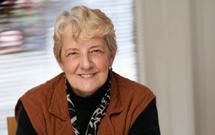

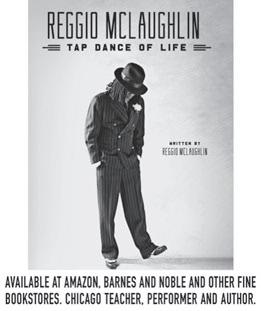



















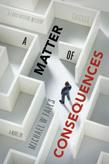

62 CHICAGO READER - JUNE 9, 2022 ll Outside Noise Reduction Keeps Bugs & Spiders Out Reduce or Eliminate Fog & Water Noise from Outside? Visit stormsnaps.com or noisewindows.com sales@stormsnaps.com Alpina Manufacturing, Chicago, IL 1-800-915-2828 Soundproofing Window Inserts the platform The Chicago Reader Guide to Business and Professional Services To advertise, email ads@chicagoreader.com home improvement legal books Fun, Clean, Picture Frame assembly JOB $18/hour Tired or bored of clicking away on a keyboard working at home? Keep your hands and mind busy with a fun, safe, clean assembly job. You’d have your own large assembly zone, at least 15-20 feet away from others, so we’re really safe here. Top rated rm Alpina Manufacturing LLC founded in 1992 Beautiful campus in Galewood, near Mars candy, 3 blocks north of Oak Park. We build and sell display framing systems to customers nationwide including Wal-Mart, Verizon, Circle K gas stations, Hospitals. Full time, Part time, Flex hours for working parents or students. We train, no travel, work in Galewood. Open to any backgrounds. Excellent pay, friendly caring management. Stop in anytime between 7am and 4pm M-F ask for Izzy to apply and check us out. Alpina Manufacturing 6460 W Cortland St., Chicago, IL 60707 business consulting entertainment Brigi e Schmidt Bell, P.C. 847-733-0933 lawyers@bsbpc.com Brigi eBell.com Brigi eSchmidtBellPC Considering Divorce? We Can Help. Collaborative | Prenuptual Divorce | Mediation insurance services health and wellness YOUR AD HERE dance JOIN US! WWW GECHAMBER COM What Greta said . . . shop local 5301N.ClarkSt.Fl.2 CHICAGODANCESUPPLY.COM 773-728-5344 A Matter of Consequences by Michael W. Falls Available on Amazon and Booklocker A Classic Chicago Mystery Customized Massage Therapy, Intuitive Energy Work, and Holistic Talk Therapy 2514 W Armitage Ave, Suite 211 Chicago, IL 60647 773-697-9278 www.intuithealing.com Open Thursday-Monday BY APPOINTMENT ONLY your heading here



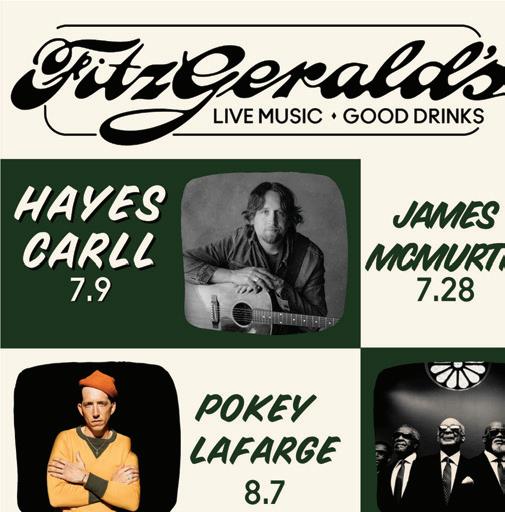




















JUNE 9, 2022 - CHICAGO READER 63 6/16 @ emporium wicker park 6/ 17 @ SCHUBAS the Cool Kids AIR CREDITS + DJ ARCHI Hollyy + The Evening Attraction w/ Michael Damani the cannabis platform a Reader resource for the canna curious www.neuromedici.com 312-772-2313 Findouttoday ifmedical cannabisorinfusiontherapyis rightforyou.Telemedavailable! Yourpartnersinhealthandwellness. Serving medical cannabis patients since 2015. To advertise, email ads@chicagoreader.com CBD / cannabis recipes, psychedelic drawings to color, word puzzles to stimulate your brain, growing tips, and more! chicagoreader.com/420book The Budrista platform is a cannabis industry and lifestyle project. Its purpose is to support the healthy and balanced lifestyle of cannabis industry workers. Budrista functions through various outlets such as educational programming and recreational events. By signing up, you’ll have first access to our events and programming!
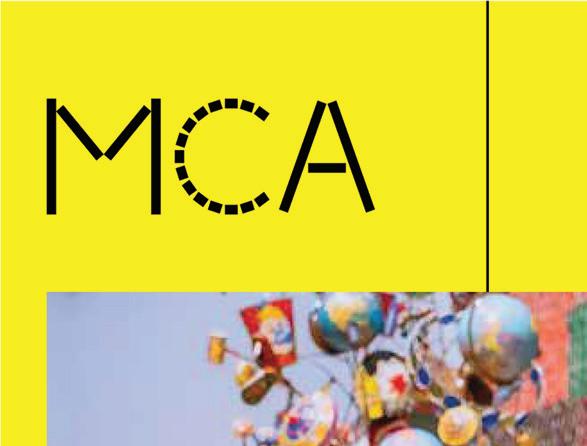



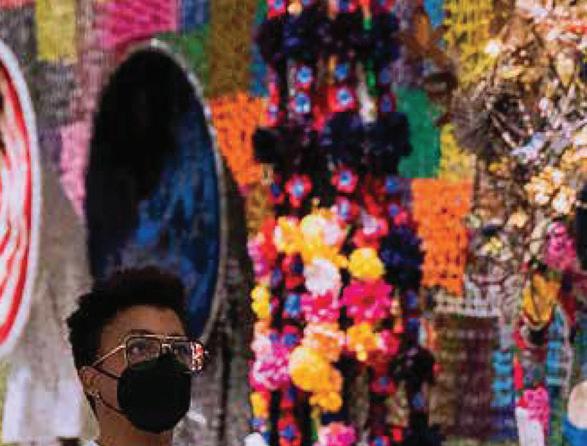
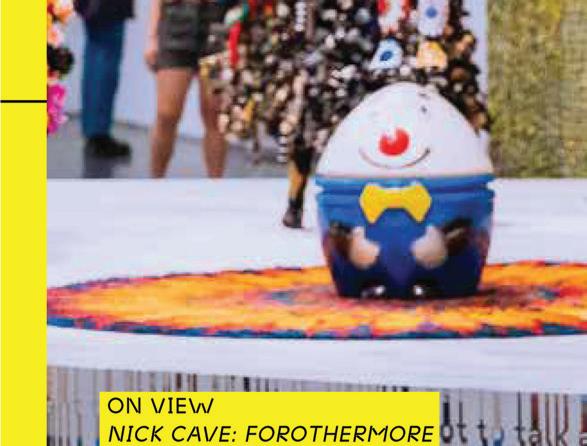
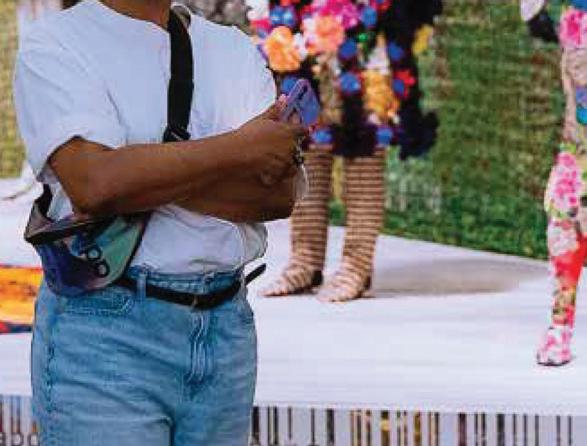
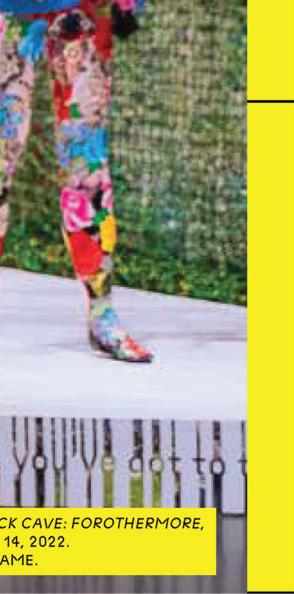











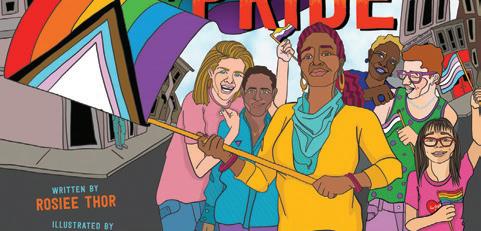

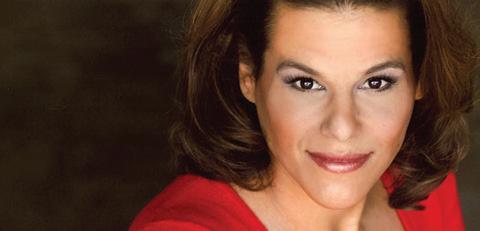
SPECIAL QUARTERLY INSERT IN THE CHICAGO READER, PRODUCED BY WINDY CITY TIMES. SEE WINDYCITYTIMES.COM FOR MORE LGBTQ NEWS AND CULTURAL COVERAGE. STARTING ON PAGE 10 ‘THE MEANING OF PRIDE’ Artist Sam Kirk on new book 24 IML 2022 Chicago contest returns to in-person 30 ALEXANDRA BILLINGS Icon pens memoir 6 WINDY CITY TIMES VOL 37, NO. 3 JUNE 9, 2022 Greetings from WindyCityTimes’ Spectacular! Celebrate Pride with our LGBTQ travel tips both near and far
MANAGING EDITOR Matt Simonette
DIGITAL DIRECTOR Jean Albright
ART DIRECTOR Kirk Williamson
BUSINESS MANAGER Ripley Caine
SENIOR ACCOUNT EXECUTIVES
Terri Klinsky, Leni Manaa-Hoppenworth, Amy Matheny, Lisa Solomon Mann
CONTRIBUTORS
Joey Amato, Mary Shen Barnidge, Carrie Maxwell, Andrew Pirrotta, David Taffet
WEB HOSTING LoveYourWebsite.com (lead programmer: Martie Marro) (773) 871-7610 FAX (773) 871-7609
Editorial: andrew@windycitymediagroup.com Sales: terri@windycitymediagroup.com Art/ad copy: kirk@windycitymediagroup.com
Copyright 2022 Lambda Publications Inc./Windy City Media Group; All rights reserved. Reprint by permission only. Back issues (if available) for $5 per issue (postage included). Return postage must accompany all manuscripts, drawings, and photographs submitted if they are to be returned, and no responsibility may be assumed for unsolicited materials. All rights to letters, art and photographs sent to Windy City Times will be treated as unconditionally assigned for publication purposes and as such, subject to editing and comment. The opinions expressed by the columnists, cartoonists, letter writers, and commentators are their own and do not necessarily reflect the position of Windy City Times. Publication of the name, photograph, or likeness of a person or organization in articles or advertising in Windy City Times is not to be construed as any indication of the sexual orientation of such person or organization. While we encourage readers to support the advertisers who make this newspaper possible, Windy City Times cannot accept responsibility for advertising claims.
WINDY CITY MEDIA GROUP, 5315 N. Clark St. #192, Chicago, IL, 60640 U.S.A (MAILING ADDRESS ONLY)


June 9, 2022 2 WINDY CITY TIMES
PUBLISHER Terri Klinsky
EXECUTIVE EDITOR Andrew Davis
VOL 37, NO. 3JUNE 9, 2022 SPECIAL QUARTERLY INSERT IN THE CHICAGO READER, PRODUCED BY WINDY CITY TIMES. SEE WINDYCITYTIMES.COM FOR MORE LGBTQ NEWS AND CULTURAL COVERAGE. UPCOMING 2022 ISSUES: SEPTEMBER 1 • DECEMBER 8 TO ADVERTISE: ADS@CHICAGOREADER.COM OR TERRI@WINDYCITYMEDIAGROUP.COM INDEX COVER CREDITS: MAIN STORY: Photos by Andrew Davis and Kara Rosenborough, courtesy of Joey Amato and National LGBT Media Association. Illustration by Kirk Williamson Billings: Courtesy of Billings Cover of ‘The Meaning of Pride’ IML: Photo by Joseph Stevens Chicago abortion-rights advocate warns of emboldened right-wing 4 Alexandra Billings on new memoir 6 David Pevsner challenges age and body stereotypes 8 TRAVEL: Columbus, Ohio 10 TRAVEL: Palm Springs’ Descanso 14 TRAVEL: Palestine, Texas 18 Chicago theater blooms out of town 21 Silk Road co-founders on road back from medical setback 22 ‘The Meaning of Pride’: Sam Kirk 24 Gayla Turner on grandmother’s secret queer identity 24 Ed Negron street dedication 28 IML 2022 30
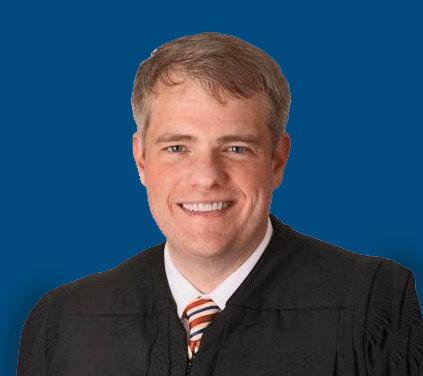


















June 9, 2022 3 WINDY CITY TIMES
BY MATT SIMONETTE
The only aspect of the recent leak of Justice Sam uel Alito’s leaked opinion attacking Roe v. Wade that surprised longtime abortion-rights activist Terry Cosgrove is that anyone else was surprised by it.
“Donald Trump said he would appoint people who would overturn Roe v. Wade,” Cosgrove told Windy City Times. “People are surprised, but he did exactly what he said he was going to do.”
Cosgrove, who is gay, has been the president and CEO of the abortion-rights organization Per sonal PAC for 33 years. In that time, Illinois has become one the only states in the Midwest with secure rights for people to secure abortions.

But Cosgrove warned that right-wing elements will not be finished attacking the rights of mar ginalized groups after the anti-choice opinion is officially released.
“If you go their websites, they have how an IUD is a murder weapon that kills a baby, and how a birth control pill kills a baby,” he said. “They call it a chemical murder.”
Allies have suggested to him that politicians would never interfere with birth control access, but Cosgrove cautioned that reversing abortion access once seemed unthinkable in the main stream as well.
“I say, ‘Okay: Don’t believe me, but they’ve now done this once already,’” he added.
Cosgrove further warned that LGBTQ+-rights will undoubtedly be on the right-wing radar. “There is nothing that you can give to these peo ple to make them say, “You know what? We’ve done enough. … They’re just getting started with overturning Roe.”

He added, “I’ve had a front-row seat to how horrible, violent and uninterested in human

down in cold blood. I have seen the arsons, and the death threats that I get at my office.”
Anti-gay sentiment from the height of the ‘80s AIDS crisis still resonates for him as well. He remembers right-wing elements loudly wishing death from AIDS on gay men.
“If you don’t take that seriously, then I don’t know what you think that they’re going to take seriously,” he said. “If you think that there’s someplace that they’re going to stop, then you are living on a different planet.”
Personal PAC’s specific mission is supporting Illinois politicians who specifically state that they support abortion-rights. Promising “not to touch abortion-rights” is not sufficient to gain the organization’s endorsement or escape their opposition.
Cosgrove and Personal PAC have been crit icized by state political insiders for a no-holds barred approach—candidates who do not return Personal PAC’s questionnaire run the risk of being labeled anti-choice. Cosgrove is unapologetic, and noted that each page of the questionnaire warned candidates that failure to return the form would result in that designation.
“What can I say? It’s pro-choice or no choice,” he said, noting that so many pro-choice conser vatives wishing to quietly support abortion rights ultimately failed in various places to prevent their anti-choice colleagues from implementing or proposing draconian punishments for women seeking abortions.
“Pro-choice means that someone has the right to choose an abortion,” he said. “I agree 1,000% if someone isn’t comfortable having an abortion, they shouldn’t have one. My calling card is: Not every pregnancy needs to be planned, but every child deserves to be loved and cared for. I wish more anti-choice people would adopt that motto and focus on providing the care that every single
Cosgrove announced recently that he would be stepping down from his post next January, and he is helping Personal PAC gradually undergo the transition to new leadership.
“On Jan. 6, I am going to be 70 years old, and it’s time,” he said. “I just feel that with a lot of the changed and the future outlook of what’s going on in the abortion-rights movement and LGBTQ movements, other people need to step for ward and take a leadership role.”

While Cosgrove is not sanguine about the ideological trajectory the current U.S. Supreme Court can lay out for the nation, he is not con vinced that Americans cannot flex their political voices to reverse that trajectory either. He main tains that apathy, frustration and isolation are the emotions really hindering citizens wishing to make societal changes.
He explained that concerned voters need to both donate to organizations supporting candi dates in favor of abortion- and LGBTQ+-rights and volunteer for those candidates.
“Winners make policy and losers make noise,” Cosgrove said. “I wish everyone who marched would then volunteer to work in the campaign of a [supportive candidate] to make sure that they got elected, because that’s the only way we’re going to solve the problem. People are going to have to donate their time, and their money, and they’re going to have to get very, very serious.”
June 9, 2022 4 WINDY CITY TIMES
POLITICS Chicago abortion-rights advocate warns of emboldened right-wing
TORRICK ALAN WARD for JUDGE 9th SUBCIRCUIT Celebrating Pr ide Month 365 days a year Suzanne Westenhoefer Kristen Merlin Kofy Brown Melanie DeMore Nan Washburn & NWMF Orchestra Sarah Bush Dance Project Sandra Valls Be Steadwell SeekHer 7 Big Bad Gina Mimi Fox Tammy Hall Pamela Means World on Fire e nina jay Hardened and Tempered Nancy Scott Sistah Ngoma National Women’s Music Festival June 30 - July 3, 2022 Drum, Vocal & Ukulele Choruses Over 90 Festival Workshops Open Mic w StoryTelling Marketplace w Dance Party Film Festival Marriott Madison West Hotel & Conference Center Middleton WI nwmf.info PAID FOR BY THE COMMITTEE TO ELECT TORRICK WARD WINDY CITY TIMES CHICAGO’S LGBTQ+ NEWS SOURCE .COM
Personal PAC CEO Terry Cosgrove. Courtesy of Cosgrove
Everybody in. Proud to be out.
As one of the first automakers to sign onto the HRC National Business Statement Opposing Anti-LGBTQ State Legislation, General Motors is proud to support and celebrate the accomplishments of our LGBTQ+ community during Pride Month and beyond.
everybody in.

June 9, 2022 5 WINDY CITY TIMES Gracol 402860087A01 1st_Assembly 05/23/2022 T:9.75" T:9.875" gm.com ©2022 General Motors. All Rights Reserved.
11704137GG_Windy_City_Times__402860087A01.indd 1 5/23/22 1:51 PM
Alexandra Billings
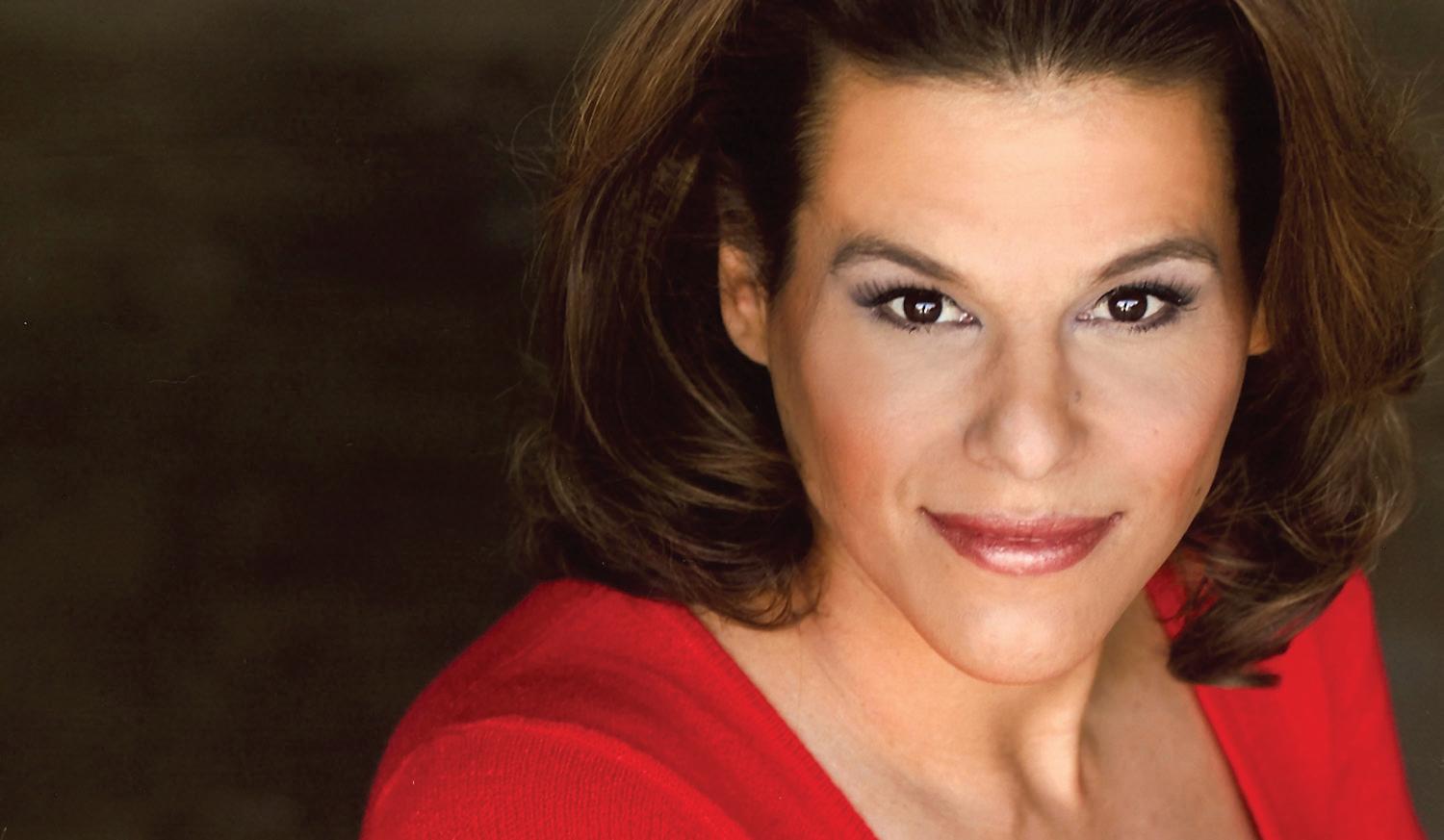
Trans activist, actress and educator on new memoir, state of the world
BY CARRIE MAXWELL
About three-fourths of the way through activist, actress and educator Alexandra Billings’ This Time For Me: A Memoir (out via TOPPLE on April 1), written with Joanne Gordon, readers encounter these words: “I met Larry Kramer for the first time in 1996, and it split me apart forever.”
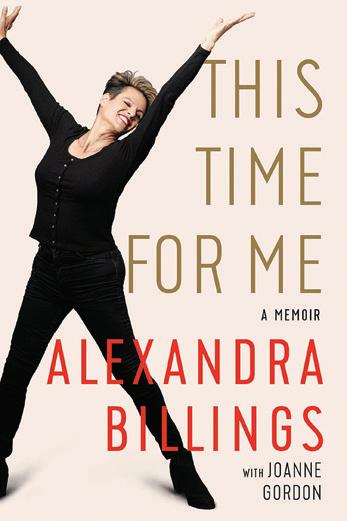
With this one line, Billings offers a window into her thinking about her life’s trajectory.
“Larry was not only my guardian and an angel of light that lighted up my way, he was that for an entire queer generation,” Billings told Windy City Times. “He was a beacon, revolutionary, poet, friend and he understood—I think better than anybody I knew, anyway—the plight of the queer person. He lived our struggle. He did not just talk about it or pontificate about it. He did not just lecture. He did all those things and he lived it in his bones. I really think that is why, when he left this planet, he left an indelible mark in queer history. He was not just a trailblazer, he changed the queer vernacular.”
Billings candidly and, at times, humorously chronicles her life growing up in the Chicago suburb of Schaumburg; coming out as trans; her drug addiction and subsequent sobriety; being a sex worker in Chicago in the 1980s, when she was in her 20s, which she said “was actually kind of funny” and then became “an insidious night mare;” being arrested and spending nights in jail; and experiencing homelessness and getting diag nosed with HIV in 1985.
She also writes about many professional en deavors, such as performing as Shante at Chicago clubs such as The Baton; her wide-ranging acting career that took her from small Chicago theater spaces to her most recent role as Madam Morrible in Broadway’s Wicked; Hollywood behind-the-
scenes stories; a teaching career (she received her MFA in acting at California State Universi ty-Long Beach in 2014); and a decades-long ro mantic relationship with high school sweetheart Chrisanne Blankenship, whom she married—for the first time—in 1996.
The wedding chapter goes back and forth be tween Billings and Blankenship’s first ceremony, which culminated at local nightspot Sidetrack; and their legal union in California in 2008, in the final hours before the anti-marriage equality Prop 8 became law.
“We made it just under the wire,” said Billings.
A number of Chicago notables make cameos throughout the book, including Honey West, Mimi Marks and Chilli Pepper.
When asked why she was so open throughout the book, especially in the chapters devoted to her 20s, Billings said that her “intention was to tell the truth. That is difficult for me to do. If people understood or found themselves some where in my story that is a plus. I just wanted to be as honest as I possibly could, so anything else that happened, I feel, is a gift.”
Billings said the through lines in her book are “perseverance, luck and gratefulness.”
This Time For Me is published by Amazon im print TOPPLE, under the direction of Joey Solo way. Billings and Soloway met on the set of the TV show Transparent, where Billings played Davi na and Soloway served as a co-creator, writer and director.
“Joey is the greatest,” said Billings. “I have known Joey since the 1990s. Joey was doing Co-ed Prison Sluts and I was doing Cannibal Cheerleaders on Crack and we were in a battle for Chicago late-night theater. God, those were the days.”
Billings credited co-writer Joanne Gordon with
convincing her to take her many Facebook posts on aspects of her life and turn them into a mem oir. Billings would rewrite and expand those es says and then give them to Gordon to edit. She said the book was originally about 200 pages longer.
“It was like the Les Miz of autobiographies,” said Billings. “The editors at TOPPLE and Ama zon said I needed to cut this down. … I would write it and then Joanne would take all of those essays, hundreds of them, and put them into some kind of cohesive order—I do not know how. Sometimes she would take one essay, and put it with another one, and marry it. She is the one who organized all of that stuff into a book. It would not have been done without Joanne. … Everyone really worked together.”
Addressing her years on Transparent, and working with former co-star Jeffrey Tambor, who played Maura, Billings was contrite about main taining her silence when allegations of abuse by Tambor arose.
“I have to live with that for the rest of my life,” said Billings, “I had already been through two other abusive relationships. I knew what they felt like, sounded like and looked like. Just because, and I am still unpacking all this stuff, Jeffrey was Maura, meaning in my head Jeffrey was a trans woman. Just because I talked myself into believing that was true, I let him get away with murder. And that is my own damn fault. I wanted to take responsibility. I am not trying to portray myself as some sort of warrior or whistleblower. I was just as guilty standing around and doing nothing as Jeffrey was standing around and do ing everything.”
Speaking about the events of the past few years, Billings said, like the early days of the AIDS pandemic, the COVID-19 pandemic is “sear
ing” memories into the younger generations’ brains “that will never leave you, ever” because “years of isolation does not go away.”
Because she is a teacher, Billings said, her students stay the same age while she gets older. Each generation of students has been less and less shocked when she tells them she has a longterm HIV-positive diagnosis, which has made her happy. She added that her generation never would have imagined this when they first faced the HIV/AIDS pandemic—that people would in stead ask about it in a curious and caring man ner.
This semester, when Billings told her students about her HIV diagnosis and “what it was like to walk down Halsted Street in 1989, when the smell of death just permeated the air,” one of her students responded, ‘I lost my mother to COVID a year ago and that is what happened to me when I walked down the street of my hometown. I lit erally just smelled death.’ It really struck me be cause I think we have stumbled on a generation that I do not have to explain myself to.”
Billings did not plan to end the book with a letter to her students. But as she wrote, she re alized that instead of “leaving a legacy, a queer map of a 60-year-old trans woman” she wanted readers to “laugh occasionally” and “have faith in humanity.” She wanted to encourage readers not to give in to despair, especially with the ongoing COVID-19 pandemic and the myriad anti-LGBTQ laws being passed in GOP-controlled states in re cent years.
The LGBTQ+ community has been marginalized in the past, Billings acknowledged, but “our gift is survival. The book is about survival however you survive, however you end up, however cha otic or broken or how many piece there are of you that just allows more light to shine through. The takeaway for all of us—not just in the book but the human experience in general—is that all this stuff that is happening to us is happening so that we fly higher.”
June 9, 2022 6 WINDY CITY TIMES ICONS
Alexandra Billings. Courtesy of Billings
Courtesy of TOPPLE-Little A
Boricua [boh-ree-kwah] is more than a word to identify a person from Puerto Rico. It’s a way of life that’s about embracing your passion and living every moment. And we welcome everyone who visits our Island to do the same. Book your trip today.





DiscoverPuertoRico.com/LiveBoricua
























































June 9, 2022 7 WINDY CITY TIMES
FOLLOW YOUR HEART WHEREVER IT LEADS YOU.
Actor/model David Pevsner challenges age and body stereotypes in recent book
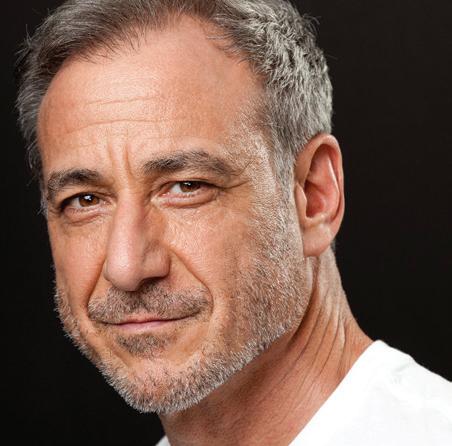 BY MATT SIMONETTE
BY MATT SIMONETTE
When writing his recent book—Damn Shame: Desire, Defiance and Show Tunes—actor/model/ filmmaker David Pevsner noticed three themes coming to the fore: body shame, sexuality and ageism.

“All three of those are very polarizing subjects, and they are things people don’t want to talk about,” said Pevsner.
But body image is a central through-line in Pevsner’s story. His autobiography details every thing from growing up in Skokie through his work
that that’s just not true,” he explained.
Now based in Los Angeles, Pevsner has nu merous film, television and stage credits, among them appearances on Modern Family, Grey’s Anat omy, NYPD Blue and the 2012 Chicago-based film Scrooge & Marley, in which he was the lead. (Scrooge & Marley was executive-produced by Windy City Times owner Tracy Baim.)
In Damn Shame, Pevsner recounts a signif icant moment leading to his frustration with body-shaming. He had grown a beard in the early ‘90s—an era when many gay men were hyper-fe tishizing hairless faces and chests—before ap
on stage and his eventual decisions to publish “nudies”—a label he cribbed from Valley of the Dolls—of himself that have been online staples for several years.
Those subjects “became the trajectory for me to explore what it is that you read about in the book,” Pevsner explained. “It’s been a never-end ing journey for me to come to terms with this body-shaming [and] my sexuality, with feeling comfortable about nudity, with being less judg mental about myself and comparing myself to other people.”
Once the three themes of Damn Shame became apparent to Pevsner, he resolved to be more kind to himself.
“It used to be that I had to be built and I had to be ripped, because that’s the only thing peo ple want to see, and as I’ve gotten older, I realize
pearing in a revival of Fiddler on the Roof head lined by Topol. When Pevsner went out to bar during the show’s run, another customer made a “vomiting” gesture upon seeing Pevsner with the beard.
“When you show up as you are—with your face or your body—there’s kind of nothing that you can do to change that,” he said. “No matter what I had done to [improve] my body, the beard was something that I couldn’t change in the moment and it was something that people had a strong reaction to, and it usually wasn’t very positive.”
Pevsner now refuses to define himself by oth ers’ expectations.
“People want to see all kinds of bodies and all ages,” he said. “Not everybody—there are a lot of guys who will look at a 60-year-old guy like me naked in a photo and think, ‘Ew, put it away.’
But there’s other guys who are like, ‘Oh, Daddy.’ I’ve become, ‘This is who I am. This is what I’m putting forth. I know it won’t please everybody, but I know it will please some people.
Pevsner had long been posing for erotic photos over the years, but his pictures began to develop a following thanks to Tumblr, which, under its previous ownership, was widely utilized by var ious adult communities. Recently, he has been starring in and producing erotica for his OnlyFans page.
“During COVID, when I was mostly on my own, I tried to think of creative ways that I could pres ent myself sexually,” he said. “With the photos I take, and the videos that I shoot, we try to put them on the creative end as well as erotic and XXX, and wherever it goes. There’s a lot of time and editing that goes into it. With the photos, I
try to find a story to tell—sometimes it’s with a series of photos and sometimes it’s with a single photo, and I will write all finds of erotic stories, or whatever filth I can come up with in my head. I love that I have a pretty filthy brain, and that I finally chose to express it.”
Pevsner said he’s heard from a diverse group of readers after publishing Damn Shame, and hopes even more audiences besides gay men will find inspiration and comfort from his story.
“I think I’ve done my best to make this all very relatable and very universal, and hopefully make people feel a little kinder to themselves—to be less judgmental about their fantasies and to be less judgmental about where they are in that mo ment, to love themselves a little bit more,” he said.
June 9, 2022 8 WINDY CITY TIMES
Left: David Pevsner. Right: Cover of Damn Shame: A Memoir of Desire, Defiance, and Show Tunes.
Courtesy of Pevsner
ENTERTAINMENT





June 9, 2022 9 WINDY CITY TIMES
Columbus, Ohio
A tantalizing mix of the old and the new
BY ANDREW DAVIS
I have had the good fortune to visit Columbus, Ohio, several times—and there’s a lot more to the 14th-most populous city in the country than The Ohio State University (and, yes, be sure to include “the”).
In essence, it’s a case of “the more things change, the more things stay the same”—and by the latter, I mean that the levels of quality and fun have been unchanged for the decade (and more) that I’ve explored the city.
To be sure, there’s a lot of change that constantly occurs here, and that’s to be expected in a place where the population is exploding (with some residents moving from Chicago). But Columbus is just a five-and-a-half-hour drive (or 50-minute plane ride) away from the Windy City—and a world of wonders awaits.
Luxury at LeVeque
Hotel LeVeque (50 W. Broad St.; https://www. hotellevequecolumbus.com/) is a 149-room boutique hotel in downtown Columbus.
Since 1927, the historic LeVeque Tower has been a shining star lighting up the skyline, and the hotel maintains that astronomical connection in several ways—including having astrolabes and machines in rooms that cast astral projections.
Patrons might feel like stars themselves (the celebrity kind, of course) as the hotel attends to every whim. (When the fitness center ran out of sanitizer, it was replaced quickly.) In addition, there’s the restaurant Keep, which serves breakfast and dinner (the latter including a lovely buckeye truffle for dessert).
Food and drink
Chicago may have an impressive culinary scene, but Columbus can certainly boast of many high points in the areas of food and drink.
A good starting point is the acclaimed and relatively new Chapman’s Eat Market (739 S. 3rd St.; https://www.eatchapmans.com/). The joint was certainly jumpin’ on the night I went

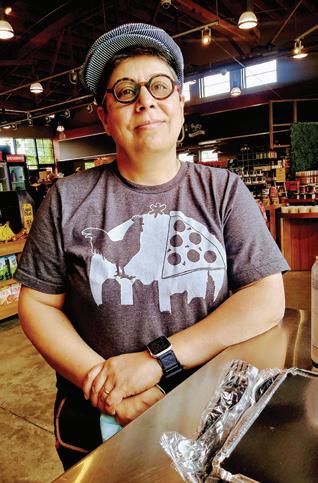
with a dining companion—and it’s no surprise. The dishes are certainly enticing, especially the General Tso’s cauliflower and the com tom (lemongrass pork shoulder over broken rice, chile cucumbers and pickled carrots). The cocktails (such as the Ohhh, What’s That?, a concoction of gin, lavender, purple yam, citrus blend, aquafaba and soda) are equally intriguing.
In Columbus’ popular Short North area—which has undergone changes of its own—one stalwart business is Northstar Cafe (951 N. High St., among other locations; https://www.thenorthstarcafe.com/). Famed for its breakfast items that range from mushroom frittatas to the hamand-cheese scone to the Everyday Egg Sandwich, there’s something delectable for everyone.
Charmy’s Persian Taste (inside the Hills Market, at 95 N. Grant Ave.; https://www. charmyspersiantaste.com/) offers delightful dishes such as mirza ghasemi—grilled eggplant, egg, tomato and garlic, served with traditional Persian bread. Another fascinating aspect involves co-owners Rezi Haghiri and wife Sherry Bayegan, who came to the United States seeking asylum from their native Iran. (Haghiri told Windy City Times she’s been to Chicago once—in 2014 to gain said asylum.)
Brassica (680 N. High St.; https://brassicas. com/locations/short-north/) is another Middle Eastern spot (although arguably of the fast-food variety), and it’s undeniably popular, as the line to order food is often out the door. (It’s owned by the same people who run Northstar, btw.) Pita bowls and salads are assembled in a Chipotle-like atmosphere, with ingredients like falafel, chicken, brisket and vegetable. Grab a tahini chocolate-chip cookie and a minty pink lemonade to make a great meal.
And just down the street from that restaurant is the world-famous Jeni’s Splendid Ice Creams (714 N. High St.; https://jenis.com/). Chicagoans certainly know of Jeni’s, which originated in Columbus (like White Castle, believe it or not), as well as its vast catalog of innovative flavors that include Powdered Jelly Donut, Pineapple Upside Down Cake and Goat Cheese with Red Cherries,
among many others.

Pistachia Vera (531 S. 3rd St.; https://www. pistaciavera.com/) is a charming and enduring spot in the city’s German Village area. People can order quiches and sandwiches—but the place is best known for its decadent pastries and sweet treats such as macarons (not to be confused with macaroons). The next time I stop here, I’ll have to get the cocoa buttermilk cake. (Note: Patrons can dine here, but only outside because of self-imposed COVID-19 restrictions.)
The North Market (59 Spruce St.; https:// northmarket.org/) is a public market made of Ohio’s best independent merchants, farmers and makers. From the vegan soul-food spot Willowbeez Soulveg to Flavors of India to the American Nut Co. (where I discovered addictive lemon-creme almonds), there’s something for all.
Last, but certainly not least, on the culinary trail is the Budd Dairy Food Hall (1086 N. 4th St.; https://budddairyfoodhall.com/). The huge area (which, thankfully, has a large parking lot) houses such restaurants as Borgata Pizza, Pokebop, Cousins Maine Lobster and (my fave name) Cluck Norris—which brags about having “asskickin’ chicken.” However, there’s more than just food: People can relax on the rooftap, play games such as Skee-Ball and take part in events such as “The Big Bad Music Trivia Show with Mark Dantzer.”
Oh, but wait: There’s more. For those whose interests gravitate toward alcohol-related pursuits, the city has the Columbus Ale and Distillery trails
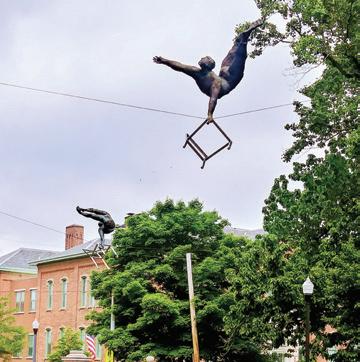
Dozens of breweries make up the Ale Trail, and participants can pick up passports to get stamped at each stop—with a limited-edition T-shirt going to those who visit all 34 before May 1, 2023. Just a few of the participating businesses include Land-Grant Brewing Company, Endeavor Brewing & Spirits, and the new spot Combustion Brewery Clintonville (which opens in June).
As for the Columbus Distillery Trail, people can visit spots such as Middle West Spirits, Watershed Distillery and Noble Cut Distillery, among others. Noble Cut Distillery (750 Cross Pointe Rd.;
https://noblecutdistillery.com/), which I had the pleasure of visiting, specializes in flavored limoncello (80 proof), flavored whiskeys (liked salted caramel) and vodka. All of the items I tasted were quite smooth—and, as a bonus for LGBTQ+ people, the distillery sports the Progressive Pride flag, a nod to founder Tony Guilfoy’s aunt. (CEO Shawn O’Reilly was an extremely knowledgable and genial host.)
A little shopping
No excursion is complete without at least a little shopping. Thankfully, Columbus offers a wide variety of shops—including many that are LGBTQ+-owned.
Two such shops are side by side in the Short North Arts District. Samson’s Men’s Emporium (772 N. High St.; https://samsonmensemporium. com/), run by the always smiling Travis Samson, feels like an issue of Esquire magazine that’s come to life. It offers timeless and refined men’s items that include leather, jewelry, shaving products, outerwear and even barware. Torso Menswear (772 N. High St.; https://torsomenswear. com/) offers items that whimsical, in-your-face fun and/or even naughty. Think Andrew Christian underwear, LGBTQ+-themed T-shirts and bars of soap that read “Gay Soap.”
One might not think of purchasing books while in Columbus—but I’m here to advise you to check out at least two spots. The Book Loft of German Village (631 S. 3rd St.; https://www. bookloft.com/) is a labyrinthine business that you could easily visit for an entire afternoon—in fact, it’s one of the country’s largest independent bookstores (with 32 rooms of bargain books, and they’re all new). The books cover almost every conceivable genre, including manga.
And then there’s Two Dollar Radio (1124 Parsons Ave.; https://twodollarradio.com/), which is substantially smaller than The Book Loft but is just as compelling. Owner Eric Obenauf would be the first to admit that the books in his store/vegan cafe aren’t for everyone—but if you’re in the market for literary jewels by underground writers, this is your spot. Two Dollar is an enticing busi-
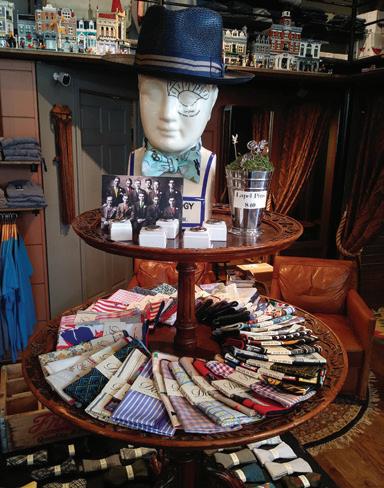
June 9, 2022 10 WINDY CITY TIMES
TRAVEL
Items at Samson for Men.
Aerial statues at Schiller Park. Photos by Andrew Davis
Charmy’s Persian Taste co-owner Rezi Haghiri (who runs it with wife Sherry Bayegan).
ness that’s as laid-back as Obenauf.
For those who are into vintage and even campy items, Flower Child (now at 233 E. 5th Ave.; http://flowerchildvintage.com/) is a must-visit shop. Actually, “shop” might give short shrift to this place, which has items spread over more than 30,000 square feet. Around every corner is more great vintage, hand-selected and displayed as it would have been when originally sold. Of fering clothes, jewelry, furniture, music, candy and even skin mags that span decades (1930s to the 1980s), Flower Child is a cool time-traveling experience. (By the way, there’s a felt-and-vinyl chair that I came so close to purchasing. To the purchaser: Treat it well.)
Otherworldly art
One of the most beguiling sites I visited in Columbus is far removed from downtown. Otherworld (5819 Chantry Dr.; https://otherworldohio. com/) is an immersive art experience that occu pies 30,000 square feet in a strip mall—and will probably be very popular on Halloween.
That’s because Otherworld bears a striking re semblance to various horror movies (including Resident Evil) as well as the Upside Down in the Netflix series Stranger Things. Then again, other aspects will take you to an electronic forest where you can almost see fairies hiding behind branch es. More than 40 creatives with backgrounds in programming, metalworking, animation, sculpt ing, digital fabrication, creative writing and oth er mediums have worked to put together biolu minescent dreamscapes. “Just be sure to touch everything,” a couple told a friend and myself. You should—your experience will definitely be enhanced.
Franklinton
One of the most intriguing neighborhoods in Columbus is Franklinton—and to stay it’s been transformed is an understatement.
Considered one of the more undesirable places to live/visit in the city, the area’s change hap pened in large part because of the efforts of former Mayor Michael B. Coleman (who ran the city from 1999 to 2016). A stone’s throw from
downtown, some of the highlights include the science museum COSI; businesses just as plant shop Jewel Weed and Body Beautiful (where one can take intimate portraits); and the Franklinton Arts District.

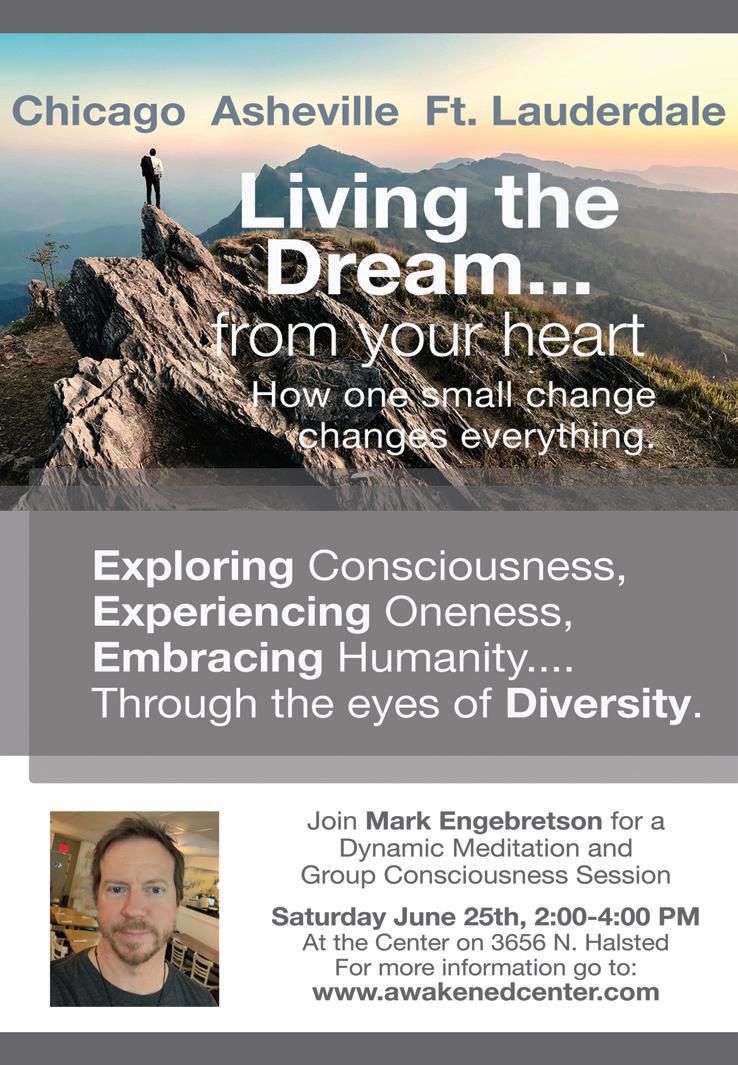
Another interesting site is the National Vet erans Memorial and Museum (300 W. Broad St.; https://nationalvmm.org/), which can be an emotional visit for many. Among the displays is the “The Twenty-Year Exhibition,” which shares the diverse experiences of Veterans who served during the Global War on Terror. Moving through the exhibits program, “Veterans Among Us,” there are 14 thematic alcoves highlighting key themes and moments in veterans’ journeys and incorporates personal stories. There’s also a Re membrance Gallery on the mezzanine level that is a space for reflection and recollection of those who made the ultimate sacrifice. (Unfortunately, there’s no part of the museum devoted to “Don’t Ask, Don’t Tell”—yet.)
Park it
Lastly, after ALL that, relax at a park. Schiller Park is a 23-acre municipal park in German Village—and it is the second oldest such spot in the city, after Goodale Park. While watching all the wildlife (mainly squirrels, ducks and Canada geese), take a gander (get it?) at the spectacular statues, aerial and otherwise, on loan by Polish artist Jerzy Kedziora.
Another cool spot to visit is John W. Galbreath Bicentennial Park, which features, among other things, a performing-arts stage and the Scioto Mile Fountain. While there, consider seeing Co lumbus another way—by kayak or paddleboard, courtesy of Windrose Outdoor (https://windro seoutdoor.com/).

Bicentennial Park is one of two dozen stops on the Columbus Outdoor Trails Pass. Explore beautiful spots like Indian Run Falls Park’s Emer ald Trail and Wolfe Park’s Alum Creek Trail.
As you can hopefully see, Columbus has so many options, inside and outdoors. Special thanks go to Weirick Communications and Experi ence Columbus for arranging this visit.
June 9, 2022 11 WINDY CITY TIMES
Hotel LeVeque.
Publicity photo
PAID FOR BY CITIZENS FOR SARA FEIGENHOLTZ
IMPORTANT FACTS FOR BIKTARVY®
MOST IMPORTANT INFORMATION ABOUT BIKTARVY
BIKTARVY may cause serious side e ects, including: Worsening of hepatitis B (HBV) infection. Your healthcare provider will test you for HBV. If you have both HIV-1 and HBV, your HBV may suddenly get worse if you stop taking BIKTARVY. Do not stop taking BIKTARVY without first talking to your healthcare provider, as they will need to check your health regularly for several months, and may give you HBV medicine.
ABOUT BIKTARVY
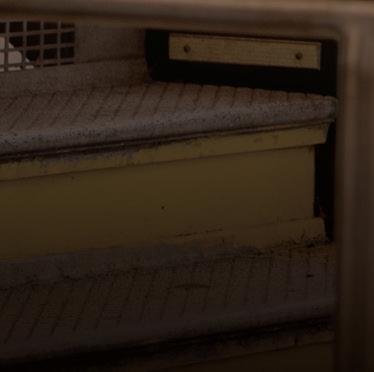
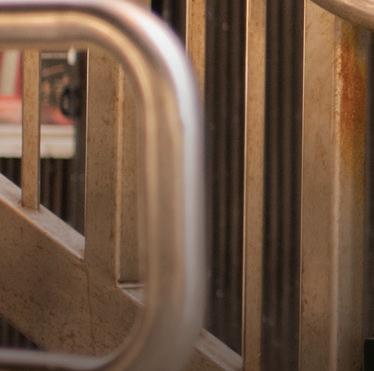
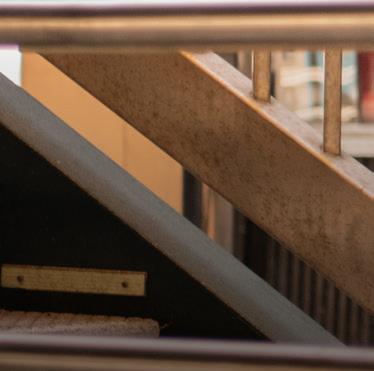
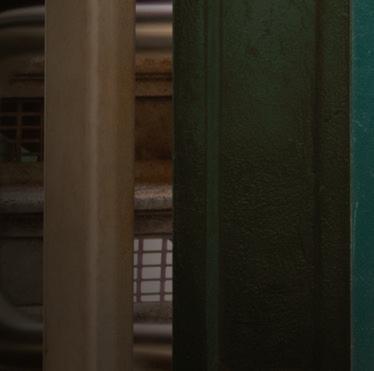
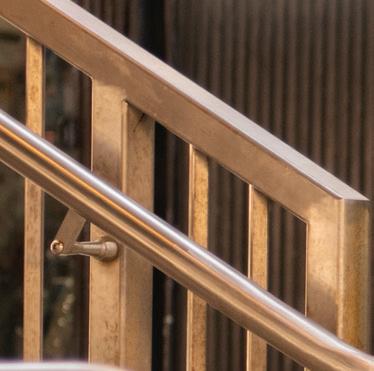
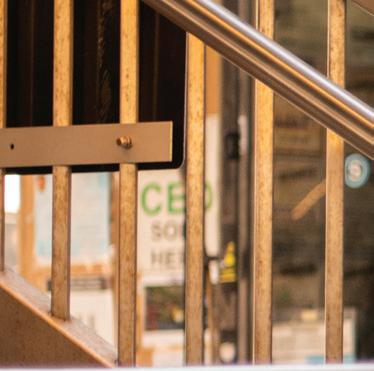
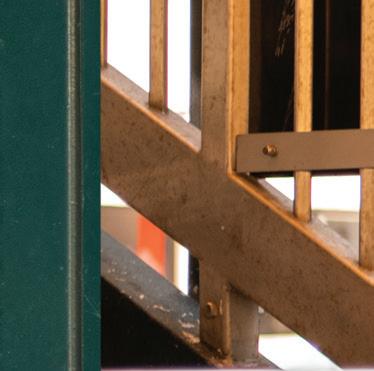
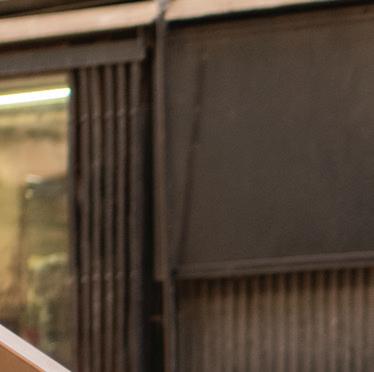
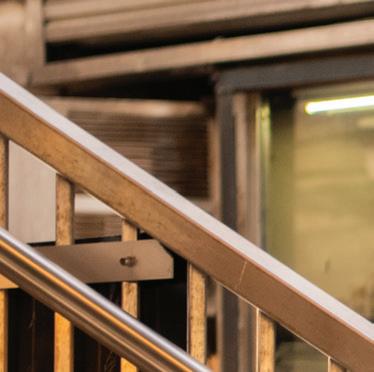


BIKTARVY is a complete, 1-pill, once-a-day prescription medicine used to treat HIV-1 in adults and children who weigh at least 55 pounds. It can either be used in people who have never taken HIV-1 medicines before, or people who are replacing their current HIV-1 medicines and whose healthcare provider determines they meet certain requirements.
BIKTARVY does not cure HIV-1 or AIDS. HIV-1 is the virus that causes AIDS.
Do NOT take BIKTARVY if you also take a medicine that contains: dofetilide rifampin any other medicines to treat HIV-1
BEFORE TAKING BIKTARVY
Tell your healthcare provider if you: Have or have had any kidney or liver problems, including hepatitis infection. Have any other health problems. Are pregnant or plan to become pregnant. It is not known if BIKTARVY can harm your unborn baby. Tell your healthcare provider if you become pregnant while taking BIKTARVY. Are breastfeeding (nursing) or plan to breastfeed. Do not breastfeed. HIV-1 can be passed to the baby in breast milk.
Tell your healthcare provider about all the medicines you take: Keep a list that includes all prescription and over-the-counter medicines, antacids, laxatives, vitamins, and herbal supplements, and show it to your healthcare provider and pharmacist.
BIKTARVY and other medicines may a ect each other. Ask your healthcare provider and pharmacist about medicines that interact with BIKTARVY, and ask if it is safe to take BIKTARVY with all your other medicines.
POSSIBLE SIDE EFFECTS OF BIKTARVY
BIKTARVY may cause serious side e ects, including:
Those in the “Most Important Information About BIKTARVY” section.
Changes in your immune system. Your immune system may get stronger and begin to fight infections that may have been hidden in your body. Tell your healthcare provider if you have any new symptoms after you start taking BIKTARVY.
Kidney problems, including kidney failure. Your healthcare provider should do blood and urine tests to check your kidneys. If you develop new or worse kidney problems, they may tell you to stop taking BIKTARVY.
Too much lactic acid in your blood (lactic acidosis), which is a serious but rare medical emergency that can lead to death. Tell your healthcare provider right away if you get these symptoms: weakness or being more tired than usual, unusual muscle pain, being short of breath or fast breathing, stomach pain with nausea and vomiting, cold or blue hands and feet, feel dizzy or lightheaded, or a fast or abnormal heartbeat.

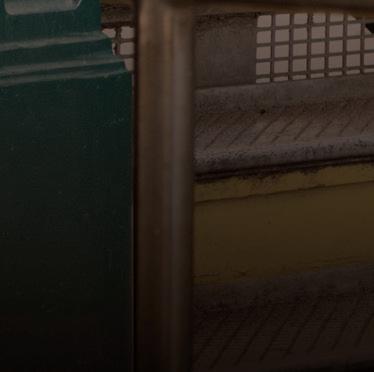

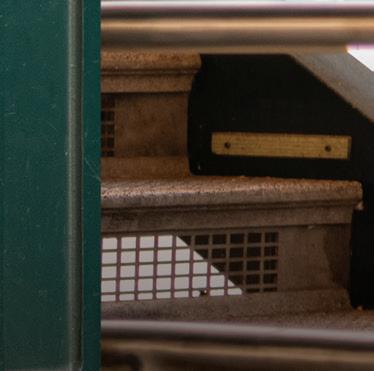
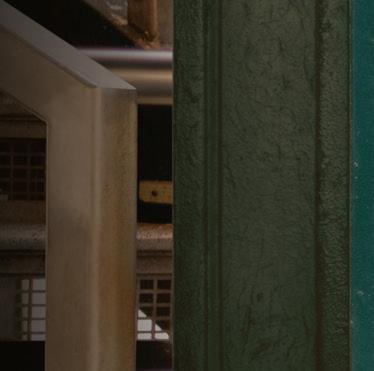
Severe liver problems, which in rare cases can lead to death. Tell your healthcare provider right away if you get these symptoms: skin or the white part of your eyes turns yellow, dark “tea-colored” urine, lightcolored stools, loss of appetite for several days or longer, nausea, or stomach-area pain.
The most common side e ects of BIKTARVY in clinical studies were diarrhea (6%), nausea (6%), and headache (5%).
These are not all the possible side e ects of BIKTARVY. Tell your healthcare provider right away if you have any new symptoms while taking BIKTARVY.
You are encouraged to report negative side e ects of prescription drugs to the FDA. Visit www.FDA.gov/medwatch or call 1-800-FDA-1088.
HOW TO TAKE BIKTARVY
GET MORE INFORMATION
June 9, 2022 12 WINDY CITY TIMES
Your healthcare provider will need to do tests to monitor your health before and during treatment with BIKTARVY.
Take BIKTARVY 1 time each day with or without food.
This is only a brief summary of important information about BIKTARVY. Talk to your healthcare provider or pharmacist to learn more. Go to BIKTARVY.com or call 1-800-GILEAD-5 If you need help paying for your medicine, visit BIKTARVY.com for program information.
is only a brief summary of important information about BIKTARVY and does not replace talking to your healthcare provider about your condition and your treatment. (bik-TAR-vee) BIKTARVY, the BIKTARVY Logo, GILEAD, the GILEAD Logo, GSI, and KEEP ASPIRING are trademarks of Gilead Sciences, Inc., or its related companies. Version date: February 2021 © 2022 Gilead Sciences, Inc. All rights reserved. US-BVYC-0085 02/22 US_BVYC_0085_BIKTARVY_B_9-75x9-875_WindyCityTimes-Dimitri_r1v1jl.indd All Pages
This

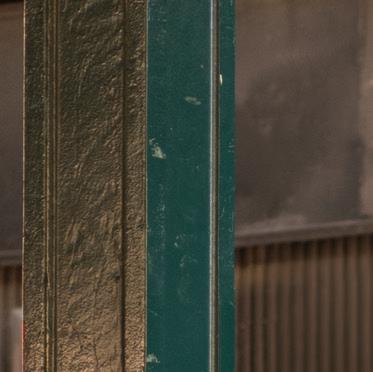


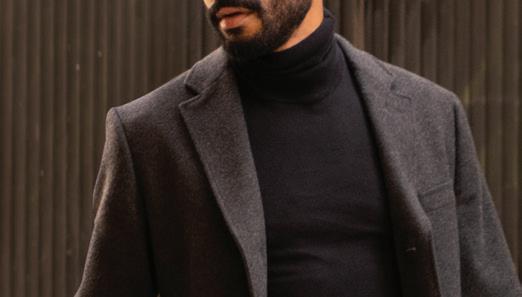
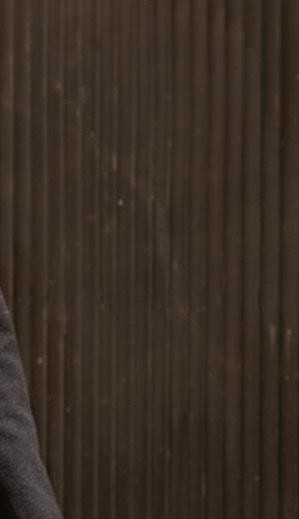

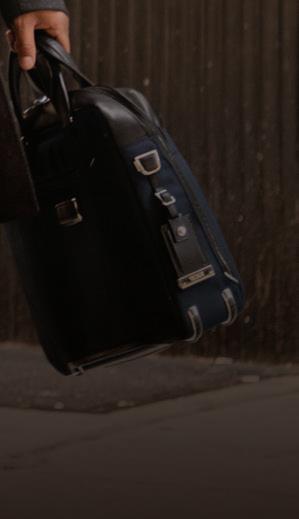
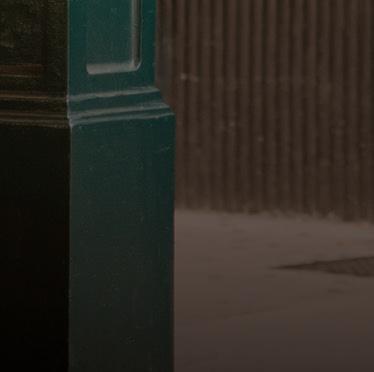
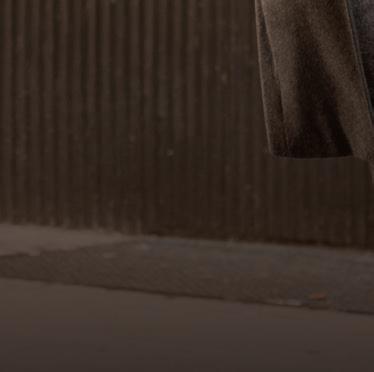





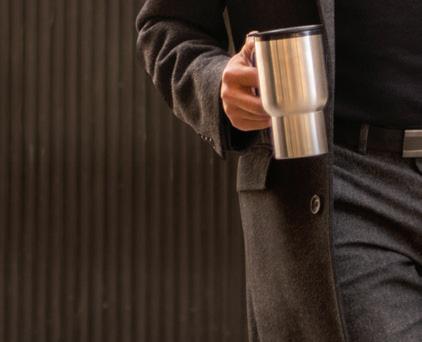


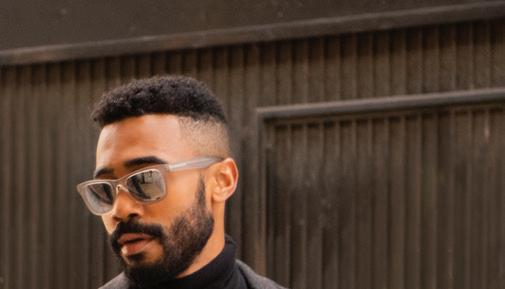





June 9, 2022 13 WINDY CITY TIMES KEEP ASPIRING. , 04/19/2019 through 05/28/2021. IQVIA NPA Weekly #1 PRESCRIBED HIV TREATMENT * BIKTARVY® is a complete, 1-pill, once-a-day prescription medicine used to treat HIV-1 in certain adults. BIKTARVY does not cure HIV-1 or AIDS. Ask your healthcare provider if BIKTARVY is right for you. Because HIV doesn’t change who you are. ONE SMALL PILL, ONCE A DAY Pill shown not actual size (15 mm x 8 mm) | Featured patient compensated by Gilead. Please see Important Facts about BIKTARVY, including important warnings, on the previous page and visit BIKTARVY.com. Scan to see Dimitri’s story. DIMITRI LIVING WITH HIV SINCE 2018 REAL BIKTARVY PATIENT 5/26/22 11:45 AM
Descanso is Palm Springs newest gay resort
A cantina offers complimentary snacks and beverages. For dinner, plenty of restaurants are within walking distance.
Many guests arrive by car, and those vehicles can remain parked throughout their stay in the off-street overnight parking the resort provides.
For those who prefer to mix their pool time with sightseeing, there’s plenty to see and do in Palm Springs, and the resort lies just two blocks from the beginning of the city’s commercial area.
Palm Springs. This portion of the Mojave Desert ecosystem features the spiky Joshua trees, boulders and a surprising variety of wildlife in this desert habitat.
If you’re looking for museums, Palm Springs has one of the country’s top air and space museums as well as an art museum that’s quite good.
the event.

Next year’s Palm Springs International Film Festival takes place Jan. 4-15. It is one of the largest in North America, attracting 135,000 people.
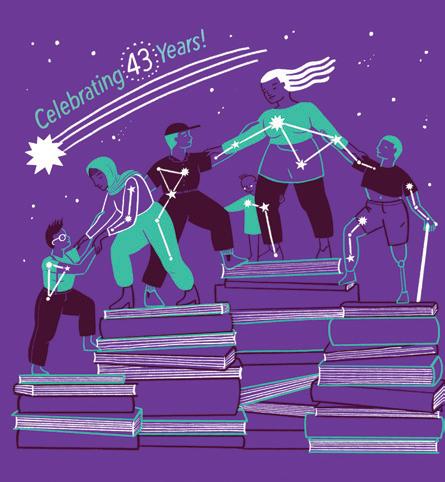
Many Descanso guests just remain on property during their stay, enjoying the resort experience and walking or Ubering to nearby restaurants for dinner, Taylor said. On its website, staff’s picks of favorite restaurants include something for everyone.

Fisherman’s Market, located downtown, is recommended as “Definitely a great place for fish and chips, grilled seafood.” In the desert.
BY DAVID TAFFET | DALLAS VOICE COURTESY NATIONAL LGBT MEDIA ASSOCIATION










Descanso is the first resort for gay men to open in Palm Springs in more than 10 years, and “The response has been beyond expectations,” said general manager Kent Taylor. Weekends are already booked through June, although some weeknights are still available during Pride month.
Taylor said the trend among the areas gay resorts in recent years has been to go straight, and his property was one of the first to do so. Formerly called East Canyon, it lasted as a straight resort for about four years.
Now, however, the property has been completely renovated and has re-opened with amenities “to create a special men’s experience,” Taylor said. Currently the resort features 14 rooms, but two more will come online once they’ve been refurbished to Descanso standards.
Rooms feature king-size beds. There is a heated salt water pool with spa. For relief from the heat, an outdoor misting system moderates the temperature. Breakfast and “stay and splash poolside lunch” are included with the room rates.

First on the list for anyone from the flatlands of Texas has to be the aerial tramway. Get a fantastic view of the Coachella Valley from 8,500 feet high in the sky. When you reach the top, you can enjoy the trails and hiking as well as a restaurant, bar and cafeteria.
For zoo lovers, Taylor said, the 1,200-acre Living Desert is ranked among the top 10 in the U.S. Visiting in summer when the temperature in Palm Springs often soars over 100 during the day? Visit the Living Desert for a night walk for a nocturnal zoo experience.
Palm Springs is known for its mid-century modern architecture and its variety of stores that feature furniture from that period. To tour the neighborhoods, Taylor said the best way is by bike, which Descanso offers complimentary to its guests.
Palm Springs is known as a celebrity hangout and hideaway. Stars have lived in this desert resort and others have been frequent visitors since the 1920s. Sonny Bono served as the city’s mayor. To honor them, The Palm Springs Walk of Stars features blocks of sidewalk stars including one for Dallas favorite Del Shores (Sordid Lives) at 538 N. Palm Canyon Drive.
Joshua Tree National Park is an hour drive from
Palm Springs recently saw the 2020 version of its biggest gay event, The White Party, the granddaddy of circuit parties. Palm Springs’ Pride weekend is held during cooler weather; this year it’s scheduled for Nov. 3-6. Leather Pride Weekend is Oct. 27-30, and Western Exposure’s Dadfest celebrates daddies on July 4. Descanso recommends the all-day pool party as the best way to enjoy
Al Dente and Il Corso are staff picks for Italian food. Jake’s is an American bistro. Johannes is a “local favorite” for modern European cuisine from an Austrian-born chef.
The Sandwich Spot offers “fun concept sandwiches. Not your standard sub shop.”
A number of Mexican offerings include La Bonita’s, Rio Azul Mexican Bar & Grill, home to Palm Springs original drag brunch, and La Tablita in neighboring Cathedral City, which is listed as “absolutely a local favorite.”
June 9, 2022 14 WINDY CITY TIMES
TRAVEL
The luxury property s t e rst to o a in the city in more t a a de ade The pool at Descanso. Courtesy of National LGBT Media Association LGBTQ+ Apparel & Gifts Wishing you and yours a happy Pride 2022 etsy.com/shop/PrideBlossoms Support Your Local Feminist Bookstore 11 a.m. to 6 p.m. Tuesday through Sunday or shop online 24/7 at WomenandChildrenFirst.com 5233 N. Clark Chicago, IL 60640 (773) 769-9299 womenandchildrenfirst.com Artwork by Molly Costello
Excellence is for everyone.
Leaders in LGBTQ+ care
Here at A irm: The RUSH Center for Gender, Sexuality and Reproductive Health, we are proud to provide state-of-the-art, a irming care to our LGBTQ+ community — especially in challenging and uncertain times. Our team works across our health system to build culturally competent care, ensuring the needs of our LGBTQ+ patients are met and ensuring everyone receives the high-quality, nationally-recognized care RUSH is known for.
Services we provide include the following:
• Gender-a irming clinical specialties:
– Primary care for adults, adolescents and children
– Endocrinology
Gender-a irming hormones
– Gender-a irming surgery
• Specialty care including oncology, orthopedics and neurology
• Voice/vocal services
• Pelvic floor therapy
• Obstetrics and gynecology services (including cervical cancer screening)
• Reproductive health and fertility services
• HIV care
• Behavioral health
To learn more about A irm and LGBTQ+ care at RUSH, please call (833) 624-5428 or visit rush.edu/a irm.
Telemedicine and virtual visits available
June 9, 2022 15 WINDY CITY TIMES


June 9, 2022 16 WINDY CITY TIMES June 9, 2022 17 WINDY CITY TIMES
I had a trip to Texas planned prior to the intro duction of the anti-transgender bills in state Con gress. I considered cancelling the trip complete ly, however I realized that there are thousands of LGBTQ people living in the state who would be negatively affected by boycotts and travel cancellations, so I decided to forge ahead. Texas is a red state with multiple blue dots including Austin, Houston, Dallas, and others.
I started my road trip in Dallas, a place I have visited multiple times before for business. Dallas is a fun city with a thriving LGBTQ culture. The city’s nightlife is centered around the Oak Lawn neighborhood and its main thoroughfare Cedar Springs Road. Dozens of LGBTQ-owned shops, restaurants, salons, and bars line the street giv ing locals and tourists a variety of options to choose from.
Don’t party too hard because we are about to hit the road and venture to Palestine, Texas, a town located about 2 hours away. Upon arrival, it doesn’t seem like much, but as you explore the East Texas town you begin to notice its charm and appeal. Many coupled LGBTQ families are re locating from Dallas—or buying second homes here—because of its proximity to lakes and nat ural wonders.
One such park is Davey Dogwood Park. The 254-acre park is open year-round and offers eight miles of hiking trails. I was a bit early to see the bloom of the beautiful dogwood trees, but I heard it is quite a remarkable sight. I was visiting during the Texas Dogwood Trails Celebration and Davey Dogwood Park was the centerpiece for one of the key components of the festival, the Fairy Garden Trails. Dozens of locals recreate miniature fairy lands throughout the park for guests to view. I can honestly say this is the first time I’ve ever seen such a display.

After your morning hike, head to Shep’s Bar-B-Q (1013 E. Palestine Ave; https:// www.facebook.com/Sheps-Bar-B-Q-Cater ing-121415241202296/), a favorite among the Palestine locals. The family-owned business has created quite a name in the town, so expect a long line when you arrive to the restaurant. It doesn’t look like much from the outside, but once you taste the food, you’ll realize why it has be come so popular.
Spend the night at the historic Redlands Hotel (400 N. Queen St.; https://theredland shotel.com/), located in the heart of Palestine. The property was built in 1914 and features 20 unique suites. I stayed in a fabulous corner suite which reminded me of boutique hotels in South Beach. The modern room featured white linens with pops of color. There is also an art gallery located in the lobby which features works from East Texas artists including Stacy Campbell and Cecilia Bramhall. I acquired works from both of those artists during my stay.
After breakfast head to Oxbow Bakery (215 E. Crawford St.; http://www.oxbowpies.com/) for a slice of their world-famous pies. It’s never too early for pie, especially when they have been voted one of the ‘South’s Best Pies’ by Southern Living Magazine.
Walk off your pie during a visit to the East Tex as Arboretum & Botanical Society (1601 Pat terson Rd. Athens, Texas; https://www.easttexas
TRAVEL
Rolling into TEXAS
Palestine—just a hop, skip and a jump from Dallas—offers a blue dot of smalltown charm
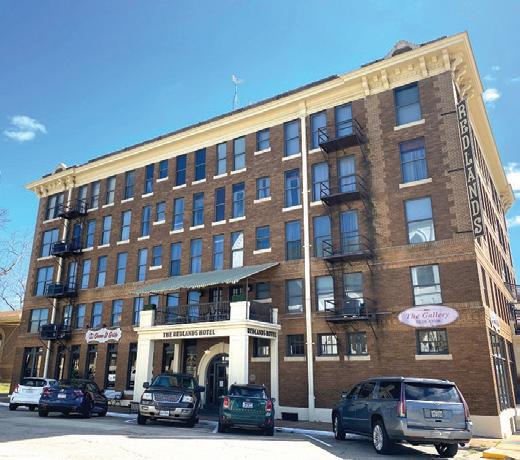 BY JOEY AMATO
BY JOEY AMATO
arboretum.org/), about a 20-minute drive from Palestine. Enjoy two miles of hiking trails, live (enclosed) honeybees and the historic Wofford House Museum, the oldest home in Henderson County, built in 1850. The arboretum is dedicat ed to the preservation of the natural environment and the creation of formal and informal plant col lections.
Not too far away is Oh My Goat (214 ACR 469; https://www.ohmygoatyoga.com/), a fam ily-owned farm offering goat yoga. I had been anxiously awaiting this the entire trip as I had never done goat yoga before. I was expecting two, maybe three goats interacting with me as I performed yoga poses, but as we settled on our mats, the owners opened the gates, a herd of goats swarmed the pen. They were so cute and curious, each with a unique personality. The baby goats were my favorite of course. They were so inquisitive and friendly. At one point, I had four goats laying on my mat. It made it difficult to focus on my yoga form, but I didn’t care. Oh My Goat also features a cute shop where people can purchase t-shirts to remember this memorable experience.
Head back to the Redlands Hotel for a quick wardrobe change before dinner. You can visit any one of numerous restaurants located throughout the town, or if you are tired from playing with the goats, try the hotel’s restaurant, Queen St Grille (https://queenstgrille.com/). The causal fine dining restaurant has been voted one of the best in the city and features a variety of southern favorites at a moderate price point. Most of the entrees are under $30 so feel free to indulge!
Palestine is also famous for its railroad history. Train enthusiasts will love taking a ride on the Texas State Railroad (789 Park Road 70; https:// texasstaterailroad.net/). Book your adventure well in advance because this experience is typ ically sold out during the spring when the dog wood trees are in full bloom.
Don’t expect to see many rainbow flags in this part of Texas as it is quite conservative. However, the people are friendly and welcoming, so if you like exploring small towns, then a weekend visit to Palestine should be on your radar.
Enjoy the journey!

June 9, 2022 18 WINDY CITY TIMES
Above: Joey Amato and the goats of Oh My Goat. Left: A dogwood blossom, as could be found at Davey Dogwood Park. Right: The Redlands Hotel. Courtesy of Amato





















































June 9, 2022 19 WINDY CITY TIMES @CDCHIV • @StartTalkingHIV @CDC_HIV @StopHIVTogether • @StartTalkingHIV LEARN MORE AT CDC.GOV/STOPHIVTOGETHER Prevent HIV with pride. There are many options to prevent HIV. Choose the method that works for you.
CHICAGO HISTORY MUSEUM
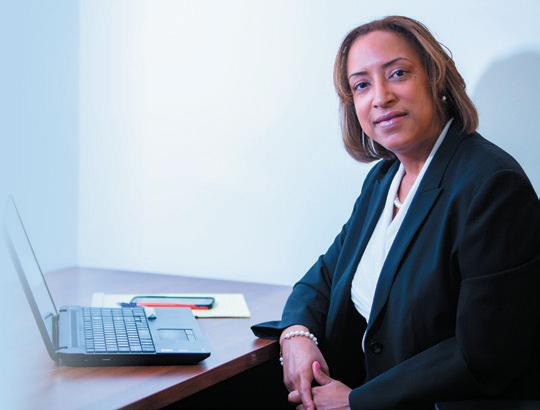
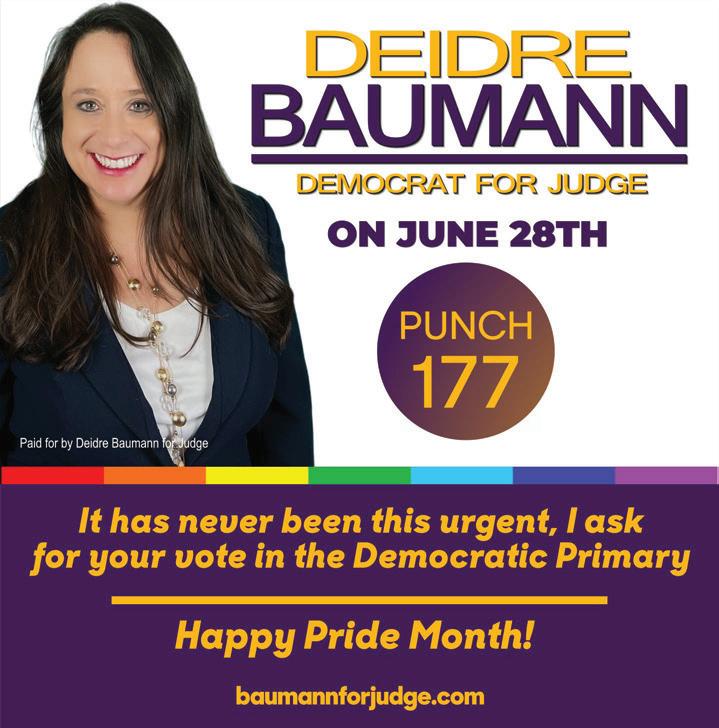








JUNE 23, 2022 | 5:30–8:30 P.M.
Over the past four decades, many individuals and organizations have worked to support the fight to end HIV/AIDS, as well as provide resources and care for the estimated 38 million people living with HIV and 36.3 million individuals worldwide who have died from complications related to the virus. In honor of the city of Chicago designating 2022 as the “Year of Chicago Dance,” we invite you to reflect on the history of HIV/AIDS in Chicago, the dance community’s efforts to provide support to those impacted by the epidemic, and the future of HIV/AIDS advocacy in Chicago and beyond. The event includes a dance performance, panel discussion, and reception. PREMIUM ADMISSION | $35 includes signed copy of Plague Years: A Doctor’s Journey Through the AIDS Crisis by Dr. Ross A. Slotten GENERAL ADMISSION | $15 REDUCED ADMISSION | $5 Youth (18 & under) and Seniors (65+) LEARN MORE AND PURCHASE TICKETS AT CHICAGOHISTORY.ORG/OUT | #OUTATCHM This event is made possible thanks to the support of the Chicago History Museum, the OUT at CHM advisory committee, AIDS Foundation Chicago, Chicago Dancers United/Dance for Life, Howard Brown Health, Center on Halsted, Giordano Dance Chicago, and Chicago Dance History Project. DANCING FOR LIFE MOVING THROUGH HIV/AIDS June 9, 2022 20 WINDY CITY TIMES
Here comes the sun Chicago theater blooms outside and out of town
BY MARY SHEN BARNIDGE
Chicago Shakespeare Theater is keeping its show docked at its Navy Pier facility and Oak Brook’s First Folio Theatre is taking the summer off before re-commencing in the fall, but playgoers eager to swap the urban concrete for wide-open greenery can still find opportunities for scenic road/Metra excursions, fresh-air picnics and entertainment under starry skies.
A Midsummer Night’s Dream, Midsommer Flight, July 15-Aug. 21. Lovers and pixies and clowns romp Shakespeare’s Athenian forests in Chicago parks on the North, South and West sides this summer. Details: MidsommerFlight.com
The Winter’s Tale, Oak Park Festival Theatre at Austin Gardens in Oak Park, July 16-Aug. 20. A tale begun in winter needs a happy ending in a summery setting (after a BEAR chase) and Shake speare provides us both. Details: OakParkFestival. com
Midsummer Mayhem: Mad World, Shake speare’s Motley Crew, July 30-Aug. 28. The merry rag-tag rascals of Ravenswood’s Independence and Winnemac Parks present their annual show
case, this year featuring favorite looney scenes from Shakespeare and his contemporaries. De tails: SMCplays.com
Pearl’s Rollin With the Blues, Writers Theatre in Glencoe, June 23-July 24. Whenever you see the names of diva Felicia P. Fields and director Ron OJ Parsons on the same playbill, good times and splendiferous music are guaranteed. Details: WritersTheatre.org
Dear Jack, Dear Louise, Northlight Theatre in Skokie, July 7-Aug. 7. What could be more ro mantic than a pair of lonely “pen-pals”—one, a doctor in the army and the other, an aspiring ac tress in New York City—conducting pre-Facebook trysts during World War II? Details: Northlight. org
Zorro: The Musical, Music Theater Works, Aug. 11-21. Spiderman, Superman and the Scarlet Pimpernel all have their own musicals, so why has it taken so long for someone to write some swashbuckling songs for this Latino-American masked crusader? Details: MusicTheaterWorks. com
Home, Fleetwood-Jourdain Theatre at the Noyes Arts Center in Evanston, June 5-19. Samm-Art Williams’ 1978 play (presented by Tim Rhoze as an old-fashioned “tent show”) recounts the re-assimilation struggles of a Black draft-evader in a society still reeling from the recent wars at home and abroad. Details: FJtheatre.com. Photo by Kara Rose borough


Hand to God, Paramount Theatre Produc tions at the Copley Theatre in Aurora, June 1-July 10. Richard Askins’ searing criticism of religious dogma and teenage angst car ried to extremes does for fuzzy sock-puppets what Stephen King did for clowns. Details: ParamountAurora.com. Below: Hand to God’s Jessica (Felicia Oduh). Photo by Amy Nelson
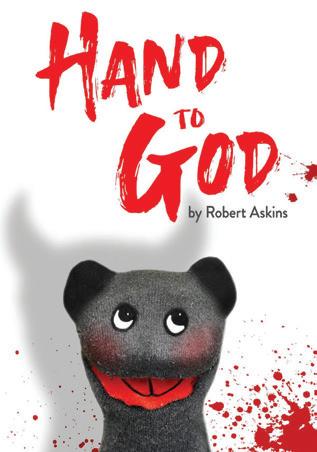
June 9, 2022 21 WINDY CITY TIMES
TRAVEL
PAID FOR BY BRAD TROWBRIDGE FOR JUDGE
THEATER
The road back Silk Road co-founders talk about journey from medical setback
BY ANDREW PIRROTTA

Malik Gillani co-founded Silk Road Rising—a theater company focused on sharing the life stories of the overlooked and underrepresented people living along the Silk Road in Asia and the Middle East—with his husband, Jamil Khoury, almost 20 years ago.
Two years ago, Gillani suffered a debilitating stroke that left him with aphasia, the loss of ability to express speech. This traumatic event has forced him to spend these last two years diligently working to regain crucial functions through the help of speech therapists as well Khoury and his own unshakable spirit of positivity.

Windy City Times spoke with Gilliani and Khoury.

Windy City Times: With aphasia being in the news with such a big name as Bruce Willis having the disease, it seems that there is a lot of misinformation regarding the forms this disease takes. Can you speak about what the main thing you believe people should know about aphasia?



Malik Gillani: Reading, writing and talking.

Jamil Khoury: It is important to note that there are different types of aphasia.
Most aphasias tend to be a result of a stroke, traumatic brain injury, or an aneurysm. … Depending on how the language center is affected by the stroke, it can manifest in different ways. The form of aphasia Malik has is called Broca’s
aphasia. [It’s a] non-fluent aphasia, so he has all of his comprehension. He understands everything. His cognitive abilities and memories were not impaired. The problem is finding the words.



He also has a condition called apraxia, which is a speech disorder. Apraxia is making the sounds that produce the words. [With] Bruce Willis, everyone is grateful that he has come forward with his story, because so few people know about aphasia; we did not know the word prior to Malik’s stroke.
We believe [Willis] has a condition called primary progressive aphasia, which is not stroke-induced. Primary Progressive aphasia is more akin to Alzheimer’s or dementia. … His family has not yet confirmed that, so we are just speculating. With primary progressive aphasia, it is a downward trajectory, while Malik’s form of aphasia you can work to restore those abilities.

WCT: How has this [condition] influenced the art you make and the way you make it?

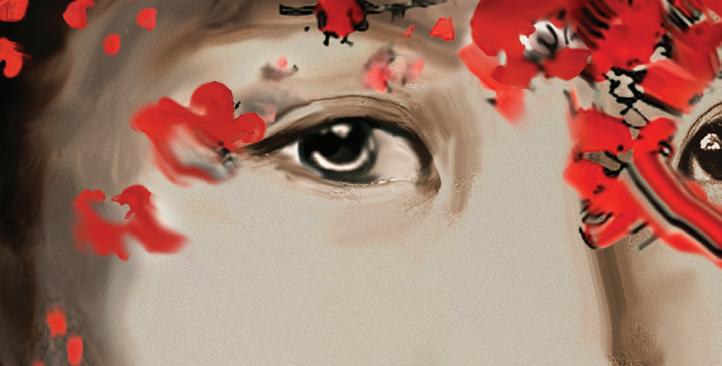
JK: Malik has spent a good many years—18 years prior to the stroke—fighting to give people a voice and create space for voices that weren’t being heard; now, he is without a voice. He has quite literally lost his voice. He is working to recover language, and to recover his voice. So we see a parallel between the struggles that Silk Road Rising has tried to address—which has to do with people who have been excluded from the American story—and now the challenges that people with aphasia face to be understood.
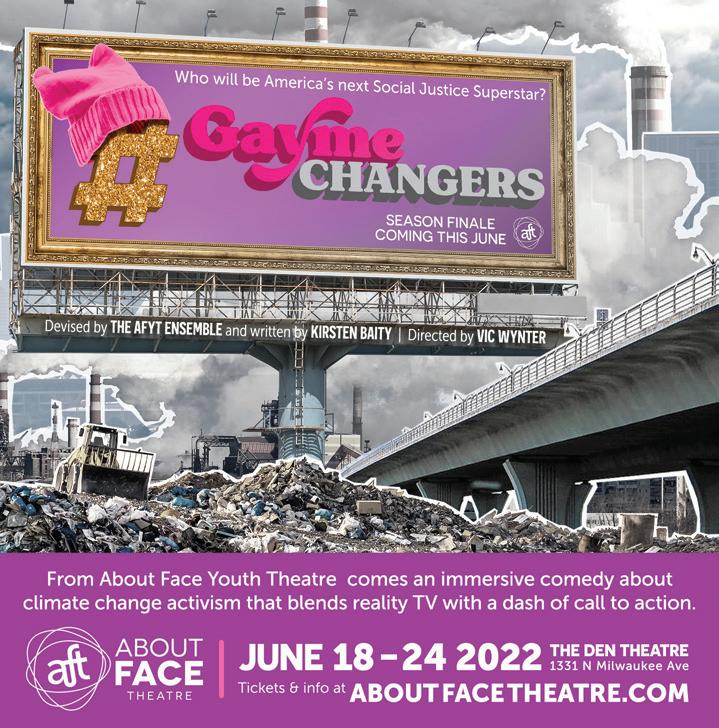
June 9, 2022 22 WINDY CITY TIMES
Turn to page 26
NOW PLAYING THROUGH JUNE 18 at Theater Wit, 1229 W. Belmont Ave, Chicago 773.281.8463 timelinetheatre.com CHICAGO PREMIERE
Silk Road Rising co-founders and spouses Jamil Khoury (left) and Malik Gillani. Photo courtesy of Silk Road Rising
BY LLOYD SUH DIRECTED BY HELEN YOUNG

June 9, 2022 23 WINDY CITY TIMES
‘The Meaning of Pride’
Artist Sam Kirk illustrates new book
BY ANDREW DAVIS
In the children’s book The Meaning of Pride, Ros iee Thor pens an ode to LGBTQ+ culture and iden tity by celebrating the beauty, significance and many dimensions of the concept of Pride—and showing that the word can mean many different things to people.
Award-winning artist Sam Kirk—a biracial, queer woman born and raised in Chicago—played a crucial part in the book by providing the vibrant illustrations of various icons. She also had a hand in deciding who would be included in The Mean ing of Pride.
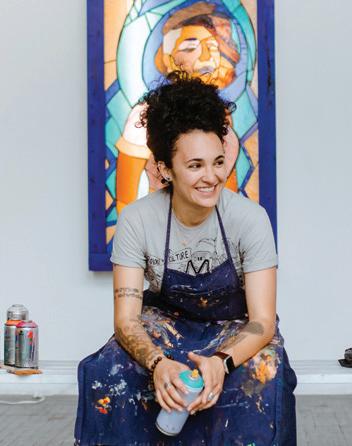
Recently, Kirk talked with Windy City Times about the book, changes within herself—and, of course, pride.
Windy City Times: This is such a cool book. Even though it’s primarily geared toward kids, it would seem that adults could benefit from reading this, too.
Sam Kirk: Yeah, I think it’s definitely a book for all ages, as it includes history. Also, I’d say with coming out and exploring identity—the ways we go about doing those things can happen
BOOKS
at all ages. I speak from experience. [Laughs]
WCT: I didn’t know all of the figures in this book, although I recognized about 95 percent of them. If I’m with an LGBTQ+ media outlet and didn’t know all of them, I think most others could learn from the book. And I appreci ated there are biographies of those people at the end of the book.
SK: Yeah, I really appreciated that, too. And I’m sure you recognized some Chicago people… [Laughs]
WCT: Like Shea Coulee…
SK: Yes! There are Shea Coulee, Fawzia Mirza, Mercedes [Santos] and Theresa [Volpe]… We sur prised [Mercedes and Theresa] and showed them the book. They had no idea they were in the book. They were absolutely shocked! [Laughs] Their youngest son actually took the book to school the next day to share with his classmates and it was read out loud at the library.
WCT: That’s really sweet. Tell me how the collaboration came about with Rosiee.
SK: Sure. In 2019, the team at [HarperCollins imprint] Versify reached out to find out if I was even interested in illustrating a children’s book. Until this point, I had illustrated covers and done
Gayla Turner talks about uncovering her grandmother’s secret queer identity
BY CARRIE MAXWELL
In Gayla Turner’s debut book, Don’t You Dare: Un covering Lost Love, she reveals her Grandmother Ruby’s (1896-1977) century-old secret queer identity that she hid from the wider world. This revelation became clear to Turner when she saw Ruby and another woman named Ella (who was dressed as the groom) in a June 8, 1915 wedding photo.
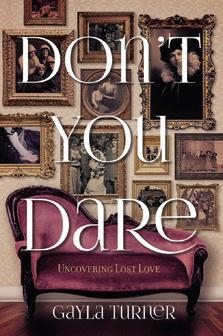
“When I found my grandmother’s photos, I knew they were important to me,” said Turner when asked why she decided to tell her grand mother’s story. “However, it was not until I start ed putting the pieces together that I realized how important the pictures and story were to our LGBTQ+ history. Initially, the story was only going to be about my Grandma Ruby. However, as I researched her past, a bigger story started
forming that needed to be told. Her photos and captions tell a story. They are funny, witty, beau tiful, and loving—unlike the typical stoic photos taken back then. The pictures were not just one event; instead, they depicted a series of events that involved a substantial group of people.
“I often think about how difficult it must have been for them. Even keeping the photos was very dangerous. If anyone outside the circle of friends found out how deep their relationships really were, everything would change. They could be forced to marry a man their parents selected, run out of town, put into a mental institution or physically attacked.”
The book moves between Turner’s discovery of those photos and the story they told alongside her research process that brought her to rural Amherst, Wisconsin, where her grandmother grew
some things for magazines, but I had never done a cover-to-cover piece. And I usually shy away from that because the idea of drawing the same character over and over never really [appealed] to me. But since this involved so many different figures and characters and because the focus was on Pride, I said, “Yes, absolutely.”
I think even if it was the same character, I would’ve been interested just because of the op portunity to create a children’s book. I came out in the late ‘90s as a teenager. I wonder how much my life would change if I had a book like this back then. It’s really meaningful to do this.
WCT: Was there a figure that was harder to draw than the others?
SK: It’s always harder to draw actual people because you have to capture their likenesses. Also, I want to make sure I capture that person’s energy because that’s what brings it to life. I spent quite a bit of time researching and looking at video clips of the different individuals to see how they expressed themselves.
With the other images, I could play with the body language differently. It’s easier to do when it’s an interpretation versus an actual person.
WCT: Some of the groupings of people are quite interesting. For example, Frida Kahlo is paired with Laverne Cox. How did that one come about?
SK: The book was definitely a collaboration, and I definitely received suggestions about who they wanted to include. The way that went about is that I asked if I could give feedback about the notes, and they said, “Yes.” I went through the
script and illustration suggestions—and actually replaced quite a few people and suggested new people.
There are quite a few POC individuals who were not included in the initial notes. That was part of my participation to make sure representation across many cultures was included. I was focused on who was represented in the book and where they showed up.
up.
While researching, Turner approached it much like she would do a large work project. Turner is a bank examiner by day and that entails evaluat ing and inquiring about financial information to make sure banks comply with the rules.
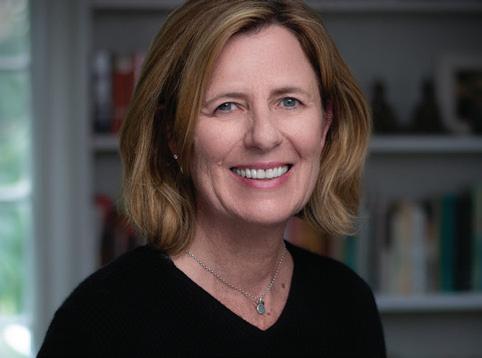
Turner’s true passions lie in the creative world and that includes playing guitar and piano. She got a music degree in college and later wrote and played music in local Los Angeles bands in the
early ‘80s. When Turner could not afford to pay the rent with music gigs alone she got a job at a credit union and that has led to a 30 year career in the banking world. Turner said a part of her wished she had stuck it out in the music world. Writing this book has enabled Turner to use both her creative and analytical skills at the same time.
At first Turner looked online but she quickly re alized that this would be a more difficult process
June 9, 2022 24 WINDY CITY TIMES
BOOKS
Artist Sam Kirk. Photo by Tamara Hijazi
Left: Author Gayla Turner. Right. Cover of Turner’s book, Don’t You Dare. Turner photo by Paco Silva
WCT: There are so many people to choose from to include in this book. For example, in the music section, there could’ve been Sylves ter or George Michael.
SK: So, for the music portion, I actually did change quite a [few of the people]. There were Elton John, Sam Smith and several other folks, but Ricky Martin and Janelle Monae were not originally included. So when I was looking at that portion, I was thinking, “Who else can we include to represent different ethnicities?” I also wanted to make sure different generations were represented.
Also, we had [original Star Wars actor] Billy Dee Williams in the book—but then took him out because, in my research, I discovered several statements from him denying he was part of the LGBTQ community. [Note: In 2019, Williams told Esquire, “And you see I say ‘himself’ and ‘herself,’ because I also see myself as feminine as well as masculine.” NBC News noted that he later walked back those comments, telling The Undefeated he “was talking about men getting in touch with the female side of themselves.”]
But there were some really wonderful things I’m glad we caught before the book went to print, like Elliot Page transitioning.
WCT: So I have to ask: What does pride mean to you?


SK: Well, pride represents freedom to me— freedom to express exactly who you are and be 100-percent comfortable in your own skin. That’s really the goal of my work: to create pieces that help people to feel proud of who they are. Even in
that required outside help. This included hiring a writing coach, joining a writing group and be coming a Wisconsin Historical Society member.
“It turned out to be a 10-year project, and I still feel like I am beginning to understand and trust the writing process,” said Turner. “I traveled to Amherst a couple of times because I had a deep need to see, in person, the house where my grandmother lived and to walk the streets she had walked. Most importantly, I felt I needed to breathe the air and smell the ground where every thing happened.”
Although Turner is not an academically trained historian, she became passionate about LGBTQ+ history while researching for this book but what she found was there is scant information docu menting that history.
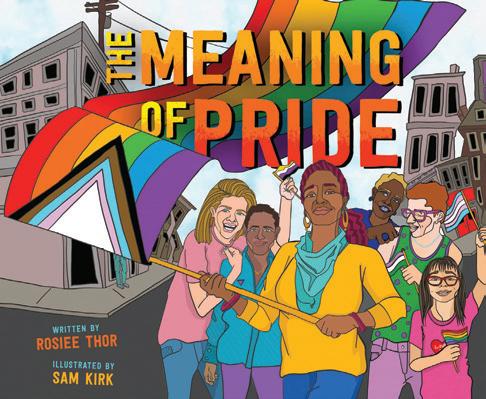
“I hit many roadblocks along the way,” said Turner. “The funny thing is, every time I thought I could not move forward in the story, informa tion I did not see before would be revealed to me. I began expecting the roadblocks and always thanked Grandma Ruby for supplying me with the right hint when I needed it most.”
Turner decided to combine the facts she was able to uncover via multiple resources together with her “own interpretation of events” to tell Ruby’s story. She said it felt very “organic” to her to do it this way because if she only wrote about the facts the book would be too clinical.
“I have always thought of it as a love sto ry,” said Turner. “I often thought about what my grandmother and others were doing right before a photo was taken. And at times, it felt as if I was
my public works and murals, I try to push [bound aries] and reflect ourselves in those pieces. That’s probably my biggest challenge as an artist.
WCT: This book is geared toward kids. Of course, there are areas in this country where this book won’t be allowed. What’s your re sponse to that?
SK: I don’t understand how we’re going to be more united and see what that will look like if we continue to have this exclusion of people. It’s sad because, for a while, it felt like we were progress ing and moving forward.
WCT: I’ve asked a variety of people this question: With the pandemic and the racial


awakening, we’ve all time to self-reflect. What have you learned about yourself these past two years?
SK: Oooh—that’s a good question. If you had seen me before the pandemic, my hair was very big and long. I’ve gone through yet another round of exploring my identity—and I didn’t re alize how much I was using my hair as a way of hiding. This is another new journey, and it feels good. It’s such a simple thing but it allows me to be creative. And my wife is always saying, “Wear colors and some patterns.” [Laughs] And I think my personal stories will start to show more in my work.
right there with them. I want the reader to feel and/or understand what it may have been like to be queer a hundred years ago.”
Among Turner’s findings was a secret lesbian social club led by a local businesswoman named Cora who threw parties for her fellow queer wom en and their allies at her home. Women from as far as Chicago would travel by train to these gatherings. Turner writes that the locals thought these parties were held so women could strate gize ways to find husbands.
“Little did they know, finding a man was not a subject of their conversations,” said Turner.
Turner also discovered that the women who wore gentleman’s attire like Ella would be called chums or pals in Ruby’s photo captions.
In terms of the wedding photos, Turner real ized that Ruby’s younger brother Leroy and an other man she named Wallace (since she was nev er able to find out his real name) were in some of the pictures. Due to what Wallace was wearing, Turner surmised Wallace must have been a farm hand for Ruby’s family and was an unwitting wit ness along with Leroy to Ruby and Ella’s wedding ceremony.
Turner believes her grandmother would be “thrilled” to see her story told if she were alive today.
“I am sure she never imagined a time when she could have legally wed the person she loved,” said Turner.
Turner also gives readers a history lesson on the National Purity Party that existed when Ruby was coming of age and how there are organiza

tions and people today who also want to harm marginalized communities and women in general.
“It is not lost on me that I have written a book that might very well join the list of books banned across the country. That makes it all the more important that I tell my story and the stories of my grandmother and her brave friends who dared to live and love as their hearts led them in a ru ral community in the Midwest one hundred years ago.”
Turner told Windy City Times that she has al ways been fine with her own lesbian identity. The problem was other people in her life including her mother who asked her, “How did it happen?” She said being a lesbian in Los Angeles is “vastly easier” than in other parts of the United States.
“This book was written to entertain and edu cate people,” said Turner. “Stories like my grand mother’s can help people understand that love is love and that we have every right to be here and to live full lives. In fact, we have always done so like flowers that grow up through cracks in the pavement. Just imagine what we can do when we are nurtured and given the same space and acceptance to grow like anyone else.”
Turner also emphasized that “representation matters” and the importance of learning about LGBTQ+ history to “understand who we are and our vital role in society.” She added that nonLGBTQ+ individuals need to know that queer and trans people have always existed and “our stories deserve to be told.”
See gaylaturner.com/.

June 9, 2022 25 WINDY CITY TIMES TICKETS FROM $49 BRIAR STREET THEATRE BLUEMAN.COM
Cover of The Meaning of Pride, written by Rosiee Thor and illustrated by Sam Kirk.
WCT: The disabled/differently abled community has faced a lot of marginalization, as well as the LGBTQ+ community. Do you think that more involvement and inclusion from both communities would prove a powerful way to bring about change?
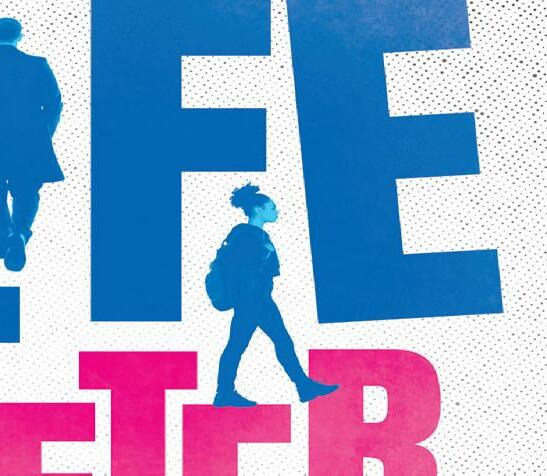

JK: I think [there] is an intersectional case to be made. We have always integrated queerness into many of the stories that we tell, and working with queer playwrights to grapple with issues within the community, so neurodiversity is something that affects the LGBTQ community as well.
[There are related issues regarding] visibility, cultural capital, invisibility and a certain marginalization. So much of the face of stroke recovery in this country happens to be straight and white; Malik is a Brown, immigrant, Pakistan, queer Muslim.
MG: Invisible.


JK: And now disabled.

WCT: You’ve recently partnered with Texas Tech’s STAR program. [Note: The STAR Program of Lubbock, Inc. strives to maximize communication abilities and life participation for persons and their families who are affected by aphasia and other communication challenges.] It speaks about music being an influence on recovery. Will you be incorporating music into your productions?


JK: We have created something that is very much in the early development stages, called Aphasia Arts Forum. This is part of our partner-

ship with Texas Tech. There is a pre-existing relationship between the art school and the STAR program. … There is a role that art plays in stimulating and building new neural pathways. If the part of the brain is destroyed, that part is not coming back; the amazing thing about this organ is that the remaining parts can take on this process of building new pathways, [although] that can take years. We talk about rewiring and remolding our brain, and there is truth to that.
We do plan to create art here [Chicago] … and are utilizing the work we are doing with Texas Tech to lead to the creation of a work that audiences will be able to engage with. There is a lot of work being done at different universities looking at how art and the brain work together, how art is an ally to neuro-healing. … This can be applied to cases of childhood autism or Alzheimer’s and dementia. People are looking at art as an intervention.

WCT: Before your stroke, you seemed to be involved in the back end of things. Do you have a desire to perform?
MG: Yes, [to be an] actor…
JK: Malik now has a desire to be onstage. The play is called The Art of Aphasia and it will be written over the next few years. Our goal is to produce it in 2026 and for Malik to perform it. So we want to give him the time to learn a lot in our collaboration with the university, and we have set that as a goal.
For more about Silk Road Rising, visit https://www.silkroadrising.org/.
June 9, 2022 26 WINDY CITY TIMES GoodmanTheatre.org 312.443.3800 Groups 10+: Groups@GoodmanTheatre.org Technical Sponsor Lead Corporate Sponsor “A LUMINOUS NEW
–THE SAN DIEGO UNION-TRIBUNE BOOK, MUSIC, AND LYRICS BY BRITTA JOHNSON DIRECTED BY ANNIE TIPPE “Musical theater perfection…exquisite from start to finish” (BroadwayWorld ). Frank Carter famously authored self-help books. But Alice, his 16-year-old daughter, finds cold comfort in his positivity platitudes when he tragically never comes home one night. As she puzzles out the events of the day that changed her family forever, Alice’s relentless search for the facts reveals a more complicated truth. JUNE 11 – JULY 17 SPECIAL OFFER: Get $30 main floor tickets for performances June 11–19* with code READER Not valid on premium seating, on previously purchased tickets or in combination with other offers. Expires 6/19/22.
MUSICAL”
Continued from page 22

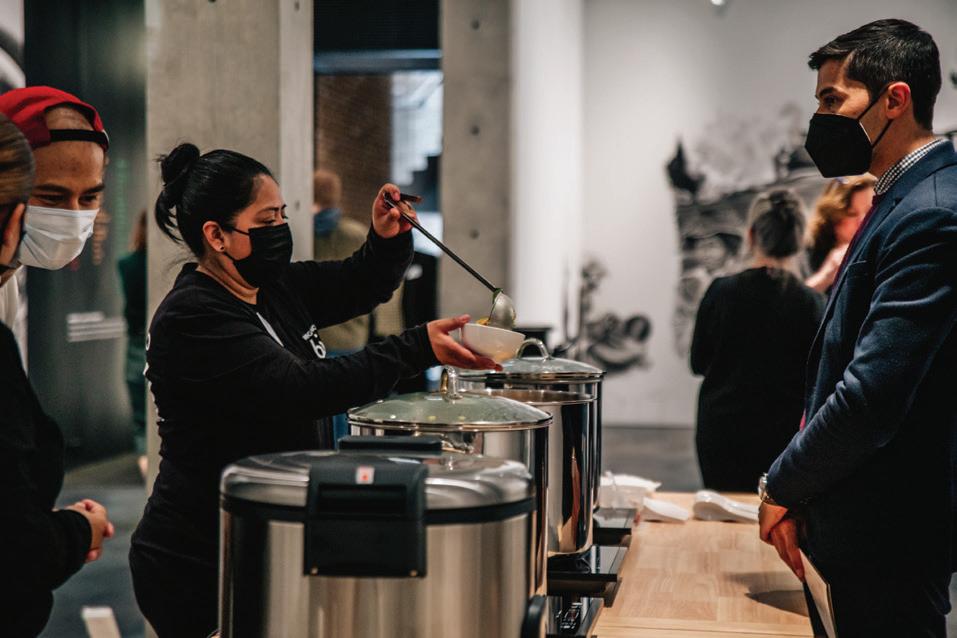


WINDY CITY TIMES Explore four floors of captivating exhibitions: AMERICAN FRAMING The U.S. Pavilion for the 17th International Architecture Exhibition of La Biennale di Venezia RIRKRIT TIRAVANIJA: (who’s afraid of red, yellow, and green ) MOGA: Modern Women & Daughters in 1930s Japan WE SHALL DEFY Shaidul Alam – EXTENDED –BY POPULAR DEMAND! THRU JULY 30 wrightwood659.org IMAGE CREDITS TOP TO BOTTOM: American Framing Installation view of American Framing at Wrightwood 659, 2022, Alphawood Exhibitions, LLC, Chicago. Photo: Michael Tropea. Installation view of Rirkrit Tiravanija: (who’s afraid of red, yellow, and green), at Wrightwood 659, 2022, Alphawood Exhibitions LLC, Chicago. Photo: Aleya Cydney Photography Moga: Modern Women & Daughters in 1930s Japan Miwa Toshio, Playing in the Water 65 x 57 in, Private Collection of Naomi Pollock and David Sneider, USA. We Shall Defy Photo of Shaidul Alam by Mohammad Shahnewaz Khan. WRIGHTWOOD 659 HONORS AND SUPPORTS CHICAGO’S LGBTQ+ COMMUNITY TODAY AND EVERYDAY SUPPORT FOR THESE EXHIBITIONS IS PROVIDED BY ALPHAWOOD FOUNDATION CHICAGO American Framing is presented at Wrightwood 659 by Alphawood Exhibitions in cooperation with the University of Illinois at Chicago (UIC). Rirkrit Tiravanija: (who’s afraid of red, yellow, and green) is organized by the Hirshhorn Museum and Sculpture Garden, Smithsonian Institution, Washington, DC.
Left above: Ald. Andre Vasques presents Ed Negron’s brother Leo Negron Rodriguez and mom Osnaida Rodriguez with copies of the honorary street sign.
Left below: Illinois state Rep. Greg Harris presents Leo Negron Rodriguez with a decree honoring his brother Ed.
Late photographer/leatherman Ed Negron honored with street sign
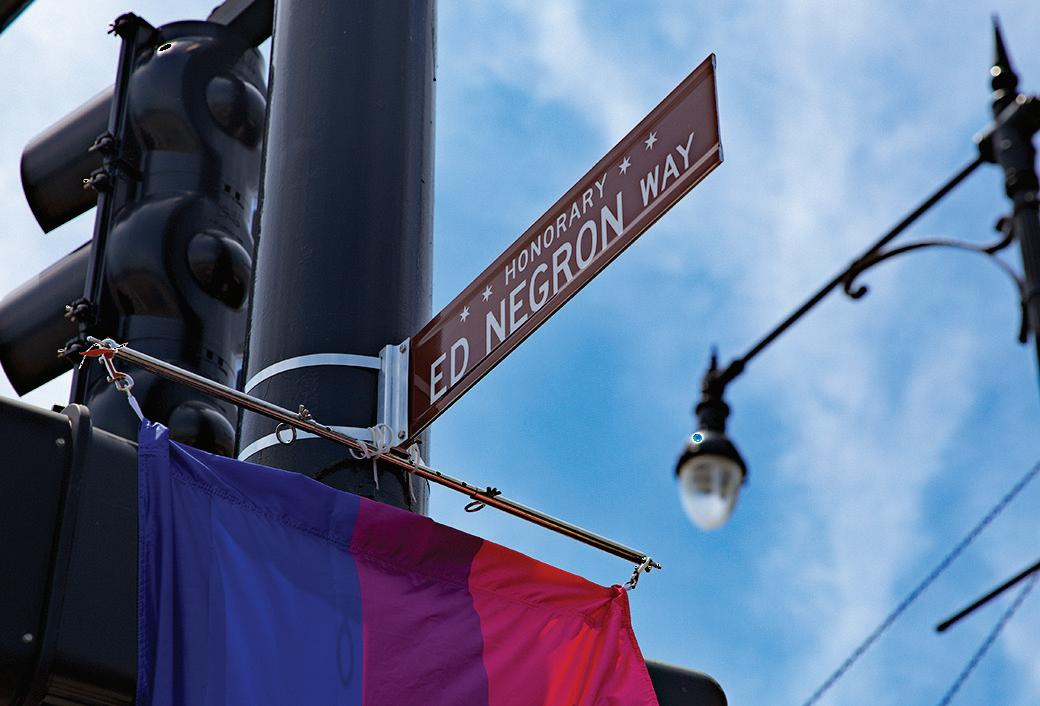
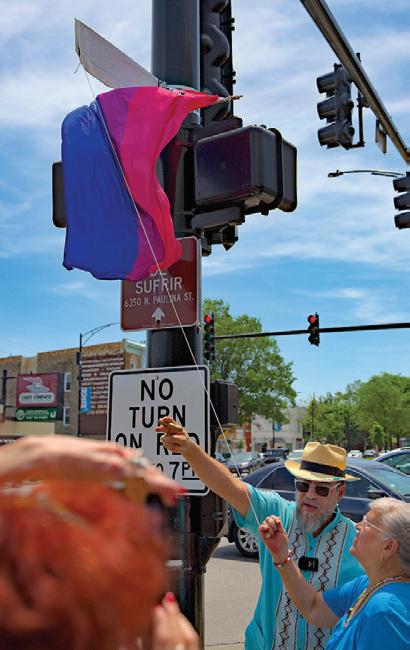
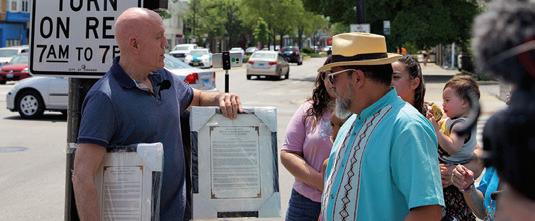
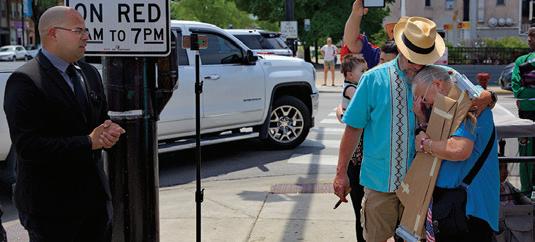
On May 30, during Memorial Day/Internation al Mr. Leather (IML) weekend, the leather shop 64TEN honored late photographer/leatherman Ed Negron with a tribute and honorary street-nam ing ceremony.
The events were held at the corner of Clark Street and Devon Avenue.
A press release from 64TEN stated, “Ed Negron was such an inspiration to our 64TEN family and
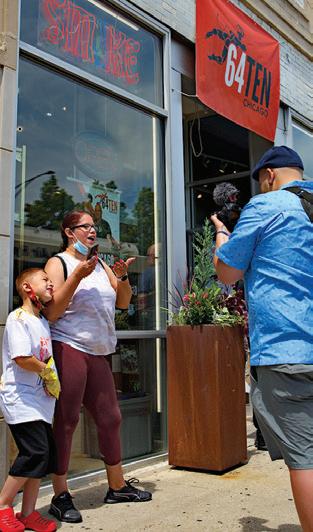
the community. His countless contributions to the LGBTQ+ community and his selfless and car ing attitude proved how and why he touched so many people’s lives.”
Among those who attended were many of Ne gron’s friends and family members such as broth er Leo Negron Rodriguez and mother Osnaida Rodriquez.

June 9, 2022 28 WINDY CITY TIMES
Photos by Tim Carroll
Left: Leo Negron Rodriguez and his mother, Osnaida Rodriguez, unveil the street sign in honor of Ed. Above: Monica Rodriguez and her son Nathaniel are interviewed by a documentary crew.
Celebrating Generations of Pride
AARP believes in celebrating the diversity of the LGBTQ+ community across all generations. That’s why we o er tools, programs and services to help you get the most out of your fabulous life. We all want to live longer, healthier and more ful lling lives. AARP is committed to creating a new vision of aging for LGBTQ+ individuals, their families and allies—one focused on equity and inclusion and complete with diverse experiences, powerful stories, and innovative ways for everyone to pursue their passions—joyfully, openly and proudly!
Get to know us at aarp.org/pride
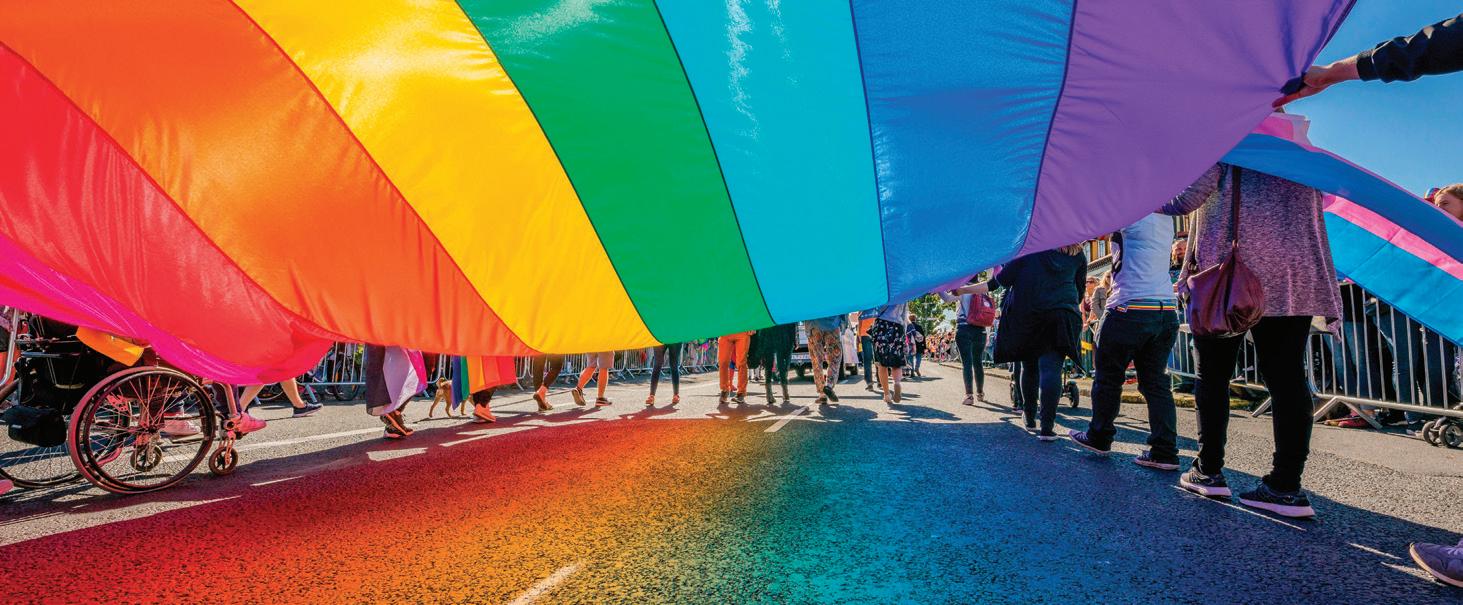
June 9, 2022 29 WINDY CITY TIMES
/aarpillinois
@aarpillinois
More than 10,000 attend in-person IML weekend in Chicago
Memorial Day weekend is also typically when International Mr. Leather, or IML, and International Mr. Bootblack are held—and over 10,000 people attended the in-person event that took place in Chicago on May 26-30.
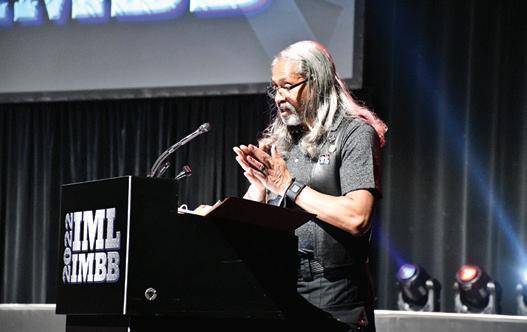
It was the first time IML was held in person this decade because of the coronavirus pandemic.



The Congress Hotel and Convention Center once again hosted, and the May 28-29 contest events were held at a new venue: The Arie Crown Theater at McCormick Place.

Some of the many events that took place included the Leather Archives & Museum silent auction and pop-up shop; First Shine
(when bootblack stands open with female members of the bootblack community as the first customers); panel discussions about everything/everyone from kink to people of color; “ONYX Dance: Climax;” the IML Pecs and Personality Contest; the International Mr. Leather Contest; the Black and Blue Ball; and the ever-popular IML leather market.
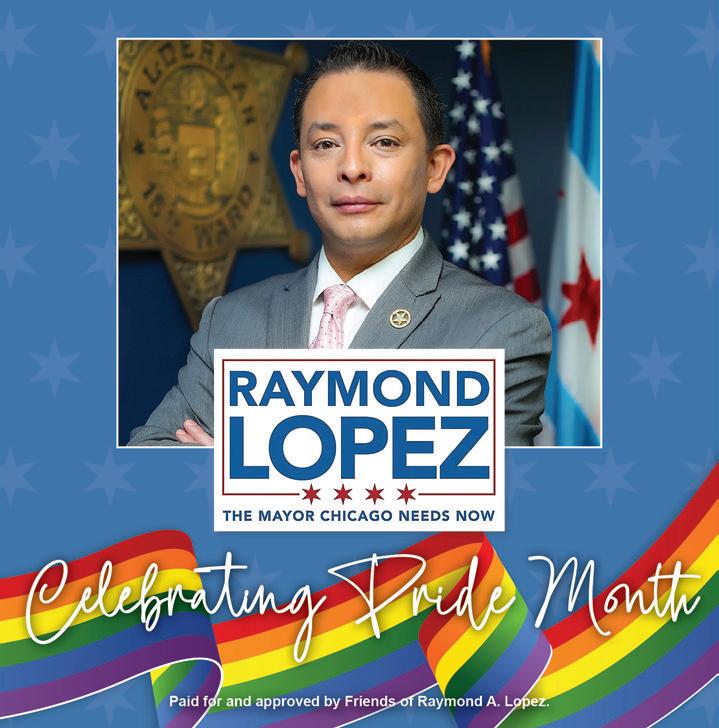
Gael Leung Chong Wo (Mister Leather Belgium 2020-21) was crowned International Mr. Leather 2022 while Alistair LeatherHiraeth (European Bootblack 2020) was named International Mr. Bootblack 2022.
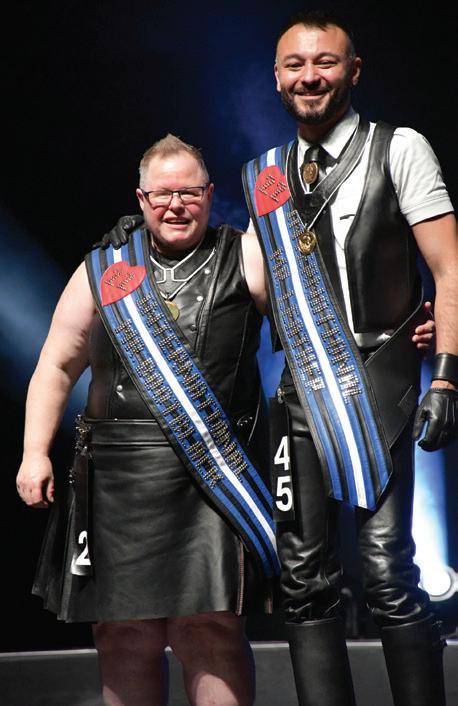
For more about IML, visit IMRL.com .









June 9, 2022 30 WINDY CITY TIMES
Chuck Renslow Charitable Foundation President Joey McDonald.
A couple of pups at the IML Leather Market.
International Mr. Leather Gael Leung Chong Wo (right) with International Mr. Bootblack Alistair LeatherHiraeth.
Photos by Joseph Stevens









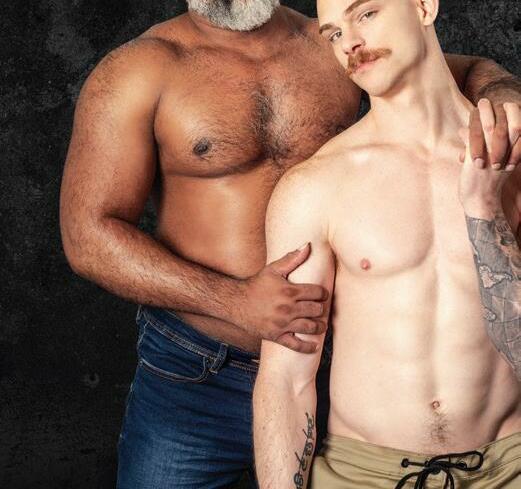












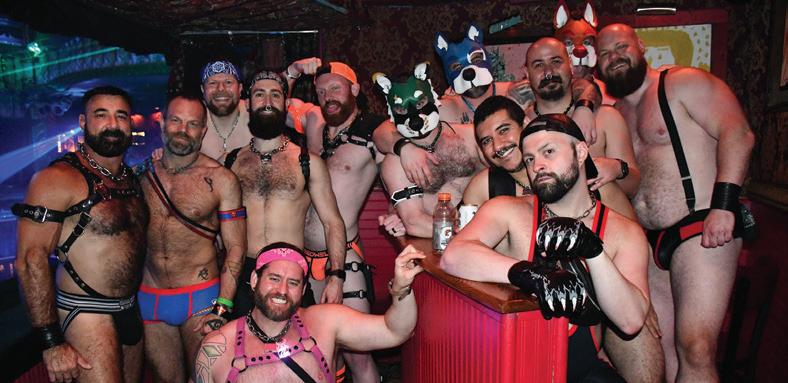
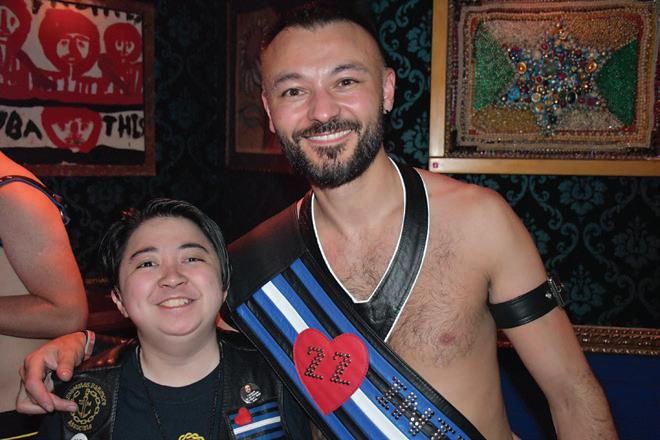


June 9, 2022 31 WINDY CITY TIMES 10 DAYS FREE FUN FOR EVERY NEW GUY Hosting. We’re Come Over to Squirt.org and Join the Action.
Our corporate supporters help us work toward a day when people living with HIV or chronic conditions thrive, and there will be no new HIV cases.




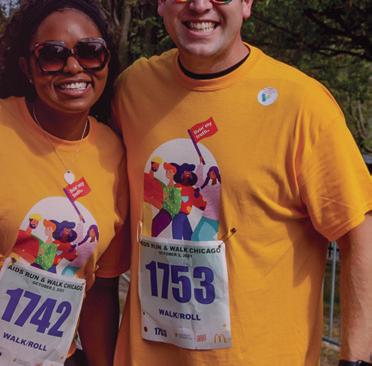
Many thanks to the following companies that made Corporate Partnership-level contributions to the AIDS Foundation Chicago in the past year:








To learn more about AFC’s Corporate Partnership Program, contact Erwin Saenz, Director of Corporate and Foundation Relations, at ESaenz@aidschicago.org.




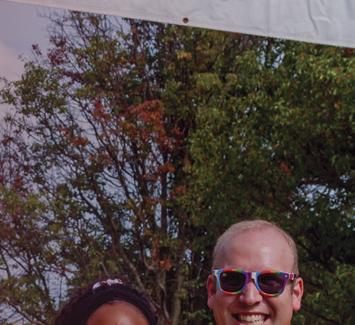



June 9, 2022 32 WINDY CITY TIMES
THANK YOU!
Learn more about our work at injusticewatch.org.




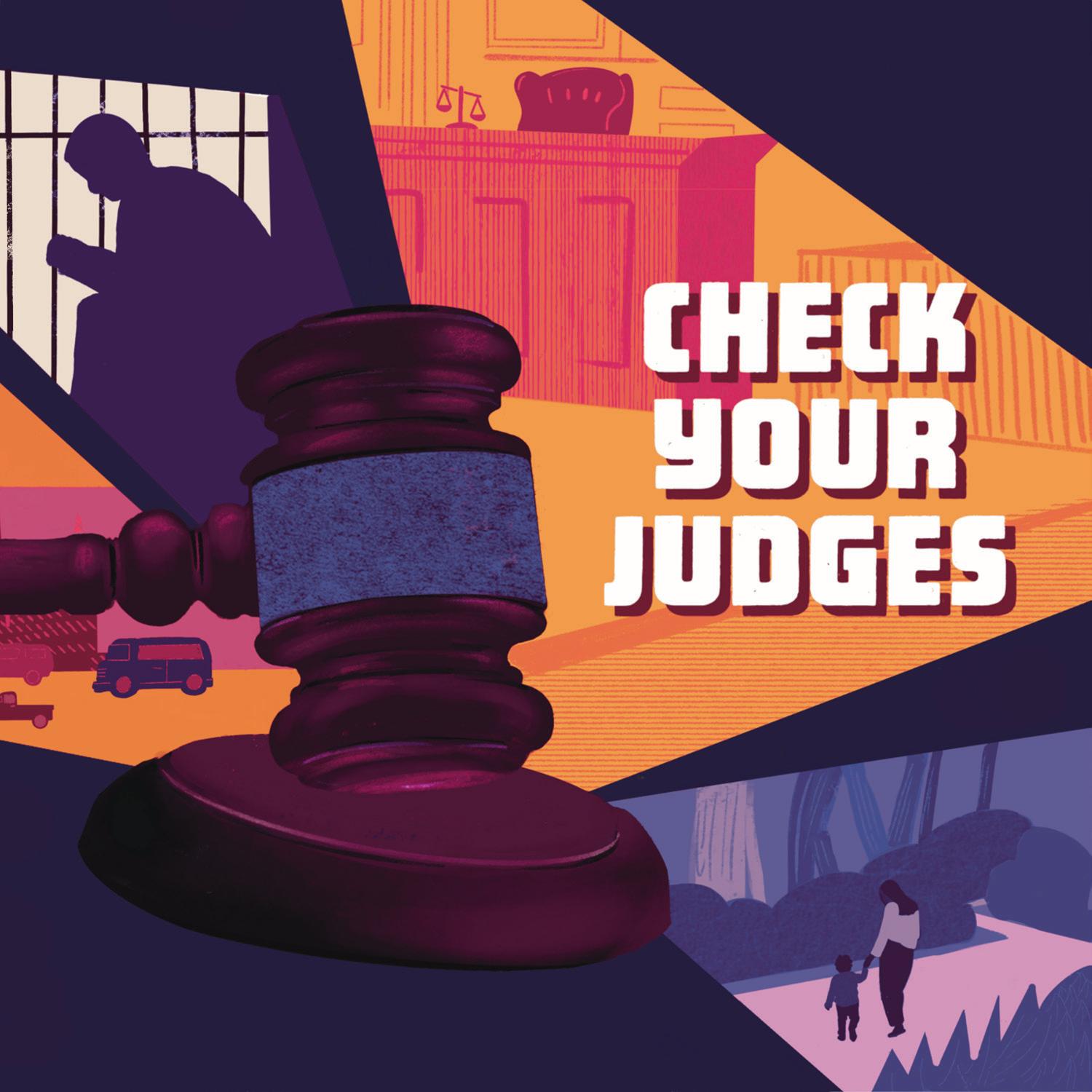 Your voting guide to Cook County’s 2022 judicial primary elections
Your voting guide to Cook County’s 2022 judicial primary elections
SPECIAL PULLOUT SECTION
Roadmap to the races
APPELLATE COURT COUNTYWIDE CIRCUIT COURT SUBCIRCUIT COURT
Hall vacancy
Brennan vacancy
1st: Johnson vacancy
8th: Lipscomb vacancy
{ Jennifer Bae
{ Stephen Swedlow
Harris vacancy
Callahan Jr. vacancy
4th: Gavin vacancy
9th: Cleveland vacancy
Sanjay Tailor
Ann Buran-Vongher
Clip, mark your choices, and take with you
4th: Rogers vacancy
WHAT TO KNOW
This year’s Illinois primary elections are on June 28.
Early voting in Chicago’s 50 wards and sites in suburban Cook County starts June 13. To find your polling place: City residents: www.chicagoelections.gov
Suburban Cook County residents: www.cookcountyclerkil.gov/elections
Who can vote?
Voters must be at least 18 years old, a U.S. citizen, and reside in their precinct for at least 30 days prior to Election Day. People with felony convictions can vote in Illinois as long as they are not serving a felony sentence in prison or jail.
For more information about each candidate and to locate your subcircuit, scan the QR code or visit injusticewatch.org/judges.

9th: Jacobius vacancy
{ Basileios “Bill” John Foutris
{ Torrick Alan Ward
{ Barry Goldberg
{ Don R. Sampen
{ Thomas E. Nowinski
{ Carmen Migdalia Quinones
Cannon vacancy Hyman vacancy Ingram vacancy
Leeming vacancy Lynch vacancy McGury vacancy
5th: Portman-Brown vacancy
Jenetia Marshall
5th: Shelley vacancy
Timothy W. Wright, III
Judie Lyn Smith
Tiffany N. Brooks
Jackie Marie Portman-Brown
6th: Araujo vacancy
Charles “Charlie” Beach (unopposed)
6th: Vega vacancy
Kerrie Maloney Laytin
11th: McGuire vacancy
{ Chris Taliaferro
Aileen Bhandari
13th: Groebner vacancy (Republican)

Christine Svenson
Gary William Seyring
Dominic J Buttitta, Jr
13th: Groebner vacancy (Dem)
James “Jack” Costello
O’Brien vacancy Sullivan vacancy
7th: Martin vacancy
{ Marcia O’Brien Conway { Owens “Joe” Shelby
8th: Gordon vacancy
{ Pat Casey
{ Bradley R. Trowbridge { John Fritchey
14th: Brown vacancy
Iris Y. Chavira (unopposed)
14th: Jagielski vacancy
Joe Gump { Steve Demitro
Viviana Martinez
{ Jorge V. Cazares
15th: Lawler vacancy
{ Bernadette Barrett
{ Jim Gleffe
2 INJUSTICE WATCH JUDICIAL ELECTION GUIDE 2022
All
2 vacancies Candidate profiles start on Page 4 Candidate profiles start on Page 8 Candidate profiles start on Page 3 10 vacancies 17 vacancies {
{
{ Lisa
{
{ Yolanda
{ Araceli R. De La Cruz { Jacqueline Marie Griffin { Dan
{ Russell “Russ” Hartigan { Dominique
Ross { Debra B. Walker { Raymond W. Mitchell { Devlin
{
{ Mary
McMahon { Suzanne
{ Tracie
{ Rena
{ Wende Williams { Thomas More Donnelly { Claudia Silva-Hernandez { Meridth Vanae Hammer { Diana
{ Monica
{ Mable
{ Deidre Baumann { Paul
{ Michael Weaver { Ruth
Gudino { Chelsey Renece Robinson {
{
{
{
{
{
{
{
{
{
{
{
primary races are on the Democratic ballot unless otherwise noted. For subcircuits, voters will see only those contests on their ballot for the subcircuit in which they reside.
Howard B. Brookins, Jr.
Ubi O. O’Neal
Michelle Taylor
Elizabeth “Beth” Ryan
Harris Sayre
Balanoff
C.
Joseph Schoop
John H. Ehrlich
Bernadette
Therese McEneely
Porter
Marie Van Tine
Lόpez
G. Somerville
Taylor
Joyce
Isabel
Maria M. Barlow
John W. Wilson
Nick Kantas
Amanda Moira Pillsbury
Jerry Barrido
Chloe Georgianna Pedersen
ShawnTe Raines-Welch
Patrick Campanelli
David L. Kelly
{
{
{
{
{
{ David S. Rodriguez
{
{
{
{
{
{
{
{
{
Why you should check your judges
Judicial candidates might be among the most obscure names on your ballot, but these elections come with high stakes. Judges are powerful officials whose choices on the bench touch many aspects of life, from traffic tickets to divorces, lawsuits, evictions, and criminal cases. They have the power to take someone’s freedom, enforce or overturn state laws, and correct or perpetuate injustices. Yet there are few places to get information about the people running for judge. That’s why Injustice Watch created this guide to judicial candidates running in Cook County’s primary elections on June 28, 2022.
Illinois voters elect judges every two years. This year, 75 candidates are running for 29 judicial vacancies in Cook County. Every voter will get to choose candidates to fill two appel
late court seats and 10 circuit court seats.
You may also have one or two subcircuit races on your ballot depending on where you live. Judges elected from subcircuits have the same responsibilities as other circuit court judges, but only people who live in that subcircuit can vote for them.
Our team spent months researching the candidates’ legal experience, community involvement, donors, political connections, conduct, and controversies. We sent every candidate a survey asking why they deserve your vote. And we collected recommendations from 13 bar associations, groups of lawyers who interview and rate candidates.
A condensed version of our findings, edited for space and clarity, appears here. For more detailed candidate profiles, visit injusticewatch.org/judges
Understanding the candidate icons

Current or former public defender: This candidate has served as a public defender, representing clients in criminal court who can’t afford a private attorney.
Current or former prosecutor: This candidate has served as prosecutor in criminal or quasi-criminal (such as traffic court) cases at the city, county, state, or federal level.
Appointed judge: When a judicial vacancy opens at any level, the Illinois Supreme Court appoints someone to fill the seat until after the next election. Candidates with this icon were appointed to the court at some point.


Democratic Party pick: The Cook County Democratic Party endorses candidates for appellate court and countywide circuit court seats but not for subcircuit seats.


About the endorsers
This guide includes endorsements, available by press time, from labor groups and other political organizations that have a defined process for endorsing judicial candidates. We exclude endorsements from individual politicians or community leaders.
Chicago Federation of Labor (CFL): An umbrella organization of more than 300 local labor unions in Chicago and Cook County.
Past controversy: The candidate has been involved in some kind of personal or professional controversy.
Highly qualified ratings: Two or more bar associations have rated this candidate highly qualified or recommended. Not all bar associations give out ratings higher than qualified. But those that do have suggested that this candidate is particularly well-suited to be a judge.

Negative ratings: At least two bar associations have said this candidate is not recommended or not qualified to be a judge. Candidates who don’t participate in the ratings process are automatically rated as not recommended. For complete bar association ratings, visit injusticewatch.org/judges.
Russell “Russ” Hartigan
Experience: Goldstine, Skrodzki, Russian, Nemec and Hoff, Ltd.
• Partner (2017-pres ent): Serves as a medi ator and practices civil litigation.

Cook County Circuit Court
• Circuit judge (2010-2017): Appointed by the Illinois Supreme Court, then elected in 2012. Presided over civil jury and non-jury trials in the Bridgeview courthouse.
Various law firms
• Partner (1981-2010): Operated firm with different partners through the years, defending municipalities in law suits, handling worker’s compensation and personal injury cases, and serving as a mediator and arbitrator.
Notable: Hartigan resigned from the circuit court in 2017 due to an illness in his family. He ran unsuccessfully for circuit judge again in 2020 and applied to be an associate judge in 2021 but was not selected. Hartigan has also served numerous stints as an elected official in several suburban Cook County communities, including Lyons Township, where he’s a former township supervisor, school board member and trustee, and Western Springs, where he served on the zoning board and is also a former village board trustee.
Bar association ratings: Rated qualified or above by all bar groups and highly recommended or highly qualified by two.


Dominique C. Ross
Experience: Cook County Circuit Court
• Circuit judge (2008-present): Hears divorce, child custody and other cases in the domestic relations division.


Attorney in private practice
hours without telling her. The case was ultimately settled. Several attorneys told Injustice Watch that Ross has been known for showing up late to court and has, on occasion, missed or continued hearings. At least one attorney men tioned she has improved in recent years. In a statement, Ross said she could not adequately respond without knowing the specifics of the allegations. “It is more likely than not that a circumstance arose outside of my immediate control at the time and that was the reason I was not present for an undated and unspecified amount of my 1000’s of hearings set to be heard from 2008 to 2022,” she wrote. “In either circumstance, tardy or not attended, the amount would surely be at the most overly exaggerated of averages, less than a fraction of a percent. Therefore, I reject the characterization of tardiness and not showing up being a reputation and I find it insulting.”
Bar association ratings: Rated qualified or recommended by six bar associations. Three bars rated her not qualified or not recommended. The other evaluations were not available by press time.
Endorsements: CFL, Personal PAC
Debra B. Walker

Experience: Cook County Circuit Court
• Circuit judge (2008-present): Currently serves in the domestic relations division presiding over divorce cases.
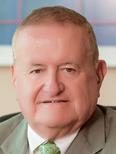

Clausen Miller, P.C.
• Partner (1996-2008): Represented professionals accused of malpractice and judges accused of misconduct by the Judicial Inquiry Board.
Brydges, Riseborough, Peterson, Franke and Morris
• Senior associate (1993-1996)


Independent Voters of Illinois-Independent Precinct Organization (IVI-IPO): A nonprofit, independent political organization focused on voter education, voter registration, and candidate endorsements.
Personal PAC: An abortion-rights political organization focused on ensuring access to abortion in Illinois.
• (1995-2008): Focused on family law.
Notable: Ross is a former chair of the Illinois Judicial Council, an association of Black judges. Ross was sued in 2009 by an election attorney she hired for allegedly failing to pay him more than $60,000 for his work. Ross counter-sued, saying the attorney had exceeded his estimated
Notable: Before going to law school, Walker was a certified public accountant. Walker is a former chair of the Illinois Supreme Court Commission on Profes sionalism, which conducts training for lawyers and judges.
Bar association ratings: Rated qualified or recommended by five bar associations and highly qualified or highly recom mended by four. The other evaluations were not available by press time.
Endorsements: IVI-IPO, Personal PAC
INJUSTICE WATCH JUDICIAL ELECTION GUIDE 2022 3
Current or former public defender
Current or former prosecutor
Democratic Party pick Past controversy Appointed judge Highly qualified ratings
Negative ratings
APPELLATE COURTHALL VACANCY
Raymond W. Mitchell
Experience: Cook County Circuit Court
• Circuit judge (2008-present): Hears cases in the chancery division, where people bring lawsuits asking a judge to order something to happen. Previous ly presided over trials in civil lawsuits over business disputes.
Winston and Strawn LLP
• Partner and associate (1998-2008): Handled cases in state and federal appellate courts.
Notable: Last year, in a lawsuit filed by the Fra ternal Order of Police, Mitchell ruled that the City of Chicago had to negotiate its Covid-19 vaccine mandate for city employees with the police union through arbitration, halting the mandate for police officers covered by the union. An arbitrator ultimately upheld the vaccine mandate. In 2018, Mitchell dismissed a lawsuit filed against the City of Chicago by two residents over the city’s water pipe modernization program. The residents claimed the city’s work to replace water mains and meters had caused lead to enter their water and that the city had failed to properly notify residents of the danger. Mitchell’s decision was upheld by the Illinois Supreme Court.
Bar association ratings: Rated qualified or recommended by six bar associations and highly qualified or highly recommended by four others by press time.
CFL, Personal PAC
Devlin Joseph Schoop
Experience:
The Cochran Firm Chicago
• Partner (2019-present): Rep resents plaintiffs in civil rights, police misconduct, and cata strophic personal injury cases.
City of Chicago Law Department
• Assistant corporation counsel (2017-2019): Represented the city and police officers in misconduct cases.
Cook County Circuit Court
• Circuit judge (2015-2016): Appointed by the Illinois Supreme Court. Heard traffic cases and later child abuse and neglect cases.
Laner Muchin, Ltd.
• Partner (2008-2015): Represented employers in sexual harassment, discrimination, wage disputes, and other employment cases.
• Associate (2003-2007)
Wildman Harrold Allen & Dixon, LLP.
• Associate (1999-2003): Focused on commercial cases.
Notable: Schoop ran unsuccessfully for circuit judge in 2016 and 2018. He currently represents
a group of Black City of Chicago Water Depart ment employees who are suing the city for alleged discrimination and a hostile work environment. The lawsuit was filed in 2017, shortly before the city’s inspector general released a report that found supervisors in the department exchanged racist, sexist, and homophobic emails. In 2014, Cook County Chief Judge Tim Evans appointed Schoop’s then-firm, Laner Muchin, to investigate allegations of corruption and abuse at the county’s probation department. Schoop played a leading role in the investigation, and shortly after, the Illinois Supreme Court appointed him as a judge. Schoop represented the City of Chicago in a civil lawsuit filed by the family of Alfontish Cocker ham, who was killed in 2014 by officer Anthony Babisch. A jury awarded the family $1.3 million.
Bar association ratings: Rated qualified or recommended by eight bar associations by press time. The Hellenic Bar Association found him not recommended, and the Illinois State Bar Associa tion found him not qualified.
Endorsements: Personal PAC
John H. Ehrlich
Experience:
Cook County Circuit Court
• Circuit judge (2012-present): Hears pre-trial motions for civil lawsuits in the law division. Pre viously presided over foreclosure and traffic court cases.
City of Chicago Law Department
• Deputy corporation counsel, torts division (2008-2012): Represented the city in wrongful death and personal injury cases.
• Assistant corporation counsel and chief assistant corporation counsel, torts division (1995-2008)
Notable: In 2017, Ehrlich dismissed several combined lawsuits filed by 53 former NFL players against helmet manufacturer Riddell. Ehrlich said the players failed to file their suit within the two-year statute of limitations. The appeals court upheld his decision.
If elected, Ehrlich says he would be the first LGBTQ+ appellate court judge in the state.
Some of Ehrlich’s top campaign contributors are personal injury attorneys whose cases could come before him in the law division. Ehrlich said in a statement that it’s not a conflict of interest be cause, “I do not know who has or has not contrib uted to my campaign committee or the amount of any contribution.”
Bar association ratings: Rated qualified or rec ommended by six bar associations. The Women’s Bar Association of Illinois and the Chicago Bar As sociation found him highly qualified. The Illinois State Bar Association found him not qualified.
Endorsements: IVI-IPO, Personal PAC
Howard B. Brookins, Jr.
Experience: Chicago City Council
• Alderperson, 21st Ward (2003-pres ent): Represents neighborhoods on the South Side.
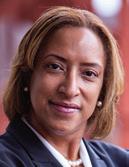
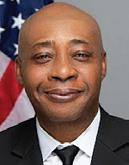
Law Office of How ard B. Brookins, Jr.
• Attorney in private practice (1990-present): Focused on crimi nal defense, estate, personal injury and contract dispute cases.
Cook County State’s Attorney’s Office
• Assistant state’s attorney (19891990)
Cook County Public Defender’s Office
• Assistant public defender (19881989)
Notable: Brookins ran unsuccessfully for Cook County state’s attorney in 2008 and the U.S. House in 2016. As an alderperson, Brookins pushed for years to get Wal-Mart to build a store in his ward and voted against an ordinance that would have mandated a higher minimum wage at big-box stores. He previously chaired the council’s Black Caucus. In 2006, he called on the City Council to stop paying to represent disgraced former police Cmdr. Jon Burge in lawsuits related to his torture of Black men in the 1980s and ’90s. In 2016, his for mer chief of staff pleaded guilty to ac cepting a $7,500 bribe to help arrange a letter of support for a liquor license for a business owner who turned out to be an FBI informant. Brookins was not charged with wrongdoing. In 2020, the Chicago Board of Ethics fined Brookins $5,000, saying that alderpeople are not permitted to represent clients in criminal cases involving Chicago police. Brookins has challenged the board’s decision in court. In an interview, he said he felt a “broad-scale prohibition” on alder people practicing criminal law “seems to be a bridge way too far.”

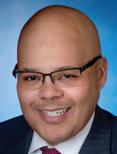
Bar association ratings: Rated qualified or recommended by all bar associations that were available by press time.
Endorsements: CFL
Ubi O. O’Neal
Experience: The O’Neal Law Firm, LLC
• Principal (1993-present): Wide-ranging practice includes criminal defense, medical malpractice, family law, and bankruptcy litigation.
Notable: O’Neal ran unsuccessfully for judge in 2018 and 2020. In 1999, the Illinois Supreme Court censured O’Neal for legal misconduct after he directed his client’s wife to fraudulently endorse a settlement check so that he could be paid for his work and improperly communicated with a cli ent who was represented by another attorney. In an email, O’Neal said, “Censure reflects that the violation was not so serious (as) to warrant a sanction, as a result, censure does not affect the ability of a lawyer to contin ue to practice law.”


Bar association ratings: Did not par ticipate in the evaluation process.
Lisa Michelle Taylor
Experience: Schwartz Gilligan
• Associate (2017-present): Represents defendants in car accidents and other cases involving injuries or insurance claims.
Henderson Parks, LLC
• Attorney (2013-2017): Represent ed plaintiffs in personal injury, medical malpractice, and police misconduct lawsuits.
Lewis Brisbois Bisgaard & Smith LLP
• Partner (2005-2013): Represented defendants in medical and nursing home negligence, car accident, and other civil lawsuits.
Pretzel & Stouffer
• Attorney (2002-2005): Represent ed defendants in medical malprac tice and other civil lawsuits.
Worker, Sitko & Hoffman, LLC











• Attorney (2001-2002)
Bar association ratings: Rated qualified or recommended by all bar associations.
4 INJUSTICE WATCH JUDICIAL ELECTION GUIDE 2022
Endorsements:
APPELLATE COURTHARRIS VACANCY CIRCUIT COURTBRENNAN VACANCY
Mary Bernadette McMahon
Experience: Cook County State’s Attorney’s Office
• Assistant state’s attorney (2005-pres ent): Supervises all of the prosecutors and oversees felony and misdemeanor cases at the Skokie courthouse. Previously was a deputy supervisor at the Rolling Meadows courthouse and prosecuted felony cases.
Notable: McMahon hails from the wealthy and politically connected family that owns McMahon Food Corp., a dairy distribution company. In the early 2000s, the company held lucrative contracts to distribute milk to Chicago Public Schools, the Cook County Jail, and the Cook County Juvenile Temporary Detention Center, according to a 2012 Chicago Sun-Times/Better Government Association investigation. In a statement, McMahon said she previously owned shares of the company but divested from it in 2007. McMahon’s cousin, Joseph Birkett, is an Illinois appellate judge and former DuPage County state’s attorney. Her sister, Frances McMahon Kushner, is also an assistant Cook County state’s attorney.
Bar association ratings: Rated qualified or recommended by seven bar associations and highly qualified by the Chicago Bar Association. The other evaluations were not available by press time.
Endorsements: CFL
Suzanne Therese McEneely
Experience: Cook County Public Defender’s Office
• Assistant public defender (2002-pres ent): Has worked in a variety of roles within the office, including the abuse and neglect division, the domestic violence division, and the criminal division.
Notable: McEneely ran unsuccessfully for judge in 2020. She does not have a current campaign website or a visible social media presence.
Bar association ratings: Rated qualified or above by all and highly recommended by Chicago’s LGBTQ+ Bar Association.
Endorsements: Personal PAC
Tracie Porter
Experience: Cook County Circuit Court
• Circuit judge (2021-present): Appointed by the Illinois Supreme Court. Serves in the traffic division.
Law Office of Tracie R. Porter
• Attorney in private practice (19982000, 2004-2006, 2017-2021): Focused on real estate transactions, contracts, estate planning, and enter tainment law.
Various law schools in Chicago, St. Louis, and California
• Law professor (2004-2021): Taught courses, including legal research and writing, real estate law, and trusts and estates.
Brown Udell & Pomerantz, Ltd.


• Associate (2003-2004): Focused on real estate transactions and litigation.
Barnes & Thornburg
• Associate (2000-2003): Focused on commercial real estate leases and sales.
Bar association ratings: Rated qualified or above by all and highly qualified or highly recommended by four bar associations.
Diana López
Experience:
Cook County Circuit Court
• Associate judge (2021present): Hears traffic cases at the Richard J. Daley Center in Chicago. López Law Group, P.C.


• Solo practitioner (20102021): Focused on family law. Served as a Guardian ad Litem, or child advocate, in divorce and adoption cases. Also served as a mediator in domestic relations cases. Monteagudo, López & Díaz, LLC
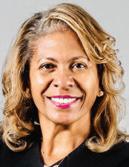
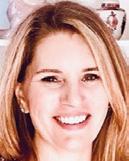

• Managing partner (2006-2010): Focused on family and adoption law.

Nancy C. Murphy & Associates

• Associate (2004-2006)

Cook County State’s Attorney’s Office
• Assistant state’s attorney (2001-2004): Represented the state in child protection and child support enforcement cases.
Bar association ratings: Rated qualified or above by all bar associations.

Endorsements: CFL, Personal PAC
Monica G. Somerville
Experience:
City of Chicago Department of Finance
• Deputy director of citation administration and accounts receivable (2018-2021): Oversaw the division that resolves ticket disputes and works with outside vendors who collect ticket debt for the city.
Chicago City Council Finance Committee
•Executive director and director of workers’ compensation (2013-2017): Oversaw the city’s workers’ compensation program under Ald. Ed Burke.
Illinois Department of Employment Security
• Supervising administrative law judge (2009-2013): Supervised eight adminis trative law judges hearing unemployment benefits appeals.
• Administrative law judge (2003-2007): Reviewed appeals to unemployment bene fit claims.


U.S. Postal Service Law Department
• Attorney (2007-2009): Represented the postal service in employment discrimina tion cases.


City of Chicago Law Department
• Chief assistant corporation counsel (2000-2001): Oversaw personal injury and wrongful death lawsuits against the city.
Notable: Somerville applied to be an associ ate judge in 2021 but was not selected. From 2013 to 2017, Somerville helped run the city’s workers’ compensation program, which was operated for decades by Ald. Ed Burke’s finance committee, until federal prosecutors charged him with racketeering, extortion, and attempted bribery in 2019 (that case is still ongoing). Within weeks, the mayor commissioned an audit of the prior two years of the program, including the last year Somer ville was the director, and the City Council voted to move the program under the city’s Finance Department. The audit found that the program did not have measures in place to detect or prevent fraud, that data collected about workers’ compensation claims was incomplete and disorganized, and that claims were not reviewed or processed according to best practices. Somerville said she would not comment about a “pending investigation and/or litigation.”
Bar association ratings: Rated qualified or recommended by 11 bar associations. The Illinois State Bar Association found her not qualified, and the Women’s Bar Association of Illinois found her not recommended.
Endorsements: IVI-IPO
Mable Taylor
Experience: Law Office of Mable Taylor*
• Attorney in private prac tice: Focuses on criminal defense, personal injury, employment law, family law, and real estate, among other types of cases.
Cook County Mandatory Arbitration Program*
• Arbitrator: Heard civil cases over small amounts of money in a program aimed to divert cases before trials.
*Injustice Watch could not verify the dates of employment, and Taylor did not provide additional information.
Notable: Taylor ran unsuccessfully for judge in 2012, 2016, 2018, and 2020 and for state representative in 2010. In 2018, Taylor represented Cook County Circuit Court Clerk Dorothy Brown in a petition challenge in her run for Chicago mayor. Brown lost the chal lenge and did not appear on the ballot.

Bar association ratings: Found not qualified or not recommended by six bar associations. The Black Women Lawyers’ Association of Greater Chicago found her recommended. Others were not available by press time.
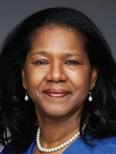
INJUSTICE WATCH JUDICIAL ELECTION GUIDE 2022 5
CIRCUIT COURTCALLAHAN JR. VACANCY
CIRCUIT COURTCANNON VACANCY For more information about each candidate, scan the QR code or visit injusticewatch.org/judges.
CIRCUIT COURT
CIRCUIT COURT
HYMAN VACANCY INGRAM VACANCY
Thomas E. Nowinski
Experience:
Clerk of the Circuit Court of Cook County
• Chief of staff (2020-present): Oversees office’s operations and strategy.
Cook County Recorder of Deeds



• Labor counsel (2018-2020): Oversaw compliance with Shakman decrees, which governs patronage hiring, and negotiat ed union contracts.
Cook County Assessor’s Office
• Labor counsel (2017-2018): Oversaw compli ance with Shakman decrees, which governs pa tronage hiring, and negotiated union contracts.
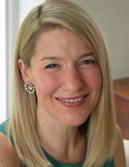

Cook County State’s Attorney’s Office
• Assistant state’s attorney (2014-2017; 20042012): Started by prosecuting criminal cases. Later moved to the civil side of the office, representing the county in employment, civil rights, and other civil lawsuits, and ultimately serving as a supervisor.
Cook County Department of Human Resources
• Deputy director of labor relations (2012-2014): Negotiated union contracts and represented the county in labor disputes.
Notable: Nowinski’s father, also named Thomas E. Nowinski, was a Cook County circuit judge from 1991 to 2004. His sister, Christina Nowinski Wurst, is the co-founder of a consulting firm that has worked for Chicago Mayor Lori Lightfoot, and Ald. Howard Brookins Jr. (21st Ward), who is also running for judge this year. While at the Cook County State’s Attorney’s Office, Nowinski represented the office in a civil lawsuit brought by the mother of David Koschman, who was killed by Richard J. Vanecko, a nephew of former May or Richard M. Daley. The suit alleged a cover-up of the incident and botching of the investigation.
Bar association ratings: Rated qualified or rec ommended by all bar associations.
Endorsements: CFL, Personal PAC
Carmen Migdalia Quinones
Experience: Law Offices of Carmen M. Quinones
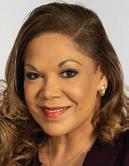
• Attorney in private practice (1989-present): Focused primarily on family law. Also serves as a Guardian ad Litem, or child representative, in domestic relations cases.
Bar association ratings: Rated not qualified or not recommended by eight bar associations.
Elizabeth “Beth” Ryan
Experience: The Law Office of Elizabeth C. Ryan
• Trial attorney (2011-present): Private practice focused on personal injury cases.

Newman, Boyer & Statham
• Attorney (2007-2011): Rep resented clients in personal injury and Social Security/disability cases.
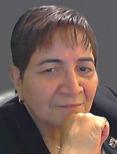
Circuit Court of Cook County
• Law clerk, Judge Martin S. Agran (20042006): Drafted memorandum opinions for a judge in the court’s chancery division.
Notable: Ryan ran unsuccessfully for judge in 2020.
Bar association ratings: Rated qualified or rec ommended by all bar associations.
Endorsements: Personal PAC
Yolanda Harris Sayre
Experience: Illinois State Police
• Legal counsel (2021-present): Represents the state police in employment cases, consults with the Illinois Attorney General’s Office on litigation involving the state police.



Illinois Secretary of State’s Office
• Contract prosecutor (2019-present): Prose cutes license suspensions and revocations in administrative hearings.
Cook County Board of Elections
• Administrative law judge (2010-2020): Presided over cases involving ballot petition challenges.
Chicago Board of Elections
• Administrative law judge (2010-2018): Presided over cases involving ballot petition challenges.
Chicago Police Department
• Attorney (1999-2021): Trained officers at the Chicago Police Academy on legal topics.
Notable: Sayre testified for the state at former Chicago police officer Jason Van Dyke’s murder trial about the use-of-force training she led at the police academy. Van Dyke’s attorney said Sayre was likely Van Dyke’s instructor, but Sayre said she couldn’t recall him specifically.
Bar association ratings: Rated qualified or above by eleven bar associations. The Illinois State Bar Association rated her not qualified.
Endorsements: CFL, Personal PAC
CIRCUIT COURTLEEMING VACANCY
Rena Marie Van Tine
Experience: Cook County Circuit Court
• Circuit judge (2021-present): Appointed by the Illinois Supreme Court in February 2021. Hears civil jury trials with damages of $50,000 or more.
• Associate judge (2001-2021): Heard civil jury trials and child protection cases.

Illinois State Comptroller’s Office
• Special counsel (1999-2001): Oversaw several divisions of the office.
Cook County State’s Attorney’s Office
• Assistant state’s attorney (19871999): Tried felony cases in the criminal division and repre sented the county in medical malpractice lawsuits.
Notable: Van Tine was the first female Indian American state court judge in the country when she was selected as an associate judge in 2001, according to the National Asian Pacific American Bar Asso ciation.
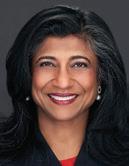
Van Tine was the judge in a civil lawsuit filed against the City of Chicago by the family of Quintonio LeGrier, who was killed by Chicago police officer Robert Rialmo in 2015. The jury in the case awarded LeGrier’s family $1.05 million, but Van Tine overturned the jury’s ver dict based on a “special interrogato ry” they signed saying that Rialmo was in reasonable fear of great bodily injury or death. Interroga tories are written questions about the facts of a case that any party in a lawsuit may ask a jury to answer separately from their verdict. The legal maneuver, commonly used in civil trials, has been criticized for confusing juries.
In a statement, Van Tine said, “As a trial court judge, I am required to apply the law whether or not I agree
with it. The law at the time of the LeGrier case required judges to give special interrogatories requested by any party and prohibited judges from tipping off a jury about how a response to an interrogatory could affect a verdict.” She noted that the case was not appealed and the Illinois legislature has since changed the rules to allow judges to explain to jurors how their votes on special interrogatories might affect the verdict.
Bar association ratings: Rated qualified or above by all and highly qualified or highly recommended by seven bar associations.
Endorsements: CFL, Personal PAC
Wende Williams
Experience: DeLoach Law Office



• Attorney in private prac tice*: Focused on criminal defense, person al injury, and child support cases. Notable: Williams ran unsuccessfully for judge in 2020 as Wendelin “Wendi” DeLoach. Williams, who used to practice law in Colorado, had her law license there suspended for 30 days in 1997 for represent ing a client in a murder case when she had previously represented a co-defendant in a separate matter. She used her prior relationship to visit the co-defendant several times in jail without his lawyer’s knowledge or approval. She later acknowledged that her client and the co-defendant had competing interests because her client was offered a plea deal in exchange for testimony against the co-defendant.
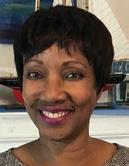
*Injustice Watch could not verify her dates of employment, and the candidate did not respond to requests for comment.
Bar association ratings: Did not participate in the evaluation process.
6 INJUSTICE WATCH JUDICIAL ELECTION GUIDE 2022
Deidre Baumann
Experience:
Baumann & Shuldiner
• Partner (2001-present): Focused on civil rights, police misconduct, personal injury, and em ployment discrimination cases.
Deidre Baumann Law Offices
• Attorney in private practice (1996-2001): Focused on civil rights, police misconduct, First Amendment, employment, and criminal defense.
Michael Null and Associates
• Associate (1993-1996)
Notable: Baumann ran unsuccessfully for judge in 2010, 2012, 2016, and 2020. In 2003, a federal judge sanctioned Baumann and her former law partner in a case, saying they had failed to appear in court several times and delayed the case for three years.
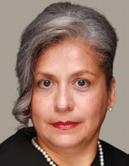
In 2009, Baumann represented families of people buried at Burr Oak Cemetery, a historically Black cemetery in Alsip, in a class-ac tion lawsuit where workers had allegedly emptied graves in an attempt to resell the plots. The lawsuit was settled, but because the cemetery had filed for bankruptcy, most families received very little compensation. Baumann did not respond to a request for comment.
Bar association ratings: Rated qualified or above by most bar associations. The Illinois State Bar Association rated her not quali fied, and the Chicago Bar Association rated her not recommended.

Endorsements: IVI-IPO, Personal PAC
Paul Joyce
Experience:
Cook County State’s Attorney’s Office
• Assistant state’s attorney (1999-present): Has worked in bond court and felony review, and as a prosecutor on felony cases. Currently works at the Skokie courthouse.
Notable: Joyce does not have an active campaign committee or website.
Bar association ratings: Rated qualified or recommended by eight bar associations and highly recommended by the Decalogue Soci ety of Lawyers. Others were not available by press time.
Michael Weaver
Experience:
McDermott Will & Emery
• Partner and associate (2007-present): Current ly oversees the firm’s pro bono practice. Previ ously represented large companies, including Honeywell, in asbestos lawsuits.

High Court of American Samoa
• Law clerk (2006-2007): Drafted opinions for the court’s chief justice and associate justice.
Notable: Weaver applied to be an associate judge in 2021 but was not selected.
Bar association ratings: Rated qualified or above by all. Chicago’s LGBTQ+ Bar Association rated him highly recommended.
Endorsements: CFL, Personal PAC
CIRCUIT COURT CIRCUIT COURT
McGURY VACANCY
Ruth Isabel Gudino
Experience:
Cook County Circuit Court
• Circuit judge (2021-pres ent): Appointed by the Illinois Supreme Court. Cur rently hears traffic cases at the Richard J. Daley Center.
Cook County State’s Attorney’s Office
• Assistant state’s attorney (1997-2001; 20032021): Has served in many roles in the office, including supervisor of criminal prosecutions in Maywood, supervisor of the juvenile jus tice division, and director of legal hiring and recruitment.
United Auto Workers-GM Legal Services Plan
• Staff attorney (2001-2003): Worked on small claims, probate, real estate, and breach of contract cases for Ford and General Motors union employees.
Cook County Public Guardian’s Office
• Assistant public guardian (1995-1997)
Notable: Gudino was a finalist for associate judge in 2019 but was not selected. Gudino’s largest outside campaign donor is Monterrey Security Consultants, a politically connected private security firm that has faced allegations in Illinois and Minnesota of failing to comply with state regulations. Gudino did not respond to a request for comment.
Bar association ratings: Rated qualified or above by all and highly qualified or highly rec ommended by three bar associations.
Endorsements: CFL, Personal PAC
Chelsey Renece Robinson
Experience:
Owens and Robinson
• Founding partner (1996-present): Private practice focused on family law, criminal defense, bankruptcy, and real estate.
Notable: Robinson is a legal consultant for the “Judge Mathis” show. She ran unsuccessfully for judge in 2016 and 2020.
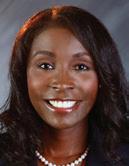
Bar association ratings: Rated qualified or above by most bar associations. The Illinois State Bar Association rated her not qualified.
Endorsements: IVI-IPO
O’BRIEN VACANCY
Araceli R. De La Cruz

Experience:
Cook County Circuit Court
• Circuit judge (2022-present): Appointed by the Illinois Su preme Court effective January 2022. Currently assigned to the traffic division.
Acero Charter School Network

• General counsel and chief administrative officer (2016-2021): Oversaw the legal department and compliance issues for network of 15 schools serv ing more than 7,000 students in Chicago.



Illinois Department of Financial and Professional Regulation


• Chief of General Prosecutions, Division of Pro fessional Regulation (2014-2016): Responsible for enforcing licensing regulations and reviewing disciplinary cases for professions such as cosme tology, roofing, and funeral directors.
Chicago Transit Authority
• Senior vice president and chief safety and security officer (2011-2014): Managed the CTA’s security department and oversaw accident inves tigations.
• Deputy chief of staff (2010-2011)





• Chief of safety and security compliance (20092010)
Cook County State’s Attorney’s Office
• Assistant state’s attorney (2001-2009): Prosecut ed cases in several divisions.
Notable: De La Cruz ran unsuccessfully for judge in 2020. De La Cruz was the attorney for Acero Schools in 2018, when several hundred teachers and staff staged the nation’s first charter school strike. Acero Schools filed complaints against the Chicago Teachers Union with the National Labor Relations Board. The union ended the strike a few days later after reaching a new contract agreement with Acero. In an email, De La Cruz said that both sides dropped their labor complaints after the agreement was reached. She also noted that the charter school network and union negotiated several memoranda of understanding related to the Covid-19 pandemic during her time as general counsel.
Bar association ratings: Rated qualified or above by all and highly recommended by Chicago’s LGBTQ+ Bar Association.
Endorsements: CFL, Personal PAC
Candidate profiles for the O’Brien vacancy continue on the next page.
INJUSTICE WATCH JUDICIAL ELECTION GUIDE 2022 7
CIRCUIT COURTLYNCH VACANCY
CIRCUIT COURT O’BRIEN VACANCY
Experience: Cook County State’s Attorney’s Office
• Assistant state’s at torney (2005-pres ent): Prosecuted child support, child abuse, and juvenile delinquincy cases. Has prosecuted felony criminal cases since 2012, with a focus on sexual assault and domestic violence cases since 2017.
Attorney in private practice
• (2007-present): Represents buyers and sellers in real estate transactions.
Notable: Griffin ran unsuccessfully for judge in 2020. Her father and two uncles were Chicago police officers.
Bar association ratings: Rated qualified or above by 11 bar associations. The Decalogue Society of Lawyers and Chicago’s LGBTQ+ Bar Association rated her not recommended.
Thomas More Donnelly
Experience:
Cook County Circuit Court
• Circuit judge (2021-pres ent): Appointed by the Illinois Supreme Court in December 2021. Presides over jury trials in wrongful death, police shooting, med ical malpractice, and product liability cases.
• Associate judge (2003-2021): Heard a variety of cases, including domestic violence, consumer debt, and felony and misdemeanor criminal cases. Presided over civil jury trials.
• Circuit judge (1999-2000): Appointed by the Illinois Supreme Court.
Cook County Public Defender’s Office
• Assistant public defender (1988-1999)


VACANCY
discovery requests for cases involving white collar crimes.
Independent Police Review Authority
• Staff attorney (2016-2017): Provided legal analysis for investigations into alleged misconduct by Chicago police officers.
Chicago Housing Authority
• Contract attorney (2012-2016): Represented the CHA in administrative hearings about the termination of housing vouchers.
Illinois Attorney Registration and Disciplinary Commission


• Litigation counsel (2008-2011) Will County Public Defender’s Office







• Assistant public defender (2007-2008)
Bar association ratings: Did not participate in the evaluation process.
Endorsements: CFL
Dan Balanoff
Experience: Balanoff and Associates
• Managing partner (2007-present): Primarily focused on estate planning, real estate, and consumer bankruptcy law.
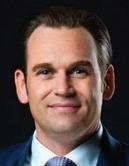
Notable: Balanoff is part of a progres sive political family from Chicago’s Southeast Side with roots in the labor movement. His father is Cook County Circuit Judge Robert Balanoff and his grandmother Miriam Balanoff is a former Cook County circuit court judge and state representative. His uncle, Clem Balanoff, is a former state representative and political consultant, and his father’s first cousin is Tom Balanoff, who recently retired after a lengthy tenure as president of SEIU Local 1.
Bar association ratings: Rated not qualified or not recommended by seven bar associations. Three bar associations found him recommended. Others were not available by press time.
Endorsements: IVI-IPO
Notable: Donnelly first ran for circuit judge in 2000, but lost to Matthew Coghlan. In 2011, Donnelly threw out the arrests of 92 Occu py Chicago protesters who violated the city’s curfew by camping out in Grant Park. Donnelly said in his decision that the curfew ordinance was unconstitutional because the city selectively enforced the curfew. But the Illinois Appellate Court overturned his decision in a judgment lat er affirmed by the Illinois Supreme Court. Since 2016, Donnelly has been a board member of the Illinois Judicial College, which trains judges and staff across the state. Many of Donnelly’s largest donors are personal injury law firms and lawyers, whose cases could come before him in the law division. In an email, Donnelly said, “As a judicial candidate I am not allowed to solicit campaign contributions. My committee handles fundraising matters and abides by all campaign finance rules and safeguards.”
Bar association ratings: Rated qualified or rec ommended by five bar associations and highly qualified or highly recommended by three. Others were not available.
Endorsements: IVI-IPO, Personal PAC
Claudia Silva-Hernandez
Experience:
Clerk of the Circuit Court of Cook County
• Labor counsel (2021-2022): Advised the office on labor and employment issues.
Illinois Department of Human Services
• Administrative law judge (2019-2021): Heard appeals of decisions to terminate state and federal benefits, such as food stamps and child care subsidies.
Solo practitioner
• Contract attorney (2017-2019): Assisted with
Meridth Vanae Hammer
Experience:
The Hammer Legal Group
• CEO (2009-present): Private practice focused on real estate transactions, zoning issues, trusts, and estate planning. Served as an administrative law judge for the City of Indianapolis’ code enforcement department.
Clerk of the Circuit Court of Cook County
• Deputy general counsel (2019-2021): Provided legal counsel, reviewed outside contracts, and managed outside counsel in employment cases. Crosstown Community Development Corp.




• Corporate counsel (2009-2012): Handled all legal matters for Indianapolis nonprofit. CA, Inc.
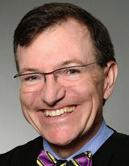
• Senior contracts manager and operations manager (2005-2009): Drafted and reviewed contracts for a software company.
Notable: Hammer was the campaign manager for Cook County Circuit Court Clerk Dorothy Brown when she ran for mayor of Chicago in 2019. Brown was removed from the ballot for not having enough petition signatures. Hammer was hired as deputy general counsel in Brown’s office shortly after. Brown was under investiga tion by the FBI at the time for allegations that she exchanged jobs for cash and political dona tions, but she was never charged. In an email, Hammer said Brown hired her for the posi tion based on her “qualifications, experience, knowledge, skills, and abilities and commitment to public service.” Hammer has a bachelor’s de gree in computer science, and before becoming a lawyer, she had a career in software develop ment and information technology.
Bar association ratings: Did not participate in the evaluation process.
Maria M. Barlow
Experience: The Barlow Law Firm LLC
• Principal attorney (2011-present): Primarily focused on family law and estate planning.


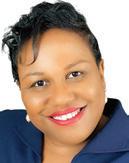
City of Chicago Law Department
• Assistant corporation counsel (2008-2011): Prosecuted various types of cases, including traffic tickets and building code violations.
Notable: Barlow ran for Cook County commissioner in the 4th district in 2018. She lost in the primary to Com missioner Stanley Moore.
Bar association ratings: Did not par ticipate in the evaluation process.
John W. Wilson
Experience: Cook County Circuit Court
• Circuit judge (2021-present): Appointed by the Illinois Supreme Court. Serves in the 4th municipal district at the Maywood courthouse.
Cook County Public Defender’s Office
• Assistant public defender (19972021): Served in numerous roles, including acting chief of the 6th municipal district (Markham) and homicide and felony supervisor in Markham. Also served on the ho micide task force, a special division representing people accused of murder.
Notable: Before becoming a lawyer, Wilson was an administrator at City Colleges of Chicago and an assistant men’s basketball coach at Wilbur Wright College. Some of Wilson’s top donors include 4th Ward Ald. Sophia King; her husband, attorney Alan King; and his house music group, the Chosen Few DJs.

Bar association ratings: Rated qualified or above by all and highly qualified or highly recommended by three bar associations.
Endorsements: CFL, IVI-IPO, Personal PAC
8 INJUSTICE WATCH JUDICIAL ELECTION GUIDE 2022
COURTSULLIVAN
CIRCUIT
Jacqueline Marie Griffin
1ST SUBCIRCUIT JOHNSON VACANCY
Nick Kantas
Experience: Cook County State’s Attorney’s Office
• Assistant state’s attorney (2004-present): Currently super vises the juvenile delinquency division. Previously has served as a supervisor in the felony review unit and a prosecutor in the felony trial division.
Notable: Kantas applied for associate judge in 2019 and 2021, but was not selected. Kantas’ wife, Maren Ronan, is a registered Illinois lobbyist who has worked for more than two dozen municipalities, school districts, companies, and nonprofits, including a red-light camera operator and Casa Central Social Services Corp.

Bar association ratings: Rated qualified or recommended by all bar associations.
Amanda Moira Pillsbury
Experience: Cook County State’s Attorney’s Office
• Assistant state’s at torney (2005-pres ent): Prosecutes fel ony criminal cases. Has also worked in child protection, ju venile justice and felony review units.
Notable: Pillsbury ran unsuccessfully for judge in 2018 and 2020. In her 2020 run, she received $1,000 from Chicago businessman and perennial candidate Willie Wilson.
Bar association ratings: Rated not qualified or not recommended by five bar associations.
Endorsements: CFL, Personal PAC
Jerry Barrido
Experience: Cook County Public Defender’s Office
• Assistant public defend er (2000-present): Since 2019, represents defen dants in felony cases at the Maywood courthouse. Before that, was a senior attorney handling hearings about transferring young people accused of serious crimes to adult court. Has also worked in the traffic division, juvenile justice division and forensic science division.
Notable: Barrido ran unsuccessfully for judge in 2018. He told Wednesday Journal in March that he deliberately chose to run in the Rogers vacancy because he wanted to challenge ShawnTe Raines-Welch, whose husband is Illinois House Speaker Emanuel “Chris” Welch. “I deliberately wanted to give the people a choice as to whether or not they wanted to go with the status quo Democratic politics or to have someone who is a fighter in the courtroom, who has a reputation as a zealous advocate and a hard worker period,” Barrido said.
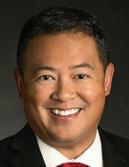
Bar association ratings: Rated qualified or recommended by all bar associations.



Endorsements: IVI-IPO
Chloe Georgianna Pedersen
Experience: Fletcher & Sippel, LLC




• Partner (2019-present): Leads the firm’s labor and employment law practice.
• Associate (2014-2019): Represented railroads and other transportation companies on labor and regulatory issues.


Cook County Recorder of Deeds •Chief legal and labor counsel (20122014): Advised the recorder on legal issues and investigated allegations of employee misconduct.
Office of the Illinois Attorney General
• Assistant attorney general (2010-2012): Defended state agencies in lawsuits, including civil rights and employment discrimination cases.
Illinois House of Representatives

• Assistant general counsel to Illinois House Speaker (2009): Served as the House Parliamentarian, advised on legal and parliamentary issues.
Querrey & Harrow, Ltd.
• Associate (2007-2010)
Notable: Pedersen is the niece of Cook County Clerk Karen Yarbrough. When Yar brough hired Pedersen in 2012 as the chief legal counsel for the Cook County Recorder of Deeds Office, the county’s inspector gen eral said it violated the Cook County ethics code and asked Yarbrough to fire her, the Better Government Association and FOX 32 Chicago reported. In a statement, Pedersen said her hiring was vetted and approved by both the Cook County State’s Attorney’s Office and the court-appointed monitors assigned to review hiring practices. “I was uniquely qualified to help the recorder with her transition given my background in civil rights, and labor and employment issues, and coming from the Illinois Attorney General’s Office where I had previously worked with the same labor organization,” she wrote.
Bar association ratings: Rated qualified or recommended by all bar associations whose ratings were available by press time.
ShawnTe Raines-Welch
Experience: Ancel Glick
• Partner (2019-present): Represents various suburban municipalities and a school district as general counsel. Also presides over traffic hearings and other administrative hearings for towns including Markham and Blue Island.
Sanchez, Daniels and Hoffman, LLC
• Associate (2011-2019): Defended munici
palities and school districts in civil rights and employment lawsuits.



Attorney in private practice
• (2009-2011): Represented plaintiffs in personal injury cases.
Notable: Raines-Welch applied to be an associate judge in 2021 but was not selected. Her husband is Illinois House Speaker Emanuel “Chris” Welch. Raines-Welch has received large campaign contributions from labor groups, including LIUNA Chicago Laborers’ District Council PAC and Chicago land Operators Joint Labor-Management PAC; politicians, including state Rep. Mar cus C. Evans Jr. and House Majority Leader Greg Harris; and corporations, including MuniBuy LLC, which buys and securitizes revenue streams from various municipali ties in Illinois.
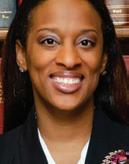
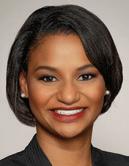
Raines-Welch’s current municipal clients include Dolton and Calumet City. She has faced accusations in both suburbs of pro tecting the mayors over the interests of the trustees and towns. Raines-Welch and her campaign did not respond to requests for comment.
Bar association ratings: Rated qualified or above by 10 bar associations. The Illinois State Bar Association found her not qualified.
Endorsements: CFL, Personal PAC
Patrick Campanelli
Experience: Patrick Campanelli, Attorney at Law P.C. Attorney in private practice (1986-present): Focused on criminal defense, traffic, and personal injury cases.

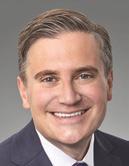
Notable: Campanelli is married to former Cook County Public De fender Amy Campanelli. He ran unsuccess fully for judge in 1996 as a Republican.
Bar association ratings: Rated not qualified or not recommended by five bar associa tions. The Chicago Bar Association rated him qualified. Others were not available by press time.
INJUSTICE WATCH JUDICIAL ELECTION GUIDE 2022 9
SUBCIRCUITROGERS
MORE ONLINE Check out our comprehensive judicial election guide To locate your Cook County subcircuit, read more information about each candidate, and create a customized report you can take to your polling station, scan the QR code or visit www.injusticewatch.org/judges.
SUBCIRCUIT GAVN VACANCY
4TH
VACANCY
4TH
VACANCY
David L. Kelly
Experience: Cook County Circuit Court
• Circuit judge (2021-present): Appointed by the Illinois Supreme Court. Currently assigned to the traffic division.
• Illinois Department of Human Services
• Supervising administrative law judge (2019-2021): Conduct hearings related to state and federal benefits programs.
Law Office of David L. Kelly
• Attorney in private practice (2006-2019): Focused on criminal defense and real estate law.
Cook County State’s Attorney’s Office
• Assistant state’s attorney (2001-2006): Prosecuted crimi nal felony and misdemeanor cases.
Notable: Kelly ran unsuccessfully for judge in 2018.
Bar association ratings: Rated qualified or above by all and highly recommended by the Puerto Rican Bar Association of Illinois.
Endorsements: CFL, IVI-IPO, Personal PAC
Jenetia Marshall
Experience: Illinois Department of Children and Family Services
• Statewide compliance administrator (2021-present): Reviews investigations into child abuse and neglect and ensures compliance with court-ordered consent decree.
• Supervisor regional counsel (2019-2021): Represented the department in high-profile or complex cases in court, provided advice and counsel to administrative staff, and worked with state attorney general’s office and local state’s attorney’s offices.
Cook County Office of the Public Guardian
• Senior attorney and Guardian ad Litem (2002-2019): Rep resented children in abuse and neglect hearings.
Notable: Marshall ran unsuccessfully for judge in 2018. She also applied to be an associate judge in 2021, but was not selected. Before becoming a lawyer, Marshall was a case manager for several youth-serving organizations in Chicago.
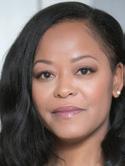

Bar association ratings: Rated qualified or recommended by all bar associations.
MORE ONLINE
Timothy W. Wright, III
Experience:
Quintairos, Prieto, Wood & Boyer
• Managing partner (2011-present): Works on municipal finance transac tions, commercial real estate transactions, and government affairs and regulatory issues.
Gonzalez, Saggio & Harlan
• Managing partner (2007-2011): Worked on govern ment affairs and regulatory issues, mainly for energy companies.
Burris, Wright, Slaughter & Tom
• Partner (2004-2007): Worked on government affairs and regulatory issues.
Television station WJYS •General counsel (1999-2003) Business and Professional People for the Public Interest



• Attorney (1983-1985): Represented residents in the landmark Gautreaux case that challenged the racial segregation of Chicago’s public housing.
Notable: Wright was a finalist for associate judge in 2021 but was not selected. In addition to his legal work, Wright was involved in politics in the 1980s and 1990s. He held director roles for the City of Chicago under mayors Harold Washington and Eugene Sawyer, was a domestic policy advisor for President Bill Clinton, and was chief of staff for U.S. Rep. Bobby Rush. In 2009, Wright represented Roland Burris, whose son was his former law partner, in matters involving his appointment to Barack Obama’s Senate seat by Gov. Rod Blagojevich, who was soon after indicted on corruption charges.

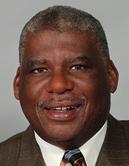
From 2001 to 2014, the IRS filed six liens against Wright’s home for nonpayment of nearly $600,000 in taxes. In an interview, Wright said that those liens occurred while he was working outside the country and that he has since cleared his debts. During the late 1990s and early 2000s, Wright was director of the Southern African Economic Development Fund for the Federal Home Loan Bank of Chicago and chairman of the Sub-Saharan African Advi sory Committee of the Export-Import Bank of the United States.
Bar association ratings: Rated qualified or recommended by all bar associations.


Endorsements: CFL, IVI-IPO, Personal PAC
Judie Lyn Smith
Experience: Cook County Public Defender’s Office
• Assistant public defender (2004present): Currently assigned to the Markham courthouse.
Law Office of Judie Lyn Smith
• Attorney in private practice (1994-present): Focused on real estate and wills and estates.
Office of the Illinois State Appellate Defender
• Assistant defender (1997-1999)
Notable: Smith worked for a year as a lawyer in Japan. Since 2017, she has taught criminal law and procedure as part of the training for new court interpreters.
Bar association ratings: Rated qualified or recommended by 11/13 bar associations. The Illinois State Bar Associa tion and Chicago’s LGBTQ+ Bar Association rated her not qualified or not recommended.
Tiffany N. Brooks
Experience: Clerk of the Circuit Court of Cook County
• General counsel (2020-present): Ensures office’s com pliance with applicable state, local, and federal laws and assists with the implementation of new laws.
City of Chicago Department of Business Affairs and Con sumer Protection
• Assistant commissioner (2018-2020): Managed the intergovernmental affairs unit of the department and served as a liaison to the mayor’s office, City Council, and other officials.
City of Chicago Civilian Office of Police Accountability
• Investigator (2018): Investigated police misconduct complaints.
Chicago City Council committees on economic develop ment and education and child development
• Legislative aide (2015-2018): Served as a liaison be tween committee chairpeople, the mayor’s office, and other elected officials. Helped review and draft ordi nances.
Law Office of Tiffany N. Brooks
• Attorney in private practice (2013-2020): Practice included criminal defense, employment law, adminis trative hearings, estate planning, and bankruptcy and foreclosure cases.
Urban Partnership Bank
• Staff attorney (2011-2013)
• Senior lender (2004-2011)
Notable: Brooks ran for 5th Ward alderperson in 2015, but lost to incumbent Leslie Hairston.
Check out our comprehensive judicial election guide
To locate your Cook County subcircuit, read more information about each candidate, and create a customized report you can take to your polling station, scan the QR code or visit www.injusticewatch.org/judges.

Bar association ratings: Rated recommended by five bar associations and not qualified or not recommended by four. Other evaluations were not available by press time.
Candidate profiles for the Shelley vacancy continue on the next page.
10 INJUSTICE WATCH JUDICIAL ELECTION GUIDE 2022
5TH SUBCIRCUITSHELLEY VACANCY
5TH SUBCIRCUIT PORTMAN-BROWN
VEGA VACANCY
Jackie Marie Portman-Brown
Experience: Cook County Circuit Court
• Circuit judge (2008-2020): Presided over bond court hearings and felony trials. Oversaw deferred prosecution programs and the HOPE court, a specialty court meant to keep struggling probationers out of prison.
Independent Police Review Authority
• General counsel (2005-2008): Reviewed Chicago police misconduct investigations and consulted on legal issues.
Cook County State’s Attorney’s Office
• Assistant state’s attorney (1998-2005): Prosecuted child sexual abuse, narcotics, and misdemeanor cases. Also reviewed felony arrests.
Notable: Portman-Brown lost her judgeship in 2020 after voters did not retain her for another term. She is one of just two Cook County judges who have not been retained in the past three decades. Portman-Brown was placed on admin istrative duty in February 2020 after she was captured on video locking her 6-year-old grandniece alone in a courtroom holding cell for about 10 minutes. In an interview with Injustice Watch, Portman-Brown said the girl’s mother asked her to put her in the holding cell. “There are some who didn’t understand the tough love mentality that was intended for my grandniece, but there were a lot of people in this community who were raised with that. And my nephew, whose daughter it is, understood that,” Portman-Brown said. “Would I do this again? Probably not. But her behavior has been improved since this incident.”
Portman-Brown has proclaimed herself a “lock ’em up” judge in media interviews and faced criticism for her tempera ment on the bench. In 2018, Injustice Watch reported that the HOPE court program she ran was shut down after two separate outside reviews accused her of “bullying” behavior in the courtroom and questioned the program’s efficacy. In an emailed response to Injustice Watch, Portman-Brown said the program was a success and the review by Chicago Apple seed Fund for Justice mischaracterized the comments of the HOPE court team. “I am demanding of everybody including myself because the most important part is that we are all working toward the defendant’s success and the program’s success.”
Bar association ratings: Rated not qualified or not recom mended by 8/13 bar associations.
David S. Rodriguez
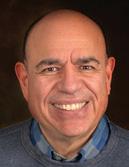
Experience:
Clerk of the Circuit Court of Cook County
• Deputy general counsel (2020-present): Ad vising the clerk on policy and legal matters.






Rodriguez Law Group P.C.
• Attorney in private practice (2006-2020): Focused on a variety of cases, including contract disputes, family law, and real estate transactions.
State of Illinois Court of Claims
• Commissioner (2011-2017): Served as a part-time hearing offi cer for cases where people made claims of monetary damages or injury against the state.
Illinois Department of Financial and Professional Regulation
• Deputy director of banking (1999-2006): Devised and handled banking policy.
Notable: Rodriguez ran unsuccessfully for Illinois Senate in 1998. He filed to run for judge in 2020, but did not get enough signatures to make the ballot.
Bar association ratings: Rated qualified or recommended by all.
Endorsements: IVI-IPO
Kerrie Maloney Laytin
Experience:
Cook County Circuit Court
• Associate judge (2021-present): Hears traffic cases and landlord-tenant disputes in the Richard J. Daley Center.
• Circuit judge (2019-2020): Appointed by the Illinois Supreme Court. Heard traffic cases.
Illinois Human Rights Commission
• Chief administrative law judge (2021): Heard cases of alleged discrimination under the Illinois Human Rights Act and su pervised other administrative law judges.
City of Chicago Law Department
• Assistant corporation counsel and senior counsel (20022019): Represented the city in cases before state and federal appellate courts.
Legal Assistance Foundation of Chicago (now Legal Aid Chicago)
• Staff attorney (2000-2002): Represented people who couldn’t afford an attorney in eviction, domestic violence, employment discrimination, public benefits, and other cases.
U.S. Department of Justice
• Trial attorney, federal programs branch (1999-2000): Repre sented the government in cases challenging the constitutionality of statutes and administrative actions.
Notable: The Illinois Supreme Court appointed Laytin to the circuit court in 2019, but she lost when she ran for a permanent seat in 2020. She was selected as an associate judge in 2021.

Marcia O’Brien Conway
Experience: Conway Law Office
• Attorney in private practice (2020-pres ent): Focused on real estate transactions.
Marcia Conway, Attor ney-at-Law
• Attorney in private practice (20182020; 1986-1991): Focused on real estate transactions.
Cook County State’s Attorney’s Office
• Assistant state’s attorney (1994-2018): Represented the county in litigation over real estate tax issues and in real estate transactions and lease agreements.
Notable: Conway ran unsuccessfully for judge in 2020.
Bar association ratings: Rated qualified or above by all. The Chicago Council of Lawyers rated her well qualified, and the Puerto Rican Bar Association of Illinois rated her highly recommended.

Endorsements: CFL, Personal PAC
Experience: Cook County State’s Attorney’s Office
• Assistant state’s attor ney (2008-present): Prosecutes felony cases. Previously worked on domestic violence and child support cases, as well as on felony review and preliminary hearings. Illinois House of Representatives


• Assistant counsel to the speaker (2008): Conducted legal research and analyzed proposed laws for committees on criminal law, financial institutions, and housing.
Law Offices of Loevy and Loevy
• Contract attorney (2007-2008): Provid ed legal assistance with a class-action lawsuit.
Notable: Shelby ran unsuccessfully for judge in 2014 and 2020.
6TH SUBCIRCUIT
ARAUJO VACANCY
Laytin holds investments in several private companies, according to her financial disclosure forms, including Chicago restaurants
Giant and Chef’s Special Cocktail Bar.
Bar association ratings: Rated qualified or recommended by all.
Endorsements: CFL, Personal PAC
Bar association ratings: Rated qualified or recommended by all bar associations.

Endorsements: IVI-IPO

INJUSTICE WATCH JUDICIAL ELECTION GUIDE 2022 11
6TH SUBCIRCUIT 5TH SUBCIRCUIT
SHELLEY VACANCY
Owens “Joe” Shelby
Charles “Charlie” Beach
7TH SUBCIRCUIT
Beach is running unopposed in this primary. For his full candidate profile, visit injusticewatch.org/judges
MARTIN VACANCY
Pat Casey
Experience:
Attorney in private practice
• (2020-present): Focused on personal injury cases.
• (2003-2009): Focused on criminal defense, police misconduct, and personal injury cases.

Illinois Department of Human Services
• Supervising administrative law judge (2013-2019): Supervised other judges and heard appeals of denials of Medicaid benefits.
Illinois Department of Employment Security
• Administrative law judge (2009-2012): Heard appeals of denials of unemployment benefits.
Chicago Police Department
• Sergeant (2000-2002): Worked in the 15th district on the West Side, the 9th district on the South Side, and in central detention.
• Police officer (1993-2000): Worked in the 14th district on the Northwest Side.

Notable: Casey filed to run for judge in 2020, but withdrew before the election.
Bar association ratings: Rated not qualified or not recommended by 8/13 bar associations.
Endorsements: CFL, Personal PAC
Bradley R. Trowbridge
Experience: Law Offices of Bradley R. Trowbridge
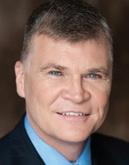
• Attorney in private practice (2003-pres ent): Practice focuses on family law, divorce, and domestic violence cases. Has also served as a Guardian ad Litem, or child representative, in family court.
Pro Bono Advocates
• Staff attorney (2003): Represented survivors of domestic violence in orders of protection and child custody cases.
Legal Assistance Foundation
• Staff attorney (2001-2002): Represented clients in housing, domestic violence, Social Security benefits, and bankruptcy cases.
Notable: Trowbridge ran unsuccessfully for judge in 2012, 2018 and 2020. The IRS and the state of Illinois have filed liens against a property Trowbridge owns for nonpayment of more than $88,000 in income taxes from 2008 through 2015. Trowbridge wrote in an email to Injustice Watch that he is in a
payment plan with both the IRS and Illinois. “I certainly did not intend to file inaccurate returns for those years,” he stated.
Bar association ratings: Rated qualified or recommended by all bar associations.
Endorsements: IVI-IPO, Personal PAC
John Fritchey
Experience:
F4 Consulting Ltd.
•Government relations director (2008-present): Runs a lobbying and political consulting firm.
Worked as a political analyst for radio station WGN.
Cook County Board of Commissioners
• Commissioner, 12th district (2010-2018): Represented parts of Chicago’s North and Northwest sides.
Law Office of John A. Fritchey
• Attorney in private practice (2004-2008): Focused on zoning and other administra tive issues in Chicago.

Illinois House of Representatives
• State representative, 11th district (19962010): Represented parts of Chicago’s North Side.

Notable: As a county commissioner, Fritchey was a staunch opponent of the pennyper-ounce “soda tax” and a proponent of marijuana legalization. Fritchey’s lobbying and consulting firm has represented several cannabis companies in zoning issues before the City of Chicago, and also represents the Pilsen Wellness Center, a mental health and substance use treatment facility. He is not currently registered as a lobbyist with Cook County or the state of Illinois.
In 2013, the Chicago Tribune reported that Fritchey was one of a handful of politicians and wealthy individuals who had gotten Cook County judges to protect their identities in divorce proceedings by allowing them to file paperwork with initials instead of their full names. In an email, Fritchey wrote, “Illi nois law allows for absolutely anybody to request to file under initials but it’s likely not something that most people care to or choose to do. … I didn’t and don’t see any special treatment whatsoever.”
Bar association ratings: Rated not qualified or not recommended by four bar associations. Eight bar associations rated him qualified or recommended.
Endorsements: Personal PAC
Jennifer Bae
Experience: Cook County Sheriff’s Office
• Director of em ployee discipline (2019-present): Oversees employee discipline and rep resents the sheriff’s office in grievance and arbitration with union members.
• Member, Sheriff’s Merit Board (2013-2017): Conducted disciplinary hearings for sworn members of the sheriff’s office and voted on disci plinary actions.
Chicago City Council
• Staff attorney, finance committee (2017-2019): Wrote and advised on city ordinances and policies intro duced in the finance committee.
Law Office of Jennifer E. Bae
• Solo practitioner (2012-2017): Fo cused on criminal defense.
Bae Law Offices
• Partner (2000-2012): Focused on criminal defense and civil rights law.
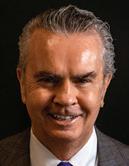
Cook County State’s Attorney’s Office
• Assistant state’s attorney (1997-2000)
Notable: Bae ran unsuccessfully for judge in the 12th subcircuit in 2016. If elected, Bae said she would be the first Korean American female judge in Cook County.
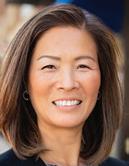
Bar association ratings: Rated qualified or recommended by all bar associations.



Stephen Swedlow
Experience: Quinn Emanuel Urqu hart & Sullivan, LLP

• Co-managing partner (2012-present): Leads the Chica go office of a large international law firm. Represents both companies and consumers in civil and class-action lawsuits.
Korein Tillery
• Partner (2008-2011): Focused on intellectual property, class action, and civil lawsuits.
• Associate (2001-2004)
Swedlow & Associates
• Partner (2004-2008): Represented plaintiffs in class-action lawsuits against pharmaceutical companies, chemical companies, and consumer goods companies.
Latham & Watkins
• Associate (1996-2001)
Notable: Swedlow represented health insurance companies in a class-action lawsuit filed in 2016 against the federal government over unpaid fees related to the Affordable Care Act. The government was ordered to pay $3.7 billion, and Swedlow’s firm was awarded $185 mil lion in legal fees. Swedlow won a $10.1 billion verdict in a class-action lawsuit against Philip Morris International in 2003. It was the largest civil judgment in Illinois at the time, but the judgment was overturned by the Illinois Supreme Court.
Swedlow currently represents plaintiffs in class-action lawsuits against Face book and Amazon over alleged privacy violations. Early in his career, Swedlow represented plaintiffs pro bono in a civil lawsuit against Matthew Hale and his white supremicist, neo-Nazi organization World Church of the Creator, after one of Hale’s followers killed two people, including Northwestern University basketball coach Ricky Byrdsong, and injured nine others during a shooting spree. As of May 12, Swedlow had loaned his campaign fund $500,000, which is a notably large sum for a subcircuit race and nearly seven times as much as his competitor had raised.
Bar association ratings: Rated qualified or above by all and highly qualified or highly recommended by three bar associations.
Endorsements: Personal PAC
12 INJUSTICE WATCH JUDICIAL ELECTION GUIDE 2022
8TH SUBCIRCUITGORDON VACANCY
8TH SUBCIRCUITLIPSCOMB VACANCY For more information about each candidate, scan the QR code or visit injusticewatch.org/judges. MORE ONLINE Expanded coverage
Sanjay Tailor
Experience:
Cook County Circuit Court
• Circuit judge (2021-present): Appointed by the Illinois Supreme Court. Presiding judge of the county division, which hears cases about elections, name changes, adoptions, and men tal health proceedings.

• Associate judge (2003-2021): Served in sev eral divisions, including domestic relations, where he heard divorce and child support cases; law, where he heard contract and business disputes; and chancery, where he heard class action lawsuits, constitutional challenges to laws, and other civil cases.

Cook County State’s Attorney’s Office
• Assistant state’s attorney (1996-2003): Represented the county and county officials in medical malpractice, civil rights, and other civil lawsuits.
Notable: In 2017, Tailor ruled in favor of the City of Chicago in a longstanding dispute with the city’s main police union over the city’s decision to maintain decades’ worth of police misconduct complaint files, despite a provision in the police union contract that requires those files to be destroyed after five years. Tailor ruled that the contract provision violated the state’s Freedom of Information Act and the public’s interest in disclosure. That decision was upheld by the Illinois Appellate Court and Illinois Su preme Court. In 2018, he dismissed a lawsuit by then-Cook County Assessor Joseph Berrios challenging a county ordinance that lim ited the amount of campaign contributions to elected officials from people who had sought “official action” from those same officials. The appellate court also upheld that decision. In 2019, Tailor ruled in a case brought by Injustice Watch co-founder Rob Warden that the Chicago Police Department could not withhold photos of police officers from the public.
Bar association ratings: Rated qualified or above by all and highly qualified or highly recommended by six bar associations.
Endorsements: CFL, IVI-IPO, Personal PAC
Ann Buran-Vongher
Experience:
Cook County Public Defender’s Office
• Assistant public defender (1989-2020): Represented clients in misdemeanor and felony cases and juvenile court.

Bar association ratings: Rated qualified or recommended by six bar associations. The Illinois State Bar Association rated her not qualified. Other evaluations were not available by press time.
Basileios “Bill” John Foutris
Experience: Foutris Law Office, Ltd.


• Attorney in private practice (2005-present): Focused on police misconduct lawsuits.
Knight, Hoppe, Kurnik, & Knight
• Associate (2002-2005): Represent ed police accused of misconduct.
Anesi, Ozmon, Rodin, Novak & Kohen
• Associate (2000-2002): Represented plaintiffs in personal injury lawsuits.



Notable: Foutris ran unsuccessfully for judge in 2020. He represented the family of Quintonio LeGrier in a wrongful death lawsuit against the City of Chicago and police officer Robert Rialmo. Rialmo killed LeGrier and his neighbor Bettie Jones while responding to a call for help. The jury in the case awarded LeGrier’s family $1.05 million, but the verdict was reversed by Judge Rena Marie Van Tine, who is also running for election this year, based on a finding by the jury that Rialmo was in reasonable fear of great bodily injury or death.
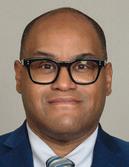
Bar association ratings: Rated qualified or recommended by all bar associations.



Torrick Alan Ward
Experience:
Cook County Department of Human Resources
• Deputy director of labor relations (2019-present): Manages the de partment’s legal staff.
• Senior labor counsel (2015-2019): Represented the county in employ ment matters and labor negotiations.
Law Office of Torrick A. Ward
• Attorney in private practice (2010-2015): Focused on employment and family law.
City of Chicago Office of Compliance
• Deputy director and senior compliance officer (2008-2010): Managed internal investigations into workplace-related complaints and managed the city’s Diversity and Equal Employment Opportunity offices.
City of Chicago Law Department
• Assistant corporation counsel and senior counsel (1998-2007): Represented the city in labor-related lawsuits and issues.
Bar association ratings: Rated qualified or recommended by all bar associations and highly recommended by Chicago’s LGBTQ+ Bar Association.
Barry Goldberg

Experience:
Office of the Illinois Attorney General
• Bureau chief, Charitable Trust bureau (2019-present): Brings civil and criminal cases against nonprofits and executives accused of fraud, misuse of funds and other violations of state law.
• Deputy bureau chief, Charitable Trust bureau (20182019).
• Assistant bureau chief, Charitable Trust bureau (2006-2017).
• Assistant attorney general, Charitable Trust bureau (1999-2006).
Bar association ratings: Rated qualified or recommended by eight bar associations and highly recommended by the Decalogue Society of Chicago. Other evaluations were not available by press time.
Endorsements: CFL, IVI-IPO, Personal PAC

Don R. Sampen
Experience: Clausen Miller, P.C.
• Partner (2008-present): Focused on commercial litigation and appeals.
Meckler Bulger and Tilsen
• Partner (2003-2008): Focused on insurance coverage and commercial litigation.
Office of the Illinois Attorney General
• Chief, Public Interest and Special Litigation divisions (2000-2003): Worked on special litigation, includ ing a nationwide lawsuit against several tobacco companies.
• Assistant attorney general (1995-2000) Martin, Craig, Chester & Sonnenschein
• Partner (1988-1995): Mostly focused on commercial litigation.


Bar association ratings: Rated qualified or above by all. The Chicago Council of Lawyers rated him well qualified, and Chicago’s LGBTQ+ Bar Association rated him highly recommended.
Endorsements: Personal PAC
INJUSTICE WATCH JUDICIAL ELECTION GUIDE 2022 13
9TH SUBCIRCUITCLEVELAND VACANCY
9TH SUBCIRCUITJACOBIUS VACANCY MORE ONLINE Check out our comprehensive judicial election guide To locate your Cook County subcircuit, read more information about each candidate, and create a customized report you can take to your polling station, scan the QR code or visit www.injusticewatch.org/judges.
Chris Taliaferro
Experience: Taliaferro Law Group


• Attorney in private practice (2016-present): Focused on divorce, child support, estate planning, and other domestic relations cases.
Chicago City Council
• Alderperson, 29th Ward (2015-present): Represents parts of the Austin, Belmont Cragin and Montclare neighborhoods on the city’s West Side.

Nexus Legal Group
• Attorney in private practice (20082016): Focused on divorce, child support, estate planning, and other domestic relations cases.
Chicago Police Department
• Police officer (1994-2017): Promot ed to sergeant in 2012. Took a leave of absence upon joining the City Council in 2015.


Notable: Taliaferro served in the U.S. Marine Corps before becoming a police officer. As an investigator in the Chicago Police Department’s internal affairs unit in 2005, Taliaferro wrote a memo to department higher-ups about the high number of complaints against officers in the Special Oper ations Section, the Chicago Tribune reported. Several members of that unit later faced federal charges for stealing drugs and money from people they falsely arrested.
Taliaferro has been a reliable pro-po lice voice since joining the City Coun cil. In 2019, Mayor Lori Lightfoot made Taliaferro the council’s public safety committee chair. Since then, he has supported the mayor’s version of an ordinance creating a new police oversight body and stalled attempts by fellow alderpeople to hold a hear ing to question Police Superintendent David Brown about plans to address
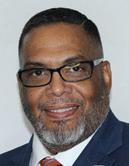
gun violence last summer. In an interview, Taliaferro said he has supported police accountability efforts and does not always see eye-to-eye with the police department or unions. “I do love our police department and I love our police officers,” he said. “But my voting record has always been what I thought was best for our city and my ward. And because of that, I’ve lost the support of the Fraternal Order of Police and the sergeants’ union.”
Bar association ratings: Rated recommended by four bar associations and not recommended or not qualified by four. Other evaluations were not available by press time.
Endorsements: CFL
Aileen Bhandari
Experience: Cook County State’s Attorney’s Office
• Supervisor, Community Justice Centers (2021-present): Oversees four neighborhood-based offices that prosecute criminal cases and support community outreach and crime prevention.
• Assistant state’s attorney (20022019): Held various roles, including overseeing the Community Justice Center in the Austin neighborhood, prosecuting felony criminal cases, and working in the office’s grand jury and felony review units.
Notable: Bhandari ran unsuccessful ly for judge in 2020. She was also a finalist for associate judge in 2019.
Bar association ratings: Rated qualified or above by all and highly recommended by Chicago’s LGBTQ+ Bar Association and the Puerto Rican Bar Association of Illinois.
Endorsements: IVI-IPO
Christine Svenson
Experience:
Svenson Law Offices
• Principal (2008-present): Focused on employment law, election law, and family law.
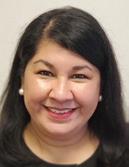
Cook County Republican Party •General counsel (20122017): Represented the party in election lawsuits and other legal matters.
Stone & Moore, Chartered
• Partner and associate (1998-2008): Focused on workers’ compensation cases.
Notable: Svenson ran unsuccessfully for judge in 2018. In 2014, she represented a client who filed a lawsuit alleging sexual harrassment against Dan Rutherford, then the Illinois state treasurer and a Republican candidate for governor. Rutherford accused Svenson and her client of fabricating the allegations to help his primary opponent, Bruce Rauner. Svenson denied political motivations. She said a previous $3,500 payment from Rauner’s campaign was for unrelated legal work.

Svenson has worked on several cases with Judi cial Watch, a conservative legal group. In a 2015 case, Svenson represented a client who filed a lawsuit asking the court to force Cook County’s cooperation with U.S. Immigration and Customs Enforcement detainer requests, which ask local jails to hold people who immigration officials suspect are in the country illegally. The county had passed a 2011 ordinance ordering the sheriff not to comply. A Cook County judge dismissed the lawsuit, and the Illinois Appellate Court later dismissed an appeal filed by Svenson, saying the case briefs submitted on her client’s behalf were “completely deficient.” In an emailed statement, Svenson said she had approved the documents but did not write them. She disagreed with the appellate court’s assessment, writing, “Our brief was not deficient at all.”
Svenson represents a reporter with the conser vative news outlet The Daily Caller in a pending lawsuit against Chicago Mayor Lori Lightfoot, claiming she violated the First Amendment in May 2021 when she granted interviews only to reporters of color to mark the midpoint of her first term.
Bar association ratings: Rated qualified or rec ommended by nine bar associations. The Chicago Bar Association rated her not recommended. Others were not available by press time.
Gary William Seyring
Experience: Law Offices of Gary W. Seyring

• Attorney in private practice (2010-present): Focused on real estate, contract disputes, domestic relations, contested estates, and personal injury cases.
Seyring, Watson & Galvin
• Attorney in private practice (2000-2010)
Flynn, Murphy, Ryan & Seyring
• Attorney in private practice (1978-2000)
Notable: Seyring is running for judge in the 13th subcircuit for the fifth time. He lost in the Republican primary in 2014 and 2016, and lost in the general election in 2018 and 2020. In addition to his law practice, he also has served as an arbitrator with the Cook County Arbitration Program. Before becoming a lawyer, Seyring was an accountant for several years.

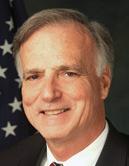
Bar association ratings: Rated qualified or recommended by all bar associations.

Dominic J Buttitta, Jr
Experience: Buttita Law Group, LLC •Managing attorney (2015-present): Focused on criminal defense and family law.
Carponelli & Buttita, LLC
• Partner (2013-2015): Fo cused on criminal defense and family law.
McHenry County State’s Attorney’s Office
• Assistant state’s attorney (2010-2013): Held various roles, including prosecuting misde meanor and traffic cases, felony cases, white collar crimes, and mental health court cases.
Bar association ratings: Rated qualified or recommended by all bar associations that were available by press time.
MORE ONLINE
Check out our comprehensive judicial election guide
14 INJUSTICE WATCH JUDICIAL ELECTION GUIDE 2022
13TH
VACANCY (GOP)
SUBCIRCUITGROEBNER
11TH SUBCIRCUITMcGUIRE VACANCY
locate your
subcircuit, read more information about each
and create
customized report you can take to your polling station, scan the QR code or visit
To
Cook County
candidate,
a
www.injusticewatch.org/judges.
13TH SUBCIRCUIT
GROEBNER VCY. (DEM)
“Jack” Costello
Experience: Cook County State’s Attorney’s Office
• Assistant state’s attorney (2007-present): Since 2019, has prosecuted public corruption and financial crimes cases. Previously prosecuted felony, misdemeanor and traffic cases, and worked in the felony review unit.
Bar association ratings: Rated qualified or recommended by all bar associations that were available by press time.
Endorsements: CFL, Personal PAC
Joe Gump
Experience: Law Offices of Joseph M. Gump
• Attorney in private practice (2020-present): Focused on real estate transactions and misdemeanor criminal cases.
Cook County Public Defender’s Office
• Assistant public defender (19892020): Started in the appeals divi sion. Spent 17 years representing defendants in felony cases at the Rolling Meadows courthouse.
Notable: Gump ran unsuccessfully for judge in 2020. His parents served time in federal prison in the 1980s for participating in anti-war protests that allegedly caused damage to federal property, which Gump has said in spired his career in public defense.
Bar association ratings: Rated qualified or recommended by all bar associations.
Endorsements: IVI-IPO, Personal PAC
14TH SUBCIRCUIT
BROWN VACANCY
Iris Y. Chavira
Chavira is running unopposed in this primary. For her full candidate pro file, visit injusticewatch.org/judges.
Steve Demitro
Experience: Steve Demitro Law Office
• Attorney in private practice (2000-present): Focuses on personal injury, wrongful death, and criminal cases. Also works as an arbitra tor.
Metropolitan Water Reclamation District
• Hearing officer (2014-2015): Heard appeals of cases involving water-related charges, pollution, and other issues.
Notable: Demitro dropped out of high school but later earned his GED diploma, went to law school, and passed the bar exam. He ran unsuccessfully for judge in 2012 and 2020.
Bar association ratings: Rated qualified or recommended by all bar associations.

Viviana Martinez
Experience: Chicago Public Schools
• Deputy gen eral counsel (2022-present): Works on contract negotiations, procurements, and legal compliance.



Cook County government
• Special assistant for legal affairs, Bureau of Administration (20182022): Provided legal counsel to various county departments.
• Interim director, Department of Adoption and Family Sup portive Services (2018-2019): Oversaw policy and training for the department responsible for social investigations of families involved in adoptions and par entage proceedings.
• Assistant special legal counsel, Office of Cook County President (2013-2018): Provided legal counsel to the office and various county departments.
Office of Cook County Commissioner Jesús “Chuy” García
• Chief of staff and general counsel
(2010-2013): Drafted legislative proposals, wrote speeches and press releases, and managed office staff.
Attorney in private practice
• (2008-2010): Represented people in immigration cases and foreclosure defense.
Office of the Illinois Attorney General
• Assistant attorney general (2007-2008): Worked on labor-related issues.
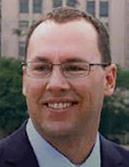
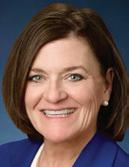


Bar association ratings: Rated recommended or qualified by six bar associations. Four bar associations found her not recommended or not qualified. Others were not available by press time.
Endorsements: CFL
Jorge V. Cazares
Experience: Hinshaw & Culbertson LLP
•Partner (2020-present): Wide-ranging practice, including contract and business law, product liability, and representing local governments in employment and civil rights cases.
Pugh, Jones & Johnson, P.C.
• Director (2008-2020): Practiced personal injury defense, civil rights and employment discrim ination defense, and real estate and commercial law.
• Associate and partner (19922006)
Chicago Housing Authority
• General counsel (2006-2008): Oversaw all legal matters for the public housing agency, including real estate development, per sonal injury cases, and housing regulation issues. Also served as the agency’s chief ethics officer and chief equal employment opportunity officer.
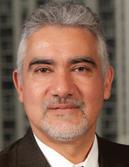
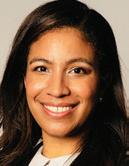
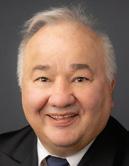
Exelon
• Litigation counsel (2005): Temporarily served as in-house counsel.
Bar association ratings: Rated not qualified or not recommended by five bar associations.
Bernadette Barrett
Experience: The Barrett Law Group
• Attorney in private practice (2019-present): Focused on family law and civil litigation.
Barrett & Sramek
• Attorney in private practice (1991-2019): Fo cused on family law and civil litigation.
Notable: Barrett ran unsuccessfully for judge in the 15th subcircuit in 2004. Her husband, Michael B. Barrett, is a Cook County Circuit Court judge in the Markham courthouse.
Bar association ratings: Rated qualified or recommended by all bar associations that were available by press time.

Jim Gleffe
Experience: Cook County Clerk’s Office
• Deputy chief of staff and labor counsel (2020-present): Represents the office in employment issues.
Cook County Recorder of Deeds Office
• Chief deputy recorder and chief of staff (2018-2020): Worked on labor issues, con tracts, and legislative priorities for the office.
• Chief legal counsel (2014-2018): Drafted and reviewed ordi nances and worked on Freedom of Information Act requests.
Chicago City Clerk’s Office
• Policy analyst (2013-2014): Worked on city legislation related to the clerk’s office.




Illinois Secretary of State’s Office
• Chief deputy director, securities division (2012-2013): Oversaw regulatory and enforcement cases involving the sale of securities.
•Enforcement attorney (2009-2012)
City of Chicago Law Department
• Prosecutor (2007-2009): Prosecuted municipal code violations and traffic offenses.
Notable: Gleffe and his wife, Kristen Bauer, have close ties to former House Speaker Michael Madigan. Gleffe was a longtime precinct captain under Madigan in Chicago’s 13th Ward. Bauer is a registered lobbyist who has represented clients including ComEd, which is embroiled in a bribery scandal that led to Madigan’s indictment last year, and Green Thumb Industries, a cannabis company that was one of the first to receive licenses to grow medical marijuana in Illinois, according to the Chica go Tribune. In 2019, Gleffe was involved in efforts to challenge the ballot petitions of David Krupa, a college student who was running against 13th Ward Ald. Marty Quinn. Gleffe notarized several dozen affidavits from residents who said they wanted to withdraw their signatures from Krupa’s nominating petitions. But the Quinn campaign collected far more affidavits than the number of signatures Krupa had collected, leading to questions about the veracity of the affidavits, the Chicago Tribune reported. In a statement, a spokesperson for his campaign said, “The role of a notary is only to verify that the person signing a document is who they say they are. ... Jim carried out his notary duties in full compliance with the law.”
Bar association ratings: Rated not qualified or not recommended by four bar associations. Two bar associations rated him recommended. The other evaluations were not available by press time.
Endorsements: CFL, Personal PAC
INJUSTICE WATCH JUDICIAL ELECTION GUIDE 2022 15
James
14TH SUBCIRCUIT 15TH SUBCIRCUIT JAGIELSKI VACANCY LAWLER VACANCY
SPECIAL PULLOUT SECTION
Injustice Watch is a nonprofit, nonpartisan news organization in Chicago. Our work focuses on justice and equity in the court system. This judicial election guide is the result of a year of extensive research and reporting about Cook County judicial candidates. We offer the guide as a resource to voters. We don’t make endorsements or recommendations.
Scan the QR code or visit injusticewatch.org/donate to support public service journalism.

Research and reporting: Grace Asiegbu, Carlos Ballesteros, Maya Dukmasova, Emanuella Evans, Kelly Garcia, Chloe Hilles, Max Lubbers, Josh McGhee, Rita Oceguera, Amy Qin, and Aviva Waldman
Editing: Adeshina Emmanuel and Jonah Newman
Web development and design: Bea Malsky


Print guide design: Shanna Novak
Cover illustration: Verόnica Martinez
Engagement and distribution: Amanda Miley, Charles Preston, and Juliet Sorensen

16 INJUSTICE WATCH JUDICIAL ELECTION GUIDE 2022






























 Vivian Chiu Margo Csipo
Wyatt Nester-Pasicznyk
Vivian Chiu Margo Csipo
Wyatt Nester-Pasicznyk































































 By TONY PEREGRIN
By TONY PEREGRIN









































































































 By MICCO CAPORALE
By MICCO CAPORALE






 @itstarynallen
By ensemble member Tarell Alvin McCraney Directed by Kent Gash
@itstarynallen
By ensemble member Tarell Alvin McCraney Directed by Kent Gash






 By DAVID WHITEIS
By DAVID WHITEIS






























 —JAMIE LUDWIG
—JAMIE LUDWIG






 —BRAD COHAN v
—BRAD COHAN v












































































































































































































 BY MATT SIMONETTE
BY MATT SIMONETTE

































































 BY JOEY AMATO
BY JOEY AMATO


































































































































































 Your voting guide to Cook County’s 2022 judicial primary elections
Your voting guide to Cook County’s 2022 judicial primary elections






























































































